
Opinion Writing: a Guide to Writing a Successful Essay Easily

An opinion essay requires students to write their thoughts regarding a subject matter. Relevant examples and explanations back their point of view. Before starting an opinion paper, it is important to study the definition, topics, requirements, and structure. Referring to examples is also highly useful. Perhaps you need help with our admission essay writing service ? Take a look at this guide from our dissertation writing service to learn how to write an opinion essay like an expert.
What Is an Opinion Essay
A common question among students is: ‘What is an Opinion Essay?' It is an assignment that contains questions that allow students to share their point-of-view on a subject matter. Students should express their thoughts precisely while providing opinions on the issue related to the field within reasonable logic. Some opinion essays type require references to back the writer's claims.
Opinion writing involves using a student's personal point-of-view, which is segregated into a point. It is backed by examples and explanations. The paper addresses the audience directly by stating ‘Dear Readers' or the equivalent. The introduction involves a reference to a speech, book, or play. This is normally followed by a rhetorical question like ‘is the pope Catholic?' or something along those lines.
What Kind of Student Faces an Opinion Essay
Non-native English-speaking students enrolled in the International English Language Testing System by the British Council & Cambridge Assessment English are tasked with learning how to write the opinion essays. This can be high-school or college students. It is designed to enhance the level of English among students. It enables them to express their thoughts and opinions while writing good opinion essay in English.
Get Your Opinion ESSAY READY TODAY!
We will write you a plagiarism-free opinion essay, with a title page, unlimited revisions, and bunch of other cool features included!
What Are the Requirements of an Opinion Essay?

Avoid Going Off-Topic: Always write an opinion essay within relevance to answer the assigned question. This is also known as ‘beating around the bush' and should not be included in any opinion paragraph as it may lower your grade.
Indent the First Paragraph: With most academic papers, opinion writing is not different. Therefore, it contains the rule of indenting the first line of the introduction.
A Well-Thought Thesis: The full thesis statement is a brief description of the opinion essay. It determines the rest of the paper. Include all the information that you wish to include in the body paragraphs
The Use of Formal Languages: Although it is okay to write informally, keep a wide range of professional and formal words. This includes: ‘Furthermore,' ‘As Stated By,' ‘However', & ‘Thus'.
Avoid Internet Slang: In the opinion paper, avoid writing using slang words. Don'tDon't include words like ‘LOL', ‘OMG', ‘LMAO', etc.
The Use of First Person Language (Optional): For the reason of providing personal thought, it is acceptable to write your personal opinion essay in the first person.
Avoid Informal Punctuation: Although the requirements allow custom essay for the first-person language, they do not permit informal punctuation. This includes dashes, exclamation marks, and emojis.
Avoid Including Contradictions: Always make sure all spelling and grammar is correct.
We also recommend reading about types of sentences with examples .
Opinion Essay Topics
Before learning about the structure, choosing from a wide range of opinion essay topics is important. Picking an essay theme is something that can be done very simply. Choosing an excellent opinion essay topic that you are interested in or have a passion for is advisable. Otherwise, you may find the writing process boring. This also ensures that your paper will be both effective and well-written.
- Do sports differ from ordinary board games?
- Is using animals in circus performances immoral?
- Why should we be honest with our peers?
- Should all humans be entitled to a 4-day workweek?
- Should all humans become vegetarians?
- Does a CEO earn too much?
- Should teens be barred from having sleepovers?
- Should everyone vote for their leader?
- The Pros & Cons of Day-Light Saving Hours.
- What are the most energy-efficient and safest cars of X year?
Opinion Essay Structure
When it comes to opinion paragraphs, students may struggle with the opinion essay format. The standard five-paragraph-essay structure usually works well for opinion essays. Figuring out what one is supposed to include in each section may be difficult for beginners. This is why following the opinion essay structure is something all beginners should do, for their own revision before writing the entire essay.
You might also be interested in getting more information about: 5 PARAGRAPH ESSAY

Opinion essay introduction
- Address the audience directly, and state the subject matter.
- Reference a speech, poem, book, or play.
- Include the author's name and date of publication in brackets.
- 1 or 2 sentences to make up a short description.
- 1 or 2 summarizing sentences of the entire paper.
- 1 sentence that links to the first body paragraph.
Body Paragraph 1
- Supporting arguments
- Explanation
- A linking sentence to the second body paragraph.
Body Paragraph 2
- Supporting argument
- A linking sentence to the third body paragraph.
Body Paragraph 3
- A linking sentence to the conclusion.
Conclusion paragraph
- Summary of the entire paper
- A conclusive sentence (the bigger picture in conclusion)
If you need some help, leave us a message ' write my essay cheap ' and we'll help.
Opinion Essay Examples
Do you need something for reference? Reading opinion essay examples can expand your knowledge of this style of writing, as you get to see exactly how this form of an essay is written. Take a look at our samples to get an insight into this form of academic writing.
Over the past, American popular culture has been strong in creating racial stereotypes. Images displayed through television, music, and the internet have an impact on how individuals behave and what individuals believe. People find their identities and belief systems from popular culture. Evidently, I believe that American pop culture has created racial stereotypes that predominantly affect other ethnic minorities. Analyzing the history of America reveals that African Americans have always had a problem defining themselves as Americans ever since the era of slavery. AfricanAmericans have always had a hard time being integrated into American culture. The result is that African Americans have been subjected to ridicule and shame. American pop culture has compounded the problem by enhancing the negative stereotypes ofAfrican American. In theatre, film, and music, African Americans have been associated with vices such as murder, theft, and violence.
The family systems theory has a significant revelation on family relations. I firmly agree that to understand a particular family or a member, they should be around other family members. The emotional connection among different family members may create functional or dysfunctional coexistence, which is not easy to identify when an individual is further from the other members. Taking an example of the extended family, the relationship between the mother-in-law and her daughter-in-law may be tense, but once they are outside the family, they can pretend to have a good relationship. Therefore, I agree with the theory that the existing emotional attachment and developed culture in the family is distinctively understood when the family is together.
Opinion writing is a form of academic paper that asks students to include their thoughts on a particular topic. This is then backed by a logical explanation and examples. Becoming more knowledgeable is a practical way to successfully learn how to write an opinion paper. Before writing anything, it is essential to refer to important information. That includes the definition, topics, opinion writing examples, and requirements. This is what turns amateur writers into master writers.
Feeling like you need some assistance with your essay? No matter what kind of writer you need, opinion or persuasive essay writer , our team consists of experts in all fields. Our college essay writing service helps those students who need an extra push when it comes to their assignments.
Need Qualified Essay Help?
Are you struggling with your opinion paper? Hit the button below to get writer's help. All your requests are processed fast.
Related Articles
.webp)
Opinion Writing: Everything You Need To Know (+ 8 Examples)
Everybody has opinions and the perfect medium to convey them is through opinion writing.
Learning how to convey your opinions to others by writing is an excellent way of voicing your ideas and suggestions and becoming more confident as a person and an articulate writer.
What is the purpose of opinion writing?
Opinion writing is a powerful type of writing that helps you convey your opinion to the audience in the most effective and compelling manner.
It has a specific format:
Thesis statement
- Introduction
It also consists of structural elements such as
Let’s delve further into opinion writing, its types, and how to write an opinion piece in this guide.
What is opinion writing?
As its name implies, opinion writing is a type of writing in which the writer gives their opinion on a topic or subject matter.
The writer shares their perspective or stance on that topic and offers reasons and supporting arguments to support that opinion.
What must be included in opinion writing?
Here are some features that every piece of opinion writing should have.
- Supporting reasons and evidence
- Well-researched and well-presented arguments
- A definite, well-organized structure
- Quotes or experiences by credible authorities on the subject that lend credence to the writer’s opinion
- Relevant and authentic facts and statistics
- A reasonable conclusion summing up the main idea and reiterating the writer’s viewpoint
Importance of Opinion Writing: Why is opinion writing important for students?
Opinion writing is an essential kind of writing for a multitude of reasons. As a student, a writer, or a blogger, it helps you share your views and opinions on various subjects with your audience.
It also enables you to develop and further enhance your writing skills, and you learn how to effectively communicate your ideas and perspectives with the aid of authentic evidence. Moreover, it helps build confidence.
For readers, opinion pieces are a great source of knowledge, facts, and other opinions that may or may not be different from their own.
Knowing other opinions on various subjects is essential and allows one to broaden their perspective.
What are some types of opinion writing?
Opinion pieces can mainly be divided into columns, editorials, and op-eds. We’ll explore each type in detail below.
Writers who write columns are often referred to as columnists and write opinion pieces on various current events, political events, social issues, and other topics.
Columns are usually published in newspapers, magazines, and other literary publications.
Like columns, editorials are also published in newspapers and magazines and convey a specific opinion or stance on a particular subject matter.
Editorials are written by an editorial board member of a newspaper or magazine.
Op-eds are opinion pieces commonly featured in magazines and newspapers and written by guest contributors.
“Op-ed” is short for “opposite the editorial page,” where these pieces are mostly found.
What is the structure of opinion writing?
Every opinion piece should be well-structured, with different paragraphs dedicated to other parts of the arguments.
Typically, an opinion piece has the following structural elements: thesis sentence, introduction, body, and conclusion.
The body is the part where the bulk of the writer’s opinions, arguments, supporting evidence, and statistics go.
In the body part, ideas should be formulated using this order:
- Examples/Evidence
- In the next section, we’ll explore these structural elements in more detail.
Opinion writing format
While there is no strict format, every writer has to adhere to when penning opinion pieces, certain structural elements (that we’ve mentioned previously) must be present in every opinion piece.
Here are some of them:
The thesis statement gives the reader a quick overview of what the opinion piece is about and what the writer’s stance is.
Introduction Of Your Opinion
The introduction is an integral part of an opinion piece in which the writer gives some background about the topic and paves the way for their upcoming arguments.
The opening may also contain the writer’s name, publication details, etc.
Next comes the body. The body is where the bulk of the writer’s arguments, supporting reasons, facts, and statistics go.
It can contain multiple supporting arguments, examples, and references from credible sources. The body usually contains numerous paragraphs.
Opinion Conclusion
In the conclusion, the writer effectively wraps up their argument and reiterates their stance on the subject matter.
The conclusion is basically a summary of the whole opinion piece.
Besides the essential structural elements and necessary parts (supporting arguments, evidence, examples, etc.), there are other vital components that every opinion piece must have.
These include:
- A bold, clear statement of the writer’s opinion or stance on the subject matter
- Formal language and a polite and informative tone
- Relevant and appropriate evidence
- Varying sentence length and convincing word choice to inform the audience and keep them engaged
How do you start opinion writing?
The beginning of an opinion piece is important and must set the stage for the upcoming arguments.
The opinion piece should begin with a clear statement of the subject matter and hint at the writer’s stance on it.
In addition, your introduction should provide a smooth transition to the main body of the opinion piece.
Opinion writing topics: What is an example in opinion writing?
Here is a list of 8 excellent topics for writing opinion pieces.
- Should organizations adopt a 4-day work week?
- Should standardized testing be abolished?
- Is homeschooling better than traditional schooling?
- Are video games turning children violent?
- What are some of the best electric cars you can buy?
- Should every child receive awards for participating in school events instead of only those who win?
- Is online education as effective as in-person education?
- Is it wrong to put animals in cages?
Final thoughts
Opinion writing is a crucial type of writing and is something everybody should try their hand at. It helps you voice your opinions and empowers you to address an audience and speak your mind.
Since it is specialized writing, it has its own format, structural elements, and other essential components.
Share This Article
About the author: matthew kuna.
Related Posts

Writing Strengths: What Writers Need To Succeed

Writing With Ease: The Complete Writer Review

How To Manifest On Paper Through Manifestation Writing
Leave a comment cancel reply.
Save my name, email, and website in this browser for the next time I comment.
© Copyright 2022
Offer of the decade FLAT 20% off + sign up bonus of $20 Order Now
- [email protected]
- +14159918581
Files Missing!
Please upload all relevant files for quick & complete assistance.
Opinion Essays – Step-by-Step Instructions
Home / Blog / Write An Opinion Essay

Introduction
What makes an opinion essay truly compelling? Why do some essays resonate while others fall flat? The art of opinion writing is not just about sharing your thoughts; it is about persuading, informing, and engaging your readers. Today, we will learn all about crafting an impactful opinion essay.
So, how do you transform your opinions into powerful words that leave a lasting impression? Let us dive in and discover the keys to success in opinion writing.
What Is an Opinion Essay?
An opinion essay is a written work where an author expresses their viewpoint on a particular topic or issue. Unlike other essays that primarily rely on factual information and objective analysis, an opinion essay is inherently subjective, emphasizing the writer's beliefs, feelings, and perspectives.
Opinion essays are prevalent in various contexts, from academic assignments and journalism to blogs and editorials. They serve as a platform for individuals to express themselves, share their unique perspectives, and contribute to meaningful discussions on various subjects.
What Kind of Student Faces an Opinion Essay?
Let us explore the characteristics and educational contexts where opinion essays are commonly encountered:
1. High School Students:
High school students are frequently introduced to opinion essays as part of their English or language arts curriculum. These essay help students develop fundamental writing skills and the ability to express their viewpoints coherently. Opinion essays at this level often revolve around personal experiences, literary analysis, or current events, fostering critical thinking and communication skills.
2. College and University Students:
College and university students encounter opinion essays across various disciplines, from humanities and social sciences to natural sciences and engineering. In college, opinion essays become more sophisticated, requiring students to delve into scholarly research, cite academic sources, and formulate well-supported arguments. These essays are instrumental in promoting research skills, academic writing proficiency, and the ability to synthesize complex information.
3. Graduates and Postgraduates:
Graduate and postgraduate students frequently engage in opinion essays as part of their coursework and research activities. At this level, opinion essays may take the form of thesis proposals, research position papers, or responses to academic debates. These essays serve as essential paraphrasing tool for contributing to the scholarly discourse within their fields.
4. Law Students:
Law students encounter opinion essays in the form of legal memoranda, case briefs, or persuasive arguments. These essays hone their legal writing and argumentative essay topics skills.
In the legal profession, constructing well-reasoned opinions is vital, as lawyers often need to advocate for their clients' positions.
5. Journalism and Communication Students:
Students pursuing journalism or communication degrees frequently write opinion pieces, such as editorials and op-eds. Opinion essays in this context train students to effectively convey their thoughts to a broader audience while adhering to ethical and journalistic standards.
6. Political Science and Philosophy Students:
Political science or philosophy students delve into opinion essays as they explore complex political ideologies, ethical dilemmas, and philosophical debates. Opinion essays in these disciplines require students to analyze and critically evaluate different perspectives, fostering a deep understanding of complex issues.
7. MBA and Business Students:
MBA and business students encounter opinion essays in business ethics, strategic management, and decision-making courses. These essays sharpen their ability to make informed, ethical business judgments and communicate their rationale effectively.
8. ESL and Non-Native English Speakers:
Students learning English as a second language (ESL) or non-native English speakers may face opinion essays to enhance their language proficiency. Opinion essays help ESL students develop language skills while expressing their thoughts on diverse essay topics .
What Are the Requirements of an Opinion Essay?
Here are the key elements that should be present in an opinion essay:
1. Clear and Concise Thesis Statement:
Every opinion essay should start with a well-defined thesis statement. This statement is the heart of your essay, succinctly summarizing your main argument or viewpoint. It should be placed in the introduction, typically towards the end of that section.
2. Introduction:
- The introduction serves as the opening of your essay, capturing the reader's attention and providing essential context for the topic.
- Begin with a compelling hook, which can be a thought-provoking question, an interesting fact, a relevant quote, or a brief anecdote.
- Clearly present your thesis statement, outlining your opinion on the issue.
- Provide a brief overview of the points you intend to discuss in the essay's body, setting the reader's expectations.
3. Well-Structured Body Paragraphs:
- The body of your opinion essay should consist of several well-organized paragraphs, each dedicated to a specific aspect or supporting point related to your thesis.
- Start each paragraph with a clear topic sentence directly connecting to your thesis statement.
- Offer substantial evidence, examples, statistics, or personal experiences to support your viewpoint. Ensure the evidence is relevant and convincing.
- Maintain a logical flow between paragraphs, using transitional words and phrases to guide the reader seamlessly through your arguments.
4. Acknowledgment of Counterarguments:
- A robust opinion essay acknowledges opposing viewpoints or counterarguments. This demonstrates your ability to consider alternative perspectives and strengthens your own argument.
- Counterarguments can be addressed within the body paragraphs or in a dedicated paragraph where you present, discuss, and ultimately refute opposing views.
5. Conclusion:
- The conclusion should serve as the closing of your essay, summarizing your thesis statement and the main points presented in the body.
- However, avoid mere repetition of the introduction. Instead, offer a broader perspective, leaving the reader with something to contemplate, such as a thought-provoking idea, a call to action, or a suggestion for further exploration.
- Conclude your essay with a sense of closure, ensuring your final words leave a lasting impression.
6. Evidence and Examples:
Support your opinion with credible evidence, such as research findings, assignment expert opinions, or real-life examples. This lends credibility to your argument and makes it more persuasive.
7. Proper Citation:
If your essay includes external sources or references, ensure proper citation following the required citation style (e.g., APA, MLA, Chicago). Correct citation is essential to maintain academic integrity and prevent plagiarism.
8. Editing and Proofreading:
- Before finalizing your opinion essay, perform a thorough edit and proofread. Check for grammar and spelling errors, as well as clarity and coherence.
- Consider seeking peer, instructor, or professional editor feedback to ensure your essay is polished and error-free.
Opinion Essay Topics
Here are ten broad subject areas for opinion essay topics
1. Technology:
- The Impact of Artificial Intelligence on Employment
- Is Social Media Beneficial or Harmful for Society?
- The Ethics of Data Privacy in the Digital Age
- Should Technology Be Used in Education More Extensively?
- Is Online Learning as Effective as Traditional Education?
- The Role of Technology in Solving Environmental Issues
- Are Smartphones a Necessity or a Distraction in Daily Life?
- The Pros and Cons of Video Games for Children
- Is Technology Making Us More or Less Connected to Each Other?
- The Future of Work in a World Dominated by Automation
2. Education:
- Standardized Testing: Does It Accurately Measure Student Abilities?
- The Impact of Homeschooling on Children's Development
- Should Schools Implement Uniform Dress Codes?
- The Role of Arts Education in Academic Curriculum
- Are College Degrees Still Worth the Investment?
- The Benefits and Drawbacks of Online Education
- Should Schools Teach Financial Literacy as a Mandatory Subject?
- The Influence of Teachers on Students' Success
- Does Homework Enhance or Impede Learning?
- The Importance of Inclusive Education for Special Needs Students
3. Environment:
- The Responsibility of Individuals in Combating Climate Change
- Should Plastic Bags and Bottles Be Banned to Reduce Pollution?
- The Impact of Deforestation on Biodiversity
- Renewable Energy Sources vs. Fossil Fuels: Which is Better?
- Should Governments Implement Carbon Tax to Reduce Emissions?
- The Ethics of Animal Testing in Scientific Research
- Is Sustainable Living Achievable for Everyone?
- The Role of Urban Planning in Creating Eco-Friendly Cities
- Are Electric Vehicles the Future of Transportation?
- The Effectiveness of Recycling Programs in Reducing Waste
4. Politics and Government:
- The Importance of Voting in a Democracy
- Is Political Correctness Beneficial or Restrictive to Free Speech?
- Should Term Limits Be Imposed on Elected Officials?
- The Role of Social Media in Shaping Political Opinions
- Universal Healthcare vs. Private Healthcare: Pros and Cons
- The Impact of Immigration Policies on Society
- Should Affirmative Action Still Be Implemented?
- Is Political Polarization a Threat to Democracy?
- The Influence of Lobbying and Special Interest Groups on Politics
- Should the Voting Age Be Lowered or Raised?
5. Health and Wellness:
- The Pros and Cons of a Vegetarian or Vegan Diet
- The Impact of Fast Food on Public Health
- Should Vaccination Be Mandatory for All Children?
- The Benefits and Risks of Legalizing Marijuana
- The Role of Mental Health Education in Schools
- Is Healthcare a Basic Human Right?
- The Ethics of Genetic Engineering and Designer Babies
- The Impact of Stress on Physical and Mental Health
- Is Alternative Medicine a Valid Alternative to Conventional Medicine?
- The Influence of Advertising on Unhealthy Eating Habits
6. Social Issues:
- The Role of Social Media in Promoting Body Image Issues
- The Impact of Income Inequality on Society
- Is Capital Punishment Ethical or Inhumane?
- The Importance of Gender Equality in the Workplace
- Should Animal Testing Be Banned for Cosmetic Products?
- The Ethics of Euthanasia and Assisted Suicide
- The Influence of Celebrity Culture on Young People
- Is Online Bullying a Serious Threat to Mental Health?
- The Role of Government in Combating Homelessness
7. Economics:
- The Effects of Inflation on Consumer Purchasing Power
- Is Globalization Beneficial or Harmful to Developing Countries?
- The Impact of Minimum Wage Laws on Employment
- The Role of Cryptocurrency in Modern Finance
- Should Governments Provide Universal Basic Income?
- The Ethics of Corporate Social Responsibility
- The Pros and Cons of Trade Tariffs
- Is Economic Growth Sustainable in the Long Term?
- The Influence of Consumerism on Environmental Degradation
- The Role of Government Regulation in Preventing Financial Crises
8. Science and Technology Ethics:
- The Ethical Implications of Human Gene Editing
- Should Artificial Intelligence Have Legal Rights?
- The Use of Facial Recognition Technology: Privacy vs. Security
- The Dangers and Benefits of Biotechnology Advancements
- The Ethics of Cloning Animals for Human Consumption
- Is Privacy Invasion Justified in the Name of National Security?
- The Impact of 3D Printing on Intellectual Property Rights
- Should Autonomous Weapons Be Banned?
- The Ethical Considerations of Using CRISPR for Genetic Enhancement
- Is Space Exploration Worth the Cost and Environmental Impact?
9. Culture and Society:
- The Influence of Pop Culture on Young People's Behavior
- Should Cultural Appropriation Be Condemned or Celebrated?
- The Importance of Preserving Indigenous Languages and Cultures
- The Role of Music in Shaping Social and Political Movements
- Should Museums Return Stolen Artifacts to Their Countries of Origin?
- The Impact of Reality TV Shows on Society's Perception of Reality
- Is Online Dating a Positive or Negative Trend in Modern Relationships?
- The Ethics of Cultural Tourism and Its Impact on Local Communities
- Should Schools Teach More Diverse History and Literature?
- The Role of Literature and Art in Promoting Social Change
10. Ethics and Morality:
- The Ethics of Physician-Assisted Suicide for Terminal Patients
- Is Lying Ever Justified in Moral Dilemmas?
- The Role of Religion in Shaping Personal Morality
- The Ethics of Animal Rights: Should Animals Have Legal Personhood?
- Is Forgiveness a Virtue or a Weakness?
- The Moral Implications of Cloning Humans
- The Ethics of Nuclear Weapons and Deterrence
- Should Government Surveillance Be Permitted for National Security?
- The Role of Free Will in Determining Moral Responsibility
- Is It Ethical to Experiment on Animals for Scientific Research?
Opinion Essay Structure
Here is a breakdown of the essential elements:
1. Introduction:
- Hook: Begin with an attention-grabbing hook, such as a question, fact, quote, or anecdote, to engage the reader's interest.
- Thesis Statement: Present your clear and concise thesis statement. This statement is the foundation of your essay and encapsulates your main argument or opinion on the topic.
- Preview: Offer a brief overview of the main points or arguments you will discuss in the body of the essay. This sets the reader's expectations.
2. Body Paragraphs:
- Topic Sentences: Start each body paragraph with a clear topic sentence that relates directly to your thesis statement.
- Supporting Evidence: Provide evidence, examples, statistics, or expert opinions that support each argument. Ensure that the evidence is relevant and compelling.
- Transition Sentences: Use transitional words and phrases to guide the reader smoothly from one point to the next. This creates coherence and logical flow.
- Counterarguments: Address opposing viewpoints within the body of your essay, demonstrating your ability to evaluate different perspectives critically. This adds depth and persuasiveness to your argument.
3. Conclusion:
- Restate Thesis: Restate your thesis statement and summarize your main argument.
- Summarize Main Points: Summarize the key points or arguments you've presented in the essay's body.
- Broaden Perspective: Move beyond mere repetition of the introduction. Offer a broader perspective on the topic, leaving the reader with something to contemplate, such as the significance of your opinion or a call to action.
- Closing Thoughts: End with a thought-provoking closing thought, question, or statement that leaves a lasting impression on the reader.
Opinion Essay Examples
Here is an example for you -
The Impact of Social Media on Mental Health
Social media has become an integral part of our lives in today's digital age. While it offers various benefits, like staying connected with friends and accessing information, its influence on mental health has been a growing concern. This essay explores the impact of social media on mental well-being, arguing that while it has some advantages, it can also have detrimental effects.
Introduction:
The introduction provides a clear thesis statement: "This essay argues that social media has both positive and negative impacts on mental health." It engages the reader's interest with a hook, such as a startling statistic about social media usage or a relevant quote.
Body Paragraphs:
The body of the essay is divided into several paragraphs, each focusing on a specific aspect of the argument:
Positive Aspects: This paragraph discusses the positive impact of social media, such as fostering connections, providing support networks, and raising awareness of mental health issues. It includes examples and statistics to support these points.
Negative Aspects: Here, the essay delves into the negative effects of social media, including cyberbullying, social comparison, and addiction. Real-life examples and studies are cited to illustrate these harmful consequences.
Counterarguments: To address opposing viewpoints, the essay checker acknowledges that some studies suggest a limited negative impact of social media. However, it refutes these arguments with counter-studies and expert opinions, emphasizing the overall negative trend.
Conclusion:
The conclusion restates the thesis and summarizes the main points from the body paragraphs. It provides a balanced perspective by acknowledging the positive and negative aspects of social media's impact on mental health. The essay ends with a thought-provoking statement, encouraging the reader to consider their own relationship with social media and its effects on their well-being.
Additional Considerations:
The essay's clear topic sentences, evidence, and transitions between paragraphs maintain coherence. The essay follows a formal tone, uses proper grammar and citations, and avoids jargon. It provides a comprehensive overview of the topic while presenting a well-structured argument that engages the reader and encourages critical thinking.
Crafting top-notch and perfect opinion essay writing is not just about expressing your viewpoint; it is about constructing a persuasive and well-structured argument. You can effectively communicate your opinions by adhering to the fundamental elements of a clear thesis statement, an engaging introduction, well-supported body paragraphs, and a thought-provoking conclusion.
Remember to acknowledge opposing viewpoints, use evidence judiciously, and maintain a formal tone. Opinion essays are a powerful platform for sharing your thoughts, contributing to meaningful discussions, and refining your writing and critical thinking skills. You can craft opinion essays that resonate and persuade effectively with the right structure and approach.
Frequently asked questions
Q1. what is the key to a successful opinion essay.
The key to a successful opinion essay is a clear and compelling thesis statement that presents your main argument. Support your viewpoint with relevant evidence, maintain a logical structure, and acknowledge opposing perspectives.
Q2. How can I make my introduction engaging?
Start with a captivating hook, like a thought-provoking question or a surprising fact. Clearly state your thesis statement, and briefly preview the main points you will discuss.
Q3. What role do counterarguments play in an opinion essay?
Counterarguments demonstrate your critical thinking skills and strengthen your argument by addressing opposing viewpoints. You can acknowledge counterarguments within your essay and then refute them.
Q4. How can I ensure my opinion essay is well-structured?
Organize your essay with a clear introduction, body paragraphs focusing on specific points, and a conclusion summarizing your argument. Use transitional words for coherence.
Q5. Should I include personal experiences in my opinion essay?
Yes, personal experiences can enhance your essay's authenticity. However, ensure they are relevant to your argument and used as supporting evidence, not as the sole basis of your viewpoint.
Q6. How can I find credible evidence for my opinion essay?
Utilize reputable sources like academic journals, books, and expert opinions. Ensure your sources are recent and authoritative to bolster the credibility of your argument.
Q7. What is the difference between an opinion and a persuasive essay?
While both aim to persuade, an opinion essay primarily expresses your viewpoint. A persuasive essay focuses on convincing the reader to adopt your perspective through strong argumentation.
Q8. How can I maintain a formal tone in my opinion essay?
Avoid overly casual language and slang. Use proper grammar, spelling, and punctuation, and follow the conventions of academic writing, such as citing sources correctly.
Q9. Can I use personal anecdotes in my conclusion?
Yes, personal anecdotes can be effective in the conclusion to leave a lasting impression. Relate your personal experience back to your thesis or the broader implications of your opinion.
Q10. What is the most important aspect of revising my opinion essay?
The most crucial revision aspect is ensuring your essay is clear and well-organized. Check for logical flow between paragraphs, and edit for grammar, spelling, and punctuation errors.
Do you want to share?
You might also like.

Top 100 Persuasive Essay Topics/Ideas for Students

Discursive Essay Topics for Students

How to Write an Essay Introduction?

How to Write a Law Essay: Writing Guide with Examples

How to Choose Ideal Argumentative Essay Topics to Work On

PEEL Paragraph a Guide to Write a Perfect Essay

100 Effective Persuasive Essay Topics

How to Write a Descriptive Essay?- Guide with Examples

Who Am I Essay : How to Write it?
Leave a reply, place order.
Want Impressive Essay Help?
Submit your requirements here

-->Admin --> Published On Oct 3, 2023 | Updated on Oct 4, 2023

-->Admin --> Published On Sep 30, 2023 | Updated on Sep 30, 2023

-->Admin --> Published On Sep 26, 2023 | Updated on Sep 26, 2023

-->Admin --> Published On Sep 22, 2023 | Updated on Sep 26, 2023

-->Admin --> Published On Sep 5, 2023 | Updated on Sep 11, 2023
Assignment Help
Dissertation
Research Paper

-->Admin --> Published On Apr 18, 2019 | Updated on Aug 10, 2023

-->Admin --> Published On Sep 22, 2018 | Updated on Sep 12, 2023

-->Admin --> Published On Feb 13, 2019 | Updated on Aug 10, 2023

-->Admin --> Published On Apr 5, 2023 | Updated on Aug 10, 2023

-->Admin --> Published On Jun 22, 2020 | Updated on Aug 10, 2023
Subscribe Newsletter
You can place your order for free now. Simply submit your order and see what our writers can Subscribe to get regular update!
Thank you for commenting.
Thank you for subscribed newsletter.
Thank You For Commenting.
Get acquainted with the top essay helpers in the country and glide smoothly towards your academic goals with the necessary essay writing help online from US’s top professionals.
Want quick $20? Share your details with us.
Thank you for subscribing our newsletter
Have any Query? Contact with us
📕 Studying HQ
Ultimate guide to writing an opinion essay: 50 inspiring examples and topics, carla johnson.
- June 14, 2023
- Essay Topics and Ideas , How to Guides
An opinion essay is often given to students at all levels of schooling. In this type of essay, the writer has to say what they think about a certain topic or issue and back up their point with evidence and examples. Students should learn how to write opinion essays because they teach them how to think critically and how to explain and defend a point of view. Opinion essays are an important part of academic writing, but they are also a great way to learn persuasive communication skills that you can use in your personal and professional life. This article will tell you everything you need to know about how to write an opinion essay. It will also give you 50 examples and ideas to help you get started. We will talk about the basic structure of an opinion essay and how to make a strong argument and back it up with facts and examples.
This guide will give you the tools you need to learn how to write a good opinion essay, whether you are a student looking to improve your academic writing or a professional looking to improve your persuasive communication skills .
What You'll Learn
Understanding Opinion Essays
Opinion essays are a type of academic writing in which the writer has to say what they think about a certain topic or issue. In an opinion essay, the writer should back up their point of view with evidence and examples and try to get the reader to agree with them. The point of opinion essays is to teach students how to think critically and talk in a way that makes others want to agree with them. If students want to do well in school, on the job, and in their personal lives, they need to have these skills. Opinion essays are different from descriptive or narrative essays because the writer has to take a clear stance on a certain topic and back up their claim with evidence and examples. It’s also important to have a clear thesis statement that explains the writer’s point of view.
Elements of an Opinion Essay
An opinion essay typically includes the following elements:
1. Introduction paragraph : The introduction should grab the reader’s attention and provide background information on the topic. It should also include a clear thesis statement that outlines the writer’s position.
2. Body paragraphs: The body of the essay should provide supporting evidence and examples to support the writer’s argument. Each paragraph should focus on a single point and should begin with a topic sentence that relates back to the thesis statement .
3. Supporting evidence and examples: It is important to use evidence and examples to support the writer’s argument. This can include statistics, facts, quotes, and personal experiences.
4. Counter arguments: It’s also important to address counter arguments or opposing viewpoints in an opinion essay. This shows the reader that the writer has considered alternative perspectives and has still arrived at their own position. Addressing counter arguments can also strengthen the writer’s position by showing that they have thought critically about the issue .
5. Conclusion paragraph: The conclusion should summarize the main points of the essay and restate the thesis statement . It should also leave the reader with a final thought or call to action.
Opinion essays are an important genre of academic writing that require critical thinking and persuasive communication skills. To write an effective opinion essay, it is important to have a clear thesis statement , use supporting evidence and examples, address counter arguments, and provide a strong conclusion. By mastering the elements of an opinion essay, students can develop their writing skills and become more effective communicators.
Writing Process of an Opinion Essay
Writing an opinion essay requires careful planning and organization. Here are the steps to follow when writing an opinion essay:
1. Pre-writing strategies: Before you start writing, it’s important to brainstorm ideas and gather information on your topic . This can include researching your topic , making a list of arguments and counterarguments, and creating a mind map or outline.
2. Outlining an opinion essay : Once you have gathered your ideas, create an outline to organize your thoughts and develop a clear structure for your essay . Your outline should include an introduction, body paragraphs, and a conclusion.
3. Writing the introduction: The introduction should grab the reader’s attention and provide some background information on the topic. It should end with a thesis statement that clearly states your position on the issue.
4. Developing body paragraphs: The body of the essay should provide supporting evidence and examples to support your argument. Each paragraph should focus on a single point and should begin with a topic sentence that relates back to the thesis statement.
5. Using evidence and examples to support your argument: Use evidence and examples to support your argument. This can include statistics, facts, quotes, and personal experiences.
6. Addressing counter arguments: It’s important to address counterarguments or opposing viewpoints in an opinion essay. This shows the reader that you have considered alternative perspectives and have still arrived at your own position. Addressing counter arguments can also strengthen your position by showing that you have thought critically about theissue.
7. Writing the conclusion: The conclusion should summarize the main points of your essay and restate your thesis statement . It should also leave the reader with a final thought or call to action.
Tips and Techniques for Writing a Strong Opinion Essay
To write a strong opinion essay, follow these tips and techniques:
1. Writing with clarity and precision: Use clear and concise language to express your ideas. Avoid using too many complex words or phrases that may confuse the reader.
2. Crafting an effective thesis statement: Your thesis statement should be clear and concise, and it should clearly state your position on the issue.
3. Using transitional words and phrases: Use transitional words and phrases to connect your ideas and make your essay flow smoothly. Examples include “however,” “on the other hand,” and “in addition.”
4. Avoiding logical fallacies: Logical fallacies are errors in reasoning that can weaken your argument. Examples include ad hominem attacks, straw man arguments, and false causality.
5. Editing and proofreading: After you have written your essay, take the time to edit and proofread it carefully. Look for spelling and grammar errors, and make sure that your ideas are presented clearly and logically.
Writing an opinion essay requires careful planning, organization, and attention to detail. By following the steps outlined above and using the tips and techniques provided, you can craft a strong and persuasive opinion essay that effectively communicates your position on the issue at hand.
10 Inspiring Opinion Essay Examples
To help you understand what makes a strong opinion essay, here are 10 examples of well-written opinion essays, along with a detailed analysis of what makes each essay effective:
1. “The Benefits of a Vegetarian Diet” by Jane Smith
2. The Importance of Early Childhood Education” by John Doe
3. The Negative Effects of Social Media on Teenagers” by Sarah Johnson
4. The Pros and Cons of Online Learning” by Tom Brown
5. “The Need for Stricter Gun Control Laws” by Emily Davis
6. “The Ethics of Animal Testing” by Rachel Lee
7. The Benefits of Exercise for Mental Health” by David Nguyen
8. “The Importance of Diversity in the Workplace” by Maria Hernandez
9. The Harmful Effects of Plastic Pollution on the Environment” by Alex Lee
10. The Need for Universal Healthcare in the United States” by Samantha Jones
Each of these essays effectively communicates the writer’s position on a particular issue and provides strong supporting evidence and examples. By analyzing these essays , you can learn important lessons about how to effectively structure and develop an opinion essay.
50 Opinion Essay Topics That Will Impress Your Professors
To help you choose a topic for your opinion essay, here are 50 unique and engaging opinion essay topics that are relevant and important:
1. The impact of social media on interpersonal communication
2. The benefits and drawbacks of homeschooling
3. The role of technology in modern education
4. The need for stricter penalties for hate crimes
5. The impact of climate change on the global economy
6. The ethics of genetically modified foods
7. The impact of automation on jobs and the workforce
8. The effects of video games on children’s behavior
9. The need for better mental health support in schools
10. The benefits and drawbacks of remote work
11. The impact of social media on mental health
12. The need for stronger anti-bullying policies in schools
13. The effects of the gig economy on workers’ rights
14. The benefits and drawbacks of artificial intelligence
15. The impact of fast fashion on the environment
16. The ethics of animal agriculture
17. The need for more affordable housing in urban areas
18. The impact of immigration on local communities
19. The effects of screen time on children’s development
20. The need for stronger gun control laws
21. The impact of social media on political discourse
22. The benefits and drawbacks of renewable energy sources
23. The need for stronger anti-discrimination laws
24. The effects of legalization of marijuana on society
25. The impact of automation on the environment
26. The ethics of human cloning
27. The need for more accessible healthcare in rural areas
28. The effects of income inequality on society
29. The benefits and drawbacks of online dating
30. The impact of virtual reality on society
31. The need for stronger data privacy laws
32. The ethics of artificial intelligence in decision-making
33. The effects of social media on democracy
34. The impact of globalization on local economies
35. The benefits and drawbacks of autonomous vehicles
36. The need for stronger measures to combat cyberbullying
37. The effects of air pollution on public health
38. The ethics of euthanasia and assisted suicide
39. The impact of the sharing economy on traditional industries
40. The need for better access to mental health care for veterans
41. The benefits and drawbacks of cryptocurrency
42. The impact of space exploration on society
43. The ethics of gene editing
44. The need for stronger measures to combat human trafficking
45. The effects of social media on body image and self-esteem
46. The impact of automation on the future of work
47. The benefits and drawbacks of a cashless society
48. The need for stronger measures to combat domestic violence
49. The effects of social media on relationships
50. The impact of artificial intelligence on education
Choose a topic for your opinion essay that is important to you and about which you have strong feelings. Use the ideas and tips in this article to come up with a strong argument and back it up with proof and examples . With these tools, you can write a great opinion essay that will impress your professors and get your point across clearly.
1. What is the difference between an opinion essay and a persuasive essay?
An opinion essay and a persuasive essay are similar in that they both require the writer to express their viewpoint on a particular topic or issue. However, a persuasive essay is more focused on convincing the reader to take a particular action or adopt a particular viewpoint, while an opinion essay is more focused on expressing the writer’s personal perspective on the issue.
2. Can I include personal anecdotes in my opinion essay?
Yes, personal anecdotes can be a powerful tool for supporting your argument and making your essay more engaging. However, it’s important to ensure that your anecdotes are relevant to the topic and that they support your overall argument .
3. How do I address counterarguments in my essay?
To address counterarguments in your essay, consider presenting them in a separate paragraph or section of your essay . Then, explain why you disagree with the counterargument and provide evidence and examples to support your position.
4. How do I choose a topic for my opinion essay?
Choose a topic that you are passionate about and that you have a strong opinion on. Consider current events , social issues, or topics related to your field of study.
5. What is the recommended length for an opinion essay?
The length of an opinion essay can vary depending on the assignment requirements. However, a typical opinion essay is usually around 500-800 words.
6. What are some common mistakes to avoid when writing an opinion essay?
When writing an opinion essay, some common mistakes to avoid are not having a clear thesis statement, using weak or irrelevant evidence to back up your argument, not addressing counterarguments, and not proofreading your essay for mistakes. It’s important to take the time to carefully plan and edit your essay to make sure it clearly shows your point of view and gives strong evidence and examples to back up your argument.
Start by filling this short order form order.studyinghq.com
And then follow the progressive flow.
Having an issue, chat with us here
Cathy, CS.
New Concept ? Let a subject expert write your paper for You
Have a subject expert write for you now, have a subject expert finish your paper for you, edit my paper for me, have an expert write your dissertation's chapter, popular topics.
Business StudyingHq Essay Topics and Ideas How to Guides Samples
- Nursing Solutions
- Study Guides
- Free Study Database for Essays
- Privacy Policy
- Writing Service
- Discounts / Offers
Study Hub:
- Studying Blog
- Topic Ideas
- How to Guides
- Business Studying
- Nursing Studying
- Literature and English Studying
Writing Tools
- Citation Generator
- Topic Generator
- Paraphrasing Tool
- Conclusion Maker
- Research Title Generator
- Thesis Statement Generator
- Summarizing Tool
- Terms and Conditions
- Confidentiality Policy
- Cookies Policy
- Refund and Revision Policy
Our samples and other types of content are meant for research and reference purposes only. We are strongly against plagiarism and academic dishonesty.
Contact Us:
📞 +15512677917
2012-2024 © studyinghq.com. All rights reserved

Teacher Habits
Helping Teachers inside the Classroom and Out
How to Write an Opinion Essay (With Tips and Examples)
Are you struggling with how to write an opinion essay that effectively communicates your viewpoint on a particular topic while providing strong evidence to back it up? Fear not! In this comprehensive guide, we will walk you through the process of crafting a quality opinion essay, from understanding the purpose and structure to choosing engaging topics and employing effective writing techniques. Let’s dive in!
Table of Contents
Key Takeaways
- Opinion essays are formal pieces of writing that express the author’s viewpoint on a given subject.
- Crafting an effective thesis statement and outline, choosing engaging topics, using formal language and tone, addressing counterarguments and maintaining logical flow are essential for creating compelling opinion essays.
- The revision process is key to producing polished opinion essays that effectively convey one’s opinions.
What is an Opinion Essay?
An opinion essay, also known as an opinion paper, is a formal piece of writing wherein the author expresses their viewpoint on a given subject and provides factual and anecdotal evidence to substantiate their opinion. The purpose of an opinion essay is to articulate a position in a clear and informative manner, following a proper opinion essay structure. Opinion essays are commonly found in newspapers and social media, allowing individuals to articulate their perspectives and opinions on a specific topic, striving to create a perfect opinion essay.
While the focus of an opinion essay should be on the writer’s own opinion concerning the issue, it necessitates more meticulous planning and effort than simply articulating one’s own thoughts on a particular topic. The arguments in an opinion essay should be grounded on well-researched data, making it crucial to consult pertinent information, including the definition, topics, opinion writing examples, and requirements, to write an opinion essay and transform novice writers into proficient writers.
Crafting the Perfect Thesis Statement
A strong thesis statement is the foundation of a great essay. It clearly expresses the writer’s opinion and sets the stage for the rest of the essay. To craft the perfect thesis statement, start by perusing the essay prompt multiple times to ensure you fully understand the question or topic you are being asked to discuss. Once you have a clear understanding of the topic, construct your opinion and conduct thorough research to locate evidence to corroborate your stance and examine counterarguments or contrasting perspectives.
Remember, your thesis statement should provide a succinct overview of the opinion essay and serve as a guide for the remainder of the paper. By crafting a strong thesis statement, you will be able to capture your reader’s attention and set the tone for a well-structured and persuasive essay.
Building a Solid Opinion Essay Outline
A well-structured opinion essay format is crucial for organizing your thoughts and ensuring that your entire essay flows smoothly from one point to the next. An opinion essay outline typically comprises an introduction, body paragraphs, and a conclusion, following the standard five-paragraph essay structure.
Let’s delve deeper into each component of the outline. The introduction should provide a brief overview of the topic and your opinion on it. It should be.
Introduction
The introduction of your opinion essay should hook the reader and provide an overview of the essay’s content. To achieve this, consider addressing the reader directly, introducing a quotation, posing thought-provoking or rhetorical questions, or referring to a remarkable or unconventional fact, concept, or scenario.
It is essential to introduce the topic clearly in the introduction to avoid superfluous phrases and inapplicable facts that are not pertinent to the topic. By crafting an engaging introduction, you will set the stage for a compelling and well-organized opinion essay.
Body Paragraphs
The body paragraphs of your good opinion essay should provide arguments and supporting examples to substantiate your opinion. Begin each paragraph with a distinct topic sentence and use credible sources to provide substantiation for your viewpoint with dependable data.
Addressing counterarguments in your body paragraphs can also enhance your essay by illustrating a comprehensive understanding of the subject matter and fortifying your stance.
Organize your body paragraphs in a coherent manner, ensuring that each argument and supporting example flows logically from one to the next. This will make it easier for your reader to follow your train of thought and strengthen the overall impact of your essay.
The conclusion of your opinion essay should summarize the main points and restate your opinion in a new manner, providing a sense of closure and completion to your argument. Keep your conclusion concise and avoid introducing new information or arguments at this stage. By effectively summarizing your main points and restating your opinion, you will leave a lasting impression on your reader and demonstrate the strength of your argument.
In addition to summarizing your main ideas, consider providing a final thought or call to action that will leave your reader pondering the implications of your essay. This can further reinforce the impact of your conclusion and leave a lasting impression on your reader.
Choosing Engaging Opinion Essay Topics
Selecting engaging topics for opinion essays is crucial for capturing the reader’s interest and encouraging critical thinking. While there are an abundance of potential questions or topics that could be utilized for an opinion essay, it is important to choose topics that are relevant, interesting, and thought-provoking.
To find inspiration for engaging opinion essay topics, consider browsing the Op-Ed sections of newspapers, exploring social media debates, or even reflecting on your own experiences and interests. Keep in mind that a well-chosen topic not only draws the reader’s attention, but also stimulates critical thinking and fosters insightful discussions.
Opinion Essay Writing Techniques
Effective opinion essay writing techniques include using formal language and tone, addressing counterarguments, and maintaining logical flow.
Let’s explore each of these techniques in more detail.
Formal Language and Tone
Using formal language and tone in your opinion essay is essential for conveying a sense of professionalism and credibility. This can be achieved by avoiding slang, jargon, and colloquial expressions, as well as short forms and over-generalizations. Moreover, expressing your opinion without utilizing the personal pronoun “I” can give your essay a seemingly more objective approach.
Remember that the recommended tense for composing an opinion essay is present tense. By maintaining a formal language and tone throughout your essay, you will demonstrate your expertise on the subject matter and instill confidence in your reader.
Addressing Counterarguments
Addressing counterarguments in your opinion essay is an effective way to demonstrate a well-rounded understanding of the topic and strengthen your position. To do this, introduce opposing viewpoints in a straightforward manner and provide evidence to counter them. This not only showcases your comprehension of the subject matter, but also bolsters your own argument by refuting potential objections.
By acknowledging and addressing counterarguments, you will create a more balanced and persuasive opinion essay that encourages critical thinking and engages your reader.
Maintaining Logical Flow
Ensuring your opinion essay maintains a logical flow is critical for enabling your reader to follow your arguments and evidence with ease. To achieve this, utilize precise and succinct words, compose legible sentences, and construct well-structured paragraphs. Incorporating transitional words and varied sentence structures can also enhance the flow of your essay.
By maintaining a logical flow throughout your opinion essay, you will create an organized and coherent piece of writing that effectively communicates your viewpoint and supporting arguments to your reader.
Analyzing Opinion Essay Examples
Analyzing opinion essay examples can help improve your understanding of the structure and style required for this type of writing. Numerous examples are available online as a source of reference, providing valuable insights into how other writers have approached similar topics and structured their essays.
By examining opinion essay examples, you will be better equipped to identify the elements of a successful essay and apply them to your own writing. This will not only enhance your understanding of opinion essay writing, but also inspire you to develop your own unique voice and style.
The Revision Process: Polishing Your Opinion Essay
The revision process is essential for polishing your opinion essay, ensuring clarity, logical flow, and proper grammar and punctuation. Start by rereading your first draft, making improvements as you progress and rectifying any grammar errors that may be observed. Having another individual review your writing, such as a family member or friend, can provide candid feedback, allowing you to refine your essay further.
The ultimate step in composing an opinion essay is proofreading. This final review will ensure that your essay is polished and free from errors, resulting in a well-crafted and persuasive piece of writing that effectively communicates your opinion on the topic at hand.
Frequently Asked Questions
How do you start an opinion essay.
To start an opinion essay, begin by stating the subject of your essay and expressing your perspective on it. Follow up by using an interesting or provocative statement to capture the reader’s attention.
Introduce your essay by restating the question in your own words, making sure to make your opinion clear throughout your essay.
What is the structure of an opinion essay?
An opinion essay is typically structured with an introduction containing a thesis statement, body paragraphs providing arguments or reasons that support your view, and a conclusion.
Each section of the essay should be written in a formal tone to ensure clarity and effectiveness.
What is the format of an opinion paragraph?
An opinion paragraph typically begins with a clear statement of the opinion, followed by body sentences providing evidence and support for the opinion, before finally summarizing or restating the opinion in a concluding sentence.
It should be written in a formal tone.
What not to write in an opinion essay?
When writing an opinion essay, make sure to stay on topic, avoid slang and jargon, introduce the topic clearly and concisely, and do not include unnecessary facts that do not relate directly to the question.
Use a formal tone and keep your conclusion clear in the first sentence.
What is the purpose of an opinion essay?
The purpose of an opinion essay is to articulate a position in a clear and informative manner, providing evidence to support it.
This type of essay requires the writer to research the topic thoroughly and present their opinion in a logical and convincing way. They must also be able to back up their opinion with facts and evidence.
In conclusion, crafting a quality opinion essay requires a clear understanding of the purpose and structure of this type of writing, as well as the ability to choose engaging topics and employ effective writing techniques. By following the guidelines and tips provided in this guide, you will be well on your way to creating a compelling and persuasive opinion essay that effectively articulates your viewpoint and supporting arguments.
Remember, practice makes perfect. The more you write and revise, the more adept you will become at crafting insightful and impactful opinion essays. So, go forth and share your opinions with the world, backed by strong evidence and persuasive writing!
Step-by-Step Guide on How to Write an Opinion Essay + Examples

A personal opinion essay is an essential part of an educational process. Wherever you study, you will surely come across this kind of work. And if you’re stuck with finding ideas, you have come to the right place. In this article, you will learn all the intricacies of writing and get some good opinion essay topics.
Let’s start!
🤔 What Is an Opinion Essay?
🖊️ how to write an opinion essay.
- 🔗 Linkers and Transition Words
💡 Opinion Essay Ideas
👨🎓 opinion essay examples.
An opinion essay is a type of work that involves the expression of one’s own opinion, which has become the product of processing facts and arguments. However, this does not mean there should be no argumentation in the essay. It will be a big plus if you have a couple of examples from your own life or the lives of historical figures, illustrating some facts in your stock. Writing an opinion essay requires the author to clearly state his thoughts on any occasion, without excessive water and long reasoning.
Among other things, it should be remembered that, technically, an opinion essay is a formal type of work that many graduates write at the end of their studies. And this means it has its structure and specific writing rules that must be adhered to. To fully understand the meaning of this type of work, try reading a couple of our free essay samples .
🎯 The Purpose of an Opinion Essay
An opinion essay is an excellent tool for teaching students how to express their position correctly. And also to test the depth of their knowledge and thinking. An opinion essay can help you to boost your skills:
- Ability to convey your thoughts . Regardless of the topic of the essay, the teacher wants to see that his wards, leaving the educational institution, will be independent individuals. Therefore, the student needs to show the ability to convey their thoughts on any occasion.
- Competent writing skills . Even in the modern world, writing skills do not lose their relevance. This type of work allows you to form it as efficiently as possible. So if you want to impress your boss, remember to pay attention to grammar and punctuation.
- Topic knowledge . Unfortunately, there is no error-free way to test a student’s ability. However, opinion essays allow the teacher to examine everyone and ensure that the topic has been mastered. This is especially true for subjects such as history and literature.
And, of course, you should understand that the purpose of any text is to be read. So just be creative, and you will have a fantastic essay!
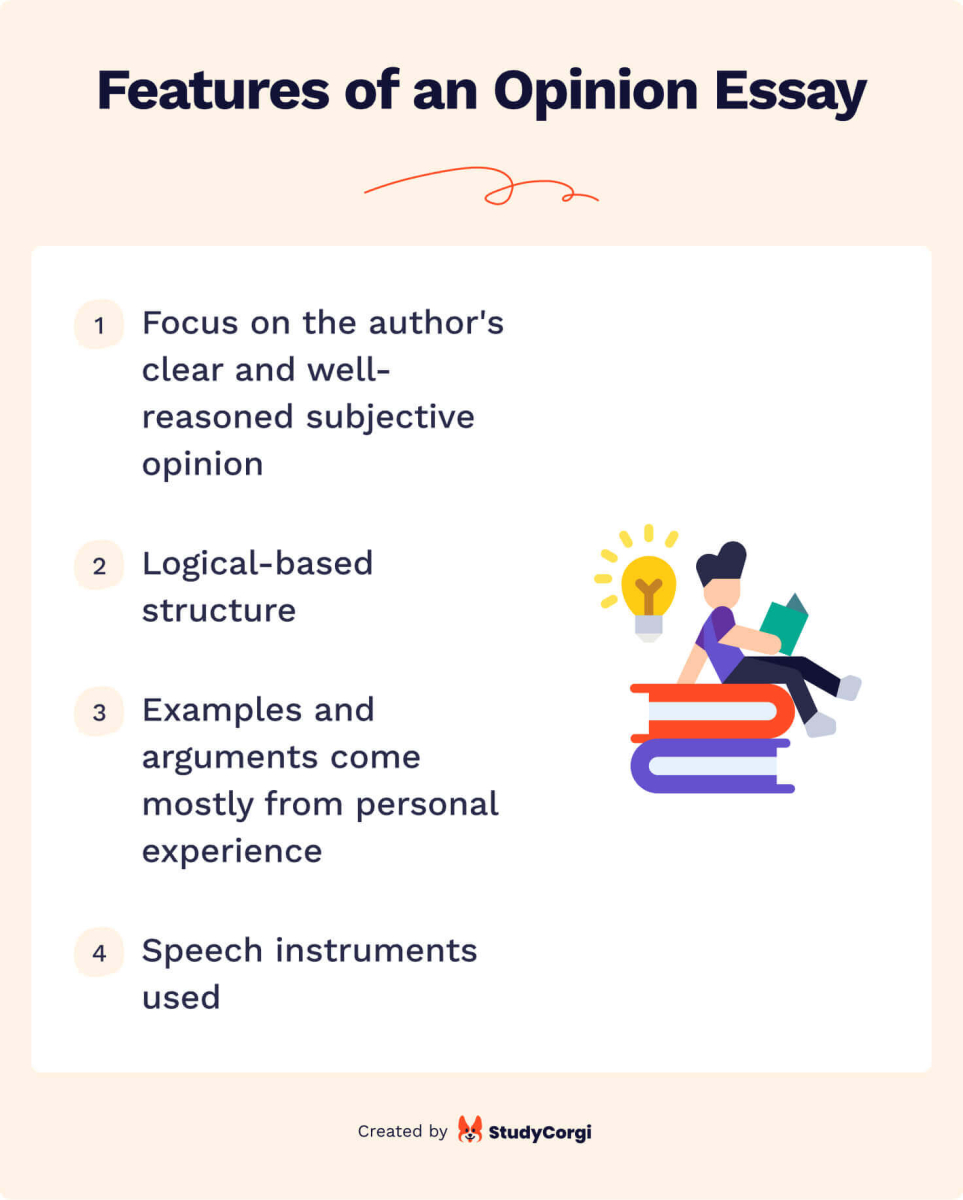
🗝️ Key Features of an Opinion Essay
Like any other type of writing, an opinion essay has characteristics that make it unique. And, of course, to compose a competent text, you need to know about them.
- Focus on the author’s clear and well-reasoned subjective opinion . All proofs, as well as the conclusion, are based on it.
- Logical-based structure . Moreover, it entirely depends on the intentions of the writer.
- Examples and arguments come primarily from personal experience . However, an author may use history and social life quotes and examples of literary heroes to prove their position.
- Speech instruments used . As an author, you will benefit significantly from using a variety of speech constructs . They can help you influence other people. Connecting constructs and clear speech will keep the reader interested and get the most out of the reader.
You just need to get used to all the features to get a little practice. You will succeed!
⚖️ Argumentative, Opinion or Persuasive Essay: the Difference
Before proceeding directly to writing the text, it is worth learning one more important thing. Even towards the end of high school, many people confuse opinion and persuasive essays. These papers look similar.
To help you distinguish the argumentative, opinion, and persuasive essays, we prepare a table of comparisons where you can easily indicate the difference between these papers:
Now let’s move on to which sections the essay consists of and how it should be written. You can safely use this information as a synopsis when completing the assignment.
So, the first one!
📃 Opinion Essay Format
As mentioned earlier, a specific opinion essay structure must be followed. Therefore, before you prepare writing, make up a small outline, which will contain all the components of the text and your ideas for their content. So, how to start an opinion essay?

Opinion Essay Introduction
Of course, any text starts with a short opening. This section should summarize the essence of the problem you are writing about. The main task of the introduction is to entice the audience and familiarize them with the paper’s main topic. Therefore, by the first paragraph, a person will build an impression of your talents.
Moreover, remember that the introduction should be catchy. How to write a hook for an opinion essay? In simple words, this is a proposal that should interest the reader and draw his attention. It should be subject-related and relatively accurate. All you have to do is show the reader that the topic of the essay will be critical and even touch it.
Let’s take a look at some opinion essay introduction examples from our authors, in which you can see all the listed components:
- As Ronald Reagan said in one of his speeches, everyone who advocates abortion has been born. The topic of abortion is very controversial, and people still cannot come to a standard solution. That is why, in this abortion opinion essay, I will try to sort out my thoughts and answer whether abortion is a panacea or a hidden evil.
- Global warming is a global problem. As Alexandria Ocasio-Cortez aptly put it, we cannot sit back while our planet is on fire. But can one person influence the fate of all humanity? I think so, and in this essay, I will try to explain my position
Of course, these examples are conditional, and you can change them as you need to achieve a quality result.
Opinion Essay: Thesis Statement
The thesis statement is the final sentence of an introduction . It is an integral part of the entire text. And if your essay will be evaluated, then the absence of the thesis will significantly underestimate the point. So how do you write the last sentence competently so that the reader will like it?
At its core, in the thesis, you should summarize everything that you indicated in the introduction and, in a nutshell, make it clear what will be discussed. You are expected to state your position on the issue clearly. And then, the entire text should be directed precisely to reinforce your words.
For example, take this essay topic: “ Is globalization a positive phenomenon? ” In this case, a good thesis would be “ In my opinion, globalization has many more advantages than disadvantages. ”
See how one small phrase can dramatically improve your overall performance score. Therefore, pay due attention to it!

Opinion Essay: Body Paragraphs
Finally, you come to the main body of your essay, namely the argumentation. The body paragraphs of an opinion essay are aimed at correctly explaining the author’s position to the audience. Here you are expected to have good arguments and examples that will become your assistants in proving your case.
Body paragraphs have two parts: an argument and an example supporting what you said. For example, you might say that the lack of responsibility for actions leads to the corruption of the mind and soul. And as an explanation to these words, briefly support your statement with the story of the protagonist of the novel by Jack London, “The Picture of Dorian Gray.”
Moreover, no one limits the number of these same arguments, and often it depends on the maximum volume of the text itself. The standard case is two good arguments, supported by examples from life or literature. Then you can be sure that the reader will correctly understand your idea.

🔗 Linkers and Transitional Words for Opinion Essay
Connecting structures are an invisible companion for the reader throughout the entire essay. They are also called linkers or transitional words . At their core, these two concepts mean the exact phrases. Their task is to make the text more readable and smoothly translate the reader from one idea to another. Moreover, all these constructions are divided into subgroups depending on their purpose. Let’s take a look at a couple of examples of good transition words for an opinion essay:
- In my opinion…
- It is clear that…, etc.
- It is widely known that…
- It is a well-known fact that…
- Research has shown that…
- There are definitely…
- It is a fact that…, etc.
There are also brilliant linkers for opinion essays on these themes:
- In spite of…
- However, etc.
- To conclude…
- In conclusion…, etc.
Using these constructions, you will significantly increase the consistency of your text and help the reader to perceive it better.
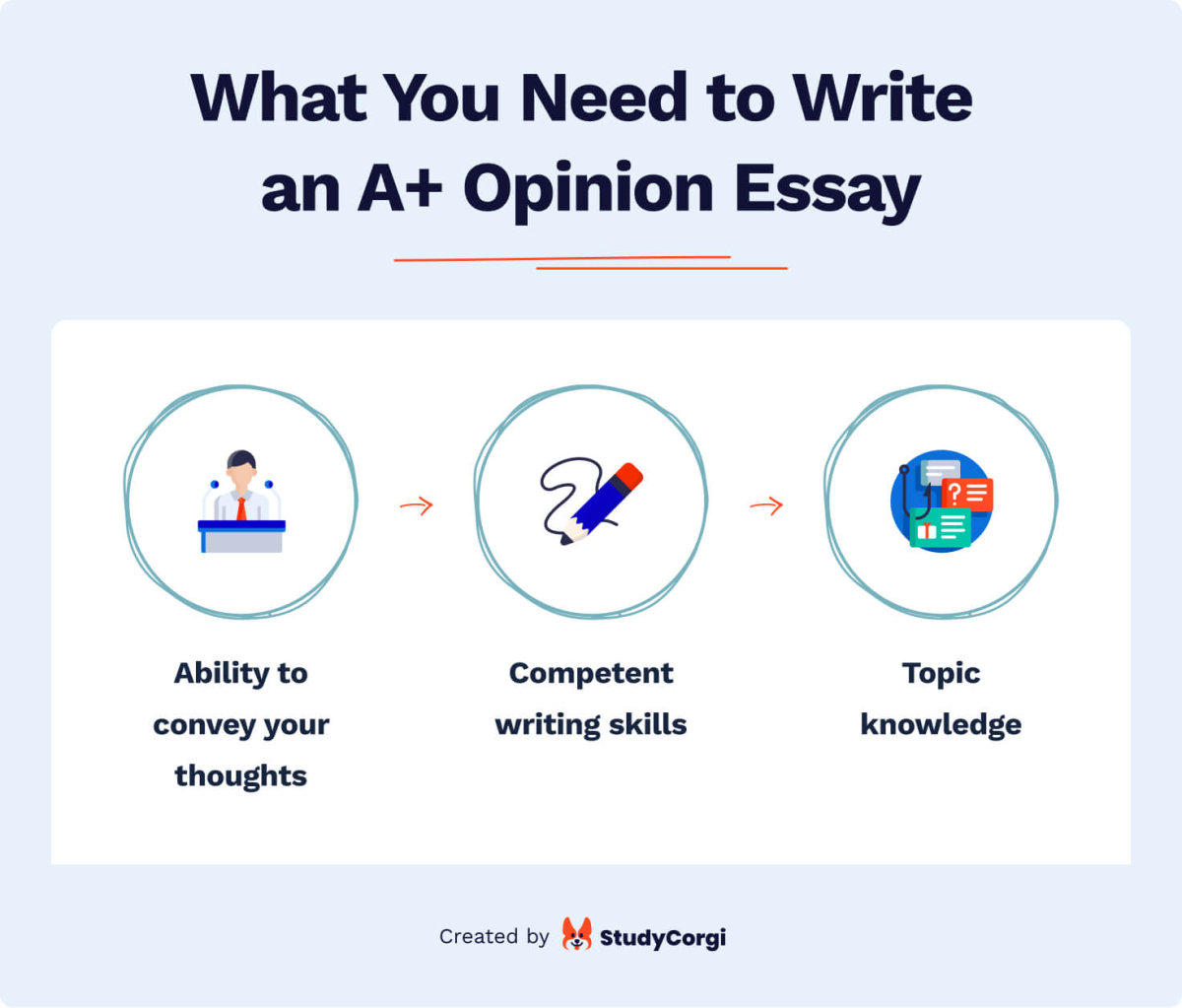
Now that you have a basic understanding of writing an essay, let’s look at some good opinion essay topics. Feel free to use them for your creative work and get good points.
💡 30 Opinion Essay Prompts
So, our team has selected 30 excellent opinion essay topics for you. Look for what resonates in your soul and get to work!
- Opinion essay: success in life depends on being successful at school. Many of us were assured that it is impossible to reach heights without a good performance at school. What do you think about it?
- Mobile phone addiction is the scourge of the 21st century. Give arguments from your life and tell about personal experiences.
- Opinion essay about GMO : pros and cons. For many, this topic remains a secret. It’s time to dispel all inaccuracies and find out the whole truth.
- Should university study be free? What is your position?
- Opinion essay about technologies in our life . What impact do they have?
- Compulsory vaccination : pros and cons. If you have any personal experience with this topic, feel free to share it.
- Opinion on abortion essay: do people have the right to choose?
- US neutrality in World War II : what would have gone differently?
- Opinion essay about video games . Is it an addiction or just leisure ? What do you think?
- Does the motivation from famous people have an effect, or is it a dummy? Do you have an opinion on this matter?
- Essay opinion on junk food : how dangerous it is. Everyone was warned that junk food and junk food kill the body, but maybe it’s all about the quantity?
- Parenting is the foundation of a child’s success. Do you think that the parents are responsible for the future education and work of their child?
- Opinion essay: buy nothing day or Black Friday sales. What do you choose and why?
- The advantages of living in a metropolis and a small town . Which would you choose?
- Essay: opinion about global warming . Do you think this is a real threat, or is it just a panic among people?
- Homemade food or dining out in restaurants? What do you and your family prefer?
- Social media impact opinion essay. Billions of people spend their time on social media . What consequences can this have for humanity?
- Consequences of increasing the budget for road construction. How will this affect our cities?
- Opinion essay: television promotes violence through broadcasting abusive behavior. Do you agree with this thesis?
- Humanity is destroying the ecosystem and making the earth uninhabitable. What arguments can be for and against?
- Opinion essay about homework : is this system outdated? How do you feel about this from a student’s point of view?
- Artists and internet bloggers make vast amounts of money. Do you support this?
- Opinion essay about racism in modern life. What are the dangers of this behavior? Tell us about your personal experience or give an example from the community’s life.
- Some people dream of changing their place of residence. Do you think that moving to another country will help you in self-realization?
- The best profession to choose opinion essay. What are your thoughts? Where would you like to be after finishing your studies?
- People prefer online communication over live communication. How do you feel about this trend?
- Opinion essay about same-sex marriages. For some people, this is unacceptable. What do you think about it?
- How can movies and television affect human behavior ? Do you think certain viewing films should be limited for people with a weak mentality?
- Opinion essay about immigration . Should the state provide maximum assistance to everyone who wants to get into it?
- Should people be allowed to carry weapons with them? What restrictions can be used, in your opinion?
These themes are ideal for getting good results.
Now let’s look at some small sample essays from our authors. You can see all the listed components and highlight some interesting ideas for yourself!
Climate change opinion essay, truth or fiction? (250 words)
Climate change has been heading the news for decades. Almost everyone is puzzled by this problem in the modern world, but is there any reason to believe that this is just exaggerated media panic? I think not, and in this essay, I will try to explain my position. The first thing worth paying attention to is the changes that we can see every day. But nature is changing, and this is noticeable with the naked eye. For example, you can look at how the temperature regime has changed over the past decades. In my region, real winter began in the last days of November. Then the temperature dropped to zero, and there was already snow outside the window. However, I would be thrilled to see snowfall this year, at least at Christmas. This raises questions about the veracity of statements from the media and various organizations. You should also look at the publicly available facts. International organizations conduct ongoing research, which clearly shows that the climate is changing, and it is difficult to fix it. One of the most respected teams, the Intergovernmental Panel on Climate Change (IPCC), regularly issues climate change reports. And in them, you can see what reasons for this and what it can lead to. This is excellent and detailed work that deserves everyone’s attention. In summary, we can say that climate change can be seen with the naked eye. This problem affects all people on the planet, and to ignore it is to expose yourself to great danger. Humanity is destroying our world, and can we deny it?
Opinion on death penalty essay, is it moral? (300 words)
Many international treaties have long banned the death penalty, but this does not prevent several countries from regularly using it against criminals. I think this is a terrible practice that has no place in our civilized world. The argument for this may be the simple idea that every creature has a right to life. And this right cannot be taken away under any condition because you can take a dangerous path by creating an incident. One Russian scientist Andrei Sakharov spoke very accurately about this: “The existence of the institution of the death penalty dehumanizes society. I spoke out and am opposed to the death penalty also because this punishment provides for the presence of a constantly terrible apparatus of executors, the whole institution of the death penalty ”. I fully support his words because there is no reason not to kill the second after killing once. It should also be understood that people sentenced to death are not always, in fact, guilty. There is a miscarriage of justice, and no one can be insured against it. The most resonant was the story from 1949. Timothy Evans was hanged on charges of murdering his pregnant wife and two-year-old daughter. Four years later, it wasn’t until serial killer John Christie, who had testified in court against Evans, confessed to the murder. He was hanged, and Timothy Evans was posthumously rehabilitated. The Timothy Evans case is one of the most remarkable stories in the death penalty dispute. To summarize, I can say that there are many reasons for the absolute ban on the death penalty in the world. This is not only inhuman but can lead to unnecessary deaths. Fighting crime in this way, the people who defend the law themselves break it.
Opinion essay on smoking: should the state intervene? (300 words)
Smoking is a global problem. Experts predict that in the coming decades, the number of smokers will reach one billion people worldwide. In my opinion, governments should take strict measures to limit nicotine use among the population. Firstly, smoking poses enormous hardships for addicts. All this can increase the number of cancer patients and people suffering from heart and lung diseases. At the same time, it can be tough to give up cigarettes on your own. We all understand that nicotine in quantities that a person receives from cigarettes is not characteristic of the body. Therefore, our body can react in an extraordinary way to its appearance. An example may well be my family, suffering from heart problems for several generations. All men, from my great-grandfather to my father, visit doctors all the time. And they all have one reason – excessive smoking. At the same time, they cannot quit smoking on their own due to a banal addiction. Secondly, smokers can damage the health of other people nearby. It is a well-known fact that secondhand smoke is no less harmful than the regular use of nicotine. And unfortunately, non-smokers, in most cases, have no choice. You can see it yourself in everyday life. People who are forced to breathe smoke while sitting at bus stops or in public places simply cannot do anything about it. The only way to help them is to introduce more and more restrictions from the state. So, in conclusion, we can say that smoking is not only a problem for the person addicted to cigarettes. Everyone suffers from this, from his family to strangers around him. Unfortunately, these difficulties cannot be resolved on their own. But is the state and society doing enough to help people with addiction?
❓ What Are the Characteristics of an Opinion?
The opinion is an entirely subjective position formed due to the influence of certain factors on the mind. It can be characterized as a personal judgment, point of view, and not an exact fact. However, an opinion can be valid only if it is supported by actual knowledge. Otherwise, it can be called more of a guess.
❓ How Many Paragraphs is an Opinion Essay?
The standard structure consists of four main parts: an introduction, two body paragraphs, and a conclusion. Nevertheless, if it is not specified in the assignment, it can deviate slightly from such a system. It is pretty standard practice to write three or more body paragraphs. Conversely, if one section fully covers the topic, then the need for other explanations may disappear.
❓ What Is the Structure of an Opinion Essay?
An essay structure is a precise sequence of your thoughts, which will help the reader to understand the topic better. The standard system consists of an introduction, two arguments, and a conclusion. In addition, there are less visible components like a hook, thesis statement, and linkers words. You can expand the structure by adding more argument parts. However, the sequence must remain the same.
❓ What Is a Supported Opinion Essay?
An essay based on a person’s personal opinion implies a clear statement of the author’s thoughts on a specific topic. However, to show understanding of the problem, one should rely on facts, research, or examples from life. A supported opinion essay is precisely when the author’s opinion is based on objective factors.
📎 References
- Basic Essay Structure. Port. Ac
- An opinion essay. British Council
- How to Write an Opinion Based Essay. UCT Language Centre
- Recognizing Transitions. MPC.Edu
- Writing Your Paper: Transitions. EWU.Edu
- Transition Sentences. The College of Saint Rose
- Writing Effective Conclusions. Richmond University
- Conclusion – How to write an essay. University of Newcastle
- Writing a thesis statement. IELTS Buddy
- CCSS Argument versus Opinion Writing
- Essay Structure. Harvard College Writing Centre
- Share to Facebook
- Share to Twitter X
- Share to LinkedIn
You might also like
List of 350 brilliant nursing research topics to investigate in 2024, ultimate list of 265 research topics for college students, memorable human trafficking essay: topics & outline [2024].
An opinion essay

Learn how to write an opinion essay.
Do the preparation task first. Then read the text and tips and do the exercises.
Preparation
MultipleSelection_MjMwNTM=
Information will soon be so easy to find on the internet that people will not need to remember anything. Do you agree?
Nowadays all the information we could ever need is available online and some people say that means the end of having to learn anything.
It is true that these days everything you want to know is a few clicks away as long as you have internet access. However, not everyone has working internet all the time, for example in certain buildings or remote locations, so we do need to be able to remember information. Moreover, it takes time to look up everything you need to know online, whereas remembering something is immediate. The human memory is a much more efficient system.
Another problem is the quality of the information online. How do we know if it is accurate or reliable? We need to think about other facts we know and remember how to compare information from different websites. Knowing (and remembering) how to find certain information will be more important than knowing the information itself.
Finally, the internet is a good tool but it is not a useful replacement for our brains. If we did not remember anything, we would all spend even more time on our phones and computers than we already do, which is not good for society.
In conclusion, the internet offers us many things but it is still important to use our knowledge and memories. We need our memories to function without the internet and we also need to know how to use the internet properly.
- Read the question carefully. Respond to all ideas in it or all parts of it.
- Plan your ideas first and then choose the best ones.
- Introduce your essay by restating the question in your own words.
- Show understanding of both sides of the argument.
- Use linking words to connect your ideas.
- Draw your conclusion from the main ideas in your essay. Don't introduce new ideas at the end.
What do you think about the question? Would it be better or worse if we never learned anything and just used the internet instead?
Language level
It would be worse. If we only look for information on the internet, for everythingg and every time when we have a question about something we will become ''rusty robots''.
In other words, our minds, without exercising the creativity and memory of our brains, will be almost completly out of purpose. What's more, we will be lazy and with a slow capacity of thinking properly.
- Log in or register to post comments
It is evidently known that in recent days, the exchange of information is progressive over the network of various channels which we call it as Internet. Experts have made some definite predictions about the availability of data and information on the above mode of communication in near future. This particular development is totally agreeable. With respect to the technological advancements pertaining to the above, the human life shall be prepared to be compatible with the communication platforms on the network of servers. The key strengths will mainly focus on speed of communication, less errors and information accuracy. This aspect of technological development will eventually replace the traditional modes of information storage. This requires no effort in preservation of information on physical devices as all the core information will be stored in virtual servers. On the other hand, the above paradigm shift in terms of data centralization will certainly replace human brains. This attempt will not trigger any living beings to memorize information physically. It is quite obvious that our brains are limited and restricted with space constraints. Hence, this technology of information storage will drastically replace these drawbacks. Overall, this phenomenal trend of networking has provided a seamless mode of gathering, interpreting and storing information. At the same time, the consequences will be tremendous and noticeable as it will lead to an era where in people across the globe can surf and search their expected piece of data with-in no time. Practically, they don’t have to bother about any challenges related to failure of storage elements. Finally, this pattern of information storage is promisingly going to be accepted.
I think the use of the internet is not only in conflict with learning, but It has made the speed of learning faster and more comfortable.
On the one hand, With the advent of the internet and access to data whenever we want, we were able to free our minds from memorizing a lot of unnecessary data. It caused that instead of spending our time to remember the formulas and data, we use our time for a deeper understanding of the concepts. Concentration on understanding was a big step in order to make us more clear about how to apply scientific concepts practically, and It made the evolutionary process of turning scientific concepts into experimental tests go faster. Going through this evolutionary process quickly, in turn, caused, firstly, the faster growth of modern technologies and, secondly, the creation of many new data, concepts, and sciences. And now the data volume is so much that not only you can never remember or learn them, but you have to choose the best one that works for you. Somehow, the internet has changed how to learn. It has focused on analyzing the options and choosing the best one to learn Instead of memorizing a bunch of content.
On the other hand, Theoretically speaking, One of the laws In the world is that everything can be useful or harmful in turn. This law also applies to the internet. In fact, how to use the internet determines whether it is useful or harmful. Like many other tools that have been invented such as smartphones, smartwatches, electric cars, and so on we have spent time learning how to use them. In order to get the best out of the internet and don't waste our time, we must take the time to learn how to search. The searching skill is the most important one that helps us find better results.
In conclusion, Given the two analyzed reasons above, I agree with the idea that easy access to Information makes people get rid of memorizing lots of data. But this has nothing to do with the quality or quantity of learning.
I think it depends on the type of information. Some information are easier to remember, and hence it's more efficient to have them in memory instead of looking for them online. However, some complex information is offered online, and it will be impractical if we tried to remember it. Additionally, I believe that learning is not just about acquiring knowledge. It's about learning how to think with this knowledge available and solve problems efficiently. That's why the internet is considered a valuable tool to promote learning, not to replace it.
Nowadays we are witnesses how far technology has developed in a short time. A huge of information is backing up on internet and if you have access of surfing you can find any information that you are looking for. However, there are some relevant aspects that should be taking into account when we are talking about using always internet instead of learning. In this sense, the purpose of this essay will be to explain why it is not a good idea. Firstly, as you know, most of the information on internet is fake. For that reason, it is impossible the learning process can be replaced by internet use. If you are looking for reliable information you have to learn how it works. In other words you need of learning even if you want to use internet all the time because you have to discern what of all information is useful for you purpose. For example, if you are a student and want to write an essay about a specific topic you likely have to search for the best information if you want to get a job position or scholarship. Secondly, there is a high demand for professionals who have specific skills in the field that they are pretending to be involved. That’s why learning always is a must for satisfying the requirements of companies and institutions. For instance, in the education field, the main aim is the learning and knowledge which are essential on a daily life to be an expert in your field of action and these skills can’t be acquired through internet surfing. To sum up learning and knowledge are fundamentals in a current world that is demanding professionals highly qualified even in our daily live and the internet is far away of satisfying the required skills that you get every day through the practice, research and networking.
I think it become worse and dangerous for our society, we need to control it making rules. Without internet, many skills and knowledge could´nt be used.
I believe that, The internet become even more dangerous for young people who barely discovered the world around them, If they count on it for seeking information without parental supervision, it would be a disaster!
In nowadays,there are many ways to reach information.The Internet is just one of them but maybe most promising one.The Internet helps us to find information easily and efficently.
However there are some negative sides of Internet.For instance realibilty of information.There are no real control on Internet.I reckon there will not be soon.This reduces the trust in internet.This is why People will always need another source to be make sure and need to remember information.
It is also necesseray for objectivity. You can not just have one source and expect true and impartial information. It is against nature of science.This is not how science works.People must have and process the information.In this way we expand our knowledge.When we make brainstorm we always end up with another information. If we don’t have and process the information how Science works?
I suppose in the future People will never trust completely to Internet. They will always need another source and they will need to interrogate source of information.In conclusion Internet is by far most promising invention People have ever invented.However Internet is not beyond our brain and imagination.We will always need to posses and process the information.
It is about my hometown: My hometown is a beautiful, attractive and cool. N'beika is one of the most famous places in Mauritania where attractive views and economic capacities are in. It is located in Tagant which is in middle of the map. Therefore, It is one the biggest cities in the country. As there are interesting geographical features such as: high Mountains, nice valleys, light hills and wonderful pools. Historically, N'beika played an important role in culture, trade exchange and fighting colonialist. Also it has saved historical landmarks, for example: manuscripts, books and cities which the most important is Gasr Albarka. In the north, there have tourist views and in the East big mountains with lovely valleys like Matmata where there are some Alligators in and other attractive animals. As well as from the south and the west there are some fields, forests and farms. Moreover, people are interested in agriculture, trade, development and education. Furthermore, there are many schools and Mahidras and three colleges providing well-deserved education to students. What's more, mall shops is offering demands and created jobs for unemployment. There are different favourite for people , some of them are crazy about football as youth, and some people like doing agriculture and development. Moreover, there are entrepreneurs doing a small business like selling clothes, pitch, barbershop... etc. In conclusion, N'beika is a gift of Allah that has given to people to spend nice moments in order to feel happy and to invest for everything we want due to gain lots of money .
I believe it is amazing updated technology which has helped us a lot in our lives. In todays era everyone has access to internet over the globe. you can easily find all the information on internet that is required to you. Even though learn many new skills which aren't even taught you from the help of internet. it is good help for book writer like us where we can be part of book writing communities or book writing resources to enhance our skills and provides more guidance to others.
Online courses

Group and one-to-one classes with expert teachers.

Learn English in your own time, at your own pace.

One-to-one sessions focused on a personal plan.

Get the score you need with private and group classes.
The Ultimate Guide to Writing an Opinion Essay
04 November, 2020
14 minutes read
Author: Elizabeth Brown
Picture this. You're walking on a tightrope that's about 70ft in the air, with no protective gear and no expert to guide you. While this may seem like an extremely dramatic scenario that you'd never find yourself in, this is exactly what opinion essays seem like to many people. For a lot of people, especially students, writing an opinion essay can be very tricky. How do you strike a balance between stating your opinions and dishing out pure facts? How do you structure an opinion essay?
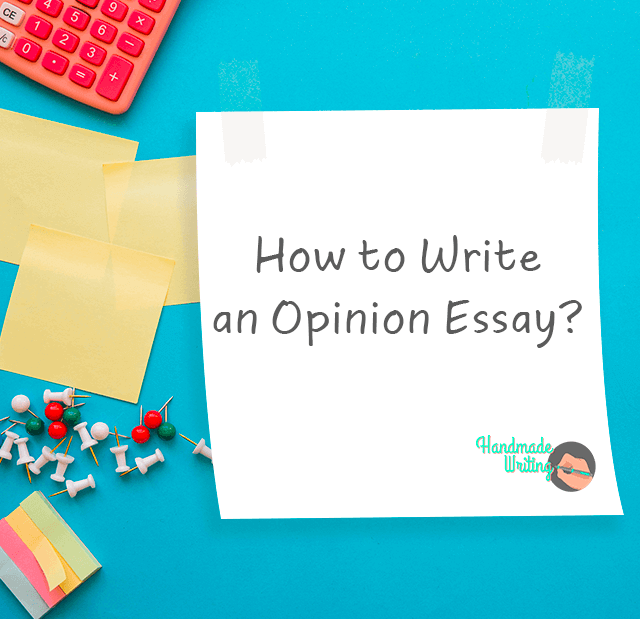
This guide will provide an answer to all the questions racing through your mind. Let’s get down to brass tacks, shall we?
What Is an Opinion Essay?
Just like the name implies, an opinion essay is a type of essay that outlines and reflects the writer’s point of view. However, it is important to point out that in writing an opinion essay, it isn’t enough to just present your opinions or point of view. You will also need to support them with sufficient logical reasoning and examples.
In most cases, you may outline or suggest an opposing viewpoint and then back it up with arguments that point out its flaws.
At this point, you’re probably asking one question that every essay writer has asked at some point in their lives: ‘isn’t an opinion essay the same as an argumentative essay? Absolutely not. In argumentative or persuasive essays, you have to explore the topic from different viewpoints while providing counterpoints at the same time.
On the other hand, opinion essays only require you to focus on your opinion about the topic.
Opinion Essay Outline
Looking to write an opinion essay? Relax and take a deep breath. Just before you get down to the main task of writing the essay, it’s important to draft an outline first.

With the right outline, writing an opinion essay would be as easy as passing a knife through butter.
The typical opinion essay format looks like this:
- The introduction
- The main body
- The conclusion or concluding statement
The Introduction
Not sure how to start an opinion essay? Well, start with the introduction. The introduction clearly presents the topic or issue and states your opinion as well. Here, you need to include a thesis statement which basically summarises the main point of your essay.
Writing an introduction seems pretty straightforward. However, there’s a slight catch to it. How do you keep your audience from rolling their eyes or giving your paper to their dogs before they’ve even read it?
It’s simple. Include a hook to get them engaged as soon as they start reading. This way, your audience will get interested and stay engaged throughout the reading process.
Your hook could be a rhetorical question. It could even be a quotation or a sentence from a popular book or play. All that matters is keeping your audience engaged.
The Main Body
The main body usually contains points that support your thesis statement. Here, you would need to write different paragraphs that address separate aspects of the topic. You would also need to support each paragraph with logical reasoning and facts.
Each paragraph in the main body of the essay should begin with a topic sentence. Subsequent sentences in the paragraph will then contain arguments or evidence that back up the topic sentence.
When it comes to writing the main body of an opinion essay or any essay at all, it is important to address one main idea in one paragraph. Do not begin a new paragraph only to continue talking about the previous idea.
Each new paragraph should introduce a new idea.
The Conclusion
The conclusion or concluding statement basically restates your opinion in different words. An important point to note is that the conclusion isn’t an avenue for you to state new ideas that you forgot to address in the body.
You can only say: “Oh! And one more thing!” in real life conversations. It has no place in the concluding statement of an opinion statement.
Instead, try ending your essay with a provocative question, recommendation or warning.
Basic Expressions to Use
When it comes to writing an opinion essay, it is important to use the right phrases and expressions. This way, you can convey your thoughts and viewpoints succinctly. Here are some basic expressions you could use:
- I strongly believe that…
- As far as I am concerned…
- In my own opinion…
- It seems to me that…
- I think that…
- It is popular knowledge that…
- This proves that…
- Despite the fact that…
- Studies have shown that…
- This supports the…
These expressions are quite basic and would help you link thoughts, facts and information perfectly. You could also create your own expressions. Just make sure you use the right nouns, adjectives, tenses and linking words.
Opinion Essay Examples
If you’re new to the world of opinion essays, you may still be unsure about how to write a perfect essay. In this case, it’s always best to draw inspiration from well-written opinion essay examples.
Here are some excellent examples that could guide you:
https://learnenglishteens.britishcouncil.org/skills/writing/intermediate-b1-writing/opinion-essay
http://ielts-academic.com/2012/06/24/ielts-writing-task-2-opinion-essay-with-sample-answer/
30 Opinion Essay Topics
Looking for the perfect topic for your opinion essay? Whether you’re sourcing for an assignment topic or you just need to keep your fingers busy by practicing, there are tons of opinion essay topics out there.
In some cases, you may be required to come up with your own topic. If this is the case, there’s no need to panic or try guessing new topics with the “Eeny, meeny, miny, moe” method. That almost never works – unless you’re a toddler, of course.
Instead of panicking, here are some excellent topics you could either use or draw inspiration from:
- Do students in the 21st century rely too much on technology?
- Should the Internet and social media platforms be censored?
- Social media limits the depth of human relationships. Do you agree?
- Is cyberbullying as bad as physical bullying? Which should parents be more concerned about?
- Is it right for parents to go through their kids’ phones to protect them from cyberbullies?
- Global warming doesn’t exist. Support your response with reasons and examples.
- Is there sufficient ecology education in high schools?
- Medical marijuana should be illegal.
- Should children be able to decide in critical medical situations?
- Homeschooling has immense psychological benefits for children.
- Can reading help PTSD students heal?
- Paper books have no place in today’s technological world.
- Can science fiction help to advance technology?
- Do games have cognitive effects on adults like they do on children?
- People believe that face-to-face interaction is superior to other indirect forms of communication. Do you agree?
- Salary teachers should be paid depending on how much their students and pupils learn.
- Is personal experience the optimal way to learn or gain knowledge about life?
- Change in one’s clothing or mode of dressing can alter the person’s behaviour. Do you agree? Support your position with factual statements.
- Reading novels and other forms of literature has a larger cognitive effect on children than watching movies.
- Should uniforms be mandatory in schools or should students be able to wear what they want?
- Companies should screen potential employees for mental and psychological issues.
- In some cases, when students move to new schools, they encounter problems like bullying. How can schools help to solve these problems?
- Borrowing money from friends can put a long-term strain on the friendship. Do you agree?
- Has social media changed the way we view people and the world at large?
- The Internet has a role to play in the rising rate of eating disorders.
- Small town life helps to foster long-lasting human relationships.
- Are e-books damaging the reading culture among students and teenagers?
- Parental communication is vital in building trust within families.
- Social media has spiralled intentional plagiarism out of control.
- Why war crimes should be punished.
Writing Tips for an Opinion Essay
At some point in your life, you’d most likely be required to write an opinion essay on a specific topic. Whether you’re a college or a high school student, there are several things to keep in mind when embarking on this journey.

Fortunately, we have outlined a few tips that would help you write the perfect essay.
Here are some of them:
Carry out Research on Your Topic
Before you start writing an extensive opinion essay, it is important to research the topic first. Here’s why: it’s almost impossible to have a solid opinion about a topic you know nothing about. Carrying out research on a particular topic would help you understand all aspects and nooks of the topic.
For instance, if you had to write an opinion essay on “The importance of reading games in learning exercises”, you would need to find out what reading games are. You would also need to research previous studies on the psychological and cognitive effects of reading games on children.
This way, you will be able to form your own opinion about the topic.
Cite and Acknowledge Popular Arguments Related to the Topic
In most cases, you would be writing on a topic that has been debated or argued about in the past. As such, it is important to explore popular arguments that have been made before. See how they fit into your own point of view or opinion.
If there are any similarities or differences, explore them in your writing.
Let’s consider our previous sample topic which addresses the importance of reading games. When writing an opinion essay on this topic, you could acknowledge popular arguments this way:
“ Although many parents believe that reading games are a distraction, others believe that it makes the learning process easier and more fun. “
Watch Your Tone
Let’s admit it: it’s easy to get carried away when you’re writing an opinion essay. However, even though you’re really passionate about airing your opinions, you also need to be mindful of your tone.
Avoid using derisive language to convey your thoughts.
For instance, do not say:
“ Reading games are not teaching-focused and as such, are an excuse for lazy teachers who don’t want to do their jobs “.
Instead, you could say:
“ Reading games are not teaching-focused. Instead, they could create an avenue where children get distracted and play without actually learning anything “.
This way, you can communicate your opinions and thoughts without sounding unprofessional. Remember that your audience is made up of people that come from different backgrounds and walks of life. You definitely don’t want to offend them in the process of airing your opinion.
Use Evidence and Facts to Back up Your Claims
Even though you’re writing all about your opinion, it is important to back up your claims with evidence and facts.
While researching your topic, search for evidence and factual statements to reinforce your position. Typically, factual statements have more impact than emotional or subjective statements. As such, it is advisable to fill your supporting sentences with facts and evidence.
For instance, you could say something like:
“ Studies have shown that children are 60% more likely to learn faster when a game is introduced into the learning process “.
With a statement like this, you would have successfully given more credibility to your point of view.
Make Use of Transition Statements
When writing an opinion essay, transition statements help to link your personal opinions to already existing arguments. They could also portray the flaws in those arguments.
For a clearer picture, take a look at this statement:
“ Although there are concerns that reading games may distract children, I think it is particularly useful in making the learning process more enjoyable, especially for children who struggle with reading “.
Use Formal Language
When writing an opinion essay, it is important to use formal language throughout. Even though you can decide to use informal language, keep various professional and formal words such as: “furthermore”, “thus”, “moreover” and so on.
In the same vein, avoid the use of Internet slang words like “OMG”, “LMAO,” etc.
Write an Opinion Essay with HandmadeWriting
Not sure how to write an opinion essay? We’re here to help! At HandmadeWriting , we create perfectly written essays to suit your needs. Our team of seasoned essay writers can imitate your desired writing style and churn out an excellent paper even before the deadline.
Ready? Contact us today!

A life lesson in Romeo and Juliet taught by death
Due to human nature, we draw conclusions only when life gives us a lesson since the experience of others is not so effective and powerful. Therefore, when analyzing and sorting out common problems we face, we may trace a parallel with well-known book characters or real historical figures. Moreover, we often compare our situations with […]

Ethical Research Paper Topics
Writing a research paper on ethics is not an easy task, especially if you do not possess excellent writing skills and do not like to contemplate controversial questions. But an ethics course is obligatory in all higher education institutions, and students have to look for a way out and be creative. When you find an […]

Art Research Paper Topics
Students obtaining degrees in fine art and art & design programs most commonly need to write a paper on art topics. However, this subject is becoming more popular in educational institutions for expanding students’ horizons. Thus, both groups of receivers of education: those who are into arts and those who only get acquainted with art […]
How to Write an Opinion Essay: Examples, Structure, & Tips
An opinion essay is a formal piece of writing which presents the author’s point of view on a particular subject supported by reasoning and examples . The opposing viewpoint is also suggested, but it is followed by arguments that show its inconsistency. Take a look at the guide prepared by Custom-writing experts to learn how to write a perfect opinion essay!
Our specialists will write a custom essay specially for you!
- 📑 Essay Outline
- 🏇 Introduction & Conclusion
- 💬 30 Basic Expressions
- ✅ Dos and Don’ts
- 👌 Essay Examples
🏁 Concluding Remarks
🔗 references, 🔤 writing an opinion essay: basics.
You may be wondering: How do I write an opinion essay? How is it different from a persuasive, an argumentative, or a pros and cons essay ?
It’s simple: When you write an argumentative or persuasive essay , you should provide counterpoints and describe the essay topic from different perspectives. In an opinion paper, you don’t have to focus on the advantages and disadvantages in comparison. Instead, focus only on your opinion about the issue .

You may say: “I’m afraid to take a stand,” or “I don’t know what to say.” Relax. There’s nothing to worry about if your arguments are based on well-researched data. Speaking about opinion essay topics, some students find it difficult enough to choose the perfect one. But it’s not so hard: Think about something that engages you and that you feel strongly about.
Do you still have no clues about what to write? Check our 100 free ideas for an argumentative or persuasive essay and choose the topic that you have a strong opinion on. Then pick up a few reasons supporting your point of view and gather the facts that you’ll use as evidence.
📑 Opinion Essay Outline
The next step is to write an opinion essay outline . First of all, it will help you to overcome the fear of the blank page. Second, you’ll have a broken-down list of ideas and an organized place for your random thoughts. This will help you write an assignment faster.
Just in 1 hour! We will write you a plagiarism-free paper in hardly more than 1 hour
Here’s an example of an opinion paper outline:
- An introduction . Write a thesis statement and the reasons that support your opinion. Give your readers a hook to engage them with the topic
- The main body . Break it into several paragraphs where you provide arguments and supporting examples, statements, and facts.
- A conclusion . When ending a paper, restate the main thesis and summarize the central points of the essay.
Develop an outline while you’re researching the topic and place the pieces of evidence where they make the most sense. You don’t have to write the whole assignment at a time. Just put stand-alone examples and facts in the places where they should go.
A well-prepared outline for an opinion essay is almost 70 percent of the work. All you’ll need to do is simply join your arguments by bridging the language.
🏇 Opinion Essay Format: Introduction & Conclusion
After you’ve finished the outline, you will have all of your facts organized. But how do you start an opinion essay? It’s time you learn how to develop an introduction.
The introduction paragraph is a kind of roadmap describing the path your paper will take. Its primary goal is to prepare your readers to dip into the text. An opinion essay introduction secret is to give your readers a hook, grab their attention, and make the rest of the writing irresistible. After hooking your audience, introduce the topic and briefly describe supporting reasons to expand on in body paragraphs.
Receive a plagiarism-free paper tailored to your instructions. Cut 20% off your first order!
The opinion essay conclusion wraps up your paper. It’s a summary that broadly covers your ideas and allows your readers to understand your arguments.
Apply the following techniques to start and finish your opinion paper:
- Address the reader directly
- Start with a quote
- Use thought-provoking or rhetorical questions
- Refer to a striking or unusual fact, idea, or situation
💬 30 Sentence Starters for Your Opinion Essay
When it comes to opinion writing, a lot of students can’t explain their point of view. This shows a lack of critical thinking skills and leads to low grades. Even the perfect opinion essay format won’t save the situation in this case.
If you need a quick fix for your assignment, check our list of transition words and phrases to help you start putting your opinions:
- As far as I am concerned, …
- I am (not) convinced that …
- In my opinion/view …
- My opinion is that …
- I (firmly)believe that …
- I (definitely) feel/think that …
- I am inclined to believe that …
- Personally, I believe that…
- It is clear that…
- It seems to me that…
- In my mind…
- As I see it…
- My principal reason is…
- Another reason is…
- It is widely known that…
- It could be argued that…
- The well-known fact is…
- Research has shown that…
- For instance/for example…
- This suggests that…
- It would seem that…
- This proves that…
- This supports the …
- Even though / Although…
- In contrast…
- Despite the fact that…
- In spite of…
- In order to…
- In conclusion…
And don’t forget to use nouns, adjectives, and adverbs, or make your own phrases.
Get an originally-written paper according to your instructions!
✅ Dos and Don’ts of Opinion Writing
Do you need more expert advice on how to write a great essay?
Keep reading!
Basic Dos in Writing an Opinion Essay
- Use formal style . Write your assignment as if you are giving an important speech.
- Avoid slang and jargon .
- Introduce the topic clearly . Avoid unnecessary phrases and useless facts that do not relate directly to the topic.
- Outline the main ideas . Start each paragraph with a clear topic sentence.
- Use generalizations .
- Use the present tense when writing an opinion article.
- Properly cite your sources .
- Stay brief . Especially when writing conclusions. If you don’t feel like a professsional summary typer , use specialized tools.
- Be logical . Make sure that there is a logical sequence that allows your readers easy to follow.
Basic Don’ts in Writing an Opinion Essay
- Don’t use colloquial expressions . Even though the slang language is expressive and vivid, jargon words come and go quickly.
- Don’t use short forms . Replace the contractions with the non-contracted versions of the words.
- Don’t use over-generalizations . Stay very precise.
- Don’t use statistics without proper referencing .
- Don’t give personal examples . Stick to a formal writing style and mood.
- Don’t repeat arguments . If you have a few similar facts, group them as a single argument.
- Avoid unnecessary abbreviations . Your reader should understand what you’re writing about.
- Don’t overuse short and straightforward sentences . They are not typical for academic writing.
- Don’t use an imperative voice .
- Avoid exclamation marks, parentheses, dashes . Try to be discreet.
- Don’t address your readers as “you” .
- Don’t use emotive vocabulary .
👌 Opinion Essay Examples
Do you want to better understand what an opinion essay is? You are welcome to use our opinion essay examples! Reading them will help you gain an insight into this form of academic writing.
Opinion Essay Example #1
The USA is a multinational and multicultural country that is advanced in many areas, including healthcare, medicine, and science in general. However, some of the experiments, such as the syphilis studies discussed in this paper, show that the country is still in the process of overcoming intolerance, racial segregation, and social inequality. Talking about these studies aloud brings the question of research ethics to the forefront. In particular, people who participated in those scientific experiments were misled and misinformed about their health. The research group observed how the participants suffered from the disease’s symptoms until death (Brandt, 24). There are a number of diseases and conditions that have not been researched enough. The experience gained during the studies in Tuskegee and Guatemala should be used to eliminate the possibility of unethical conduct and ensure transparency in all the activities.
Opinion Essay Example #2
To confront cyberbullying effectively, it is vital to know how to identify what it is and spread this awareness among the children who may unwarily become participants. The tendency to raise this issue in the scientific and public spheres has positive dynamics. As there is legal protection for cyberbullying victims in the USA, it is vital to detect harassment cases. For this purpose, parents and teachers should cooperate to create trustworthy relationships so the child can ask for help from adults. That is why a high level of emotional support from parents and peers is necessary to combat bullying before it has occurred.
Opinion Essay Topics
- Your personal view on money and expenditures.
- Analyze your attitude towards obesity as a public health problem.
- Give your opinion on the importance of container deposit legislation.
- What do you think of different belief systems?
- Discuss your point of view on The Scream by Edvard Munch.
- Describe your opinion on the climate change issue.
- What do you think of the media’s influence on people’s views ?
- Your opinion on the film Argo directed by Affleck .
- Express your opinion on diets and weight loss programs.
- Analyze the impact of war on society and present your opinion.
- Present your opinion on the question of gay marriage .
- Describe your attitude towards gender stereotypes .
- Do you support the Biblical point of view on divorce ?
- Explain what you think about racism in employment .
- Discuss your attitude to photography.
- Describe what love is , in your opinion.
- Give your opinion on genetic engineering .
- Analyze the necessity of vaccination for public school students and present your opinion.
- Express your views on the death penalty .
- Discuss your views on aging changes .
- Do you like the music of a Classical Era?
- Is it ethical to use animals in research , in your opinion?
- Do you think the government should increase the minimum wage ?
- Explain whether you agree that soccer is one of the most popular sports in the world.
- Do you think the Internet plays an important role in your life?
- Describe your point of view on the controversial topic of human cloning .
- Present your opinion on tattoo s as a form of art.
- What does the ideal social meeting place look like?
- How do you think bullies should be punished?
- Do you support the opinion that celebrities should be positive role models ?
- Is remote work more convenient than working in an office?
- Describe your attitude towards social networks .
- What is justice , in your opinion?
- Give your opinion on American football .
- What do you think about classical music?
- Is the government monitoring its citizens justified by safety concerns?
- Explain what you think about steroid use in competitive sports.
- Discuss the necessity to ban violent computer games .
- Your personal opinion on using cell phones while driving .
- Do you think the government should interfere with the contents of TV shows ?
- Express your opinion on net neutrality .
- Describe your views on online dating .
- Is protectionism necessary for saving a country’s economy?
- What do you think of a vegan lifestyle ?
- Present your attitude towards physician-assisted suicide .
- Do you support the opinion that college athletes should be paid ?
- Your point of view on cigarette smoking and suggestion to ban it.
- Explain whether you think that public colleges and universities should be tuition-free .
- How do you understand responsibility?
- Express your opinion on canceling grades at schools .
Thank you for reading! Our free tips will help you get through any kind of essay. Still, if you’re stuck with your essay, you can always count on professional writers’ tips and recommendations!
With the help of the tips above, you’ll be able to create the most unbelievable papers in a blink of an eye. Now that you know the secrets of professional writers, try writing your opinion essay!
The final piece of advice : Don’t forget to proofread your paper. Revise your content, grammar, vocabulary, spelling, etc. Make sure that your essay answers the main question. Check if the evidence you provided is accurate and up-to-date.
✏️ Opinion Essay FAQ
An opinion essay, sometimes called “argumentative,” or “persuasive,” presents the author’s perception of a subject as well as supporting arguments. It is written in a standard essay format. In such essays, authors usually try to persuade the readers that their opinion is the correct one.
Just like any other paper, an opinion essay starts with an introduction, has several points in the body part, and concludes with a high-level overview of the presented ideas. There are countless topics for opinion essays, and many examples available online as a source of inspiration.
This type of essay presents your personal ideas on a given subject. However, students often try to start their essays without using “I.” Try to compose an introduction that gives a high-level overview of the topic. Just state the problem you are going to write about later on.
It is advisable to state your opinion without using “I.” In a persuasive essay, you run the risk of overusing “I” as you describe your own viewpoint. Thus, adapt a seemingly more objective approach. For ideas of appropriate constructions, check exam preparation books (e.g., IELTS).
- Essay Structure | – Harvard College Writing Center
- An opinion essay | Writing – Advanced C1 | British Council
- 5 Tips for Writing an Opinion Essay – ThoughtCo
- Share to Facebook
- Share to Twitter
- Share to LinkedIn
- Share to email

So, you need to accomplish your discursive essay writing. The typical questions most students ask are: How do you write it? What is discursive essay? A discursive essay is an academic paper that involves a discussion on a particular topic. It is usually assigned to college students. You may be...

How to write a narrative essay? To do that, you need to know what a narrative essay is. It is an academic text usually written as a story and containing all the usual elements of a story. Narrative essays are often personal, experiential, and creative. Still, they should be made...
![elements of an opinion essay College Essay Writing 101—the Comprehensive Guide [2024]](https://custom-writing.org/blog/wp-content/uploads/2021/01/student-girl-making-notes-in-a-copybook-with-a-pencil-e1565634333206-284x153.png)
So, you can’t wait to get into college and join a fraternity, sorority, or student union. Well, we have some incredibly useful tips and helpful information for college admission essay writing! Remember: getting into college takes more than money. And outstanding essays get you great college scholarships!
![elements of an opinion essay Americanism Essay: Examples, Tips & Topics [2024 Update]](https://custom-writing.org/blog/wp-content/uploads/2020/12/american-flag-284x153.jpg)
It’s not hard to see why Americanism is one of the most popular essay topics. The concept of Americanism is in the center of the US identity. Writing an essay about it is an excellent way to find out more about this great country.

An art critique paper involves a comprehensive analysis and assessment of an artwork. Though this looks a bit complicated, the task doesn’t require a lot of time if you have sufficient critique writing skills. It’s an interesting assignment for students of art colleges as well as high schoolers. All you...

An article review is an academic assignment that invites you to study a piece of academic research closely. Then, you should present its summary and critically evaluate it using the knowledge you’ve gained in class and during your independent study. If you get such a task at college or university,...

Short essays answer a specific question on the subject. They usually are anywhere between 250 words and 750 words long. A paper with less than 250 words isn’t considered a finished text, so it doesn’t fall under the category of a short essay. Essays of such format are required for...

When you hear the phrase “spiritual leadership,” you probably think it’s only associated with religion. But did you know that this form of leadership can also be found in business? The book Spiritual Leadership: Moving People on to God’s Agenda by Henry and Richard Blackaby is a good starting point...

High school and college students often face challenges when crafting a compare-and-contrast essay. A well-written paper of this kind needs to be structured appropriately to earn you good grades. Knowing how to organize your ideas allows you to present your ideas in a coherent and logical manner This article by...

“If a tree falls in the forest, does it make a sound?” is one of the most debatable philosophical questions regarding observation and perception. Many tried to answer it, including the English philosopher John Locke. Do you need to explore Locke’s perspective on this question in your essay? You are on the right...

The long-standing debate surrounding abortion has many opponents and advocates. Groups known as Pro-Choice and Pro-Life argue which approach is better, with no easy solution in sight. This ethical complexity is what makes abortion a popular topic for argumentative writing. As a student, you need to tackle it appropriately. If...

What is the most important part of any essay or research paper? Of course, it’s the thesis statement—a sentence that expresses the paper’s main idea and guides the readers through your arguments. But where do you place the thesis? You’ve probably answered, “in the introduction.” However, that’s not all of...
Thanks a lot. This was helpful

Glad to hear that! Thank you for your feedback!
thank you alot this really helped me
I hope this is gonna help me with my opinion essay
Thank you for giving your feedback. Your opinion is very important for us!
Thank you for stopping by!
Thanks for the help. Really needed it for my opinion essay due tomorrow. -_-
Thank you for your feedback!
Thanks for the help keep the good work gentlemen
Thanks for the feedback! Much appreciated.
This was great it really helped out.Thanks.
Thank you for the feedback. Your opinion is very important for us!
Have a language expert improve your writing
Run a free plagiarism check in 10 minutes, generate accurate citations for free.
- Knowledge Base
- How to write an argumentative essay | Examples & tips
How to Write an Argumentative Essay | Examples & Tips
Published on July 24, 2020 by Jack Caulfield . Revised on July 23, 2023.
An argumentative essay expresses an extended argument for a particular thesis statement . The author takes a clearly defined stance on their subject and builds up an evidence-based case for it.
Instantly correct all language mistakes in your text
Upload your document to correct all your mistakes in minutes

Table of contents
When do you write an argumentative essay, approaches to argumentative essays, introducing your argument, the body: developing your argument, concluding your argument, other interesting articles, frequently asked questions about argumentative essays.
You might be assigned an argumentative essay as a writing exercise in high school or in a composition class. The prompt will often ask you to argue for one of two positions, and may include terms like “argue” or “argument.” It will frequently take the form of a question.
The prompt may also be more open-ended in terms of the possible arguments you could make.
Argumentative writing at college level
At university, the vast majority of essays or papers you write will involve some form of argumentation. For example, both rhetorical analysis and literary analysis essays involve making arguments about texts.
In this context, you won’t necessarily be told to write an argumentative essay—but making an evidence-based argument is an essential goal of most academic writing, and this should be your default approach unless you’re told otherwise.
Examples of argumentative essay prompts
At a university level, all the prompts below imply an argumentative essay as the appropriate response.
Your research should lead you to develop a specific position on the topic. The essay then argues for that position and aims to convince the reader by presenting your evidence, evaluation and analysis.
- Don’t just list all the effects you can think of.
- Do develop a focused argument about the overall effect and why it matters, backed up by evidence from sources.
- Don’t just provide a selection of data on the measures’ effectiveness.
- Do build up your own argument about which kinds of measures have been most or least effective, and why.
- Don’t just analyze a random selection of doppelgänger characters.
- Do form an argument about specific texts, comparing and contrasting how they express their thematic concerns through doppelgänger characters.
Prevent plagiarism. Run a free check.
An argumentative essay should be objective in its approach; your arguments should rely on logic and evidence, not on exaggeration or appeals to emotion.
There are many possible approaches to argumentative essays, but there are two common models that can help you start outlining your arguments: The Toulmin model and the Rogerian model.
Toulmin arguments
The Toulmin model consists of four steps, which may be repeated as many times as necessary for the argument:
- Make a claim
- Provide the grounds (evidence) for the claim
- Explain the warrant (how the grounds support the claim)
- Discuss possible rebuttals to the claim, identifying the limits of the argument and showing that you have considered alternative perspectives
The Toulmin model is a common approach in academic essays. You don’t have to use these specific terms (grounds, warrants, rebuttals), but establishing a clear connection between your claims and the evidence supporting them is crucial in an argumentative essay.
Say you’re making an argument about the effectiveness of workplace anti-discrimination measures. You might:
- Claim that unconscious bias training does not have the desired results, and resources would be better spent on other approaches
- Cite data to support your claim
- Explain how the data indicates that the method is ineffective
- Anticipate objections to your claim based on other data, indicating whether these objections are valid, and if not, why not.
Rogerian arguments
The Rogerian model also consists of four steps you might repeat throughout your essay:
- Discuss what the opposing position gets right and why people might hold this position
- Highlight the problems with this position
- Present your own position , showing how it addresses these problems
- Suggest a possible compromise —what elements of your position would proponents of the opposing position benefit from adopting?
This model builds up a clear picture of both sides of an argument and seeks a compromise. It is particularly useful when people tend to disagree strongly on the issue discussed, allowing you to approach opposing arguments in good faith.
Say you want to argue that the internet has had a positive impact on education. You might:
- Acknowledge that students rely too much on websites like Wikipedia
- Argue that teachers view Wikipedia as more unreliable than it really is
- Suggest that Wikipedia’s system of citations can actually teach students about referencing
- Suggest critical engagement with Wikipedia as a possible assignment for teachers who are skeptical of its usefulness.
You don’t necessarily have to pick one of these models—you may even use elements of both in different parts of your essay—but it’s worth considering them if you struggle to structure your arguments.
Regardless of which approach you take, your essay should always be structured using an introduction , a body , and a conclusion .
Like other academic essays, an argumentative essay begins with an introduction . The introduction serves to capture the reader’s interest, provide background information, present your thesis statement , and (in longer essays) to summarize the structure of the body.
Hover over different parts of the example below to see how a typical introduction works.
The spread of the internet has had a world-changing effect, not least on the world of education. The use of the internet in academic contexts is on the rise, and its role in learning is hotly debated. For many teachers who did not grow up with this technology, its effects seem alarming and potentially harmful. This concern, while understandable, is misguided. The negatives of internet use are outweighed by its critical benefits for students and educators—as a uniquely comprehensive and accessible information source; a means of exposure to and engagement with different perspectives; and a highly flexible learning environment.
The body of an argumentative essay is where you develop your arguments in detail. Here you’ll present evidence, analysis, and reasoning to convince the reader that your thesis statement is true.
In the standard five-paragraph format for short essays, the body takes up three of your five paragraphs. In longer essays, it will be more paragraphs, and might be divided into sections with headings.
Each paragraph covers its own topic, introduced with a topic sentence . Each of these topics must contribute to your overall argument; don’t include irrelevant information.
This example paragraph takes a Rogerian approach: It first acknowledges the merits of the opposing position and then highlights problems with that position.
Hover over different parts of the example to see how a body paragraph is constructed.
A common frustration for teachers is students’ use of Wikipedia as a source in their writing. Its prevalence among students is not exaggerated; a survey found that the vast majority of the students surveyed used Wikipedia (Head & Eisenberg, 2010). An article in The Guardian stresses a common objection to its use: “a reliance on Wikipedia can discourage students from engaging with genuine academic writing” (Coomer, 2013). Teachers are clearly not mistaken in viewing Wikipedia usage as ubiquitous among their students; but the claim that it discourages engagement with academic sources requires further investigation. This point is treated as self-evident by many teachers, but Wikipedia itself explicitly encourages students to look into other sources. Its articles often provide references to academic publications and include warning notes where citations are missing; the site’s own guidelines for research make clear that it should be used as a starting point, emphasizing that users should always “read the references and check whether they really do support what the article says” (“Wikipedia:Researching with Wikipedia,” 2020). Indeed, for many students, Wikipedia is their first encounter with the concepts of citation and referencing. The use of Wikipedia therefore has a positive side that merits deeper consideration than it often receives.
Here's why students love Scribbr's proofreading services
Discover proofreading & editing
An argumentative essay ends with a conclusion that summarizes and reflects on the arguments made in the body.
No new arguments or evidence appear here, but in longer essays you may discuss the strengths and weaknesses of your argument and suggest topics for future research. In all conclusions, you should stress the relevance and importance of your argument.
Hover over the following example to see the typical elements of a conclusion.
The internet has had a major positive impact on the world of education; occasional pitfalls aside, its value is evident in numerous applications. The future of teaching lies in the possibilities the internet opens up for communication, research, and interactivity. As the popularity of distance learning shows, students value the flexibility and accessibility offered by digital education, and educators should fully embrace these advantages. The internet’s dangers, real and imaginary, have been documented exhaustively by skeptics, but the internet is here to stay; it is time to focus seriously on its potential for good.
If you want to know more about AI tools , college essays , or fallacies make sure to check out some of our other articles with explanations and examples or go directly to our tools!
- Ad hominem fallacy
- Post hoc fallacy
- Appeal to authority fallacy
- False cause fallacy
- Sunk cost fallacy
College essays
- Choosing Essay Topic
- Write a College Essay
- Write a Diversity Essay
- College Essay Format & Structure
- Comparing and Contrasting in an Essay
(AI) Tools
- Grammar Checker
- Paraphrasing Tool
- Text Summarizer
- AI Detector
- Plagiarism Checker
- Citation Generator
An argumentative essay tends to be a longer essay involving independent research, and aims to make an original argument about a topic. Its thesis statement makes a contentious claim that must be supported in an objective, evidence-based way.
An expository essay also aims to be objective, but it doesn’t have to make an original argument. Rather, it aims to explain something (e.g., a process or idea) in a clear, concise way. Expository essays are often shorter assignments and rely less on research.
At college level, you must properly cite your sources in all essays , research papers , and other academic texts (except exams and in-class exercises).
Add a citation whenever you quote , paraphrase , or summarize information or ideas from a source. You should also give full source details in a bibliography or reference list at the end of your text.
The exact format of your citations depends on which citation style you are instructed to use. The most common styles are APA , MLA , and Chicago .
The majority of the essays written at university are some sort of argumentative essay . Unless otherwise specified, you can assume that the goal of any essay you’re asked to write is argumentative: To convince the reader of your position using evidence and reasoning.
In composition classes you might be given assignments that specifically test your ability to write an argumentative essay. Look out for prompts including instructions like “argue,” “assess,” or “discuss” to see if this is the goal.
Cite this Scribbr article
If you want to cite this source, you can copy and paste the citation or click the “Cite this Scribbr article” button to automatically add the citation to our free Citation Generator.
Caulfield, J. (2023, July 23). How to Write an Argumentative Essay | Examples & Tips. Scribbr. Retrieved April 8, 2024, from https://www.scribbr.com/academic-essay/argumentative-essay/
Is this article helpful?

Jack Caulfield
Other students also liked, how to write a thesis statement | 4 steps & examples, how to write topic sentences | 4 steps, examples & purpose, how to write an expository essay, unlimited academic ai-proofreading.
✔ Document error-free in 5minutes ✔ Unlimited document corrections ✔ Specialized in correcting academic texts
Things That a Student Must Know About Opinion Writing

The term opinion writing could be a straightforward thing for some students like writing an opinion or something similar. For many, it could be a rather confusing assignment altogether.
Although opinion writing is somewhat jotting down your opinion on paper, but it still requires you to follow some guidelines to get it right.
And, this blog post has all the details from our writers for you to understand and improve your skill of opinion writing to a pro level. So, without further ado, let’s get started.
Table of Contents
What is an Opinion Writing?
Opinion writing is all about sharing your personal thoughts and feelings on a specific topic. You get to express your viewpoint and try to convince or inform readers about your stance. It’s like having a casual chat where you get to say what you think in a structured way.
When it comes to opinion writing, people share their thoughts and back them up with evidence, logic, and sometimes their own experiences. Unlike objective writing which tries to be neutral, opinion pieces are naturally biased and try to convince readers to see things from the author’s point of view. These types of writings can take many different forms, like articles, essays, reviews, and editorials, and they’re all about getting people to think critically and have discussions.
Effective opinion writing incorporates key elements such as a clear thesis statement that succinctly presents the author’s viewpoint, logical reasoning backed by evidence or examples, a coherent structure with well-organized paragraphs, and a compelling conclusion that reinforces the writer’s stance while potentially prompting action or further consideration from the audience.
Moreover, if you feel that this task could be very tricky for you this time, you can always use professional paper writing help available to you.
How writing an opinion essay can be challenging for students?
Writing an opinion essay poses several challenges for students:
Balancing Bias and Objectivity
Finding the equilibrium between expressing personal opinions passionately and maintaining a level of objectivity can be tough. Students need to present a strong opinion while acknowledging opposing viewpoints.
Research and Evidence
Collecting relevant, credible evidence to support their opinion requires thorough research. Students may struggle with finding reliable sources and integrating this evidence effectively into their essays. That’s what the best essay writing service assures!
Clarity and Structure
Organizing thoughts coherently and structuring the essay logically can be challenging. Creating a clear introduction, body paragraphs with supporting arguments, and a concise conclusion requires skill and practice.
Avoiding Emotional Bias
Keeping emotions in check while presenting an opinion is vital. Students may find it challenging to balance emotional investment with rational arguments.
Time Management
Crafting a well-rounded opinion essay demands time for research, outlining, writing, and editing. Managing these tasks within given deadlines can be daunting for students juggling multiple assignments.
Types of Opinion Writing
Opinion writing comes in various forms, each serving different purposes and presenting viewpoints differently. Here are some common types:
Found in newspapers or magazines, these are written by editorial board members or columnists. They express the publication’s stance on an issue and often endorse or critique policies, events, or ideas.

Op-Eds (Opinion Editorials)
These are articles written by experts, guest contributors, or individuals not affiliated with the publication. Op-eds express personal viewpoints on current events, social issues, or policies.
Persuasive Essays
Common in academic settings, these essays aim to persuade the reader to adopt the writer’s opinion on a specific topic. They use evidence, logic, and reasoning to support the argument.
Reviews and Critiques
Found in arts, literature, or entertainment sections, these offer opinions on books, movies, plays, or other creative works. They analyze and evaluate the work based on personal judgment.
Letters to the Editor
Readers write these letters to publications expressing their opinions on recent articles, current events, or societal issues. They offer concise viewpoints for public consideration.
Blogs and Online Commentary
Personal blogs or online forums allow individuals to share their opinions on various topics, often with a more informal tone and style.
Political speeches, TED talks, or public addresses often convey the speaker’s opinion on a particular issue. They aim to persuade and inspire audiences.
Manifestos or Declarations
These are formal documents or statements presenting a group’s or individual’s beliefs, goals, or principles.
Opinion writing examples
Going through some examples of opinion writing can improve your understanding of this academic activity.
Topic: Should School Uniforms Be Mandatory in All Schools?
School uniforms have been a topic of debate for years. While some argue that mandatory uniforms promote a sense of equality and discipline among students, others believe they restrict individuality and expression. In my opinion, school uniforms should not be compulsory as they limit students’ freedom of expression and fail to address underlying issues affecting educational environments.
Uniforms stifle students’ creativity and expression. School is not just about academic learning but also a place for self-discovery and expression. When students are forced into standardized clothing, they lose the chance to explore their individuality and unique style. This limitation could impact their self-esteem and hinder their ability to express themselves freely.
Proponents argue that uniforms promote discipline and reduce distractions. However, evidence suggests otherwise. Implementing uniforms does not inherently improve behavior or academic performance. Issues like bullying, academic engagement, and discipline require more comprehensive approaches beyond mere clothing regulations.
Uniform policies often overlook financial disparities among families. While uniforms aim to create equality, they can burden families financially, especially those struggling to afford them. This creates an inequitable environment, contradicting the supposed aim of fostering equality among students.
In conclusion, while the intention behind mandating school uniforms may be noble, their implementation fails to address deeper issues. Instead, fostering an environment where students are encouraged to express themselves while promoting inclusivity and addressing underlying problems within the educational system seems more beneficial. Therefore, I firmly believe that schools should reconsider the imposition of mandatory uniforms and focus on more comprehensive strategies to enhance the learning environment.

Topic: Is Social Media Beneficial for Society?
The advent of social media has revolutionized communication, connecting people globally. While proponents argue its benefits in fostering connections and disseminating information, social media’s negative impacts on mental health, privacy, and misinformation outweigh its advantages.
Social media’s pervasive nature has led to concerns regarding its impact on mental well-being. Excessive use often correlates with increased feelings of anxiety, depression, and low self-esteem. The pressure to curate an idealized online persona and the constant comparison to others can negatively affect mental health, particularly among the younger demographic.
The collection and utilization of personal data by social media platforms raise significant privacy concerns. Algorithms track user behavior, leading to targeted advertisements and potential misuse of personal information. This compromises user privacy, raising ethical and security issues regarding the handling of sensitive data.
The rapid dissemination of information on social media without proper fact-checking has led to the proliferation of misinformation and fake news. This misinformation, amplified by echo chambers and algorithmic biases, can manipulate public opinion, undermine trust in reliable sources, and contribute to societal division.
While social media offers connectivity and information sharing, its detrimental effects on mental health, privacy infringement, and the propagation of misinformation are pressing concerns. Addressing these issues requires a collective effort involving platform regulations, user awareness, and responsible usage. Therefore, while acknowledging its benefits, I advocate for a cautious approach to the use of social media in society.
Topic: Should Junk Food be Banned in Schools?
The prevalence of junk food in school cafeterias has sparked debates regarding its impact on children’s health. While some argue that banning junk food in schools is necessary to promote healthier eating habits, I believe that while moderation is essential, an outright ban may not be the most effective solution due to various reasons, including potential backlash and the need for comprehensive education on nutrition.
The consumption of excessive junk food among children contributes to health issues such as obesity, diabetes, and cardiovascular problems. While addressing these concerns is crucial, an outright ban might not effectively address the root causes. Instead, regulated availability combined with education on healthier choices could yield more sustainable results.
Implementing a complete ban on junk food in schools could face resistance from students, parents, and even the food industry. This resistance might lead to black market trading of unhealthy snacks or an adverse reaction from students, possibly defeating the purpose of the ban. Incorporating healthier options alongside limited access to junk food could be a more viable solution.
A holistic approach involving comprehensive education on nutrition is crucial. Simply banning junk food without educating students about healthier alternatives and the importance of balanced diets may not instill long-term healthy eating habits. Empowering students with knowledge about making informed food choices is key to promoting a sustainable, healthier lifestyle.
While addressing the concerns related to junk food in schools is vital, there may be more effective approaches than an outright ban. Instead, a combination of regulated availability, alternatives, and comprehensive nutrition education can better equip students to make healthier choices. Thus, I advocate for a balanced strategy that considers both the health implications and the practicalities of enforcing such bans in schools.
Expert Tips for Getting Better at Opinion Writing
Here are some expert tips to enhance your opinion writing skills:
Clarity and Precision
Clearly state your opinion upfront and support it with well-defined arguments and evidence.
Example: In my opinion, mandatory volunteering in schools is beneficial because it instills a sense of community responsibility. For instance, students can learn empathy by engaging with different social groups.
Research
Thoroughly research your topic to gather credible information and diverse perspectives that strengthen your viewpoint.
Example: When writing about climate change policies, citing scientific studies from reputable sources like IPCC reports or peer-reviewed journals adds credibility to your argument.
Craft a clear structure with an introduction, body paragraphs supporting your opinion, and a strong conclusion summarizing your stance.
Acknowledge counterarguments and address them logically, showcasing a comprehensive understanding of the topic.
Example: Acknowledging opposing views on gun control by stating, “While some argue for stricter regulations to curb gun-related violence, others advocate for preserving Second Amendment rights. However, implementing comprehensive background checks can potentially satisfy both concerns.”
Engaging Language
Use persuasive language, vivid examples, and compelling anecdotes to engage your readers and strengthen your argument.
Example: The breathtaking landscapes of national parks not only offer recreational opportunities but also serve as living classrooms, fostering a deeper connection with nature among visitors of all ages.
Editing and Proofreading
Revise your work multiple times to eliminate errors, improve clarity, and ensure coherence in your writing.
Example: After drafting your opinion piece, revise it for clarity, coherence, and grammar. Trim unnecessary words or sentences to maintain a concise and impactful argument.
Share your draft with a peer or mentor, seeking their perspective on the strength of your arguments and the clarity of your writing.
Opinion Writing Ideas
Here are some opinion writing prompts and ideas for you:
Opinion Writing Prompts
- Should schools have mandatory classes on mental health?
- Is social media more beneficial or harmful for society?
- Should voting be mandatory in all elections?
- Are standardized tests an accurate measure of a student’s abilities?
- Is remote work more advantageous than office-based work?
- Should the government provide free healthcare for everyone?
- Are video games a beneficial form of entertainment?
- Should the minimum wage be increased?
- Is space exploration worth the investment?
- Should plastic bags be banned?
- Are electric cars the future of transportation?
- Is censorship justified in certain circumstances?
- Should the drinking age be lowered or raised?
- Is a vegetarian or vegan diet better for the environment?
- Should there be stricter gun control laws?
- Is online learning more effective than traditional classroom learning?
- Should athletes be role models?
- Is technology making us more or less connected as a society?
- Should there be limits on free speech?
- Are renewable energy sources the solution to climate change?
- Should the government regulate social media platforms more strictly?
- Is online dating a good way to find a partner?
- Should the use of smartphones be limited in schools?
- Is the death penalty an acceptable form of punishment?
- Should there be term limits for politicians?
- Are genetically modified organisms (GMOs) safe for consumption?
- Should animal testing be banned for cosmetic products?
- Is homeschooling better than traditional schooling?
- Should the voting age be lowered to 16?
- Are professional athletes overpaid?
- Is privacy more important than national security?
- Should fast food advertising be banned?
- Is a college education worth the cost?
- Should there be stricter regulations on the use of AI technology?
- Are reality TV shows harmful or entertaining?
- Should parents be held legally responsible for their children’s actions?
- Is social media addiction a serious problem?
- Should there be a universal basic income?
- Is cultural appropriation a valid concern?
- Should public transportation be free?
- Are single-sex schools more effective than co-ed schools?
- Is online activism as effective as traditional forms of activism?
- Should there be limits on CEO salaries?
- Is the fashion industry promoting unrealistic beauty standards?
- Should governments invest more in space exploration or ocean exploration?
- Should there be stricter penalties for environmental pollution?
- Is technology causing more harm than good?
- Should the legal voting age be lowered to 16?
- Is the concept of “cancel culture” beneficial or harmful to society?
Interesting Opinion Writing Topics
- The Impact of Social Media on Mental Health
- Universal Basic Income: A Viable Solution?
- The Ethics of Gene Editing in Humans
- Artificial Intelligence: Boon or Bane?
- Community Policing vs. Traditional Policing Methods
- Cryptocurrency: Future of Financial Transactions?
- Climate Change Policies: Are Governments Doing Enough?
- Legalization of Assisted Suicide
- Gender Pay Gap: Addressing Workplace Inequality
- Cultural Appropriation: Where to Draw the Line?
- Renewable Energy Investment: Economic and Environmental Benefits
- Mandatory Vaccinations: Protecting Public Health or Infringing on Rights?
- The Future of Work: Remote vs. In-Office
- Animal Rights: Should Animals Have Legal Rights?
- Space Exploration: Essential or Extravagant?
- The Impact of Artificial Intelligence on Employment
- Affordable Housing: Tackling the Crisis
- Privacy in the Digital Age: Balancing Security and Individual Rights
- Globalization: Is It Beneficial for Everyone?
- Mental Health Education in Schools: Necessity or Overreach?
- Surveillance Technology: Striking the Balance Between Safety and Privacy
- The Role of Big Tech in Society
- Immigration Policies: Finding a Balance Between Security and Compassion
- Sustainable Fashion: Should It Be the Norm?
- The Future of Healthcare: Universal or Privatized?
- Ethical Considerations in Animal Testing for Scientific Research
- Education Reform: What Changes Are Necessary?
- Autonomous Vehicles: Safety and Ethical Implications
- The Influence of Media on Body Image and Self-Esteem
- Workplace Diversity: Is Enough Being Done?
- Cultural Diversity in Education: Benefits and Challenges
- Mental Health Stigma: Breaking the Silence
- Reducing Waste: The Importance of Recycling and Upcycling
- Technology Addiction: Addressing the Growing Concern
- Online Privacy: Do We Have Adequate Protection?
- Cultural Preservation vs. Progression
- The Role of Corporations in Addressing Climate Change
- Food Security: Challenges and Solutions
- The Ethics of Animal Testing in Medicine and Cosmetics
- Social Responsibility of Celebrities and Influencers
- Government Surveillance: Protecting Citizens or Infringing Rights?
- The Impact of Fast Fashion on the Environment
- Autonomous Weapons: Ethical Implications
- Personal Responsibility in Combating Climate Change
- The Future of Traditional Retail in the Digital Age
- Cultural Diversity in the Workplace: Benefits and Challenges
- Mental Health Support in the Workplace: A Necessity
- Ethical Considerations of Biotechnology Advancements
- The Role of AI in Education
- Reducing Inequality: Economic Policies and Social Responsibility
How Can Students Get Better at Opinion Writing?
Improving opinion writing takes practice and a few strategies. Here’s how students can enhance their skills:
Read Opinion Pieces
Study opinion articles across different topics and from various sources. Analyze how writers structure their arguments, use evidence, and maintain their tone.
Understand the Basics
Ensure a clear understanding of the elements of opinion writing, such as thesis statements, supporting evidence, counterarguments, and conclusions.
Practice Frequent Writing
Encourage regular writing exercises focused on forming opinions, supporting them with evidence, and refining arguments. Start with shorter pieces and gradually work toward longer essays.
Explore Diverse Perspectives
Engage with diverse viewpoints on the same topic to understand the complexity and nuances of different opinions. This practice helps in building stronger arguments.
Develop Critical Thinking Skills
Encourage critical thinking by questioning assumptions, evaluating evidence, and considering alternative viewpoints.
Seek Feedback
Have peers, teachers, or mentors review your writing. Constructive feedback helps identify strengths and areas for improvement.
Use Templates or Outlines
Create outlines or templates to organize thoughts effectively. A clear structure ensures coherence in the argument.
Focus on Clarity and Precision
Practice expressing ideas clearly and precisely. Use specific examples and language to strengthen arguments.
Revision and Editing
Emphasize the importance of revising and editing. Learning to refine and polish writing enhances its impact and clarity.
Explore Different Formats
Experiment with different formats like editorials, blog posts, or letters to understand how opinions can be presented in various styles.
Stay Informed
Stay updated on current events, social issues, and global happenings. A broader knowledge base enhances the depth of opinions.
Reflect and Analyze
Encourage self-reflection after completing writing tasks. Consider what worked well, what could be improved, and how to enhance future writing.
Final Thoughts
Understanding opinion writing involves mastering the art of presenting subjective viewpoints with clarity, persuasion, and credibility. Here are some key takeaways:
- Opinion writing thrives on a distinct voice. Clearly articulating personal opinions is crucial.
- Backing opinions with credible evidence, facts, or examples strengthens arguments, lending weight to the writer’s perspective.
- Effective opinion pieces engage readers by anticipating and addressing counterarguments while persuading them to consider the writer’s viewpoint.
- Maintaining a respectful tone, even when disagreeing, fosters constructive dialogue and avoids alienating readers who hold differing opinions.
- Being transparent about biases or personal stakes in an issue bolsters the authenticity of the opinion piece.
- Concluding opinion pieces with a call to action or a firm conclusion leaves a lasting impact on readers.
Hopefully, you now have a good idea of what opinion writing is all about. Still, if you have a question or need an expert to deal with this or could use any other assignment writing service , don’t hesitate to reach us out.
Order Original Papers & Essays
Your First Custom Paper Sample is on Us!
Timely Deliveries
No Plagiarism & AI
100% Refund
Try Our Free Paper Writing Service
Related blogs.

Connections with Writers and support
Privacy and Confidentiality Guarantee
Average Quality Score

The Ultimate Guide to Opinion Writing for Students and Teachers
The Importance of Opinion Writing
Encouraging our students to express their personal opinions is an important part of the learning process; healthy even. To do this effectively, it is equally important that we help them acquire the necessary skills to express these opinions in a reasoned and coherent manner when teaching opinion writing.
Writing is one of the best possible vehicles for our students not only to express their opinions but to explore the strength and validity of those opinions.
CONSIDERATIONS BEFORE WRITING AN OPINION ESSAY
For our students to competently express their opinions in writing, they must first understand the specific requirements of the type of question they are answering. Of course, there are many types of questions and fun opinion writing prompts that are geared towards coaxing personal opinions from a student and each will require its own specific tailored response.
It’s clear that personal opinions permeate a wide range of genres and media. We find opinions everywhere from hotel reviews and infomercials to political commentary and newspaper editorials. But, despite the diversity of forms opinion writing can take, we can helpfully identify some general criteria that will assist our students in navigating the challenge of most opinion writing prompts and questions.
Let’s take a look at some of these criteria in more detail.
A COMPLETE UNIT FOR TEACHING OPINION WRITING
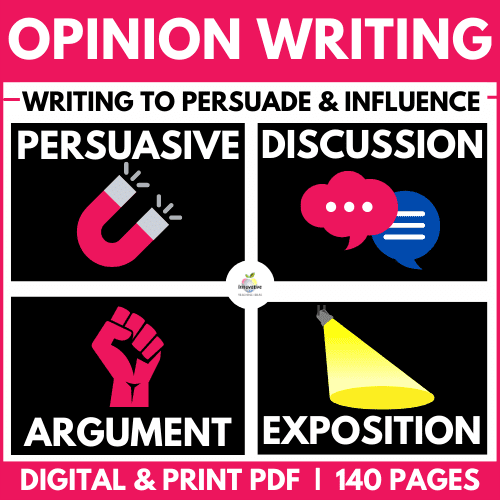
Teach your students to write EXCELLENT PERSUASIVE ESSAYS and master INFLUENTIAL WRITING SKILLS using PROVEN TEACHING STRATEGIES with this 140-PAGE UNIT.
ALL RESOURCES AND ASSESSMENT TOOLS INCLUDED – NO PREP REQUIRED.
30+ 5-star Ratings ⭐⭐⭐⭐⭐
OPINION WRITING CRITERIA TO ADDRESS
1. identify the audience: speak clearly.
Writing is about language and language is about communication; students should understand that we do not write in a vacuum. The purpose of an essay, letter, or any other form of writing we care to name, is ultimately to be read.
This means that it is essential that consideration be given to the character of the intended audience. Also, remind students that when they are writing, the reader is not privy to the inner workings of the writer’s mind. They must make their thoughts explicit in their writing and ensure that these thoughts are expressed in a coherent manner.
The student writer should always avoid making the assumption that the reader knows things that are not expressed explicitly in the writing.
2. Take a Stance: Stand Firm
From the very outset, the student should state their position boldly. More than that, they must stand firm in that opinion throughout the entirety of the piece.
Opinion writing is not about communicating a series of pros and cons or discussing at length the various related advantages and disadvantages, the place for that is not here. The opinion piece should open with a bold statement of opinion that is clearly expressed, and that opinion should be held unwaveringly and reinforced constantly throughout the text.
As with many other writing genres , employing a hook to grab the reader’s attention is good practice too. This hook can take the form of a quotation, an anecdote, a statistic, or even a joke. Whatever form the hook takes, it should reveal the writer’s take on things too.
To summarize, whatever the topic and however the student opens their opinion piece, they should ensure they express their opinion immediately and coherently. There should be no doubt in the reader’s mind as to where the student-writer stands on the issue.
3. Choose Appropriate Evidence: Back It Up
There is no doubt that subjectivity is an important aspect of opinion writing in general. That does not mean, however, that opinions do not need to be substantiated.
Your students will need to recognize that each and every statement of opinion will need to be supported by appropriate evidence. This will also help students to develop their critical reading skills as they will be able to better recognize when unsubstantiated claims are made by other writers. Opinions backed up with evidence help lead the reader along the writer’s pathways of thought; making the writing more convincing as a whole.
This evidence can take a wide variety of forms, ranging from personal anecdotes and quotations to statistics and references to scientific studies. Students should also always be encouraged to choose evidence that is broadly suited to the subject they are writing about.
4. Draw Conclusions: Wrap It Up
In the well-organized piece of opinion writing, as with many other types of extended writing, the writing should be structured in paragraphs. Paragraphs are essential elements of good writing organization.
Generally speaking, an opening paragraph gives way to body paragraphs. These body paragraphs, or development paragraphs, describe in more detail the ideas laid out in the initial opening paragraph by further exploring, explaining, and providing supporting evidence for each point.
The final concluding paragraph serves to close the circle by restating the central points in a closing endeavor to drive home the writer’s opinion.
5. A Word on Words
Writing is an art form. Attention to detail is important. But, it isn’t only important to look at the big picture things like structure, students should be encouraged to shift their focus from the text level down to the word and sentence levels too. In an opinion piece, strong, forceful verbs should be the order of the day. There is little space for passive forms when engaged in the construction of convincing arguments.
Things should be kept interesting too. Students should vary their sentence structures grammatically and in length. Variety is key.
As always in writing, editing should be emphasized. The editing process polishes the well-wrought opinion piece by putting the final gloss on the student’s work.
The OREO Opinion Writing Process Explained
As with all genres, there’s a lot to remember here and acronyms are a helpful way to commit these important things to memory. Luckily, few things can be easier to commit to memory than the name of a delicious cookie:
O – Opinion
R – Reasons
E – Evidence or Examples
O – Opinion (restated)
This memorable acronym will help students remember some of the main elements of opinion writing as outlined above. But, sometimes the hardest thing for students to do is to get the writing ball rolling.
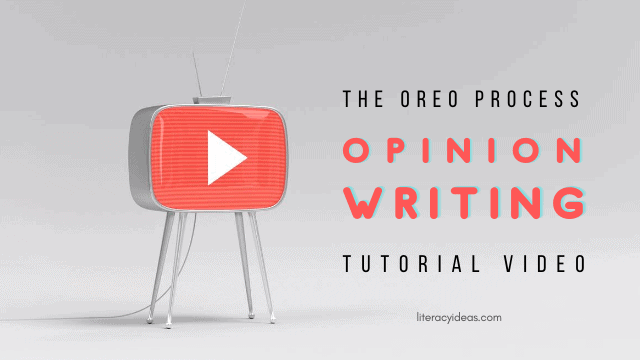
Opinionated Sentence Starters
Sentence starters provide students with great ways to kick-start their writing. Reminding students of simple ways of introducing opinion sentences can be helpful. Here are a few for ‘starters’ for starters:
● In my opinion…
● I think that…
● It seems to me that…
● It appears to me…
● I feel that…
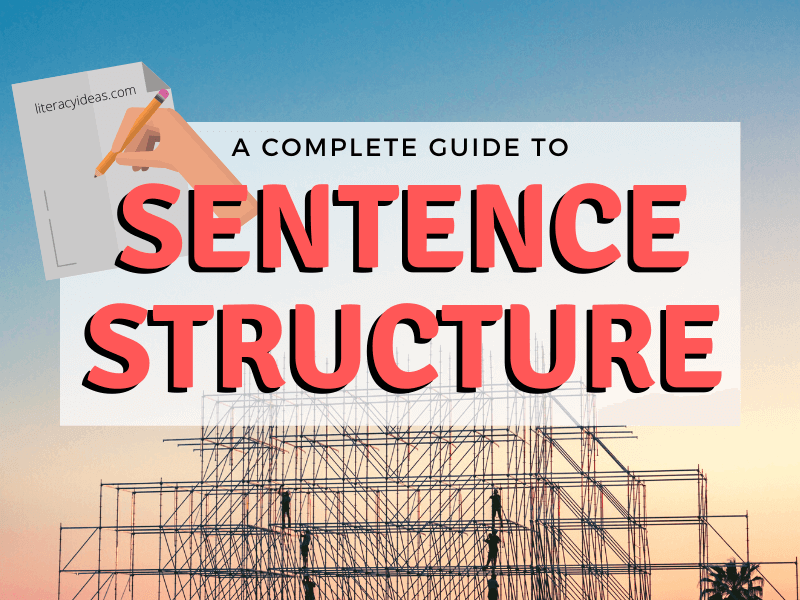
Once the student-writer has effectively expressed their opinion on a matter, they then will need to provide the reader with the reasons for why they think what they think. In an essay, these reasons will usually be found in the body paragraphs or development paragraphs. Normally, these paragraphs will explore a single reason each.
Some helpful sentence starters for introducing these reasons include:
● One reason I feel this way is…
● Evidence to support this can be found in…
● I believe this to evident in…
Opinion Writing Activities for Students
Students will certainly need practice completing sustained pieces of opinion writing, but some of the most valuable activities to help students evolve their opinion writing abilities barely require a pen to be put to paper.
While the following two activities do not require students to engage in extended pieces of writing, the activities below will assist students in grasping some essential concepts. These activities demonstrate good practice through modelling and also encourage dialogue, discussion, and debate as a means to strengthen opinion writing.
Activity 1: Opinion Writing – What Is It?
This exercise is a good follow-up to introductory work outlining the criteria of opinion writing as described above.
● Start by passing out copies of a piece of opinion writing you have selected to read with the class. Read the text aloud as the students follow along with their copy. The opinion text chosen can come from a wide range of genres, including advertisements, letters, editorials, essays, articles, or reviews.
● Assign students a talking partner and instruct students to take five minutes to identify the various criteria employed in the text. Encourage students to mark and annotate their copies of the text accordingly. You may even wish to supply students with a checklist compiled from the criteria mentioned previously in this article.
● As a whole class, discuss how successfully the text fulfills the criteria. What did the writer do well? What could they have done better? You can record their responses on the whiteboard.
The aim of this exercise is for students to hone their critical faculties while internalizing the criteria. This will reap rewards when the students later engage in their own extended opinion writing.
Activity 2: The Collaborative Case
This activity employs collaboration to help students build a stronger case for their opinion on a divisive issue.
● First, define the parameters of the exercise by presenting an either/or conundrum to the class. This doesn’t have to be overly controversial in nature, just stated in such a way that it forces the students to take one side or another. This could be stated simply as a choice, e.g. Dogs or cats? City or countryside? Beach or Mountains? Sweet or savory?
● Students then divide into two groups according to their stated preferences. In their groups, they then discuss and compile as many supporting reasons for their choice as they can come up with. As a group, they will discuss the relative merits of each reason, before agreeing on their top five.
● The groups then share their reasons in a debate format, using arguments and counter-arguments, leading into an open, free-ranging discussion.
The value of this exercise lies in the collaborative and ‘combative’ natures of the exercises. Just as our physical muscles can grow through resistance, so too can the strength and resilience of our opinions and arguments.
This activity can also be used as a lead-in to opinion writing as it works well as a prewriting preparation exercise. The complexity of the issue to be discussed and debated can easily be modified to suit the abilities of the students too.
A COMPLETE UNIT ON TEACHING FIGURATIVE LANGUAGE
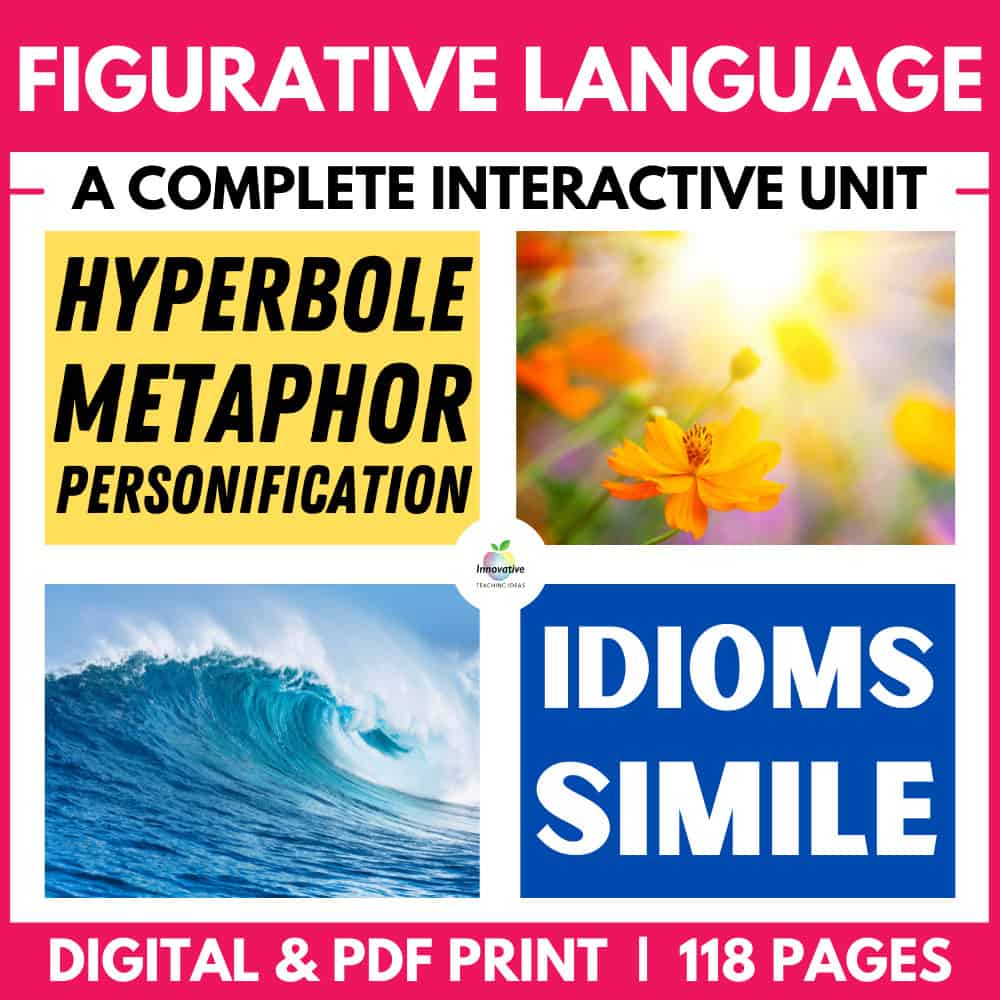
❤️The use of FIGURATIVE LANGUAGE is like “SPECIAL EFFECTS FOR AUTHORS.” It is a powerful tool to create VIVID IMAGERY through words. This HUGE 110 PAGE UNIT guides you through a complete understanding of FIGURATIVE LANGUAGE as both a READER and WRITER covering.
OPINION WRITING VIDEO TUTORIALS
These videos from teaching without frills are an excellent starting point for opinion writing. You can view the entire collection here.
The Wrap Up
Opinion writing is a higher-level skill that makes many demands on our students. It will challenge them to move beyond parroting the facts and figures they have acquired in their learning to formulate their own thoughts on topics they have learned about in class, or in the wider world beyond the school gates.
It will make demands on their skill as writers too. Our students must learn to mold and mechanically manipulate the language on the page to express their beliefs persuasively and effectively. To do this successfully, they will need ample opportunities to practice their writing craft. Once a firm understanding of the structures involved has been established, the student can become more fluid in their expression. They will add art and flair to their craft. But first, they must build on these firm foundations.
OTHER GREAT ARTICLES RELATED TO OPINION WRITING
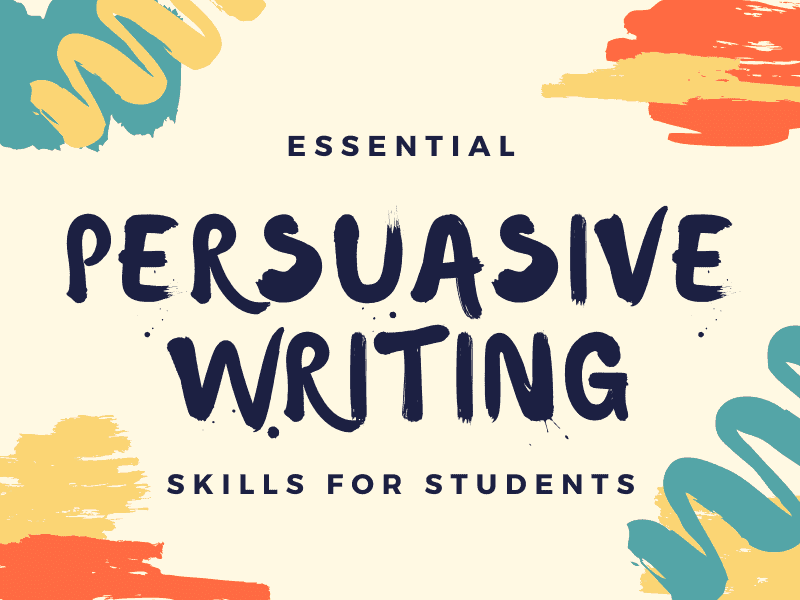
Top 5 Persuasive Writing Techniques for Students
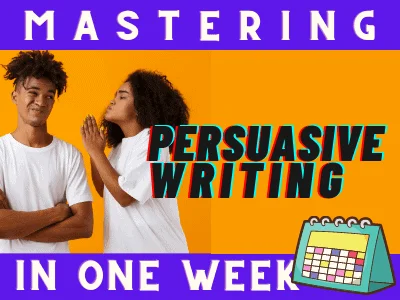
5 Top Persuasive Writing Lesson Plans for Students and Teachers
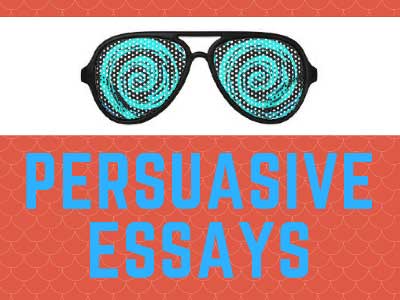
How to Write Perfect Persuasive Essays in 5 Simple Steps
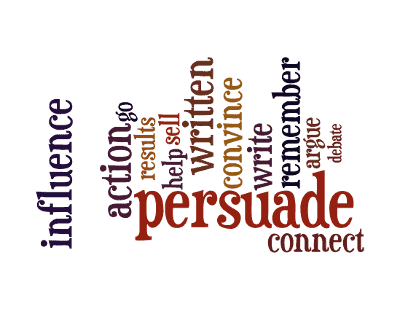
23 Persuasive writing Topics for High School students
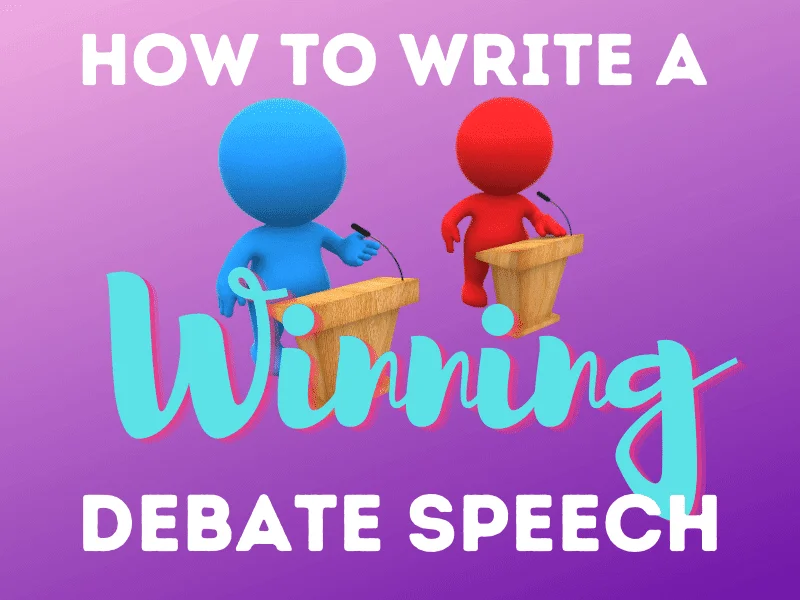
How to Write a Winning Debate Speech
Elements of an Essay
Definition of elements of an essay.
An essay is a piece of composition that discusses a thing, a person, a problem, or an issue in a way that the writer demonstrates his knowledge by offering a new perspective , a new opinion, a solution, or new suggestions or recommendations. An essay is not just a haphazard piece of writing. It is a well-organized composition comprising several elements that work to build an argument , describe a situation, narrate an event, or state a problem with a solution. There are several types of essays based on the purpose and the target audience . Structurally, as an essay is an organized composition, it has the following elements:
- Introduction
- Body Paragraphs
Nature of Elements of an Essay
An essay has three basic elements as given above. Each of these elements plays its respective role to persuade the audience, convince the readers, and convey the meanings an author intends to convey. For example, an introduction is intended to introduce the topic of the essay. First it hooks the readers through the ‘ hook ,’ which is an anecdote , a good quote, a verse , or an event relevant to the topic. It intends to attract the attention of readers.
Following the hood, the author gives background information about the topic, which is intended to educate readers about the topic. The final element of the introduction is a thesis statement. This is a concise and compact sentence or two, which introduces evidence to be discussed in the body paragraphs.
Body paragraphs of an essay discuss the evidences and arguments introduced in the thesis statement . If a thesis statement has presented three evidences or arguments about the topic, there will be three body paragraphs. However, if there are more arguments or evidences, there could be more paragraphs.
The structure of each body paragraph is the same. It starts with a topic sentence, followed by further explanation, examples, evidences, and supporting details. If it is a simple non-research essay, then there are mostly examples of what is introduced in the topic sentences. However, if the essay is research-based, there will be supporting details such as statistics, quotes, charts, and explanations.
The conclusion is the last part of an essay. It is also the crucial part that sums up the argument, or concludes the description, narration, or event. It is comprised of three major parts. The first part is a rephrasing of the thesis statement given at the end of the introduction. It reminds the readers what they have read about. The second part is the summary of the major points discussed in the body paragraphs, and the third part is closing remarks, which are suggestions, recommendations, a call to action, or the author’s own opinion of the issue.
Function of Elements of an Essay
Each element of an essay has a specific function. An introduction not only introduces the topic, but also gives background information, in addition to hooking the readers to read the whole essay. Its first sentence, which is also called a hook, literally hooks readers. When readers have gone through the introduction, it is supposed that they have full information about what they are going to read.
In the same way, the function of body paragraphs is to give more information and convince the readers about the topic. It could be persuasion , explanation, or clarification as required. Mostly, writers use ethos , pathos , and logos in this part of an essay. As traditionally, it has three body paragraphs, writers use each of the rhetorical devices in each paragraph, but it is not a hard and fast rule. The number of body paragraphs could be increased, according to the demand of the topic, or demand of the course.
As far as the conclusion is concerned, its major function is to sum up the argument, issue, or explanation. It makes readers feel that now they are going to finish their reading. It provides them sufficient information about the topic. It gives them a new perspective, a new sight, a new vision, or motivates them to take action. The conclusion needs to also satisfy readers that they have read something about some topic, have got something to tell others, and that they have not merely read it for the sake of reading.
Related posts:
- Important Elements of Poetry
- Narrative Essay
- Definition Essay
- Descriptive Essay
- Types of Essay
- Analytical Essay
- Argumentative Essay
- Cause and Effect Essay
- Critical Essay
- Expository Essay
- Persuasive Essay
- Process Essay
- Explicatory Essay
- An Essay on Man: Epistle I
- Comparison and Contrast Essay
Post navigation

Choose Your Test
Sat / act prep online guides and tips, how to write an a+ argumentative essay.
Miscellaneous

You'll no doubt have to write a number of argumentative essays in both high school and college, but what, exactly, is an argumentative essay and how do you write the best one possible? Let's take a look.
A great argumentative essay always combines the same basic elements: approaching an argument from a rational perspective, researching sources, supporting your claims using facts rather than opinion, and articulating your reasoning into the most cogent and reasoned points. Argumentative essays are great building blocks for all sorts of research and rhetoric, so your teachers will expect you to master the technique before long.
But if this sounds daunting, never fear! We'll show how an argumentative essay differs from other kinds of papers, how to research and write them, how to pick an argumentative essay topic, and where to find example essays. So let's get started.
What Is an Argumentative Essay? How Is it Different from Other Kinds of Essays?
There are two basic requirements for any and all essays: to state a claim (a thesis statement) and to support that claim with evidence.
Though every essay is founded on these two ideas, there are several different types of essays, differentiated by the style of the writing, how the writer presents the thesis, and the types of evidence used to support the thesis statement.
Essays can be roughly divided into four different types:
#1: Argumentative #2: Persuasive #3: Expository #4: Analytical
So let's look at each type and what the differences are between them before we focus the rest of our time to argumentative essays.
Argumentative Essay
Argumentative essays are what this article is all about, so let's talk about them first.
An argumentative essay attempts to convince a reader to agree with a particular argument (the writer's thesis statement). The writer takes a firm stand one way or another on a topic and then uses hard evidence to support that stance.
An argumentative essay seeks to prove to the reader that one argument —the writer's argument— is the factually and logically correct one. This means that an argumentative essay must use only evidence-based support to back up a claim , rather than emotional or philosophical reasoning (which is often allowed in other types of essays). Thus, an argumentative essay has a burden of substantiated proof and sources , whereas some other types of essays (namely persuasive essays) do not.
You can write an argumentative essay on any topic, so long as there's room for argument. Generally, you can use the same topics for both a persuasive essay or an argumentative one, so long as you support the argumentative essay with hard evidence.
Example topics of an argumentative essay:
- "Should farmers be allowed to shoot wolves if those wolves injure or kill farm animals?"
- "Should the drinking age be lowered in the United States?"
- "Are alternatives to democracy effective and/or feasible to implement?"
The next three types of essays are not argumentative essays, but you may have written them in school. We're going to cover them so you know what not to do for your argumentative essay.
Persuasive Essay
Persuasive essays are similar to argumentative essays, so it can be easy to get them confused. But knowing what makes an argumentative essay different than a persuasive essay can often mean the difference between an excellent grade and an average one.
Persuasive essays seek to persuade a reader to agree with the point of view of the writer, whether that point of view is based on factual evidence or not. The writer has much more flexibility in the evidence they can use, with the ability to use moral, cultural, or opinion-based reasoning as well as factual reasoning to persuade the reader to agree the writer's side of a given issue.
Instead of being forced to use "pure" reason as one would in an argumentative essay, the writer of a persuasive essay can manipulate or appeal to the reader's emotions. So long as the writer attempts to steer the readers into agreeing with the thesis statement, the writer doesn't necessarily need hard evidence in favor of the argument.
Often, you can use the same topics for both a persuasive essay or an argumentative one—the difference is all in the approach and the evidence you present.
Example topics of a persuasive essay:
- "Should children be responsible for their parents' debts?"
- "Should cheating on a test be automatic grounds for expulsion?"
- "How much should sports leagues be held accountable for player injuries and the long-term consequences of those injuries?"
Expository Essay
An expository essay is typically a short essay in which the writer explains an idea, issue, or theme , or discusses the history of a person, place, or idea.
This is typically a fact-forward essay with little argument or opinion one way or the other.
Example topics of an expository essay:
- "The History of the Philadelphia Liberty Bell"
- "The Reasons I Always Wanted to be a Doctor"
- "The Meaning Behind the Colloquialism ‘People in Glass Houses Shouldn't Throw Stones'"
Analytical Essay
An analytical essay seeks to delve into the deeper meaning of a text or work of art, or unpack a complicated idea . These kinds of essays closely interpret a source and look into its meaning by analyzing it at both a macro and micro level.
This type of analysis can be augmented by historical context or other expert or widely-regarded opinions on the subject, but is mainly supported directly through the original source (the piece or art or text being analyzed) .
Example topics of an analytical essay:
- "Victory Gin in Place of Water: The Symbolism Behind Gin as the Only Potable Substance in George Orwell's 1984"
- "Amarna Period Art: The Meaning Behind the Shift from Rigid to Fluid Poses"
- "Adultery During WWII, as Told Through a Series of Letters to and from Soldiers"

There are many different types of essay and, over time, you'll be able to master them all.
A Typical Argumentative Essay Assignment
The average argumentative essay is between three to five pages, and will require at least three or four separate sources with which to back your claims . As for the essay topic , you'll most often be asked to write an argumentative essay in an English class on a "general" topic of your choice, ranging the gamut from science, to history, to literature.
But while the topics of an argumentative essay can span several different fields, the structure of an argumentative essay is always the same: you must support a claim—a claim that can reasonably have multiple sides—using multiple sources and using a standard essay format (which we'll talk about later on).
This is why many argumentative essay topics begin with the word "should," as in:
- "Should all students be required to learn chemistry in high school?"
- "Should children be required to learn a second language?"
- "Should schools or governments be allowed to ban books?"
These topics all have at least two sides of the argument: Yes or no. And you must support the side you choose with evidence as to why your side is the correct one.
But there are also plenty of other ways to frame an argumentative essay as well:
- "Does using social media do more to benefit or harm people?"
- "Does the legal status of artwork or its creators—graffiti and vandalism, pirated media, a creator who's in jail—have an impact on the art itself?"
- "Is or should anyone ever be ‘above the law?'"
Though these are worded differently than the first three, you're still essentially forced to pick between two sides of an issue: yes or no, for or against, benefit or detriment. Though your argument might not fall entirely into one side of the divide or another—for instance, you could claim that social media has positively impacted some aspects of modern life while being a detriment to others—your essay should still support one side of the argument above all. Your final stance would be that overall , social media is beneficial or overall , social media is harmful.
If your argument is one that is mostly text-based or backed by a single source (e.g., "How does Salinger show that Holden Caulfield is an unreliable narrator?" or "Does Gatsby personify the American Dream?"), then it's an analytical essay, rather than an argumentative essay. An argumentative essay will always be focused on more general topics so that you can use multiple sources to back up your claims.
Good Argumentative Essay Topics
So you know the basic idea behind an argumentative essay, but what topic should you write about?
Again, almost always, you'll be asked to write an argumentative essay on a free topic of your choice, or you'll be asked to select between a few given topics . If you're given complete free reign of topics, then it'll be up to you to find an essay topic that no only appeals to you, but that you can turn into an A+ argumentative essay.
What makes a "good" argumentative essay topic depends on both the subject matter and your personal interest —it can be hard to give your best effort on something that bores you to tears! But it can also be near impossible to write an argumentative essay on a topic that has no room for debate.
As we said earlier, a good argumentative essay topic will be one that has the potential to reasonably go in at least two directions—for or against, yes or no, and why . For example, it's pretty hard to write an argumentative essay on whether or not people should be allowed to murder one another—not a whole lot of debate there for most people!—but writing an essay for or against the death penalty has a lot more wiggle room for evidence and argument.
A good topic is also one that can be substantiated through hard evidence and relevant sources . So be sure to pick a topic that other people have studied (or at least studied elements of) so that you can use their data in your argument. For example, if you're arguing that it should be mandatory for all middle school children to play a sport, you might have to apply smaller scientific data points to the larger picture you're trying to justify. There are probably several studies you could cite on the benefits of physical activity and the positive effect structure and teamwork has on young minds, but there's probably no study you could use where a group of scientists put all middle-schoolers in one jurisdiction into a mandatory sports program (since that's probably never happened). So long as your evidence is relevant to your point and you can extrapolate from it to form a larger whole, you can use it as a part of your resource material.
And if you need ideas on where to get started, or just want to see sample argumentative essay topics, then check out these links for hundreds of potential argumentative essay topics.
101 Persuasive (or Argumentative) Essay and Speech Topics
301 Prompts for Argumentative Writing
Top 50 Ideas for Argumentative/Persuasive Essay Writing
[Note: some of these say "persuasive essay topics," but just remember that the same topic can often be used for both a persuasive essay and an argumentative essay; the difference is in your writing style and the evidence you use to support your claims.]

KO! Find that one argumentative essay topic you can absolutely conquer.
Argumentative Essay Format
Argumentative Essays are composed of four main elements:
- A position (your argument)
- Your reasons
- Supporting evidence for those reasons (from reliable sources)
- Counterargument(s) (possible opposing arguments and reasons why those arguments are incorrect)
If you're familiar with essay writing in general, then you're also probably familiar with the five paragraph essay structure . This structure is a simple tool to show how one outlines an essay and breaks it down into its component parts, although it can be expanded into as many paragraphs as you want beyond the core five.
The standard argumentative essay is often 3-5 pages, which will usually mean a lot more than five paragraphs, but your overall structure will look the same as a much shorter essay.
An argumentative essay at its simplest structure will look like:
Paragraph 1: Intro
- Set up the story/problem/issue
- Thesis/claim
Paragraph 2: Support
- Reason #1 claim is correct
- Supporting evidence with sources
Paragraph 3: Support
- Reason #2 claim is correct
Paragraph 4: Counterargument
- Explanation of argument for the other side
- Refutation of opposing argument with supporting evidence
Paragraph 5: Conclusion
- Re-state claim
- Sum up reasons and support of claim from the essay to prove claim is correct
Now let's unpack each of these paragraph types to see how they work (with examples!), what goes into them, and why.
Paragraph 1—Set Up and Claim
Your first task is to introduce the reader to the topic at hand so they'll be prepared for your claim. Give a little background information, set the scene, and give the reader some stakes so that they care about the issue you're going to discuss.
Next, you absolutely must have a position on an argument and make that position clear to the readers. It's not an argumentative essay unless you're arguing for a specific claim, and this claim will be your thesis statement.
Your thesis CANNOT be a mere statement of fact (e.g., "Washington DC is the capital of the United States"). Your thesis must instead be an opinion which can be backed up with evidence and has the potential to be argued against (e.g., "New York should be the capital of the United States").
Paragraphs 2 and 3—Your Evidence
These are your body paragraphs in which you give the reasons why your argument is the best one and back up this reasoning with concrete evidence .
The argument supporting the thesis of an argumentative essay should be one that can be supported by facts and evidence, rather than personal opinion or cultural or religious mores.
For example, if you're arguing that New York should be the new capital of the US, you would have to back up that fact by discussing the factual contrasts between New York and DC in terms of location, population, revenue, and laws. You would then have to talk about the precedents for what makes for a good capital city and why New York fits the bill more than DC does.
Your argument can't simply be that a lot of people think New York is the best city ever and that you agree.
In addition to using concrete evidence, you always want to keep the tone of your essay passionate, but impersonal . Even though you're writing your argument from a single opinion, don't use first person language—"I think," "I feel," "I believe,"—to present your claims. Doing so is repetitive, since by writing the essay you're already telling the audience what you feel, and using first person language weakens your writing voice.
For example,
"I think that Washington DC is no longer suited to be the capital city of the United States."
"Washington DC is no longer suited to be the capital city of the United States."
The second statement sounds far stronger and more analytical.
Paragraph 4—Argument for the Other Side and Refutation
Even without a counter argument, you can make a pretty persuasive claim, but a counterargument will round out your essay into one that is much more persuasive and substantial.
By anticipating an argument against your claim and taking the initiative to counter it, you're allowing yourself to get ahead of the game. This way, you show that you've given great thought to all sides of the issue before choosing your position, and you demonstrate in multiple ways how yours is the more reasoned and supported side.
Paragraph 5—Conclusion
This paragraph is where you re-state your argument and summarize why it's the best claim.
Briefly touch on your supporting evidence and voila! A finished argumentative essay.

Your essay should have just as awesome a skeleton as this plesiosaur does. (In other words: a ridiculously awesome skeleton)
Argumentative Essay Example: 5-Paragraph Style
It always helps to have an example to learn from. I've written a full 5-paragraph argumentative essay here. Look at how I state my thesis in paragraph 1, give supporting evidence in paragraphs 2 and 3, address a counterargument in paragraph 4, and conclude in paragraph 5.
Topic: Is it possible to maintain conflicting loyalties?
Paragraph 1
It is almost impossible to go through life without encountering a situation where your loyalties to different people or causes come into conflict with each other. Maybe you have a loving relationship with your sister, but she disagrees with your decision to join the army, or you find yourself torn between your cultural beliefs and your scientific ones. These conflicting loyalties can often be maintained for a time, but as examples from both history and psychological theory illustrate, sooner or later, people have to make a choice between competing loyalties, as no one can maintain a conflicting loyalty or belief system forever.
The first two sentences set the scene and give some hypothetical examples and stakes for the reader to care about.
The third sentence finishes off the intro with the thesis statement, making very clear how the author stands on the issue ("people have to make a choice between competing loyalties, as no one can maintain a conflicting loyalty or belief system forever." )
Paragraphs 2 and 3
Psychological theory states that human beings are not equipped to maintain conflicting loyalties indefinitely and that attempting to do so leads to a state called "cognitive dissonance." Cognitive dissonance theory is the psychological idea that people undergo tremendous mental stress or anxiety when holding contradictory beliefs, values, or loyalties (Festinger, 1957). Even if human beings initially hold a conflicting loyalty, they will do their best to find a mental equilibrium by making a choice between those loyalties—stay stalwart to a belief system or change their beliefs. One of the earliest formal examples of cognitive dissonance theory comes from Leon Festinger's When Prophesy Fails . Members of an apocalyptic cult are told that the end of the world will occur on a specific date and that they alone will be spared the Earth's destruction. When that day comes and goes with no apocalypse, the cult members face a cognitive dissonance between what they see and what they've been led to believe (Festinger, 1956). Some choose to believe that the cult's beliefs are still correct, but that the Earth was simply spared from destruction by mercy, while others choose to believe that they were lied to and that the cult was fraudulent all along. Both beliefs cannot be correct at the same time, and so the cult members are forced to make their choice.
But even when conflicting loyalties can lead to potentially physical, rather than just mental, consequences, people will always make a choice to fall on one side or other of a dividing line. Take, for instance, Nicolaus Copernicus, a man born and raised in Catholic Poland (and educated in Catholic Italy). Though the Catholic church dictated specific scientific teachings, Copernicus' loyalty to his own observations and scientific evidence won out over his loyalty to his country's government and belief system. When he published his heliocentric model of the solar system--in opposition to the geocentric model that had been widely accepted for hundreds of years (Hannam, 2011)-- Copernicus was making a choice between his loyalties. In an attempt t o maintain his fealty both to the established system and to what he believed, h e sat on his findings for a number of years (Fantoli, 1994). But, ultimately, Copernicus made the choice to side with his beliefs and observations above all and published his work for the world to see (even though, in doing so, he risked both his reputation and personal freedoms).
These two paragraphs provide the reasons why the author supports the main argument and uses substantiated sources to back those reasons.
The paragraph on cognitive dissonance theory gives both broad supporting evidence and more narrow, detailed supporting evidence to show why the thesis statement is correct not just anecdotally but also scientifically and psychologically. First, we see why people in general have a difficult time accepting conflicting loyalties and desires and then how this applies to individuals through the example of the cult members from the Dr. Festinger's research.
The next paragraph continues to use more detailed examples from history to provide further evidence of why the thesis that people cannot indefinitely maintain conflicting loyalties is true.
Paragraph 4
Some will claim that it is possible to maintain conflicting beliefs or loyalties permanently, but this is often more a matter of people deluding themselves and still making a choice for one side or the other, rather than truly maintaining loyalty to both sides equally. For example, Lancelot du Lac typifies a person who claims to maintain a balanced loyalty between to two parties, but his attempt to do so fails (as all attempts to permanently maintain conflicting loyalties must). Lancelot tells himself and others that he is equally devoted to both King Arthur and his court and to being Queen Guinevere's knight (Malory, 2008). But he can neither be in two places at once to protect both the king and queen, nor can he help but let his romantic feelings for the queen to interfere with his duties to the king and the kingdom. Ultimately, he and Queen Guinevere give into their feelings for one another and Lancelot—though he denies it—chooses his loyalty to her over his loyalty to Arthur. This decision plunges the kingdom into a civil war, ages Lancelot prematurely, and ultimately leads to Camelot's ruin (Raabe, 1987). Though Lancelot claimed to have been loyal to both the king and the queen, this loyalty was ultimately in conflict, and he could not maintain it.
Here we have the acknowledgement of a potential counter-argument and the evidence as to why it isn't true.
The argument is that some people (or literary characters) have asserted that they give equal weight to their conflicting loyalties. The refutation is that, though some may claim to be able to maintain conflicting loyalties, they're either lying to others or deceiving themselves. The paragraph shows why this is true by providing an example of this in action.
Paragraph 5
Whether it be through literature or history, time and time again, people demonstrate the challenges of trying to manage conflicting loyalties and the inevitable consequences of doing so. Though belief systems are malleable and will often change over time, it is not possible to maintain two mutually exclusive loyalties or beliefs at once. In the end, people always make a choice, and loyalty for one party or one side of an issue will always trump loyalty to the other.
The concluding paragraph summarizes the essay, touches on the evidence presented, and re-states the thesis statement.
How to Write an Argumentative Essay: 8 Steps
Writing the best argumentative essay is all about the preparation, so let's talk steps:
#1: Preliminary Research
If you have the option to pick your own argumentative essay topic (which you most likely will), then choose one or two topics you find the most intriguing or that you have a vested interest in and do some preliminary research on both sides of the debate.
Do an open internet search just to see what the general chatter is on the topic and what the research trends are.
Did your preliminary reading influence you to pick a side or change your side? Without diving into all the scholarly articles at length, do you believe there's enough evidence to support your claim? Have there been scientific studies? Experiments? Does a noted scholar in the field agree with you? If not, you may need to pick another topic or side of the argument to support.
#2: Pick Your Side and Form Your Thesis
Now's the time to pick the side of the argument you feel you can support the best and summarize your main point into your thesis statement.
Your thesis will be the basis of your entire essay, so make sure you know which side you're on, that you've stated it clearly, and that you stick by your argument throughout the entire essay .
#3: Heavy-Duty Research Time
You've taken a gander at what the internet at large has to say on your argument, but now's the time to actually read those sources and take notes.
Check scholarly journals online at Google Scholar , the Directory of Open Access Journals , or JStor . You can also search individual university or school libraries and websites to see what kinds of academic articles you can access for free. Keep track of your important quotes and page numbers and put them somewhere that's easy to find later.
And don't forget to check your school or local libraries as well!
#4: Outline
Follow the five-paragraph outline structure from the previous section.
Fill in your topic, your reasons, and your supporting evidence into each of the categories.
Before you begin to flesh out the essay, take a look at what you've got. Is your thesis statement in the first paragraph? Is it clear? Is your argument logical? Does your supporting evidence support your reasoning?
By outlining your essay, you streamline your process and take care of any logic gaps before you dive headfirst into the writing. This will save you a lot of grief later on if you need to change your sources or your structure, so don't get too trigger-happy and skip this step.
Now that you've laid out exactly what you'll need for your essay and where, it's time to fill in all the gaps by writing it out.
Take it one step at a time and expand your ideas into complete sentences and substantiated claims. It may feel daunting to turn an outline into a complete draft, but just remember that you've already laid out all the groundwork; now you're just filling in the gaps.
If you have the time before deadline, give yourself a day or two (or even just an hour!) away from your essay . Looking it over with fresh eyes will allow you to see errors, both minor and major, that you likely would have missed had you tried to edit when it was still raw.
Take a first pass over the entire essay and try your best to ignore any minor spelling or grammar mistakes—you're just looking at the big picture right now. Does it make sense as a whole? Did the essay succeed in making an argument and backing that argument up logically? (Do you feel persuaded?)
If not, go back and make notes so that you can fix it for your final draft.
Once you've made your revisions to the overall structure, mark all your small errors and grammar problems so you can fix them in the next draft.
#7: Final Draft
Use the notes you made on the rough draft and go in and hack and smooth away until you're satisfied with the final result.
A checklist for your final draft:
- Formatting is correct according to your teacher's standards
- No errors in spelling, grammar, and punctuation
- Essay is the right length and size for the assignment
- The argument is present, consistent, and concise
- Each reason is supported by relevant evidence
- The essay makes sense overall
#8: Celebrate!
Once you've brought that final draft to a perfect polish and turned in your assignment, you're done! Go you!

Be prepared and ♪ you'll never go hungry again ♪, *cough*, or struggle with your argumentative essay-writing again. (Walt Disney Studios)
Good Examples of Argumentative Essays Online
Theory is all well and good, but examples are key. Just to get you started on what a fully-fleshed out argumentative essay looks like, let's see some examples in action.
Check out these two argumentative essay examples on the use of landmines and freons (and note the excellent use of concrete sources to back up their arguments!).
The Use of Landmines
A Shattered Sky
The Take-Aways: Keys to Writing an Argumentative Essay
At first, writing an argumentative essay may seem like a monstrous hurdle to overcome, but with the proper preparation and understanding, you'll be able to knock yours out of the park.
Remember the differences between a persuasive essay and an argumentative one, make sure your thesis is clear, and double-check that your supporting evidence is both relevant to your point and well-sourced . Pick your topic, do your research, make your outline, and fill in the gaps. Before you know it, you'll have yourself an A+ argumentative essay there, my friend.
What's Next?
Now you know the ins and outs of an argumentative essay, but how comfortable are you writing in other styles? Learn more about the four writing styles and when it makes sense to use each .
Understand how to make an argument, but still having trouble organizing your thoughts? Check out our guide to three popular essay formats and choose which one is right for you.
Ready to make your case, but not sure what to write about? We've created a list of 50 potential argumentative essay topics to spark your imagination.
Courtney scored in the 99th percentile on the SAT in high school and went on to graduate from Stanford University with a degree in Cultural and Social Anthropology. She is passionate about bringing education and the tools to succeed to students from all backgrounds and walks of life, as she believes open education is one of the great societal equalizers. She has years of tutoring experience and writes creative works in her free time.
Student and Parent Forum
Our new student and parent forum, at ExpertHub.PrepScholar.com , allow you to interact with your peers and the PrepScholar staff. See how other students and parents are navigating high school, college, and the college admissions process. Ask questions; get answers.

Ask a Question Below
Have any questions about this article or other topics? Ask below and we'll reply!
Improve With Our Famous Guides
- For All Students
The 5 Strategies You Must Be Using to Improve 160+ SAT Points
How to Get a Perfect 1600, by a Perfect Scorer
Series: How to Get 800 on Each SAT Section:
Score 800 on SAT Math
Score 800 on SAT Reading
Score 800 on SAT Writing
Series: How to Get to 600 on Each SAT Section:
Score 600 on SAT Math
Score 600 on SAT Reading
Score 600 on SAT Writing
Free Complete Official SAT Practice Tests
What SAT Target Score Should You Be Aiming For?
15 Strategies to Improve Your SAT Essay
The 5 Strategies You Must Be Using to Improve 4+ ACT Points
How to Get a Perfect 36 ACT, by a Perfect Scorer
Series: How to Get 36 on Each ACT Section:
36 on ACT English
36 on ACT Math
36 on ACT Reading
36 on ACT Science
Series: How to Get to 24 on Each ACT Section:
24 on ACT English
24 on ACT Math
24 on ACT Reading
24 on ACT Science
What ACT target score should you be aiming for?
ACT Vocabulary You Must Know
ACT Writing: 15 Tips to Raise Your Essay Score
How to Get Into Harvard and the Ivy League
How to Get a Perfect 4.0 GPA
How to Write an Amazing College Essay
What Exactly Are Colleges Looking For?
Is the ACT easier than the SAT? A Comprehensive Guide
Should you retake your SAT or ACT?
When should you take the SAT or ACT?
Stay Informed
Get the latest articles and test prep tips!
Looking for Graduate School Test Prep?
Check out our top-rated graduate blogs here:
GRE Online Prep Blog
GMAT Online Prep Blog
TOEFL Online Prep Blog
Holly R. "I am absolutely overjoyed and cannot thank you enough for helping me!”
How to Write a Persuasive Essay (This Convinced My Professor!)
.png)
Table of contents

Meredith Sell
You can make your essay more persuasive by getting straight to the point.
In fact, that's exactly what we did here, and that's just the first tip of this guide. Throughout this guide, we share the steps needed to prove an argument and create a persuasive essay.
This AI tool helps you improve your essay > This AI tool helps you improve your essay >

Key takeaways: - Proven process to make any argument persuasive - 5-step process to structure arguments - How to use AI to formulate and optimize your essay
Why is being persuasive so difficult?
"Write an essay that persuades the reader of your opinion on a topic of your choice."
You might be staring at an assignment description just like this 👆from your professor. Your computer is open to a blank document, the cursor blinking impatiently. Do I even have opinions?
The persuasive essay can be one of the most intimidating academic papers to write: not only do you need to identify a narrow topic and research it, but you also have to come up with a position on that topic that you can back up with research while simultaneously addressing different viewpoints.
That’s a big ask. And let’s be real: most opinion pieces in major news publications don’t fulfill these requirements.
The upside? By researching and writing your own opinion, you can learn how to better formulate not only an argument but the actual positions you decide to hold.
Here, we break down exactly how to write a persuasive essay. We’ll start by taking a step that’s key for every piece of writing—defining the terms.
What Is a Persuasive Essay?
A persuasive essay is exactly what it sounds like: an essay that persuades . Over the course of several paragraphs or pages, you’ll use researched facts and logic to convince the reader of your opinion on a particular topic and discredit opposing opinions.
While you’ll spend some time explaining the topic or issue in question, most of your essay will flesh out your viewpoint and the evidence that supports it.
The 5 Must-Have Steps of a Persuasive Essay
If you’re intimidated by the idea of writing an argument, use this list to break your process into manageable chunks. Tackle researching and writing one element at a time, and then revise your essay so that it flows smoothly and coherently with every component in the optimal place.
1. A topic or issue to argue
This is probably the hardest step. You need to identify a topic or issue that is narrow enough to cover in the length of your piece—and is also arguable from more than one position. Your topic must call for an opinion , and not be a simple fact .
It might be helpful to walk through this process:
- Identify a random topic
- Ask a question about the topic that involves a value claim or analysis to answer
- Answer the question
That answer is your opinion.
Let’s consider some examples, from silly to serious:
Topic: Dolphins and mermaids
Question: In a mythical match, who would win: a dolphin or a mermaid?
Answer/Opinion: The mermaid would win in a match against a dolphin.
Topic: Autumn
Question: Which has a better fall: New England or Colorado?
Answer/Opinion: Fall is better in New England than Colorado.
Topic: Electric transportation options
Question: Would it be better for an urban dweller to buy an electric bike or an electric car?
Answer/Opinion: An electric bike is a better investment than an electric car.
Your turn: Walk through the three-step process described above to identify your topic and your tentative opinion. You may want to start by brainstorming a list of topics you find interesting and then going use the three-step process to find the opinion that would make the best essay topic.
2. An unequivocal thesis statement
If you walked through our three-step process above, you already have some semblance of a thesis—but don’t get attached too soon!
A solid essay thesis is best developed through the research process. You shouldn’t land on an opinion before you know the facts. So press pause. Take a step back. And dive into your research.
You’ll want to learn:
- The basic facts of your topic. How long does fall last in New England vs. Colorado? What trees do they have? What colors do those trees turn?
- The facts specifically relevant to your question. Is there any science on how the varying colors of fall influence human brains and moods?
- What experts or other noteworthy and valid sources say about the question you’re considering. Has a well-known arborist waxed eloquent on the beauty of New England falls?
As you learn the different viewpoints people have on your topic, pay attention to the strengths and weaknesses of existing arguments. Is anyone arguing the perspective you’re leaning toward? Do you find their arguments convincing? What do you find unsatisfying about the various arguments?
Allow the research process to change your mind and/or refine your thinking on the topic. Your opinion may change entirely or become more specific based on what you learn.
Once you’ve done enough research to feel confident in your understanding of the topic and your opinion on it, craft your thesis.
Your thesis statement should be clear and concise. It should directly state your viewpoint on the topic, as well as the basic case for your thesis.
Thesis 1: In a mythical match, the mermaid would overcome the dolphin due to one distinct advantage: her ability to breathe underwater.
Thesis 2: The full spectrum of color displayed on New England hillsides is just one reason why fall in the northeast is better than in Colorado.
Thesis 3: In addition to not adding to vehicle traffic, electric bikes are a better investment than electric cars because they’re cheaper and require less energy to accomplish the same function of getting the rider from point A to point B.
Your turn: Dive into the research process with a radar up for the arguments your sources are making about your topic. What are the most convincing cases? Should you stick with your initial opinion or change it up? Write your fleshed-out thesis statement.
3. Evidence to back up your thesis
This is a typical place for everyone from undergrads to politicians to get stuck, but the good news is, if you developed your thesis from research, you already have a good bit of evidence to make your case.
Go back through your research notes and compile a list of every …
… or other piece of information that supports your thesis.
This info can come from research studies you found in scholarly journals, government publications, news sources, encyclopedias, or other credible sources (as long as they fit your professor’s standards).
As you put this list together, watch for any gaps or weak points. Are you missing information on how electric cars versus electric bicycles charge or how long their batteries last? Did you verify that dolphins are, in fact, mammals and can’t breathe underwater like totally-real-and-not-at-all-fake 😉mermaids can? Track down that information.
Next, organize your list. Group the entries so that similar or closely related information is together, and as you do that, start thinking through how to articulate the individual arguments to support your case.
Depending on the length of your essay, each argument may get only a paragraph or two of space. As you think through those specific arguments, consider what order to put them in. You’ll probably want to start with the simplest argument and work up to more complicated ones so that the arguments can build on each other.
Your turn: Organize your evidence and write a rough draft of your arguments. Play around with the order to find the most compelling way to argue your case.
4. Rebuttals to disprove opposing theses
You can’t just present the evidence to support your case and totally ignore other viewpoints. To persuade your readers, you’ll need to address any opposing ideas they may hold about your topic.
You probably found some holes in the opposing views during your research process. Now’s your chance to expose those holes.
Take some time (and space) to: describe the opposing views and show why those views don’t hold up. You can accomplish this using both logic and facts.
Is a perspective based on a faulty assumption or misconception of the truth? Shoot it down by providing the facts that disprove the opinion.
Is another opinion drawn from bad or unsound reasoning? Show how that argument falls apart.
Some cases may truly be only a matter of opinion, but you still need to articulate why you don’t find the opposing perspective convincing.
Yes, a dolphin might be stronger than a mermaid, but as a mammal, the dolphin must continually return to the surface for air. A mermaid can breathe both underwater and above water, which gives her a distinct advantage in this mythical battle.
While the Rocky Mountain views are stunning, their limited colors—yellow from aspen trees and green from various evergreens—leaves the autumn-lover less than thrilled. The rich reds and oranges and yellows of the New England fall are more satisfying and awe-inspiring.
But what about longer trips that go beyond the city center into the suburbs and beyond? An electric bike wouldn’t be great for those excursions. Wouldn’t an electric car be the better choice then?
Certainly, an electric car would be better in these cases than a gas-powered car, but if most of a person’s trips are in their hyper-local area, the electric bicycle is a more environmentally friendly option for those day-to-day outings. That person could then participate in a carshare or use public transit, a ride-sharing app, or even a gas-powered car for longer trips—and still use less energy overall than if they drove an electric car for hyper-local and longer area trips.
Your turn: Organize your rebuttal research and write a draft of each one.
5. A convincing conclusion
You have your arguments and rebuttals. You’ve proven your thesis is rock-solid. Now all you have to do is sum up your overall case and give your final word on the subject.
Don’t repeat everything you’ve already said. Instead, your conclusion should logically draw from the arguments you’ve made to show how they coherently prove your thesis. You’re pulling everything together and zooming back out with a better understanding of the what and why of your thesis.
A dolphin may never encounter a mermaid in the wild, but if it were to happen, we know how we’d place our bets. Long hair and fish tail, for the win.
For those of us who relish 50-degree days, sharp air, and the vibrant colors of fall, New England offers a season that’s cozier, longer-lasting, and more aesthetically pleasing than “colorful” Colorado. A leaf-peeper’s paradise.
When most of your trips from day to day are within five miles, the more energy-efficient—and yes, cost-efficient—choice is undoubtedly the electric bike. So strap on your helmet, fire up your pedals, and two-wheel away to your next destination with full confidence that you made the right decision for your wallet and the environment.
3 Quick Tips for Writing a Strong Argument
Once you have a draft to work with, use these tips to refine your argument and make sure you’re not losing readers for avoidable reasons.
1. Choose your words thoughtfully.
If you want to win people over to your side, don’t write in a way that shuts your opponents down. Avoid making abrasive or offensive statements. Instead, use a measured, reasonable tone. Appeal to shared values, and let your facts and logic do the hard work of changing people’s minds.
Choose words with AI

You can use AI to turn your general point into a readable argument. Then, you can paraphrase each sentence and choose between competing arguments generated by the AI, until your argument is well-articulated and concise.
2. Prioritize accuracy (and avoid fallacies).
Make sure the facts you use are actually factual. You don’t want to build your argument on false or disproven information. Use the most recent, respected research. Make sure you don’t misconstrue study findings. And when you’re building your case, avoid logical fallacies that undercut your argument.
A few common fallacies to watch out for:
- Strawman: Misrepresenting or oversimplifying an opposing argument to make it easier to refute.
- Appeal to ignorance: Arguing that a certain claim must be true because it hasn’t been proven false.
- Bandwagon: Assumes that if a group of people, experts, etc., agree with a claim, it must be true.
- Hasty generalization: Using a few examples, rather than substantial evidence, to make a sweeping claim.
- Appeal to authority: Overly relying on opinions of people who have authority of some kind.
The strongest arguments rely on trustworthy information and sound logic.
Research and add citations with AI

We recently wrote a three part piece on researching using AI, so be sure to check it out . Going through an organized process of researching and noting your sources correctly will make sure your written text is more accurate.
3. Persuasive essay structure

If you’re building a house, you start with the foundation and go from there. It’s the same with an argument. You want to build from the ground up: provide necessary background information, then your thesis. Then, start with the simplest part of your argument and build up in terms of complexity and the aspect of your thesis that the argument is tackling.
A consistent, internal logic will make it easier for the reader to follow your argument. Plus, you’ll avoid confusing your reader and you won’t be unnecessarily redundant.
The essay structure usually includes the following parts:
- Intro - Hook, Background information, Thesis statement
- Topic sentence #1 , with supporting facts or stats
- Concluding sentence
- Topic sentence #2 , with supporting facts or stats
- Concluding sentence Topic sentence #3 , with supporting facts or stats
- Conclusion - Thesis and main points restated, call to action, thought provoking ending
Are You Ready to Write?
Persuasive essays are a great way to hone your research, writing, and critical thinking skills. Approach this assignment well, and you’ll learn how to form opinions based on information (not just ideas) and make arguments that—if they don’t change minds—at least win readers’ respect.
Share This Article:

Title Case vs. Sentence Case: How to Capitalize Your Titles
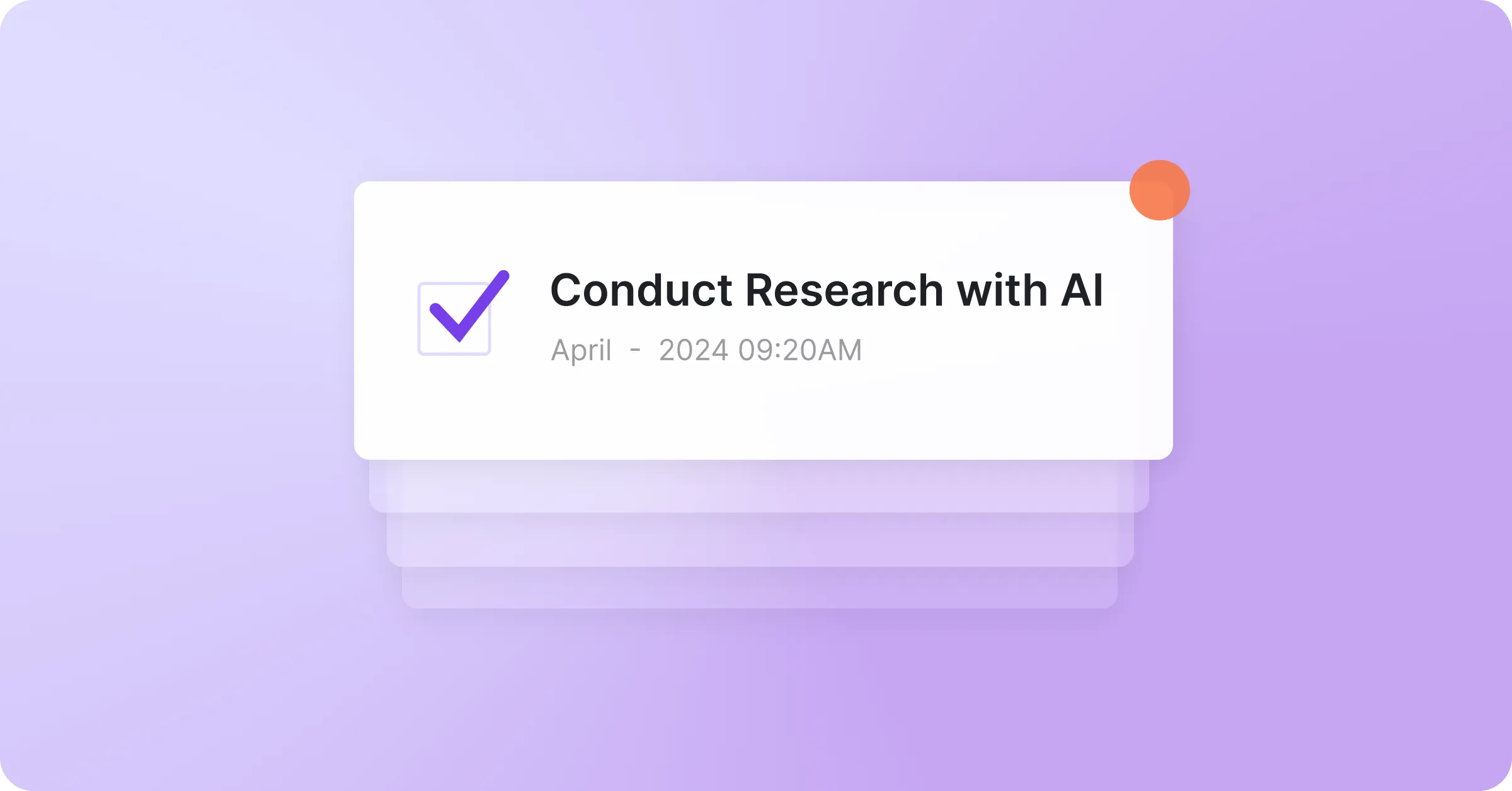
How to Properly Conduct Research with AI: Tools, Process, and Approach

What’s a Double Negative? + How To Fix It
Looking for fresh content, thank you your submission has been received.

Language & Grammar

Science & Social Studies

Digital Learning
6 strong anchor charts for opinion writing.

Opinion Writing may seem like the most simple of the writing standards, but without adequate modeling and practice, students won’t be able to fully develop their opinion writing skills. Today, I am going to talk about 6 strong anchor charts for opinion writing. Anchor charts are always a great tool for instruction, especially when introducing a new skill. They are visual, interactive, and they can help students organize their thoughts!
Introducing Opinion Writing Structure

When introducing opinion writing, you will want to preview the overall structure. Students need to know what they’re looking for in writing examples and modeling. This is always one of my 6 anchor charts for opinion writing because the “OREO” acronym is very helpful! This is an easy way for students to remember what to include in an opinion writing piece. The first O is the introduction (which we will talk about later in the post). The introduction will need to include the writer’s opinion. This is followed by the R, reasons, and E, examples, or evidence. Finally, students will need to restate their O, opinion in the conclusion. If they can remember OREO, they can remember the Opinion Writing structure!
Teaching How to State an Opinion

After introducing the structure, students will need to start developing their own opinion statements. This simple anchor chart can be an interactive lesson, with your students’ involvement in the process. Students will need to have a collection of Opinion Stems in their mental writing toolbox so that they can develop strong opinion statements. They will need to learn to include an opinion stem in the statement. So, instead of saying, “cats are the best,” they will say, “In my opinion,” or “I believe that cats are the best type of pet.” Providing examples for the students to reference will help them state their opinions across all content areas, too!
Anchor Charts that Teach Supporting Reasons

Next, comes another reusable anchor chart for opinion writing. Students are going to benefit from learning how to supply reasons within their opinion writing and throughout the rest of their skill development. Not only with they use this skill in writing class, but across all content areas and in their real lives. When teaching this skill, you will want to focus on the question: Why? I also like to reference the phrase: Prove it. Provide plentiful examples for reasons and evidence so that students are able to pick out quality over quantity.
This easy, reusable anchor chart allows students to think about reasons and evidence. When discussing an opinion topic, record two solid pieces of evidence or reasons, written in strong opinion statements. If you laminate it, you can have students record their own examples throughout your opinion writing unit. The more they practice, even when seeing other student examples, the more they learn!
Teaching Introductions and Conclusions Explicitly

Now, just because opinion writing follows more of a formula than the other types of writing, doesn’t mean it shouldn’t be interesting. Hooking your reader and reminding them of your purpose is going to improve any type of writing. So, it is important to have explicit instruction and practice for introductions and opinions. These anchor charts could be reused and referenced for opinion writing pieces throughout your year.
Create an anchor chart with different examples of interesting introductions. Again, these can be changed throughout your unit. In fact, as a positive reinforcement tool, when you read a great introduction from one of your students, stop and call attention to it. “Wow! I have just read a great introduction by _______. It hooked me! ________ would you like to add that to our introductions poster?”
With conclusions, students will need to learn solid conclusion stems. So, another simple anchor chart with sticky notes should do! Keep the focus on redirecting the reader. Students will want their readers to finish the piece knowing exactly what their opinion is.
Don’t Forget Linking Words and Transitions

Finally, the last of my 6 anchor charts for opinion writing! We can’t forget linking and transition words. Use an anchor chart like the one above to create a collection of strong linking and transition words. Students will most likely need plenty of modeling and examples for this part of the process. It is very easy for students to get stuck on a few transition words that they end up repeating again and again. These can be taught or revisited in the editing and revision process to clean up their pieces. Then, keep the anchor chart accessible so that it can be easily referenced and added to.
Interested in Ready-Made Lesson Plans for Opinion Writing?
If you’re interested in getting your students to master opinion writing without having to spend hours on planning and prep, I have all-inclusive units for you! These no-prep units have everything you need to teach opinion writing in your classroom!

Opinion Writing Units come complete with anchor charts, lesson plans, graphic organizers, writing prompts, and more! Click the button for your grade-level below:
Want a free set of Narrative Graphic Organizers?
Want to learn more about opinion writing.
- How to Teach Opinion Writing
- Mentor Texts: Opinion Writing
- Read more about: Anchor Charts , Common Core Aligned , Writing Blog Posts
You might also like...

3 Easy Times to Squeeze Speaking and Listening Skills into Your Day
In today’s blog post we will talk about incorporating speaking and listening skills in your elementary classroom! Finding time to focus on these crucial skills

Introduction to Fractions: Partitioning, Shares, and Fractions in 1st and 2nd Grade
Hello teachers! Welcome to today’s blog post, where we will dive into the fascinating world of fractions, tailored specifically for 1st and 2nd-grade classrooms. Fractions

Teaching Text Features in the Spring
This isn’t the first time we’ve discussed using the current season as a way to make your ELA content more engaging. Adding the element of
Join these happy teachers
Join the email list.
Get teaching tips, how-to guides, and freebies delivered right to your inbox every Wednesday!
Hi, I'm Jessica

I help elementary teachers master the standards by providing helpful standards-based tips, guides, and resources.

Let's Connect
Access your purchases
© Elementary Nest • Website by KristenDoyle.co

What Are The Essential Elements Of An Opinion Essay?
An opinion essay forms a body around the nucleus of your opinion. In this sense, it holds enough gravity in the middle. On your part, you need to hold down to your assertion without getting hypothetical about it.
The main element
The main element of the opinion piece is of course ubiquitous; it also has a head, body and tail. Its body is the crux around which the piece revolves. The Introduction assertively pits your opinion which you reinstate in the conclusion with greater vigor.
The body effect
You have to pull in your resources in the body. You have to think of ways to certify your opinion through different examples and illustrations. Each logic should take on from the former one and should work towards the general fortification.
You should ideally structure the piece in 5 paragraphs, which leaves you with three paragraphs of stylized opinions. You should leave one paragraph for the reverse psychosis. Here, you should play a fair game and present a counter argument.
The counter merit
The counter argument should have enough merit and you cannot take it lightly. It creates the contrast which makes your piece seem more beautiful and consistent. You should somehow prove that the counter argument does not hold much water; not with baseless suggestion but with strong logic.
You should also try to bring in some freshness about the topic with the power of your opinion. You should therefore make an attempt to learn and grasp more about the topic. This will give you greater leverage to tackle the topic.
Devolving opinion
You should use assertive words and phrases and shy away from words like вЂI assume’ or вЂI feel’. The reader should take it from your piece that he ought to believe in what you say. In the main, it should reflect on him as his own opinion.
It of course helps if you choose such opinionated topic about which you have an authoritative knowledge. This lends you the background on which you can work further and absorb more. Choosing rare or unsung topics and expostulating on it may be hitting the target in the dark.
Other essential qualities
Your smoothness and fluency are other qualitative essentials regarding the opinion essay. You should come across as extremely comfortable in the regime. This leaves an endearing effect on the whole piece and the opinions come out in a more rarefied manner.
Popular Blogs
- My Essay Geek
- US Essay Writers
- Writing Essays
Latest News
- Choosing topics about US government
- Fresh ideas for a film essay
- Writing an argumentative paper on justice
- Where to find free HRM papers
- Selecting your writing company
- Custom writing assistance
- Free compare & contrast papers
- Fresh topics on Romeo and Juliet
- Creating a problem solving essay
- Counseling paper examples
- Elementary school persuasive writing
- How to overcome procrastination
- Definition paper templates
- Writing on environmental problems
- Using English paper samples
- Ethnographic essay topics
- How to find a competent writer
- Choosing cause & effect topics
- Topics on emotional intelligence
- Choosing a writing agency
- Share full article
Advertisement
Supported by
Guest Essay
There’s No Such Thing as an American Bible

By Esau McCaulley
Contributing Opinion Writer
The presumptive Republican nominee for president of the United States, who weeks ago started selling shoes , is now peddling Bibles. During Holy Week.
What’s special about this Bible? So many things. For example, according to a promotional website, it’s the only Bible endorsed by Donald Trump. It’s also the only one endorsed by the country singer Lee Greenwood. Admittedly, the translation isn’t distinctive — it’s your standard King James Version — but the features are unique. This Bible includes the Constitution, the Bill of Rights, the Declaration of Independence, the Pledge of Allegiance and part of the lyrics of Mr. Greenwood’s song “God Bless the USA.” Perhaps most striking, the cover of the Bible does not include a cross or any symbol of the Christian tradition; instead, it is emblazoned with the American flag.
While part of me wants to laugh at the absurdity of it — and marvel at the sheer audacity — I find the messaging unsettling and deeply wrong. This God Bless the USA Bible, as it’s officially named, focuses on God’s blessing of one particular people. That is both its danger and, no doubt for some, its appeal.
Whether this Bible is an example of Christian nationalism I will leave to others. It is at least an example of Christian syncretism, a linking of certain myths about American exceptionalism and the Christian faith. This is the American church’s consistent folly: thinking that we are the protagonists in a story that began long before us and whose main character is in fact the Almighty.
Holy Week is the most sacred portion of the Christian calendar, a time when the church recounts the central events of our faith’s narrative, climaxing in the death and resurrection of Jesus. That story, unlike the parochial God Bless the USA Bible, does not belong to any culture.
Holy Week is celebrated on every continent and in too many languages to number. Some of the immigrants Mr. Trump declared were “ poisoning the blood” of America will probably shout “Christ is risen!” this Easter. Many of them come from the largely Christian regions of Latin America and the Caribbean. They may have entered the country with Bibles in their native tongues nestled securely among their other belongings.
One of the beauties of the Christian faith is that it leaps over the lines dividing countries, leading the faithful to call fellow believers from very different cultures brothers and sisters. Most of the members of this international community consist of the poor living in Africa, Asia and Latin America. There are more Spanish-speaking Christians than English- speaking ones .
If there are central messages that emerge from the variety of services that take place during Holy Week, for many Christians they are the setting aside of power to serve, the supremacy of love, the offer of divine forgiveness and the vulnerability of a crucified God.
This is not the stuff of moneymaking schemes or American presidential campaigns.
It was Pontius Pilate , standing in as the representative of the Roman Empire, who sentenced Jesus to death. The Easter story reminds believers that empires are more than willing to sacrifice the innocent if it allows rulers to stay in power. The church sees Christ’s resurrection as liberating the believer from the power of sin. The story challenges imperial modes of thinking, supplanting the endless pursuit of power with the primacy of love and service.
Easter, using the language of St. Augustine, represents the victory of the City of God over the City of Man. It declares the limits of the moral reasoning of nation-states and has fortified Christians who’ve resisted evil regimes such as fascists in South America, Nazis in Germany, apartheid in South Africa and segregation in the United States.
For any politician to suppose that a nation’s founding documents and a country music song can stand side by side with biblical texts fails at a theological and a moral level. I can’t imagine people in other countries going for anything like it. It is hard to picture a modern “God Bless England” Bible with elements of British common law appended to Christianity’s most sacred texts.
I am glad for the freedoms that we share as Americans. But the idea of a Bible explicitly made for one nation displays a misunderstanding of the story the Bible attempts to tell. The Christian narrative culminates in the creation of the Kingdom (and family) of God, a transnational community united by faith and mutual love.
Roman Catholics , Anglicans and Orthodox Christians, who together claim around 1.5 billion members, describe the Bible as a final authority in matters of faith. Evangelicals, who have overwhelmingly supported Mr. Trump over the course of three election cycles, are known for their focus on Scripture, too. None of these traditions cite or refer to any American political documents in their doctrinal statements — and for good reason.
This Bible may be unique in its form, but the agenda it pursues has recurred throughout history. Christianity is often either co-opted or suppressed; it is rarely given the space to be itself. African American Christians have long struggled to disentangle biblical texts from their misuse in the United States. There is a reason that the abolitionist Frederick Douglass said that between the Christianity of this land (America) and the Christianity of Christ, he recognized the “widest possible difference.”
And while Christianity was used to give theological cover to North American race-based chattel slavery, it was violently attacked in places like El Salvador and Uganda, when leaders including the archbishops Oscar Romero and Janani Luwum spoke out against political corruption.
The work of the church is to remain constantly vigilant to maintain its independence and the credibility of its witness. In the case of this particular Bible, discerning what is happening is not difficult. Christians are being played. Rather than being an appropriate time to debut a patriotic Bible, Easter season is an opportune moment for the church to recover the testimony of the supremacy of the cross over any flag, especially one on the cover of a Bible.
Esau McCaulley ( @esaumccaulley ) is a contributing Opinion writer, the author of “ How Far to the Promised Land: One Black Family’s Story of Hope and Survival in the American South ” and an associate professor of New Testament at Wheaton College.
The Times is committed to publishing a diversity of letters to the editor. We’d like to hear what you think about this or any of our articles. Here are some tips . And here’s our email: [email protected] .
Follow The New York Times Opinion section on Facebook , Instagram , TikTok , WhatsApp , X and Threads .
Breaking News
The 50 best Hollywood books of all time

- Show more sharing options
- Copy Link URL Copied!
It’s been said that Hollywood is more an idea than a place, and no task punctuates the notion quite like asking people to choose the best Hollywood book of all time: “What do you mean,” they inevitably ask, “by ‘Hollywood’?”
The list that follows, compiled from a survey of experts in the worlds of publishing and entertainment and written by regular contributors to The Times’ film and books coverage, answers that question more astutely than I ever could. In fiction and non-, across genres and decades, these 50 titles compare Hollywood to an assembly line, a criminal enterprise, a high-seas expedition and much, much more — a penchant for shape-shifting that might explain its hold on the cultural imagination.
Yet any entity that can simultaneously be described as an industry, a society, even a style, is liable to collect more detractors than it would had it remained simply a real estate development, and if there’s a through-line in the great Hollywood books it is the conviction that creating magic must come at a cost. Sometimes comic, more often tragic, they chronicle disappointments, humiliations, botch-jobs and flops of every conceivable variety, personal and professional, creative and economic, individual and institutional; even the more rose-colored perspectives still make it seem as if producing a single movie, much less a good one, qualifies as a miracle.
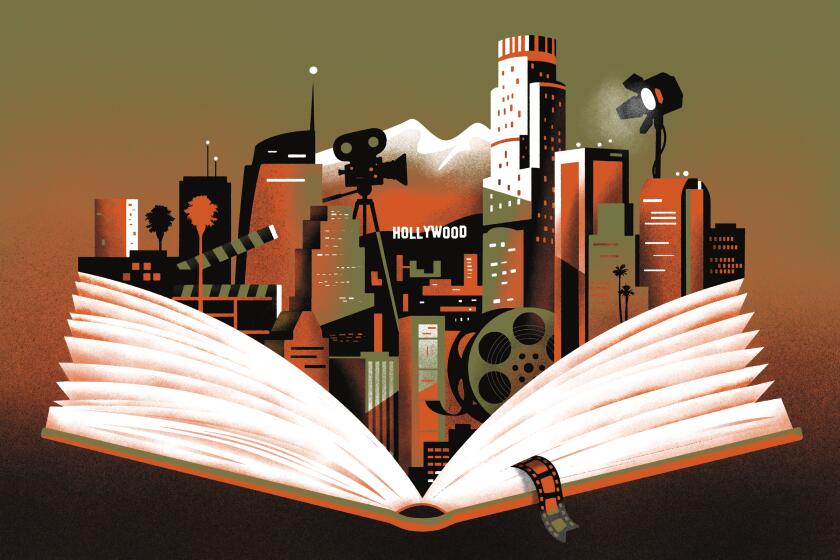
We chose the best Hollywood books of all time. What’s on your list?
But that, I suspect, is why we keep coming back, self-flagellants before the altar of motion pictures. This place, this idea, demands of its adherents what religion does any pilgrim — devotion, sacrifice, faith that all will be worth it in the end — and supplies in turn the same benefits — ritual, community, comfort. You simply have to take it on trust: If watching movies is heaven, and living without them is hell, then Hollywood is the purgatory in between. — Matt Brennan
Subscribers get exclusive access to this story
We’re offering L.A. Times subscribers special access to our best journalism. Thank you for your support. Explore more Subscriber Exclusive content .
Movies (and Other Things)
(Shea Serrano, 2019)
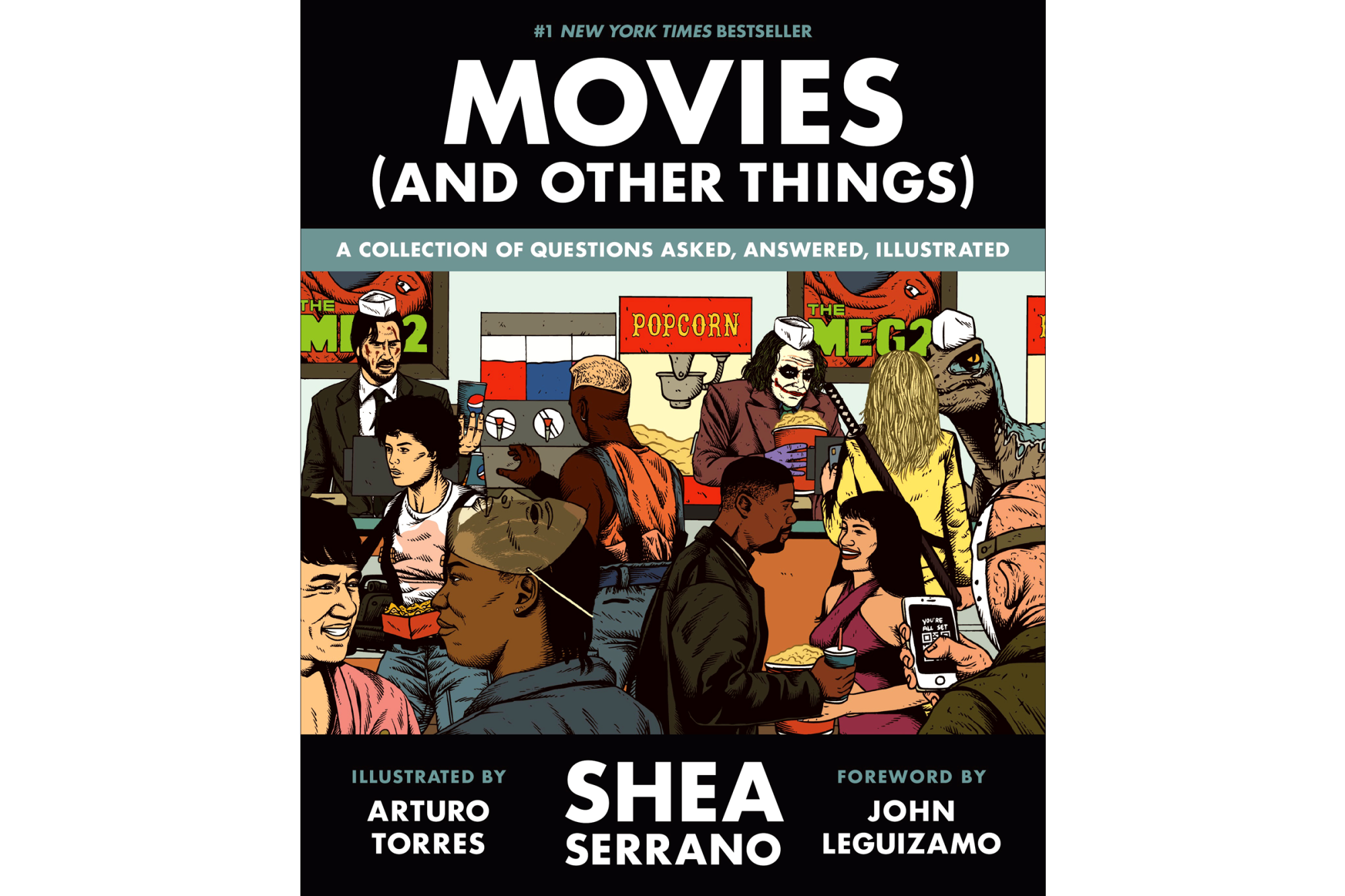
There’s a nonchalant freshness to the way former journalist and author Serrano writes about the variety of subjects that interest him, whether basketball or movies. His entertaining and insightful musings on the latter form the uniquely titled chapters here: Each of them aims to provide answers to one of Serrano’s specific inquiries related to popular flicks. The approachable tone, and the selection of films discussed, removes any sense of snobbery that some readers may associate with film criticism. Serrano doesn’t purport to be an expert but rather a movie fan, one with a talent for crafting engaging prose, sharing his most galaxy-brained thoughts on the kind of movies one has seen more times than they can count. — Carlos Aguilar

Myra Breckinridge
(Gore Vidal, 1968)
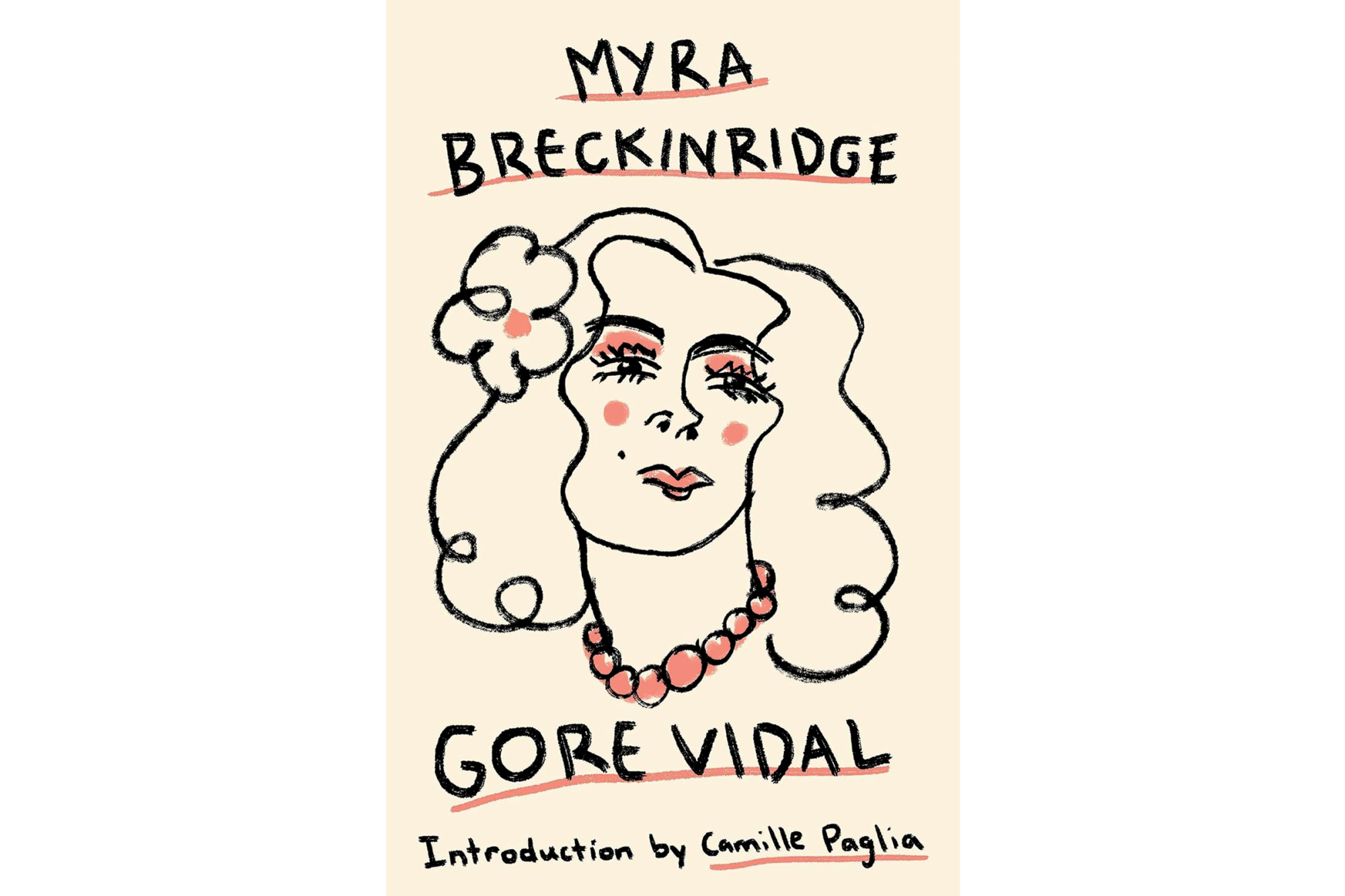
Vidal’s 1968 tale of a trans woman exacting her revenge on a Hollywood studio is campy and profane, its exclamatory prose giddy to provoke. Written in a haste that contrasted Vidal’s more considered historical fiction, “Myra” reads like Vidal was in a mad dash to work through his own sexuality. (“A very subtle psychological self-portrait,” was Christopher Isherwood’s cheeky assessment.) But its heedless vigor is part of its enduring charm, sending up the egos and power plays (both financial and sexual) that drive the movie business. The book is probably best known for a dismal 1970 adaptation starring Raquel Welch and John Huston that remains bolted to lists of the worst-ever movies. But the novel itself remains a potent Tinseltown satire. — Mark Athitakis

The Big Goodbye: Chinatown and the Last Years of Hollywood
(Sam Wasson, 2020)
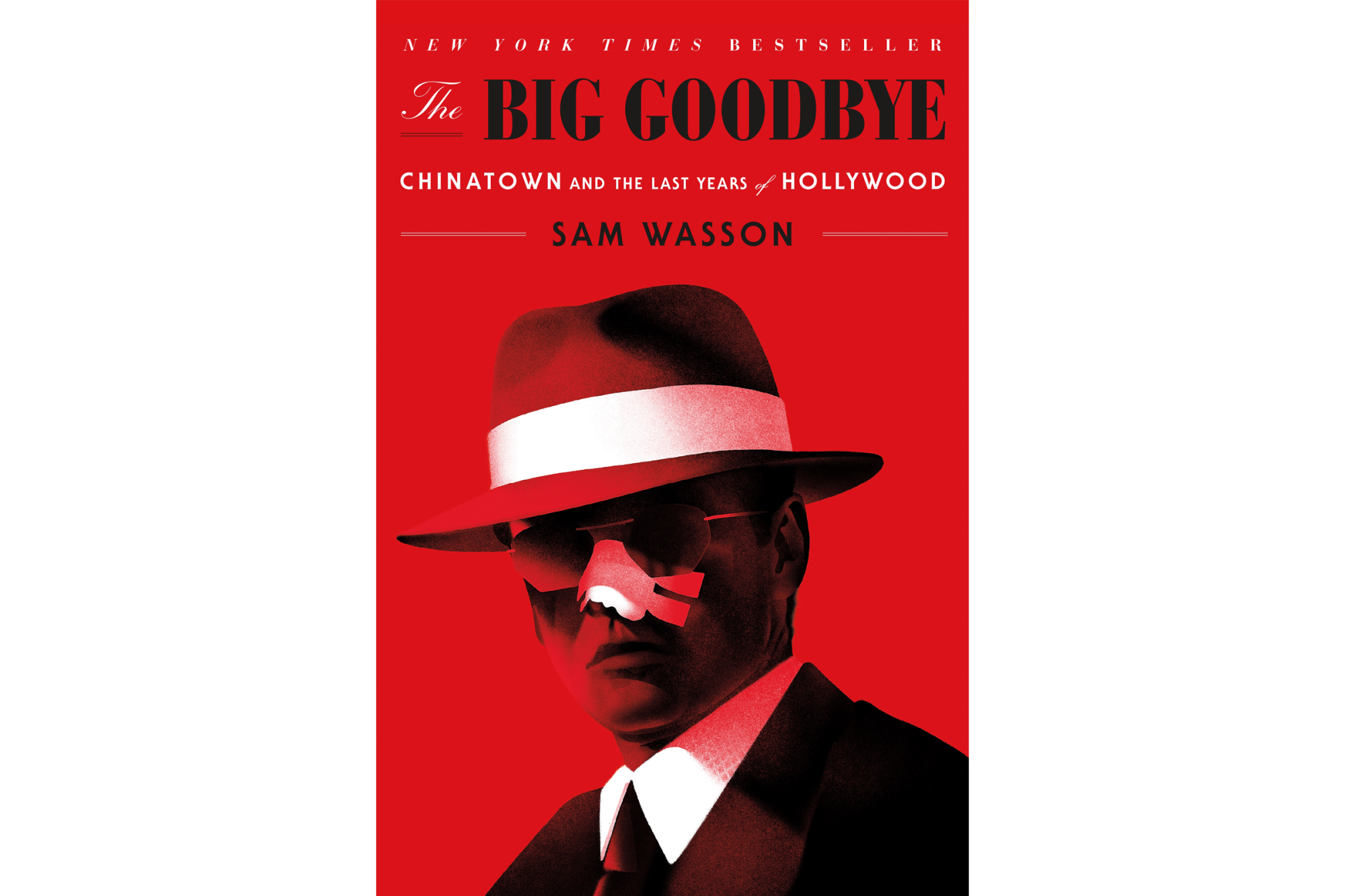
No one has been more haunted by the fateful final line of Roman Polanski’s most accomplished work, “Forget it, Jake. It’s Chinatown,” than Wasson. To dissect a seminal work in American cinema, the author dived deep into the minds and lives of the key players that came together for this picture about corruption in 1930s Los Angeles to become what it is. These include star Jack Nicholson, Paramount executive Robert Evans, screenwriter Robert Towne and the controversial Polanski himself. As he maps the creation of “Chinatown” in astounding detail, Wasson simultaneously eulogizes the bygone era when Hollywood studios were interested in filmmaking with an idiosyncratic voice. — C A

(Bruce Wagner, 2012)
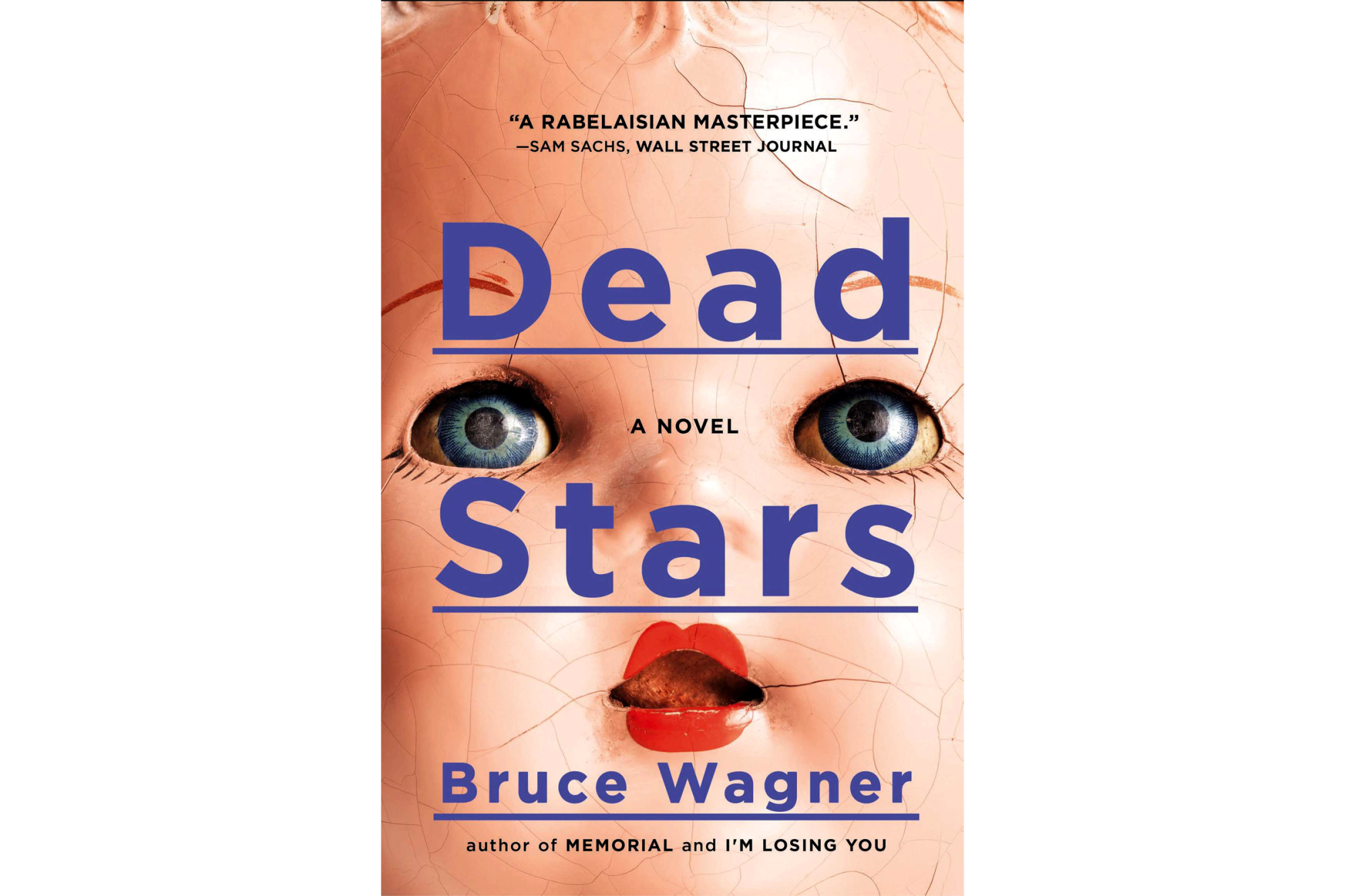
Don’t look for someone to like in this blistering, X-rated takedown of Hollywood strivers. Not the pregnant teen who’s been exploited by her Nan Goldin-like mother since childhood or her porn-obsessed boyfriend. Not the paparazzo who strives for underage crotch-shots or the young cancer survivor who spells it with a K, hoping to get the attention of the Kardashians. Published in 2012, the text leaps, runs on, includes emoticons and ignores punctuation, just like DMs and text messages. In this massive, manic book full of explicit sex and characters with equally naked ambition, Wagner holds a mirror up to the underside of Hollywood. It may be a disturbing vision, but that doesn’t mean it’s not true. — Carolyn Kellogg

Arabs and Muslims in the Media: Race and Representation after 9/11
(Evelyn Alsultany, 2012)
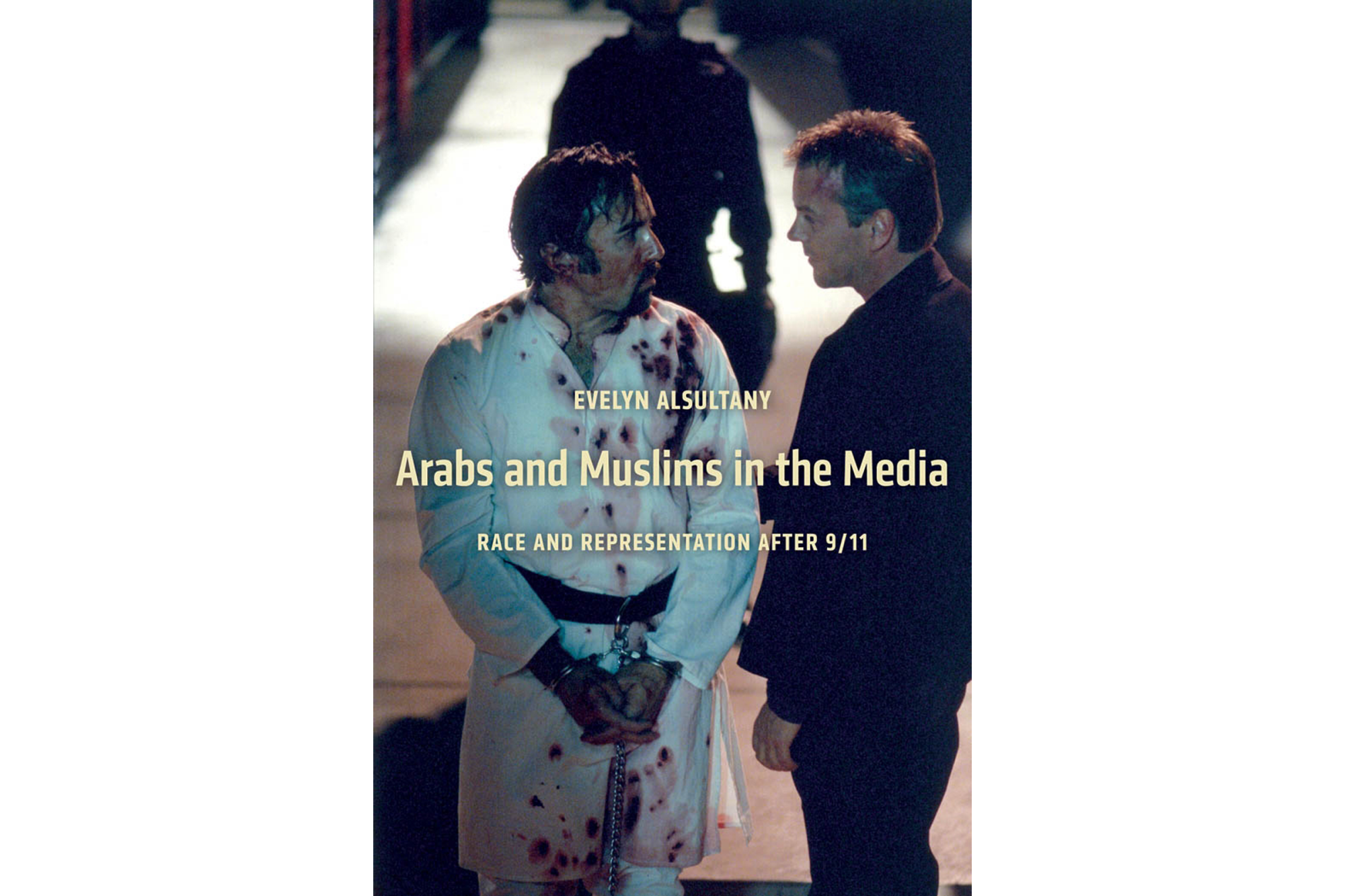
At the heart of this erudite academic monograph is a counterintuitive claim: following the 2001 attacks on the World Trade Center and the Pentagon, the rise of hate crimes and government policies that targeted Arabs and Muslims was met with an equally high incidence of sympathetic portrayals of those populations in the U.S. media. That’s not to say there weren’t horribly damaging depictions of Middle Eastern terrorists rooted in offensive racial stereotypes — many concocted in the service of offering up an “evil cultural Other” that anchored much of the rhetoric around the so-called War on Terror. But Alsultany’s study keenly avoids endorsement of neat categories like “good” and “bad” representation, aiming instead to complicate how it is that media images on either side of that divide can fuel meanings that end up justifying policies of exclusion and inequality. — Manuel Betancourt

The Deer Park
(Norman Mailer, 1955)
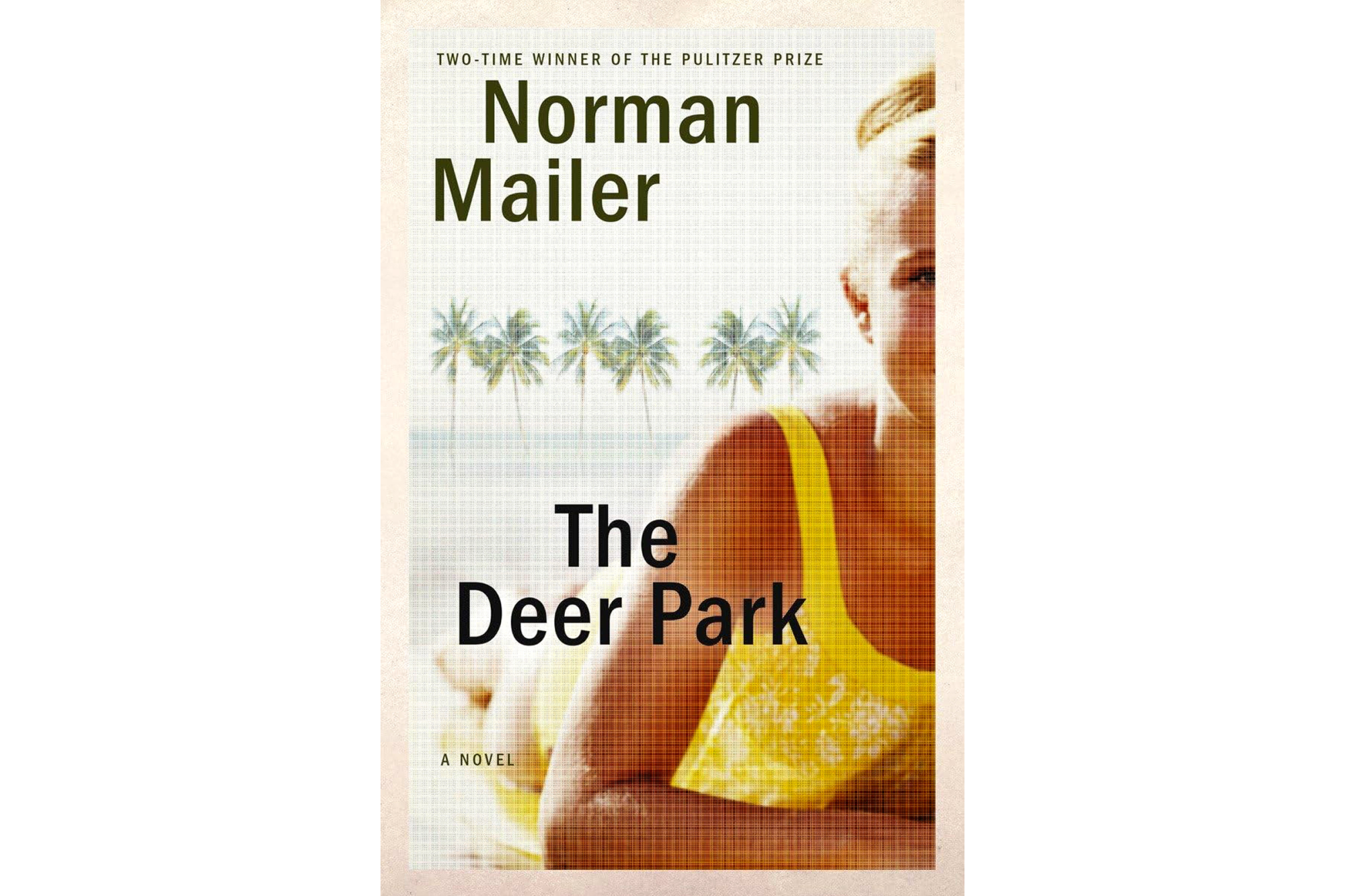
Though set in Palm Springs, “The Deer Park” is the most insightful, unsparing look at the machineries of Hollywood I know of — Mailer’s underrated masterpiece.
— HOWARD RODMAN, novelist, screenwriter, former president of the Writers Guild of America West and current vice president, Academy of Motion Picture Arts and Sciences

Everybody Thought We Were Crazy: Dennis Hopper, Brooke Hayward, and 1960s Los Angeles
(Mark Rozzo, 2022)
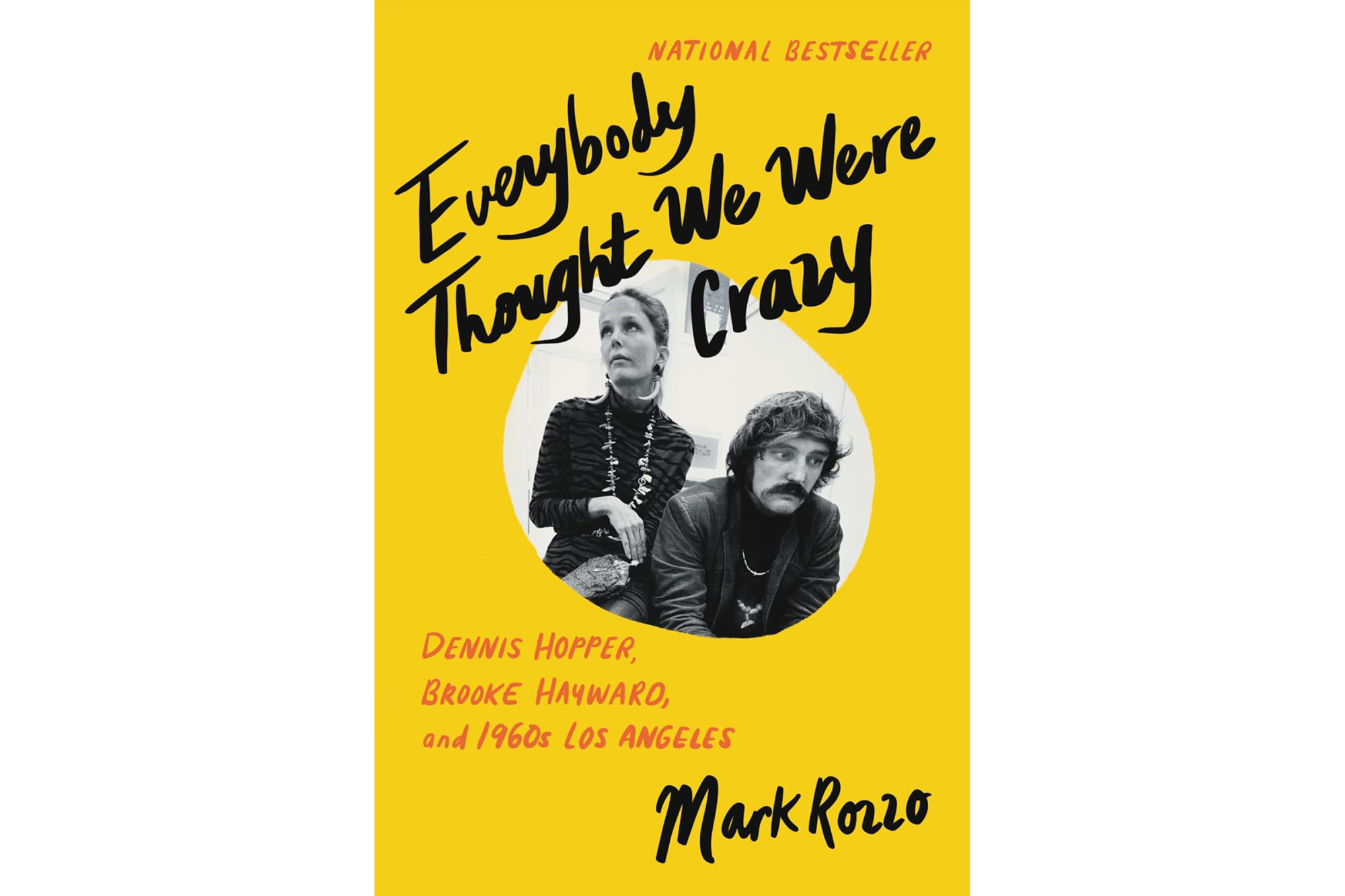
Hopper is the bold-faced name, but Hayward is the heart of this intimate story of a marriage that tied together the L.A. art and music scenes, Golden Era Hollywood and the emerging indie film movement. Hayward’s parents were so Old Hollywood that she and Hopper were regularly invited to David O. Selznick’s house; Hopper would, after their split, make “Easy Rider.” Before things fall apart, they hang with the Ferus Gallery and help Andy Warhol have his first L.A. art show; act and model and start a family; and play host to a glittering parade of soon-to-be-famous musicians and actors. Hayward is still with us and opened the door to tell the story of the time her bohemian, chaotic Hollywood home played host to a seismic shift in three art forms at once. — C K

Stay Tuned: An Inside Look at the Making of Prime-Time Television
(Richard Levinson and William Link, 1981)
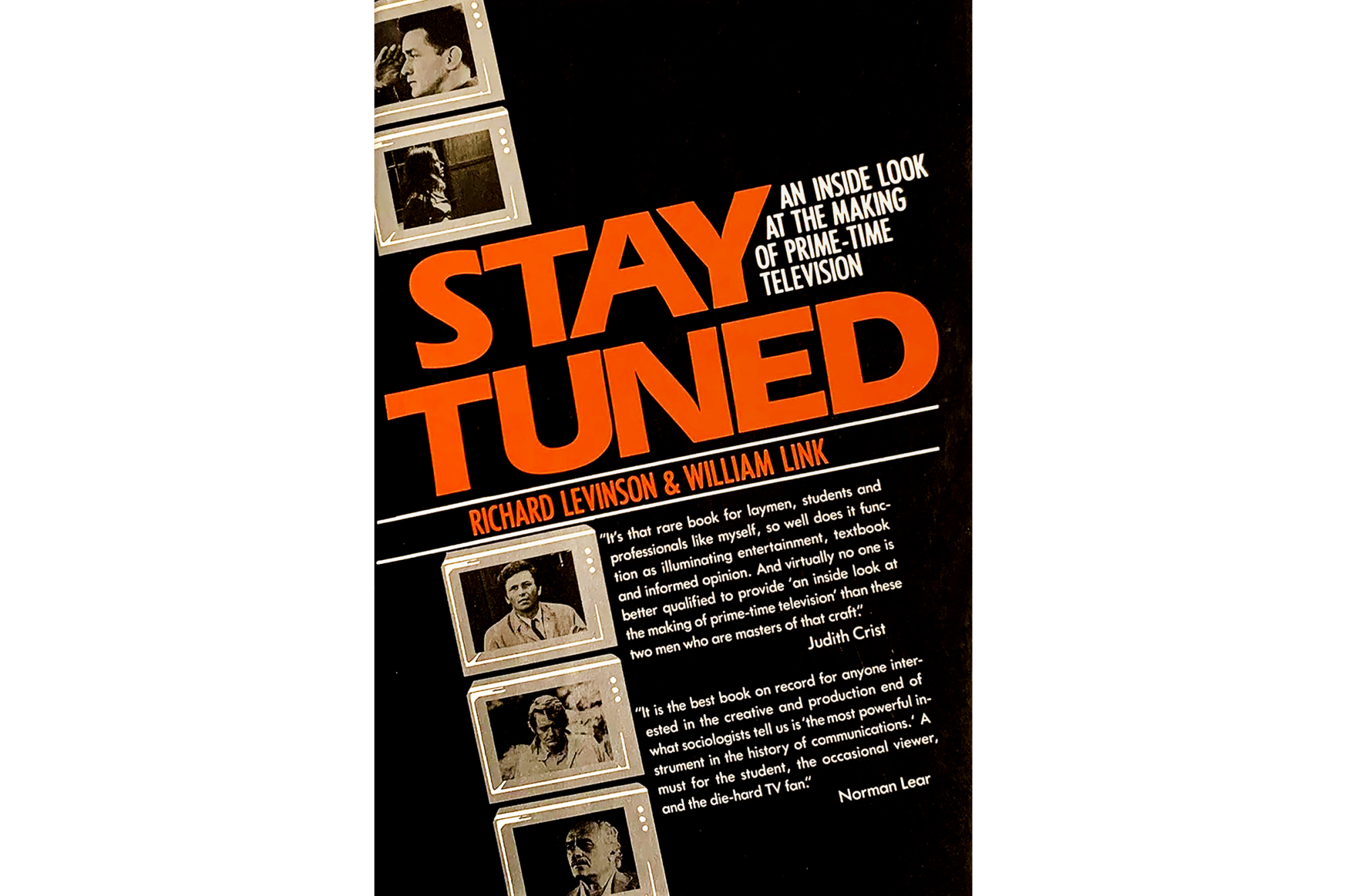
Levinson and Link are hardly household names among today’s TV heads, but they deserve to be. As the creators of “Columbo” and “Murder, She Wrote,” and a library full of trailblazing TV movies (including “Crisis at Central High” and “That Certain Summer”), they combined razor-sharp storytelling instincts with an acute social consciousness at a time when television was still widely derided as “the idiot box” (or worse). They also wrote this shrewdly intelligent assessment of their work and their chosen field, a good two decades before the dawn of prestige cable and the widespread acceptance that the small screen is where the really good storytelling happens. The book’s title intentionally predicts great things on the horizon in the early ‘80s, when Levinson and Link wrote the book. They’re also low-key quite funny, as when they point out that the producer of any dramatic series might also indulge in some rewriting “if he’s a writer (or thinks he’s a writer).” — Chris Vognar

Making the White Man’s Indian: Native Americans and Hollywood Movies
(Angela Aleiss, 2005)
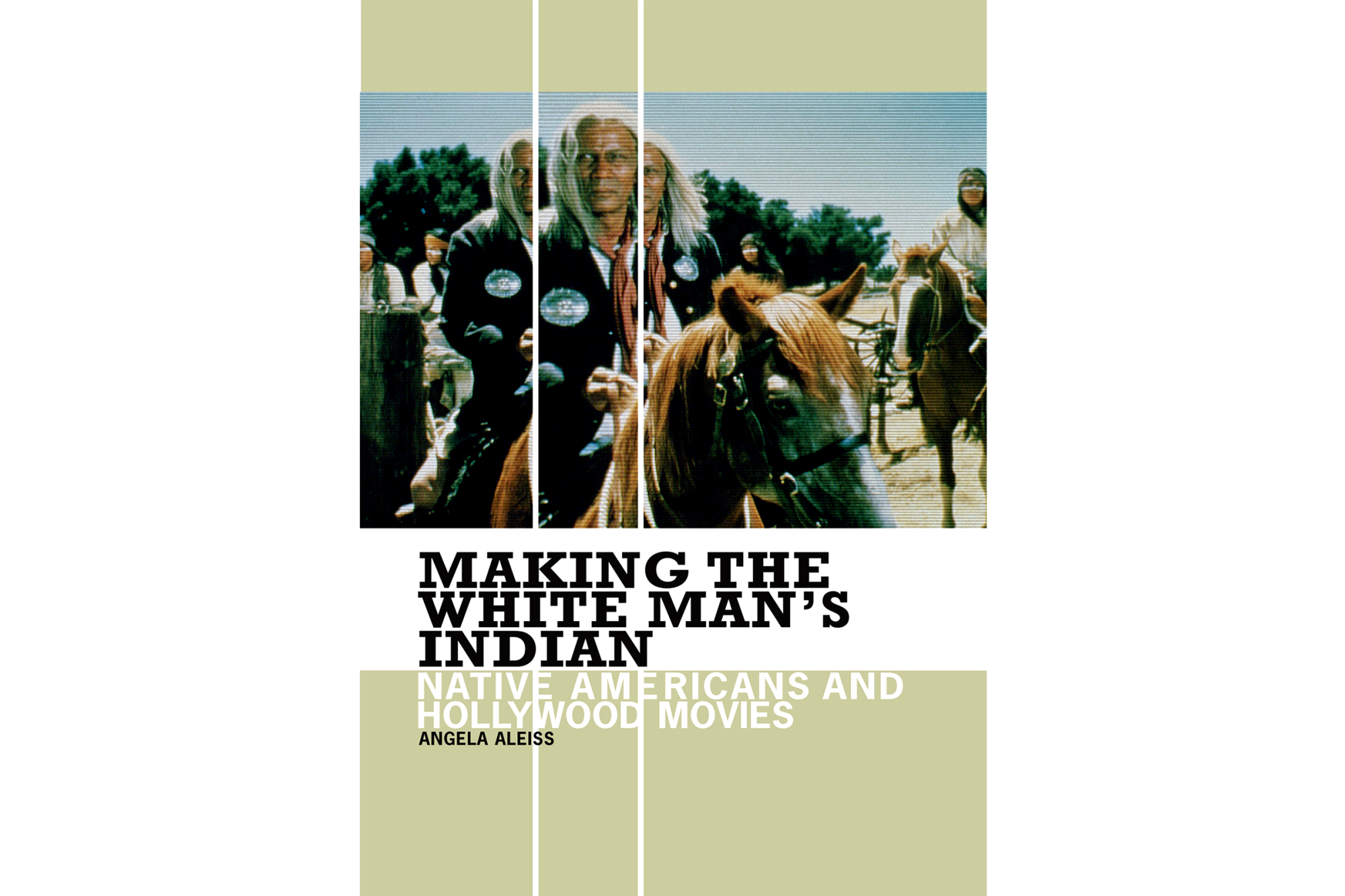
A rigorous study of how anti-Native racism and misrepresentation has pervaded Hollywood filmmaking, from D.W. Griffith shorts to “The Searchers,” “Stagecoach” to “Dances With Wolves,” one-note savages to white saviors. But Aleiss, who watched dozens of features and shorts for this influential book, also demonstrates that there were plenty of affirming stories about Native Americans in the pre-western era — “the Indian as a noble hero actually preceded the cowboy star,” she notes. But such stories were frozen out in favor of cowboys-and-Indians yarns, and shifting audiences throughout the 20th century influenced what kinds of Native American narratives were elevated and suppressed. Aleiss spotlights the industry groups and directors who’ve worked to address stereotypes about “half-breeds” and conversation narratives but also demonstrates why it’s often been a losing battle. — M A

(Kennedy Ryan, 2021)
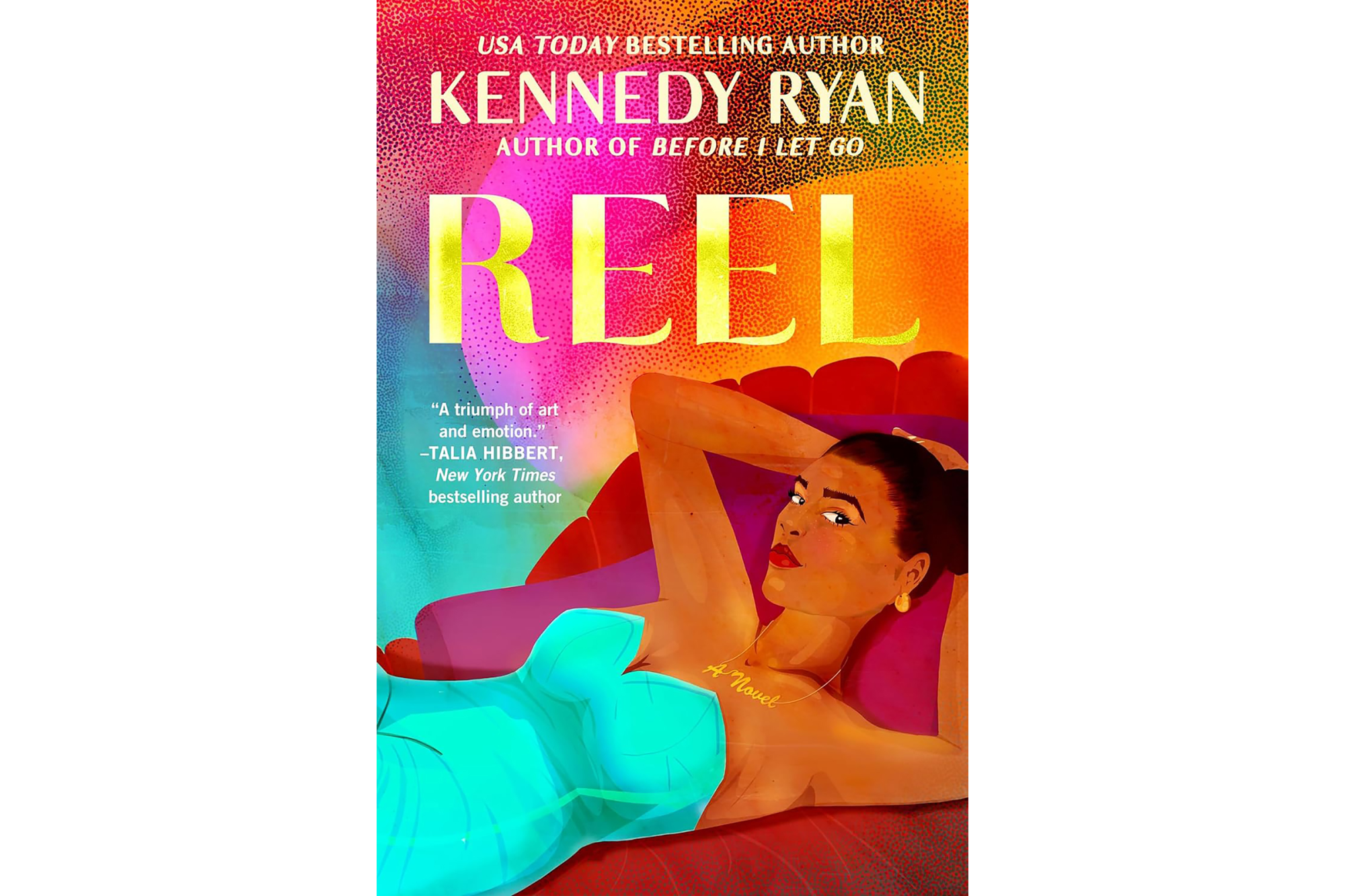
“Reel” is a gorgeous romance novel about Broadway and Hollywood. Through Ryan’s masterful storytelling, readers are transported into a world where passion, ambition and the pursuit of one’s dreams collide, leaving the characters to make difficult choices about love, family and the future.
— LEAH KOCH, co-owner of Culver City’s the Ripped Bodice, the first independent bookstore in the United States devoted to the celebration of romance novels
Raising Kane
(Pauline Kael, 1971)
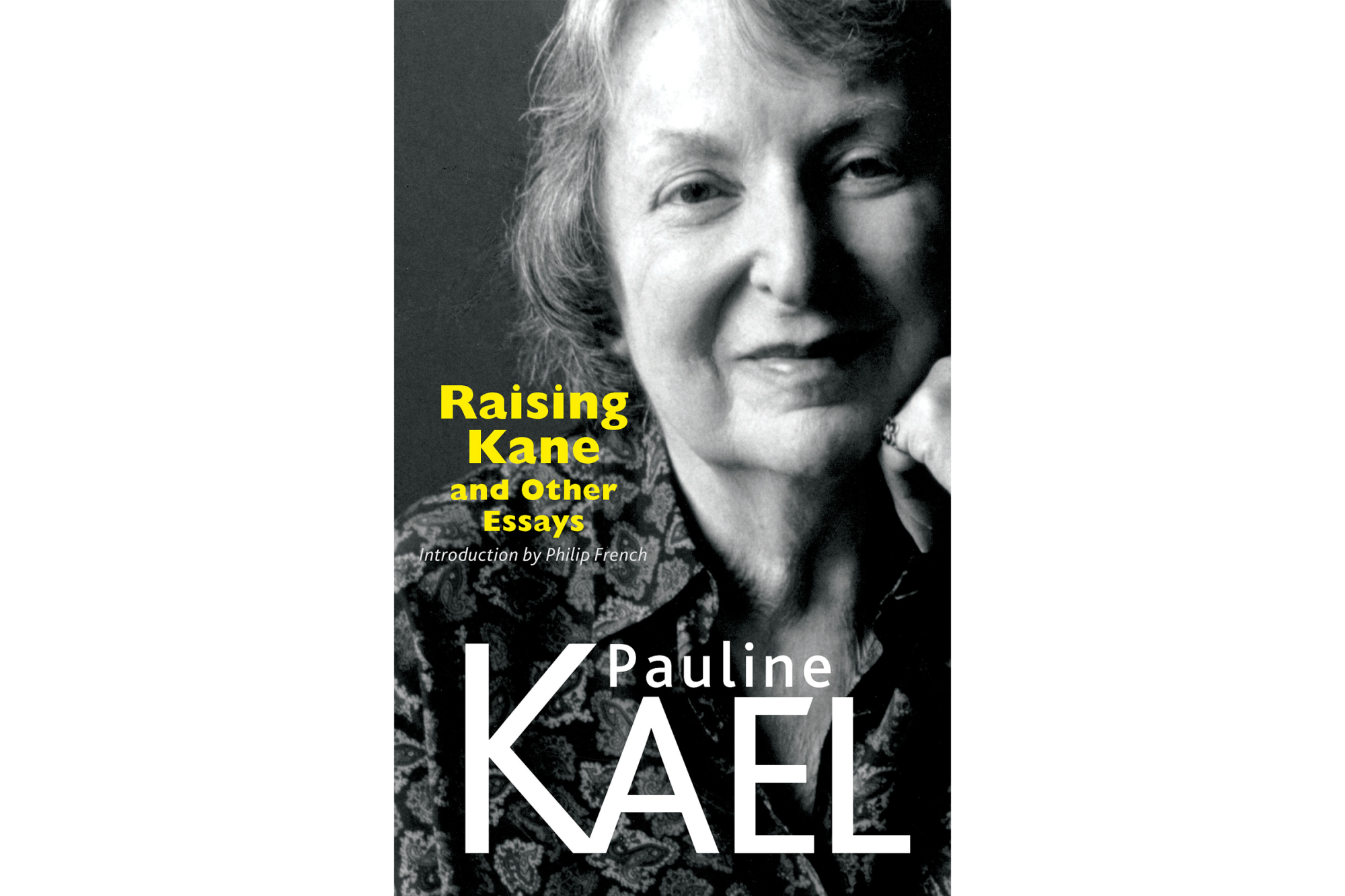
Did Orson Welles get too much glory for “Citizen Kane”? Absolutely, New Yorker film critic Pauline Kael insists in this novella-length fire-starter about the making of the greatest movie of all time. (We can save that skirmish for another day.) As Charles Foster Kane, a sendup of newspaper tycoon William Randolph Hearst, Welles embodied the image of a vainglorious Great Man. But Welles’ success, according to Kael, meant he also needed to be taken down a peg. > GO TO STORY
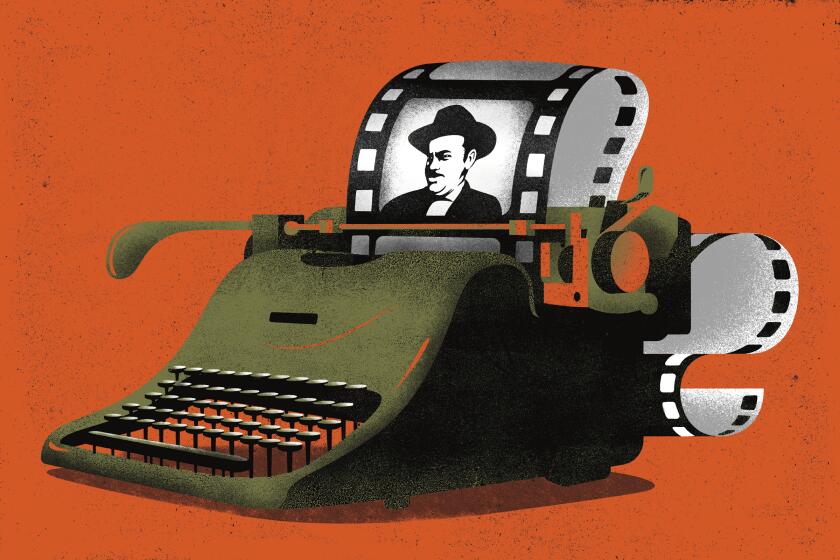
Why Kael’s fight over ‘Citizen Kane’ still matters
Subscriber Exclusive Alert
If you're an L.A. Times subscriber, you can sign up to get alerts about early or entirely exclusive content.
You may occasionally receive promotional content from the Los Angeles Times.

Toms, Coons, Mulattoes, Mammies, and Bucks: An Interpretive History of Blacks in American Films
(Donald Bogle, 1973)
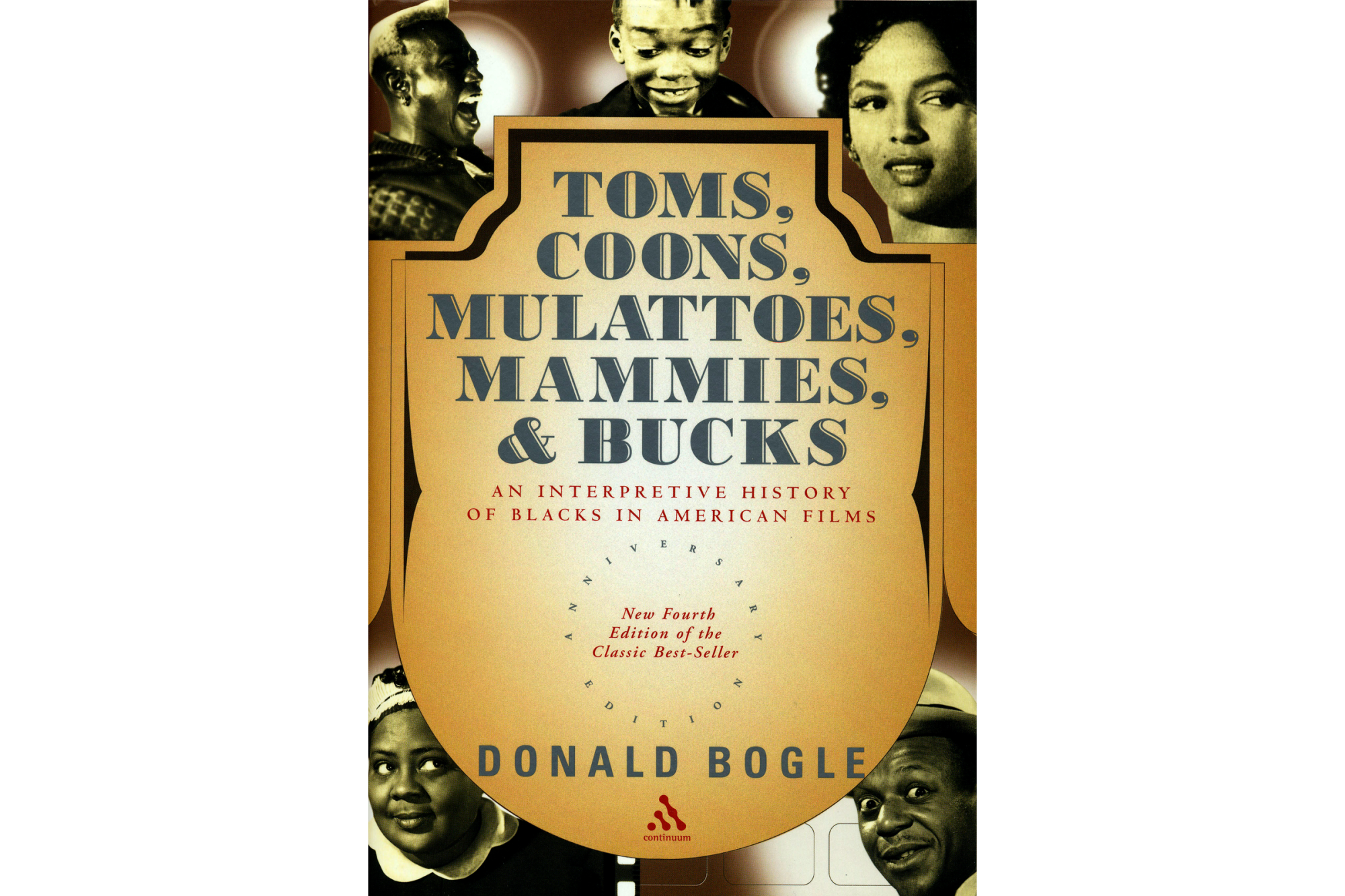
Donald Bogle’s “Toms, Coons, Mulattoes, Mammies, and Bucks” is considered the standard text on Black characters in American movies. But when the book was first published, in 1973, it was just about the only text on the subject. This might be hard to imagine today, when books about the intersection of race and cinema flow forth on a regular basis (among the strongest in recent years are Will Haygood’s “Colorization: One Hundred Years of Black Films in a White World” and Robin R. Means Coleman’s “The Black Guy Dies First: Black Horror Cinema From Fodder to Oscar”). Such abundance was unthinkable when Bogle, then a young journalist who had worked as a story editor for Otto Preminger, began his odyssey into the industry’s appallingly racist history. Bogle’s book was practically the birth of the field. > GO TO STORY

The book that shaped Black Hollywood history

Madly, Deeply: The Diaries of Alan Rickman
(Alan Rickman, 2022)
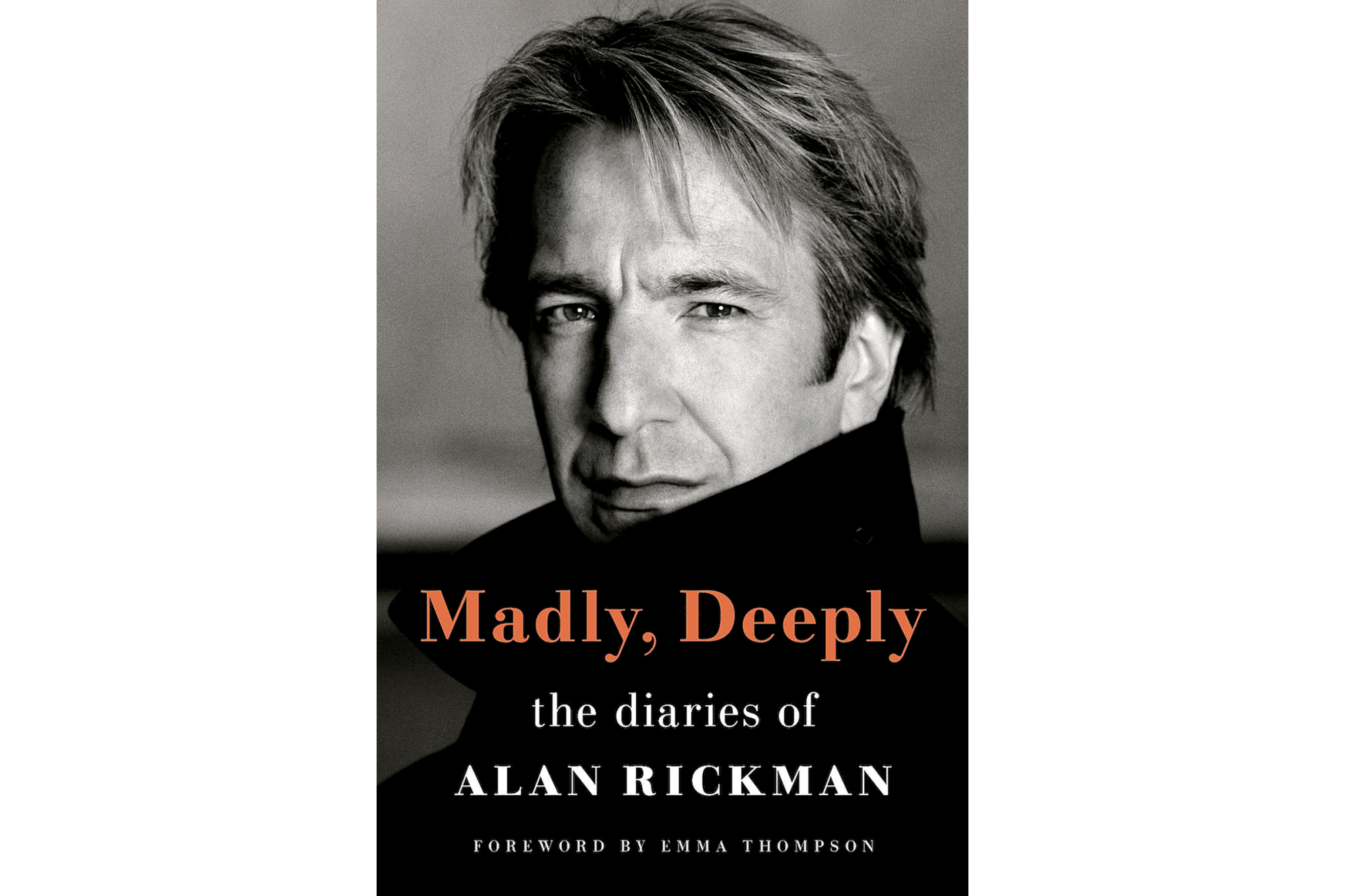
Today, the late British actor might best be known for playing stern wizard Severus Snape in the “Harry Potter” film franchise. But in a career spanning nearly four decades, he amassed a wide-ranging collection of on-screen personas. What these diaries reveal, however, is that perhaps the Rickman behind the scenes was the most compelling character. The compilation of forthright entries opens a window into his most intimate moments with friends and loved ones, as well as memorable professional experiences. The self-portrait that text pieces together is that of a multifaceted person and artist with a singular perspective on his craft and on quotidian life. — C A

Monsters: A Fan’s Dilemma
(Claire Dederer, 2023)

Perhaps the most exhilarating thing about this book is not the subject matter — can we consume art after learning how monstrous the artist is? — but how Dederer puts her thinking about it down on the page. She considers all the angles on Roman Polanski, the film director who pleaded guilty to having sex with a minor in 1977 and has been accused of other incidents of sexual assault — who also himself suffered extraordinary trauma and has (significantly to Dederer, once a film critic) made great movies. She is more forgiving than you might think, which allows her fascinating book to invite engagement. In addition to filmmakers, she looks at writers, musicians and actors and also female monsters (bad mothers). Winner of the L.A. Times’ 2023 Christopher Isherwood Prize for Autobiographical Prose , this book is a remarkable artistic inquiry. — C K

Memo From David O. Selznick
(David O. Selznick, selected and edited by Rudy Behlmer, 1972)
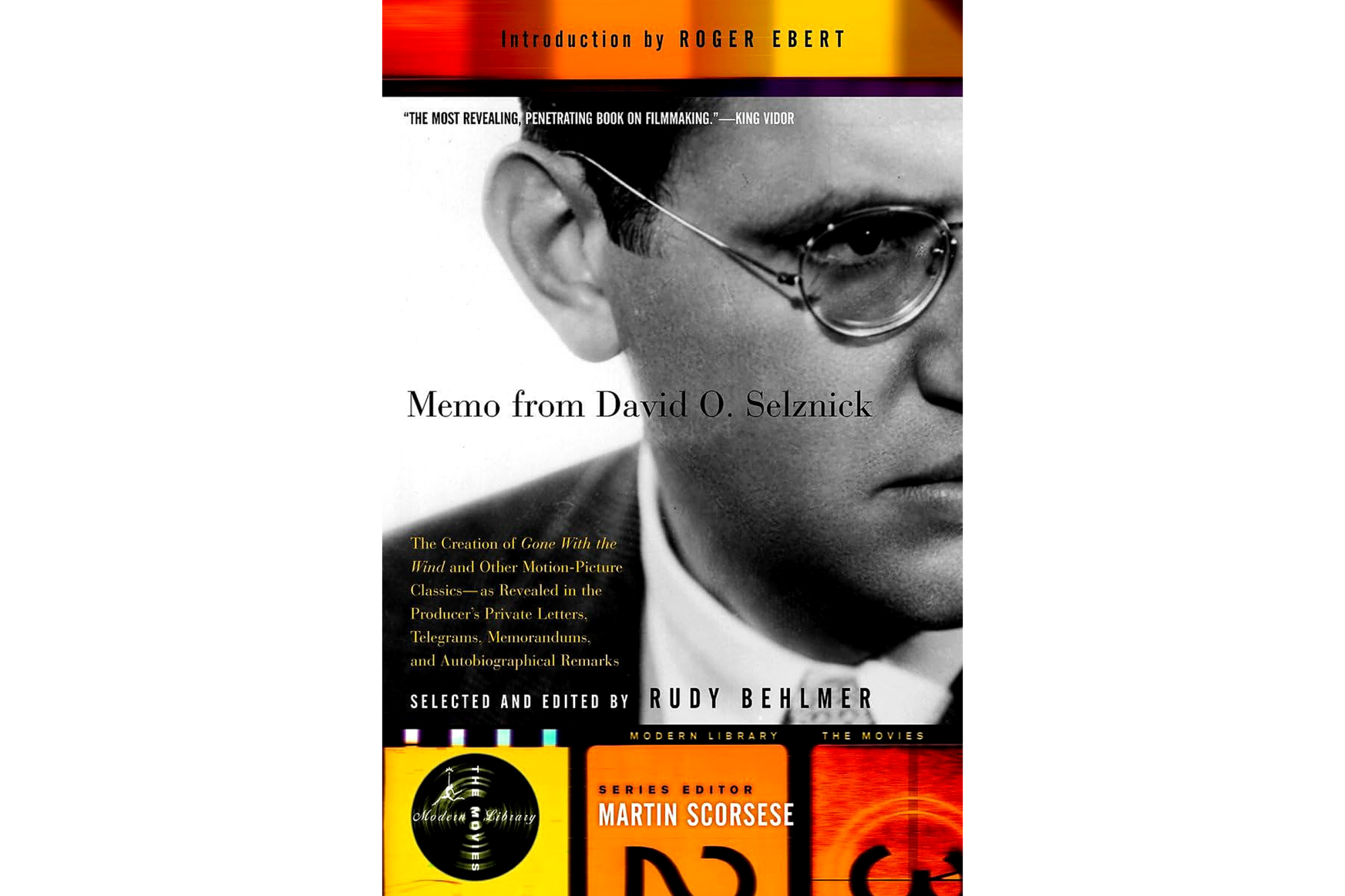
If you want to learn about how to produce, this is an incredibly fun way to do it.
— DAVID MADDEN, head of global entertainment for Wattpad WEBTOON Studios and former executive at Fox, AMC Networks and Berlanti Television

Valley of the Dolls
(Jacqueline Susann, 1966)
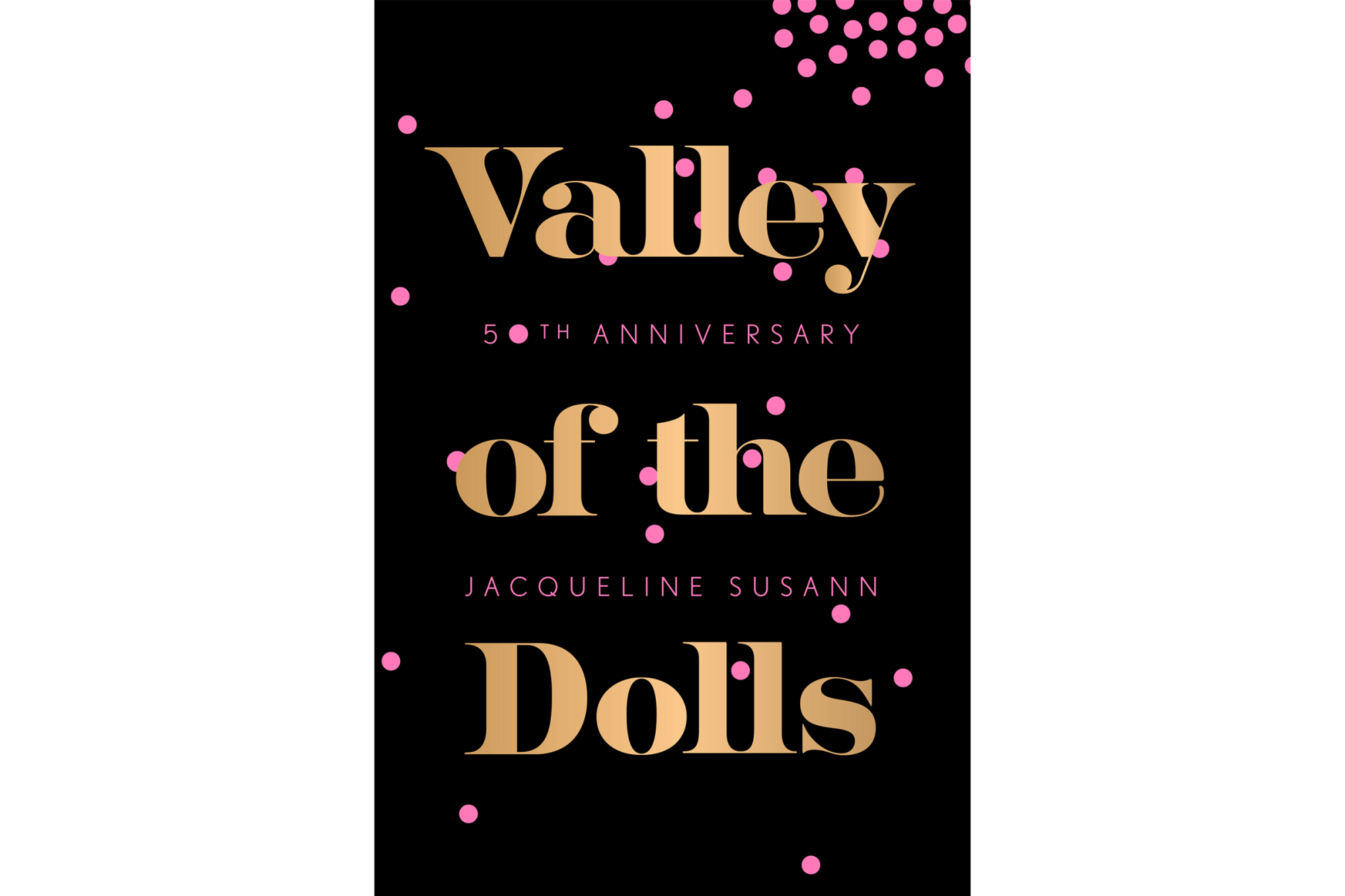
Susann was no great shakes as a model and actor. But when she turned to a typewriter, the entertainment world quivered. “Valley of the Dolls” hit Hollywood like a mile-wide powder puff — everyone paged through her bestseller looking for fingerprints. Could its ruthless and needy singer Neely O’Hara be inspired by Judy Garland? Was Jennifer, the doomed blond, based on Carole Landis or Marilyn Monroe? Was anyone in the industry sober? Like the characters she channeled, Susann was a pill-popper roiling with frustrated ambition, a never-was starlet who’d been close enough to the action to hear the good gossip. (The novel’s interconnected affairs remind us that show business was, and is, a very small clique.) Her witty and tireless self-promotion became the modern template of a celebrity author. Responding to rumors that the book’s tyrannical Broadway star was based on her former friend Ethel Merman, Susann quipped, “We didn’t speak before the book came out. Let’s just say that now we’re not speaking louder.” — Amy Nicholson

From Reverence to Rape: The Treatment of Women in the Movies
(Molly Haskell, 1974)
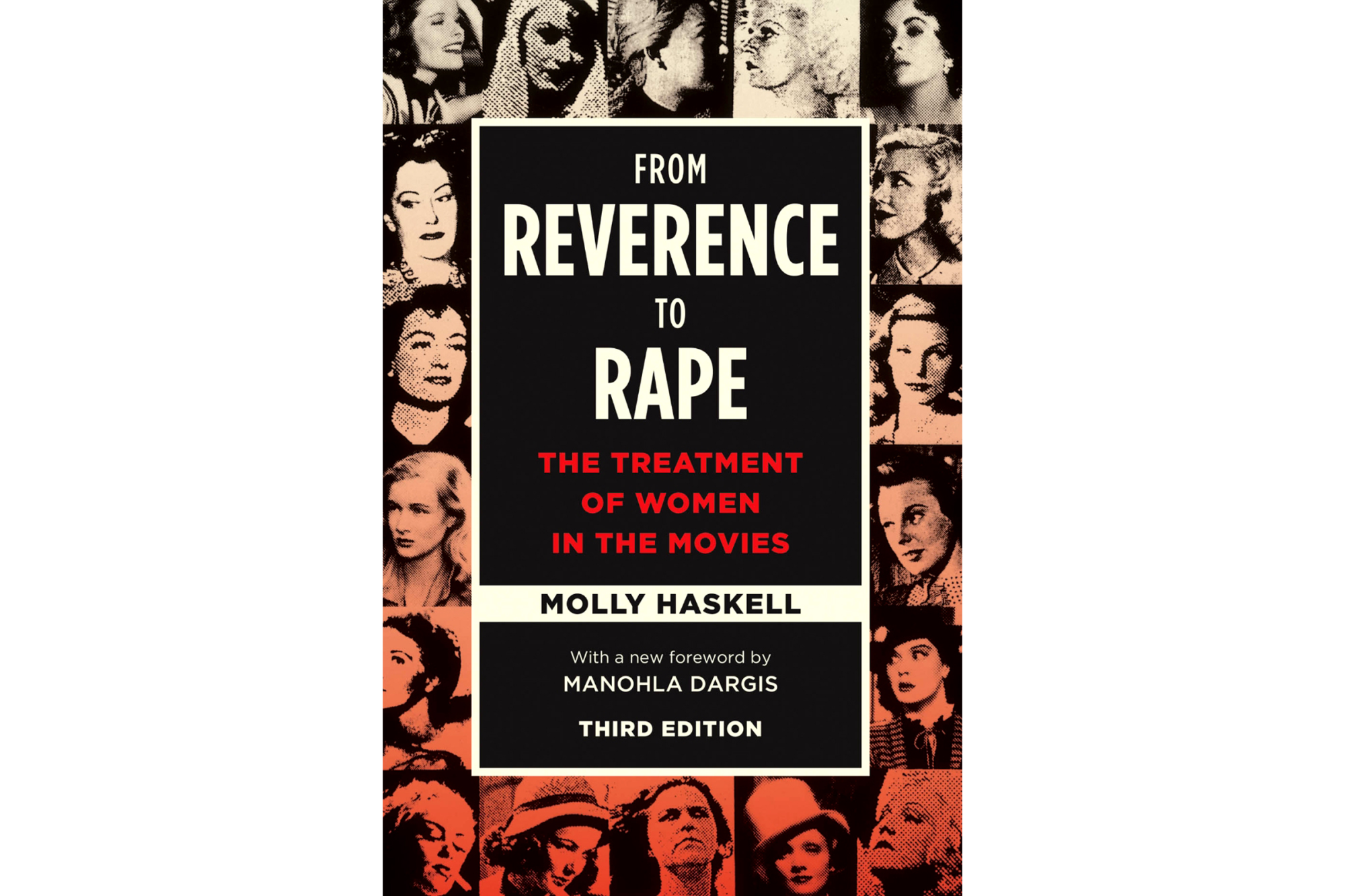
At the time of its publication, Haskell writes in her introduction to the third edition of “From Reverence to Rape,” she “wanted to show how women had in fact been better served by the notoriously tyrannical studio system than they were in the newer, freer, hipper Hollywood of the (then) present. This has since become a truism, but in 1974 it was heresy.” More than any single point she draws about women’s place in the American cinema, though, whether via her discussion of “the woman’s film,” her decade-by-decade history or her comparison to European patterns, it’s Haskell’s refusal to hew to received wisdom that has sustained the book’s relevance for 50 years. Evincing no patience for pat readings or political agendas, Haskell effortlessly underscores the notion that the meaning of movies can’t be plotted on a chart, and no matter where the critical consensus at a given moment lies, her chewing over films from “His Girl Friday” to “Carnal Knowledge” — whether they go down easy or get stuck in her craw — remains timeless. — Brennan

Hollywood Babylon
(Kenneth Anger, 1965)
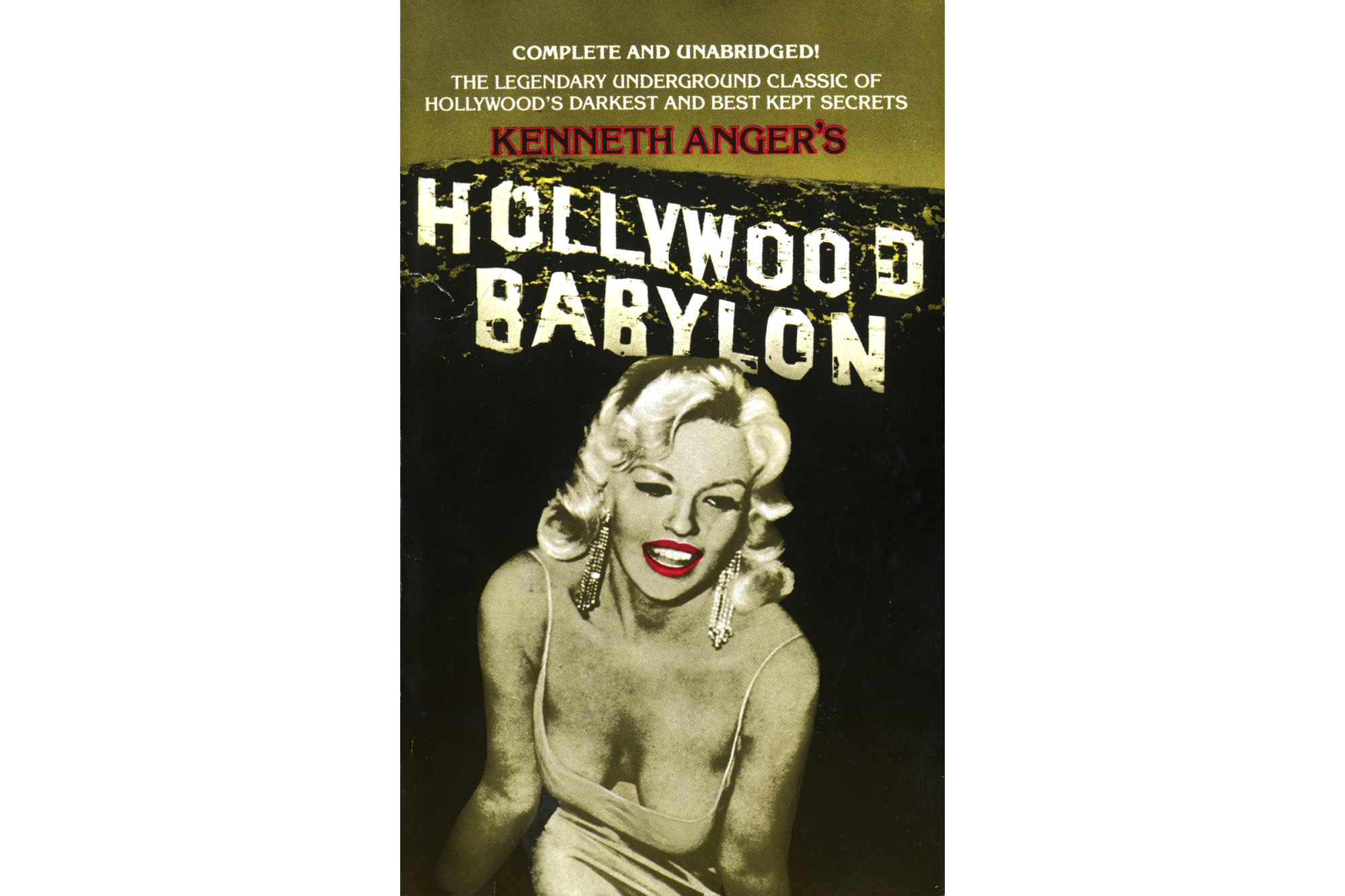
Given the number of inaccuracies, falsehoods and all around debunked stories found in “Hollywood Babylon ,” you’d be forgiven for thinking this salacious collection of scandals has no merit. Then again, the brainchild of one of the most avant-garde queer filmmakers of the 20th century is less interested in facts about show business than in revealing the lurid underbelly that’s long cemented it. Originally published in France in 1959, the book first arrived in the U.S. in 1965, but it was the image-heavy edition printed a decade later that ignited the controversy that follows it to this day. Riddled with off-color anecdotes tackling everything from incest to suicide and featuring marquee stars from the ’20s and ’30s including Fatty Arbuckle, Lupe Velez and Clara Bow, it more than lives up to how the New York Times described it: a “306‐page box of poisoned bonbons.” — Betancourt

The Jaws Log
(Carl Gottlieb, 1975)
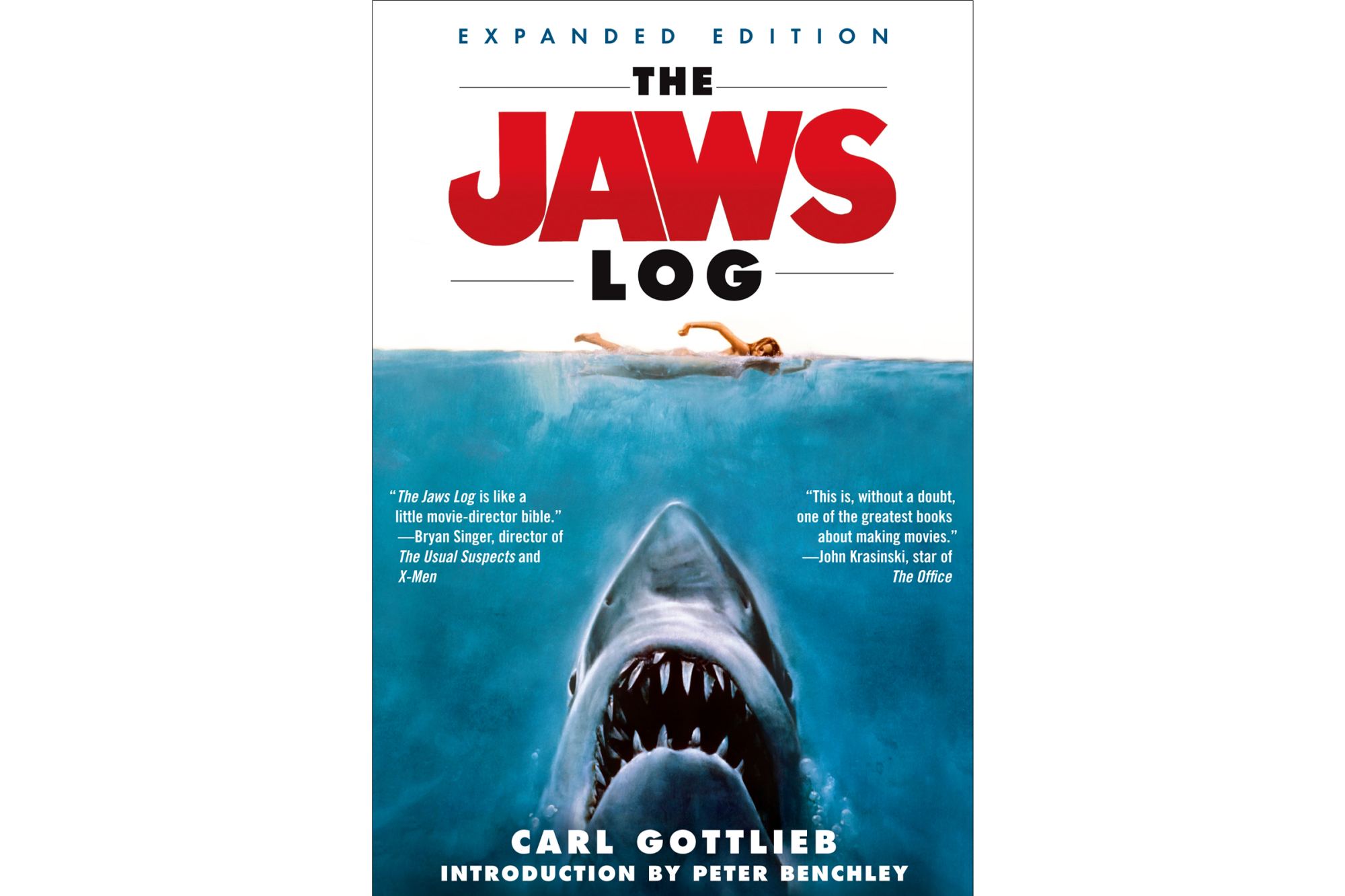
Gottlieb witnessed firsthand the complications that surfaced during the production of “Jaws,” the first summer blockbuster. A friend of the young Steven Spielberg, who was only 28 when he directed the imposing shark story based on Peter Benchley’s novel, Gottlieb first came on board to act in a small role and to work on improving the screenplay. But he ultimately chronicled the young director’s feat as it was unfolding. The meticulously told account provides insight into the problem-solving approach of Spielberg and his collaborators when faced with a myriad of crises. In doing so, the journal illustrates the titanic collective effort making a movie entails and the uncertainty about how the end result will turn out, even when you have the future wunderkind of cinema at the helm. — C A

You’ll Never Eat Lunch in This Town Again
(Julia Phillips, 1991)
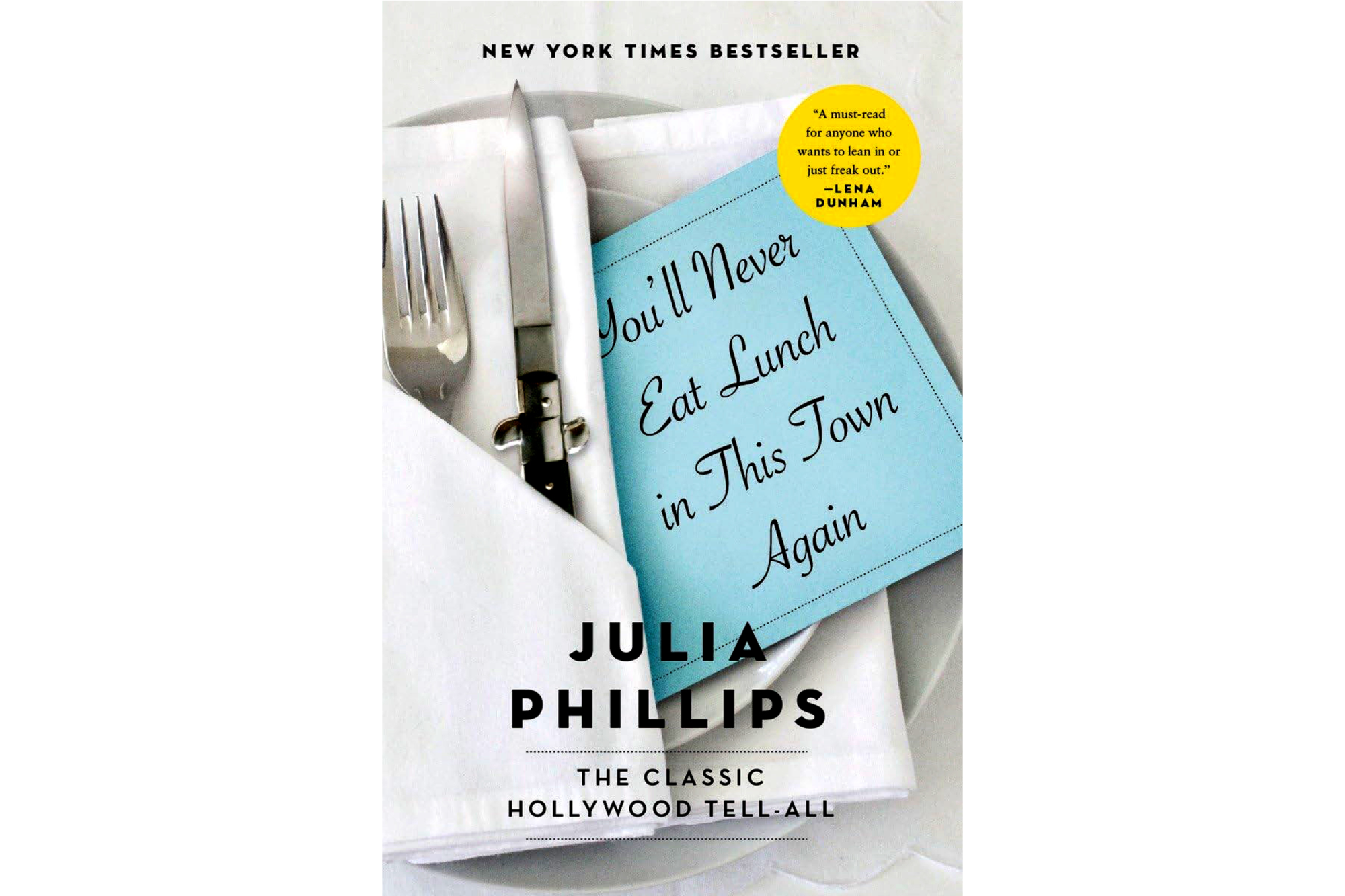
To see Julia Phillips become the first female producer to win a best picture Oscar is to get a glimpse of the charisma and wit that made her so welcome in Hollywood, in boardrooms and on sets, until she wasn’t. At the 1974 Academy Awards, a streaker had interrupted David Niven introducing presenter Elizabeth Taylor, who stumbled over her lines, then announced “The Sting” as the winner. Phillips took the stage with her (not yet ex-) husband, Michael, and their co-producer Tony Bill. Phillips, with a touch of New York accent, said, “You can imagine what a trip this is for a Jewish girl from Great Neck. Tonight I get to win an Academy Award and meet Elizabeth Taylor all in the same moment.” Off-screen, Taylor guffaws. > GO TO STORY

Hollywood’s bravest memoir wasn’t written by a movie star

L.A. Confidential
(James Ellroy, 1990)
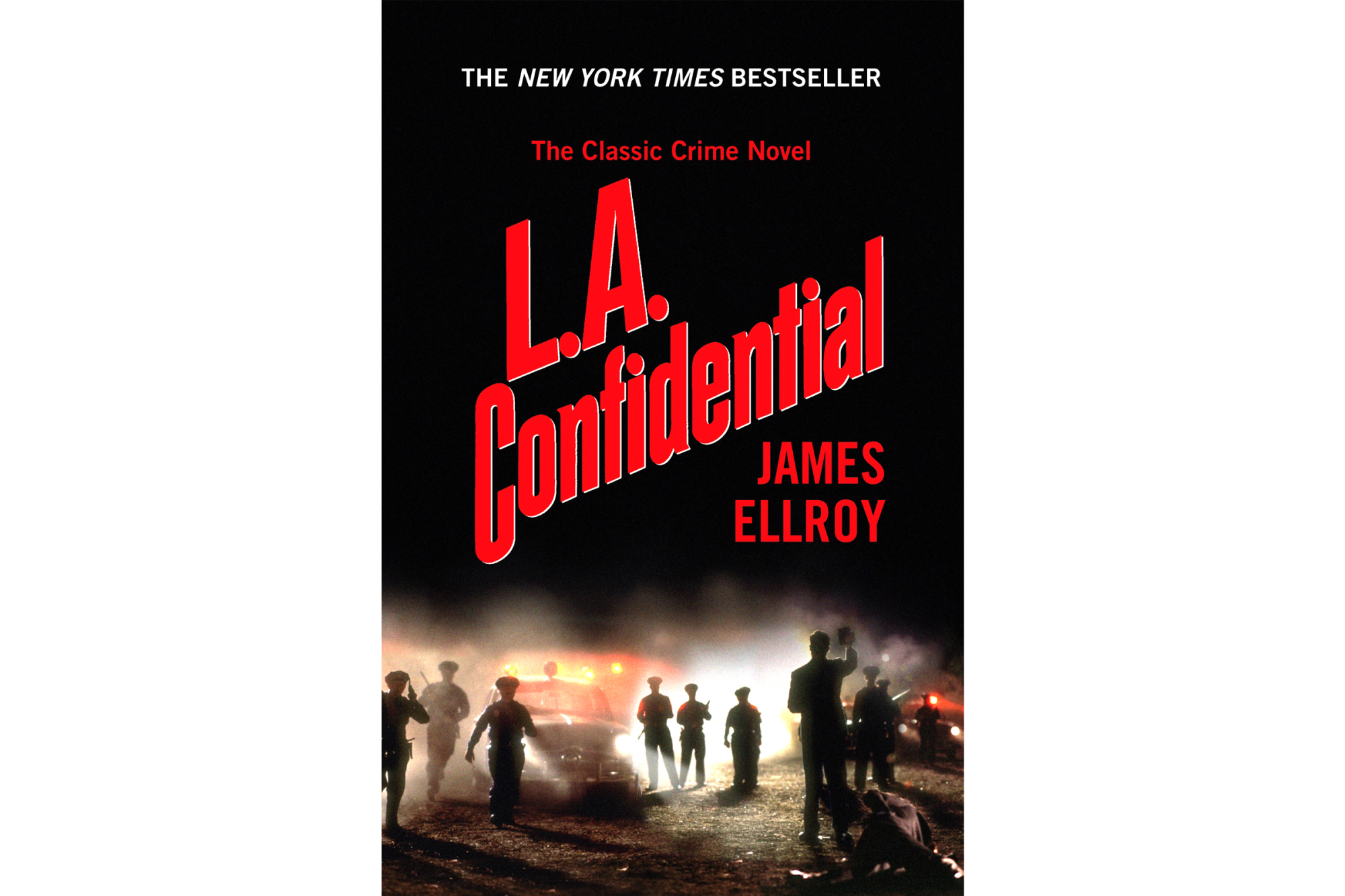
Ellroy’s cynical noir takes such a dark view of Los Angeles that the city is practically a black hole. The gravitational force is, of course, Hollywood and its insatiable need for sex, drugs, money and power (and criminals willing to supply them). Ellroy named names — Mickey Cohen, Johnny Stompanato — and barely disguised others, such as his entertainment tycoon Raymond Dieterling, who wants to build a theme park for his character Moochie Mouse. Most damningly, though, Ellroy describes a Los Angeles Police Department that functions like a movie studio. Here, every officer’s career hinges on their ability to put on a performance. The cops script phony hearings, stash props on perps, rehearse their threatening zingers, stage massacres that make them look like heroes and dress up for flashy narcotics busts in blue blazers that bring out their eyes. To Ellroy, the LAPD doesn’t want to protect and serve — it just wants applause. — A N

The Celluloid Closet: Homosexuality in the Movies
(Vito Russo, 1981)
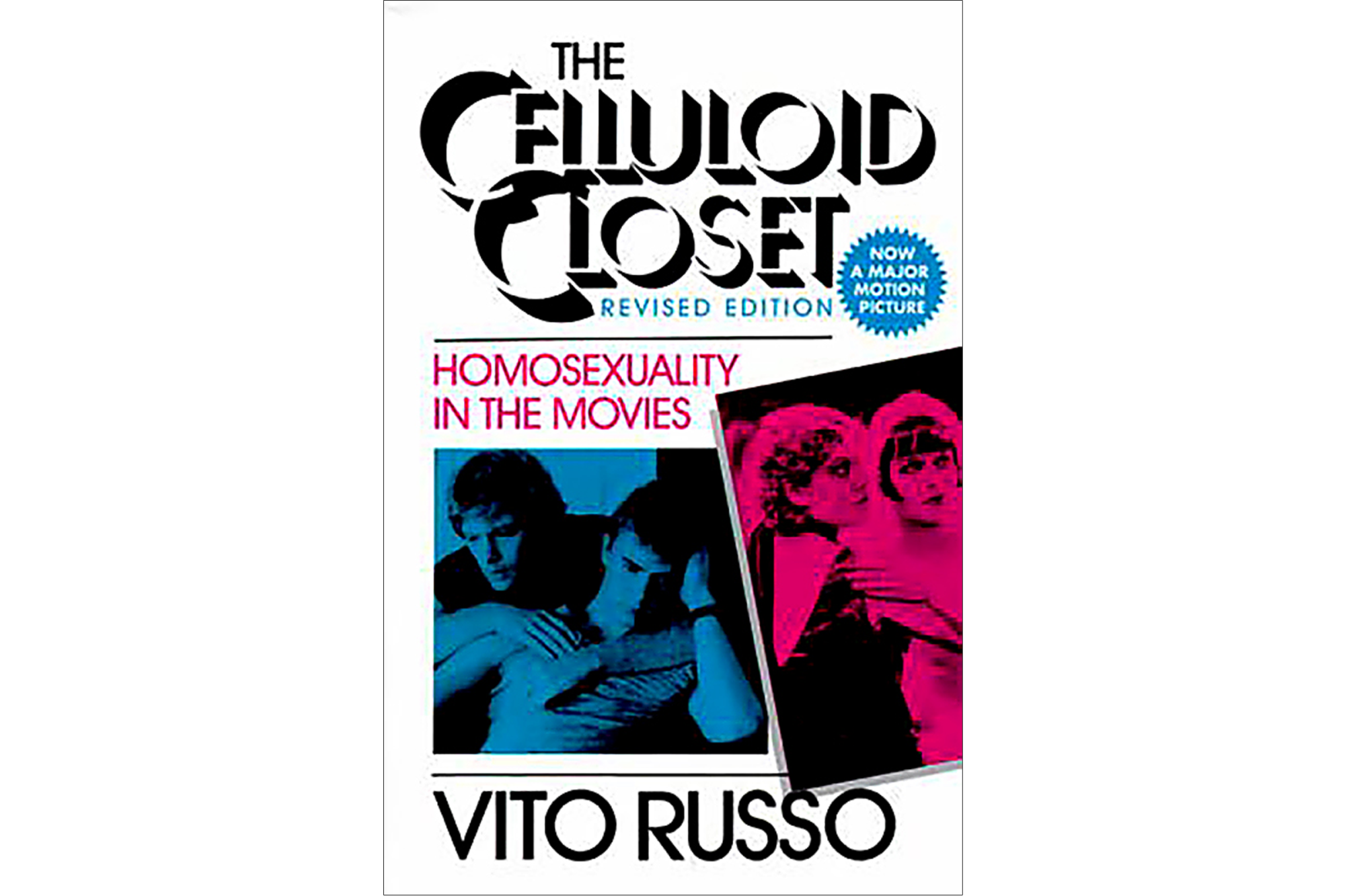
First published in 1981, “The Celluloid Closet” was the culmination of decades’ worth of work by film historian and LGBTQ activist Russo. Initially designed as a live lecture with clips from classic films that showed queer-coded characters, cruel homophobic stereotypes and everything in between, Russo’s ambitious tome chronicled the many ways Hollywood had depicted gays and lesbians on the big screen. With sections such as “Who’s a Sissy? Homosexuality According to Tinseltown” and “Struggle: Fear and Loathing in Gay Hollywood,” Russo’s encyclopedic study was a groundbreaking intervention into discussions of visibility and representation that are nowadays shepherded by the likes of GLAAD, the very organization Russo founded. The influential nonfiction book would go on to be reissued in 1987 with more contemporary additions and in 1996 was adapted into a Peabody Award-winning documentary by the same name, narrated by Lily Tomlin. — Betancourt

Lulu in Hollywood
(Louise Brooks, 1982)
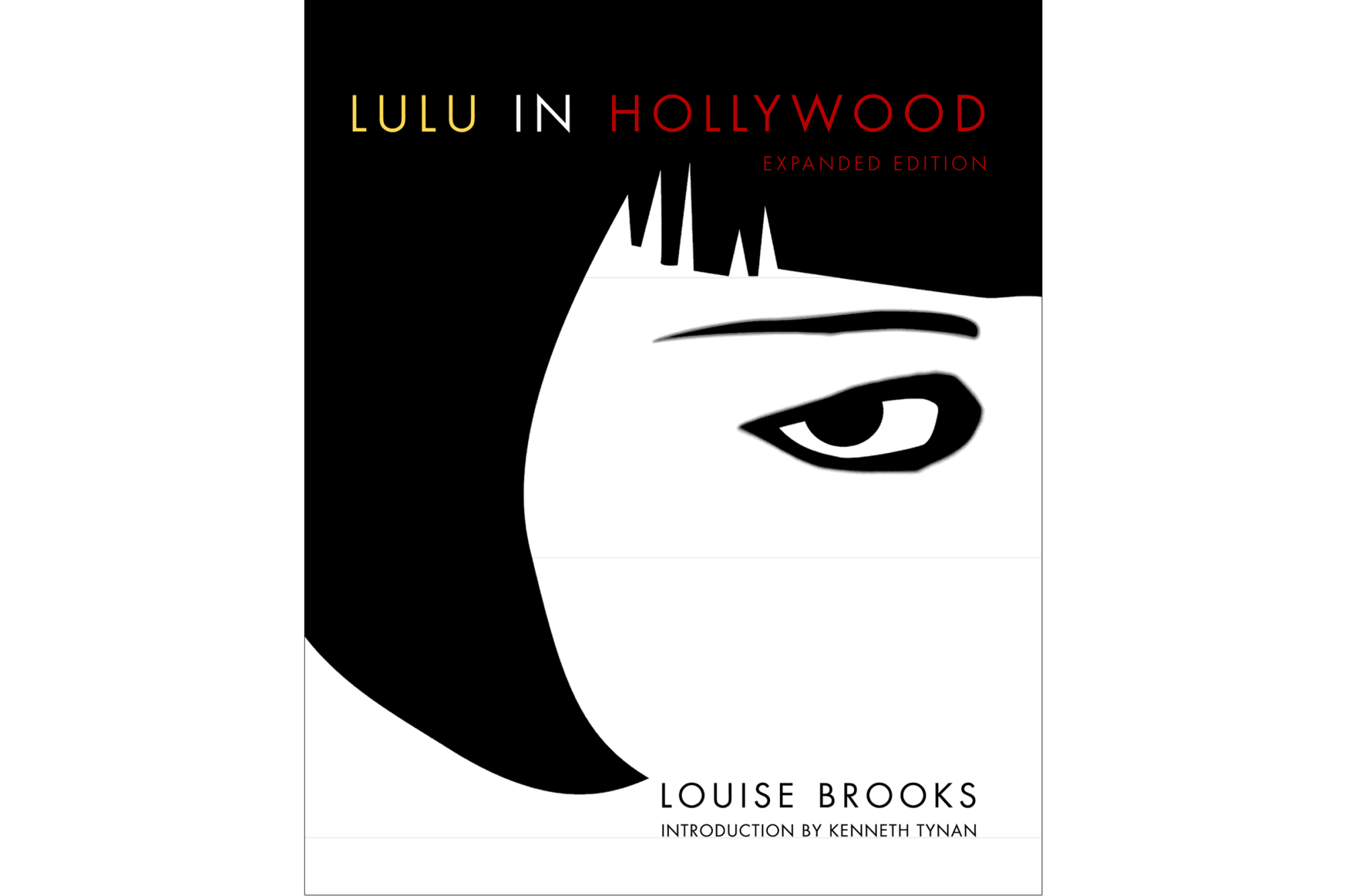
Brooks was best known for G.W. Pabst’s 1929 drama “Pandora’s Box,” in which her Lulu, a ferocious flapper with a pageboy haircut, seduced and abandoned all men who dared stand in her path. But she was also an astute observer of show business customs and personalities, and, as it turned out, a very good writer. This collection of personal essays covers subjects ranging from her time working with director William “Wild Bill” Wellman on “Beggars of Life” to her friendship with Humphrey Bogart, of whom she writes: “Humphrey Bogart spent the last twenty-one years of his life laboriously converting the established character of a middle-aged man from that of a conventional, well-bred theater actor named Humphrey to one that complemented his film roles — a rebellious tough known as Bogey.” Brooks was very wise to the ways of image; she also deftly transcended her own. — C V

The Conversations: Walter Murch and the Art of Editing Film
(Michael Ondaatje, 2002)
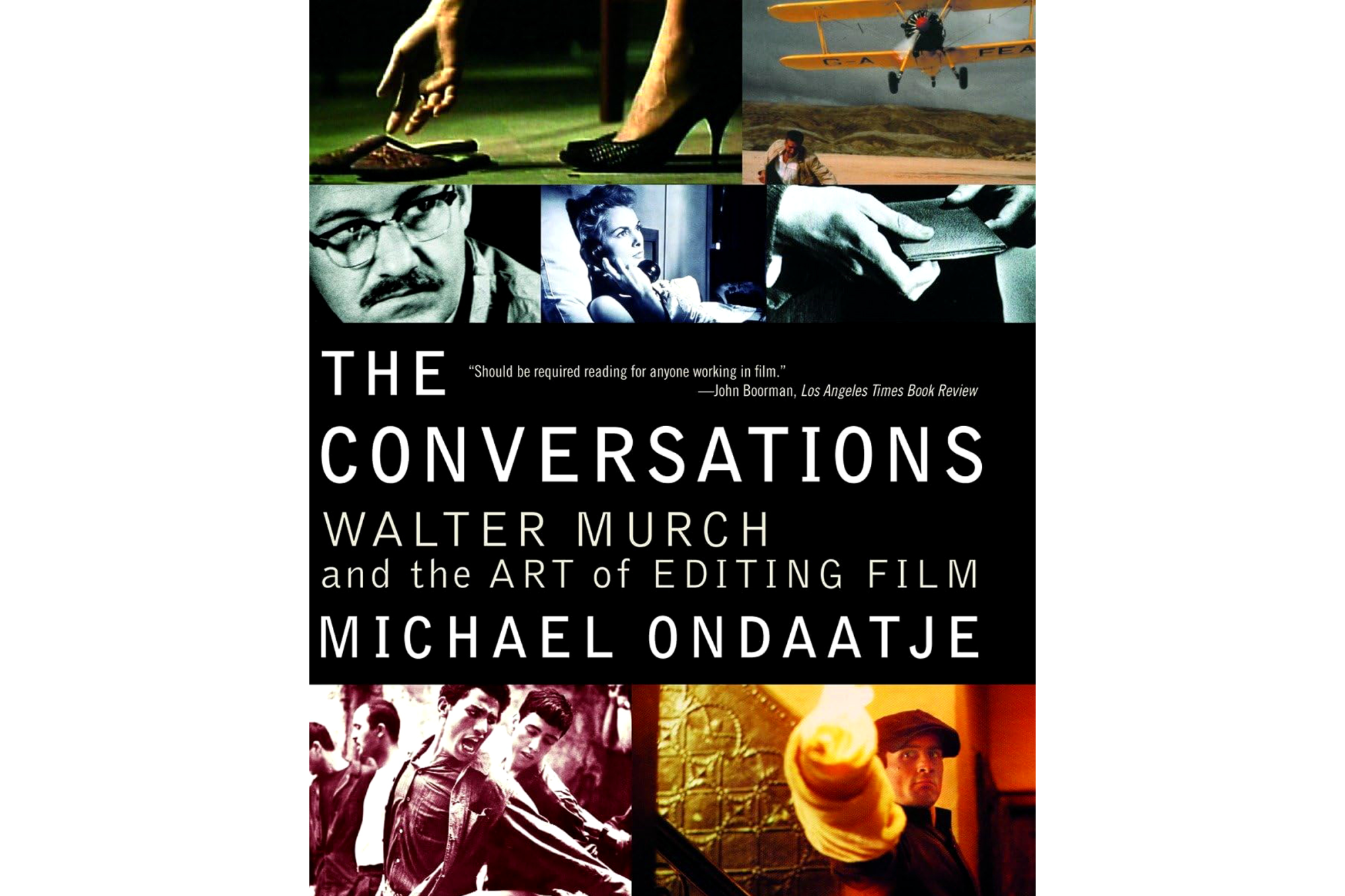
One of the editors on bona fide classics such as Francis Ford Coppola’s “Apocalypse Now” and “The Conversation,” three-time Oscar-winner Murch holds a well of hard-earned knowledge about the mechanics of visual storytelling. A portion of that narrative wisdom is contained within the pages of this collection of rich exchanges with lauded novelist Ondaatje. (The pair met during the making of Anthony Minghella’s “The English Patient,” a film adapted from Ondaatje’s book and edited by Murch.) The intellectual wealth of these chats goes beyond film editing — an often-misunderstood craft that is absolutely essential to how we perceive cinema — and extends to the overall history of the medium in the last third of the 20th century. — C A

Money: A Suicide Note
(Martin Amis, 1984)
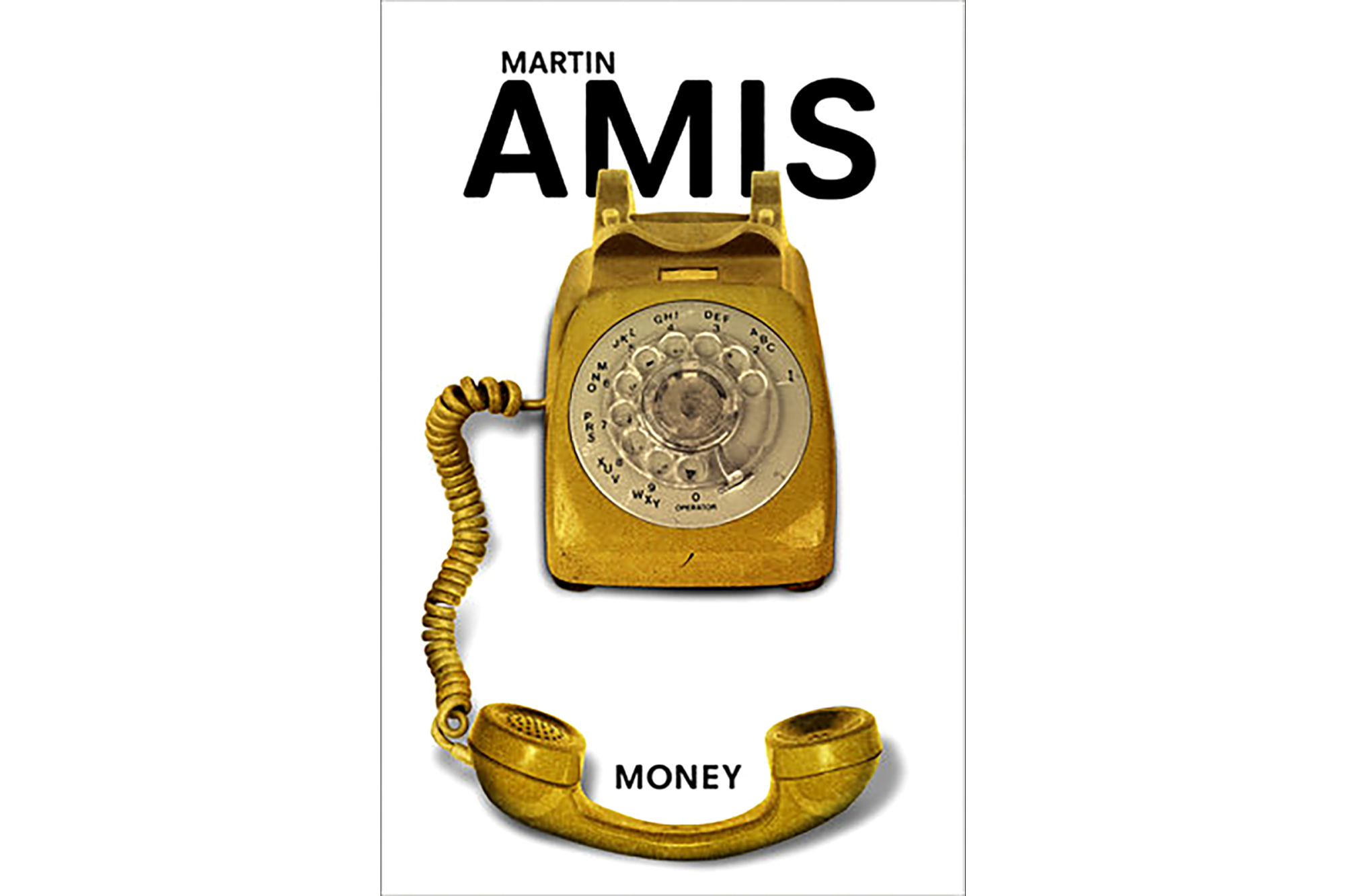
In the late 1970s, Amis wrote the screenplay for an unremarkable science-fiction film, “Saturn 3.” On the evidence of this savage industry satire, the experience was souring, dehumanizing and debauching. John Self, the novel’s narrator, is a hard-drinking director traveling between New York and London to steer a film titled “Good Money,” and his observations are rich with fine-grain detail about the celebrities and agents essential to the movie business. But it’s as much a story about the movie business’ relentless damage to the psyche, as John is sunk in porn and prostitutes and drink, swallowed up not just by his success but his lust for it. “The artists in my story are bull artists, con artists, drink artists,” Amis told an interviewer about “Money.” But not good artists, morally or cinematically. — M A

Third Girl From the Left
(Martha Southgate, 2005)
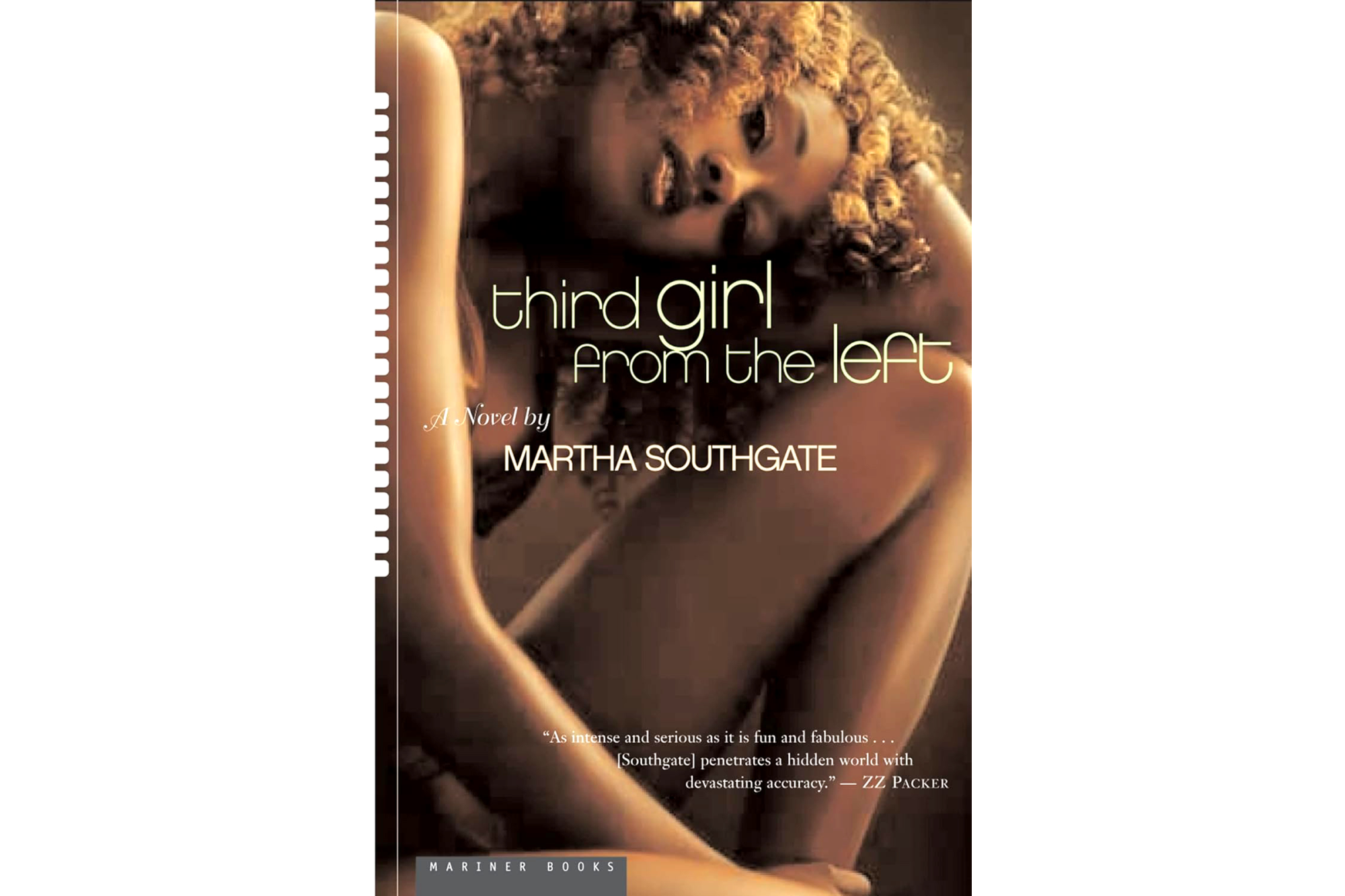
Hollywood always seemed a mythical place where average folks could make the wildest of their dreams come true. But once you’ve been around a while, you come to see the tarnish on Tinseltown’s tinsel. The Black women in “Third Girl From the Left” want to be movie stars or movie makers, but they arrive in a Hollywood that’s not ready to love them back. A family story that gets its shine from the lure of movie magic and our shared fantasy about the healing powers of stardom, Southgate’s novel never shies away from the hard truths of dream-chasing, yet still believes “in the power of movies and the people in them to change a life.”
— LAURA WARRELL, author of “Sweet, Soft, Plenty Rhythm”

Beautiful Ruins
(Jess Walter, 2012)
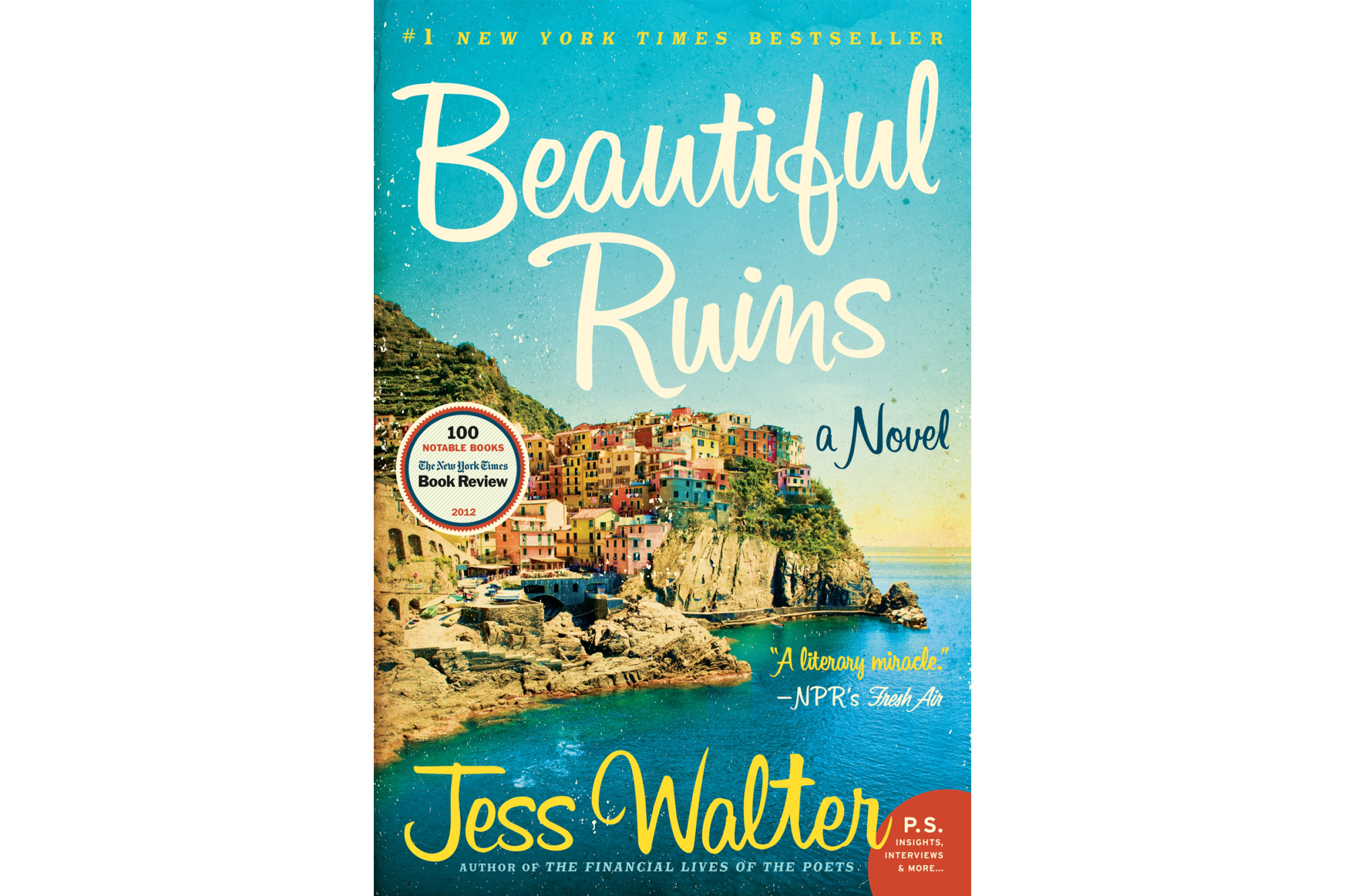
“I’ve been simultaneously drawn to and repelled from Hollywood for years,” Walter told The Times in 2012 . Both sentiments feed into this novel, which begins when a beautiful actor, banished from the set of “Cleopatra” where Elizabeth Taylor and Richard Burton are indulging in gorgeous excess, lands at a small hotel on the Italian coast. The hotelier is smitten. Jump ahead five decades to reality television in Hollywood, where the assistant to an on-his-way-down producer has to listen to terrible pitches. The novel jumps around temporally and includes an unfinished manuscript and an awful memoir, but these disparate threads tie together in a delightful resolution. “Hollywood is like a giant mirror, I think,” Walter said, “and I used it that way in the book, reflecting characters back to themselves.” — C K

Eve’s Hollywood
(Eve Babitz, 1974)
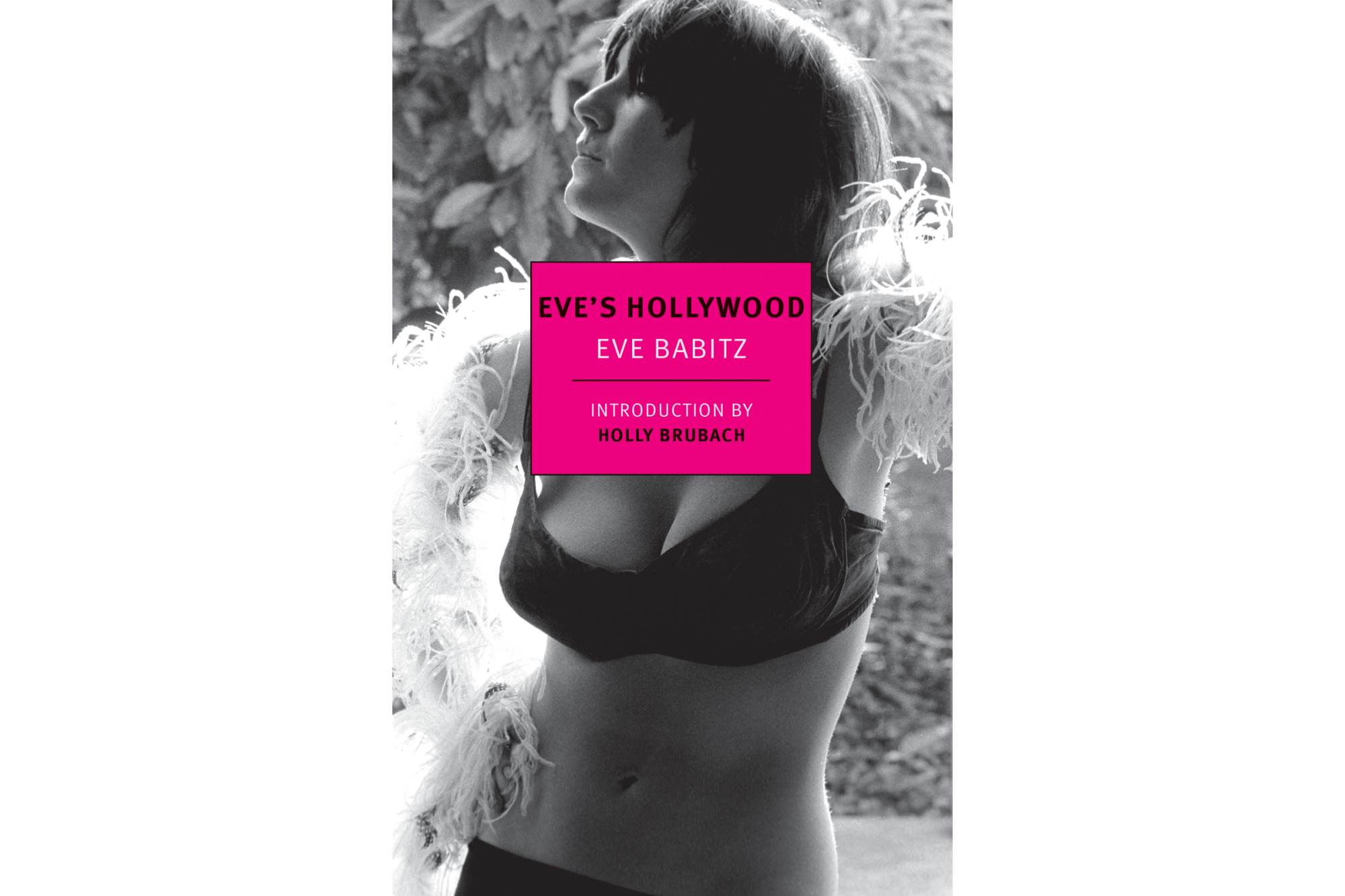
Few have loved this city as ferociously as Babitz, a brilliant chronicler of Hollywood’s fantasies, foibles and beautiful freaks. Babitz, who died in 2021 , grew up here knowing everyone. Her godfather was famed composer Igor Stravinsky; her high-school gym locker was next to that of a girl who later joined the Manson Family. Babitz’s gleefully debaucherous memoir captures her teen years as a glamour-mad adventuress pinballing around a town full of kooks. At once skeptical and star-struck, she writes passionately about celebrity, superficiality and excess and justifies her decision to graduate early in just two words: Marlon Brando. Celebrities adored Babitz right back, but luckily for us, she chose to be an author, not an actor. “I never had the necessary ability to suspend my own disbelief,” she shrugs. Besides, Babitz knew the juiciest drama plays out off-screen. — A N

The Big Sleep
(Raymond Chandler, 1939)
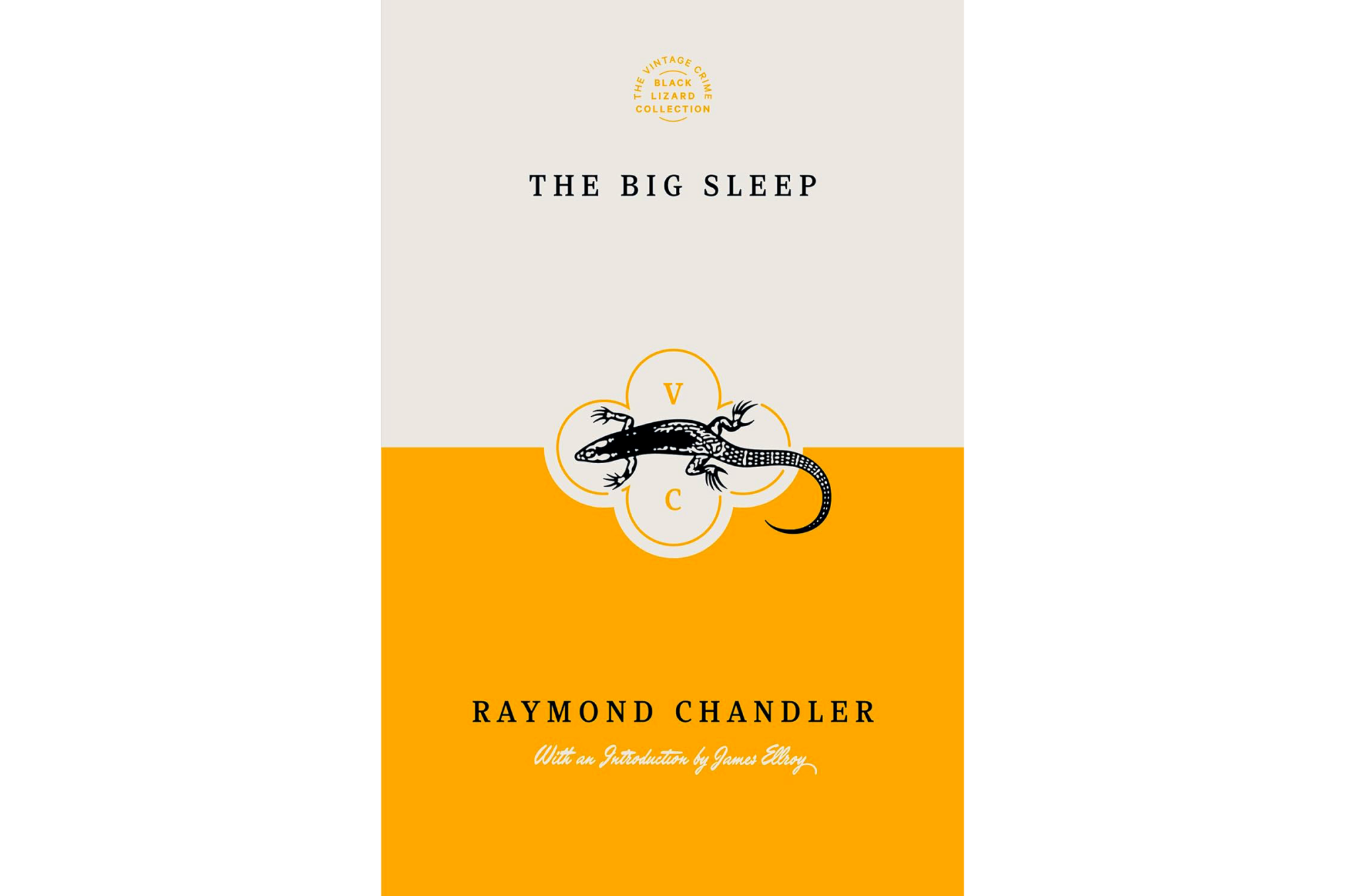
To Chandler, one of the godfathers of the hard-boiled crime novel, Hollywood generally came down to blackmail and sleaze. (To be fair, to Chandler, much of the world came down to blackmail and sleaze). “The Big Sleep,” the first of Chandler’s seven Philip Marlowe novels, finds the private dick investigating a pornography ring in a story that finds murders and double-crosses piling up at a dizzying rate. An honorable old man hires Marlowe to extricate his younger daughter from a series of blackmailers; meanwhile, the detective falls for his client’s older daughter. Gleefully homophobic and brutal, adapted into an indelible 1946 Howard Hawks movie starring Humphrey Bogart and Lauren Bacall, the novel set the stage for “The Little Sister” (1949), in which Marlowe investigates a blackmail scheme targeting a Hollywood starlet. By then Chandler had done time as a screenwriter and didn’t care for the industry; he got his revenge on the page. — C V

West of Eden: An American Place
(Jean Stein, 2016)
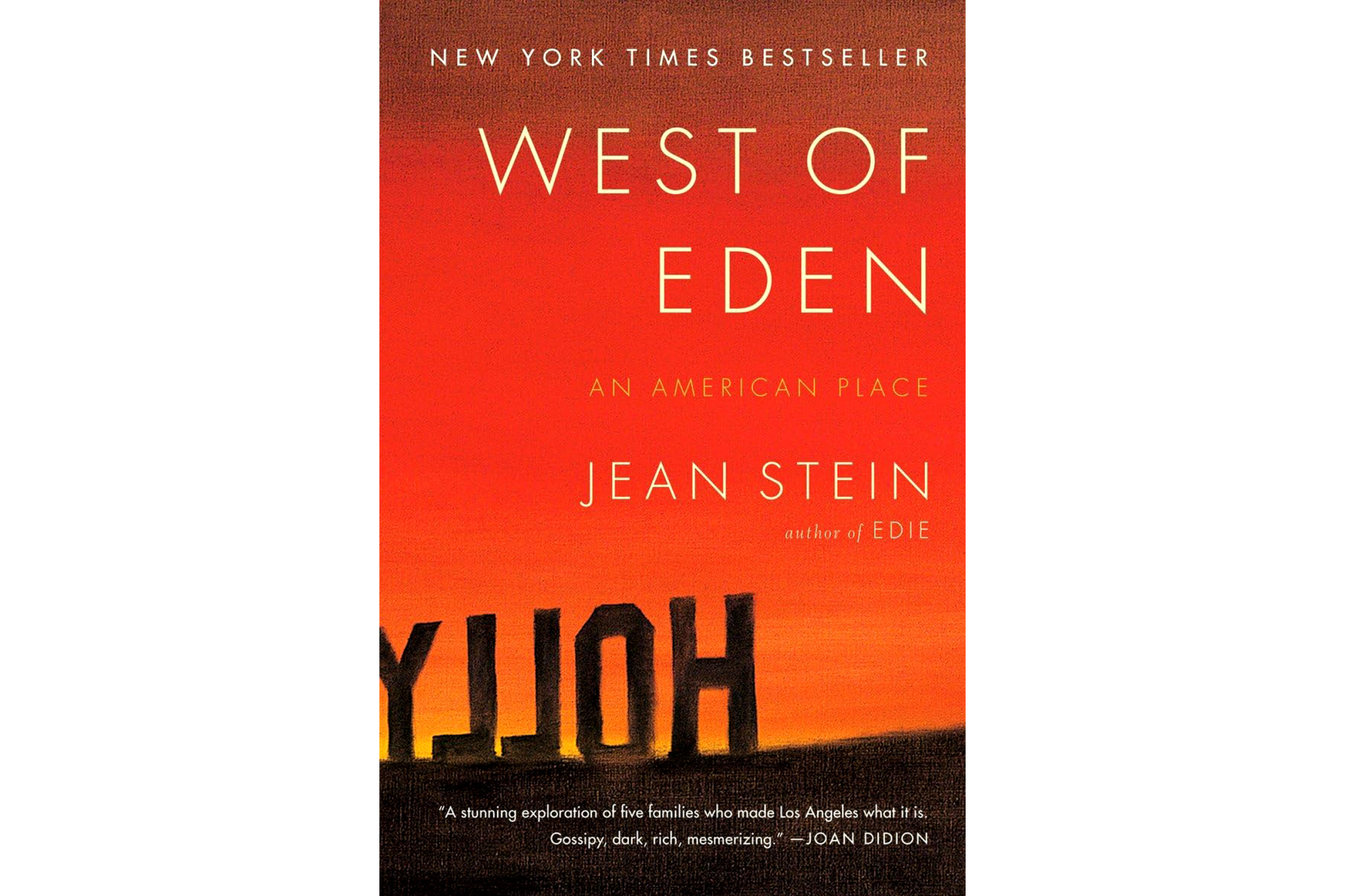
The title of Stein’s oral history of the muddled, murky origins of Los Angeles as we know it gestures at an off-kilter narrative of biblical proportions. Here is Hollywood laid bare as a fabled “American Place” that’s not so much an Edenic garden as something darker and dirtier, though not for that any less sinful. Stein focuses on families and individuals who forged this West Coast city into what it is today. Oil tycoon Edward L. Doheny, movie mogul Jack Warner, actor Jennifer Jones, heiress Jane Garland and MCA founder Jules C. Stein (the author’s father) anchor startling as-told tales about a city built on ruthless individuals whose bloodied legacies live on still. The Times best summed up its appeal : “It’s like being at an insider’s cocktail party where the most delicious gossip about the rich and powerful is being dished by smart people.” — Betancourt

(Percival Everett, 2001)
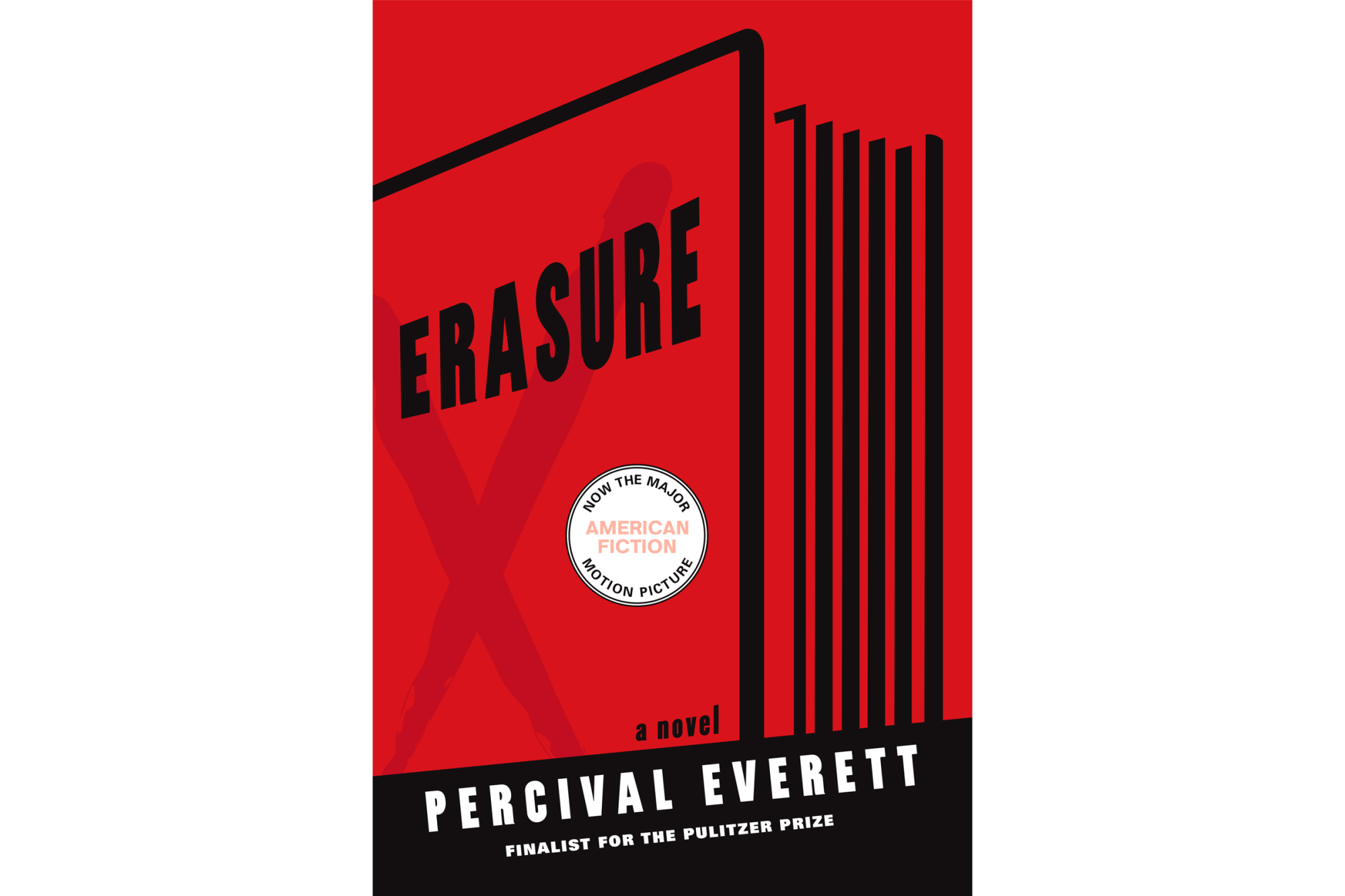
“When I grew up, there were three black people on TV, and they were all porters,” author Everett once groaned. His exasperation with stereotypes fuels this flashpoint novel about a Black academic named Monk who invents an ex-felon persona to sell books. “Erasure” is aimed at literary gatekeepers, but Everett takes a shot at Hollywood, too, with his inclusion of a bearish, cigar-smoking movie producer who barges into the story alongside a giggling silicone blond. (The bore jokes that he should have met Monk at Popeye’s Fried Chicken.) When filmmaker Cord Jefferson reworked “Erasure” into his Oscar-winning screenplay, “American Fiction,” he updated the producer character into a vapid dweeb who thinks he’s speaking woke. The tweak emphasized the baby steps the industry has made since 2001 — and the miles left to go. Now who’s going to film “James,” Everett’s bold new adaptation of “Huckleberry Finn”? — AN

(John Gregory Dunne, 1969)
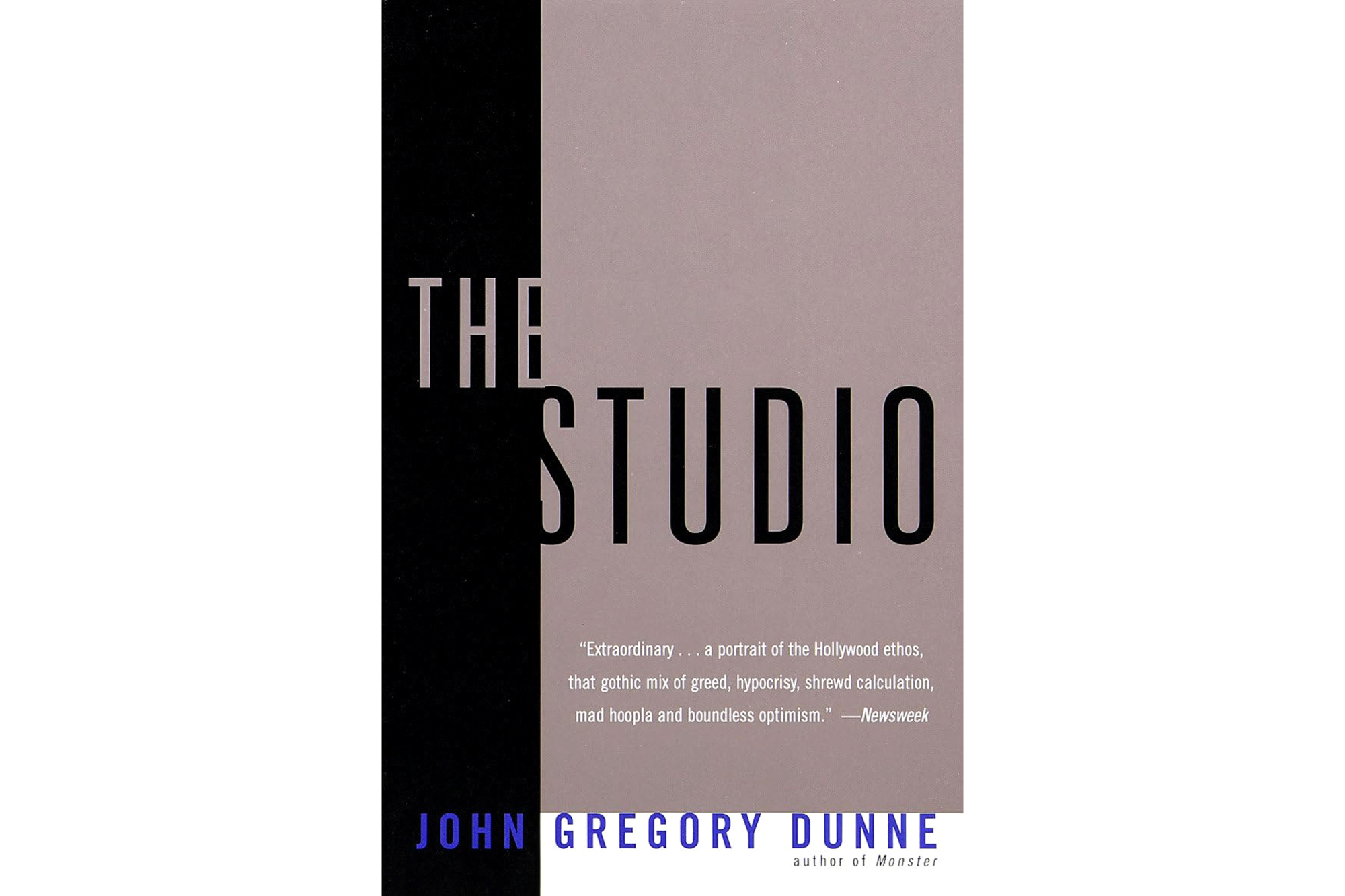
Dunne was dumbfounded when Twentieth Century Fox head Richard Zanuck gave him full access to cover the studio over the course of a year that included production of movies including “Dr. Dolittle,” “Planet of the Apes” and “The Boston Strangler.” But he knew just what to do with the gift. Sitting in on marketing and production meetings, hanging out in the commissary, watching dailies, Dunne captured the small moments that add up to a big picture of ego run amok in a sort of hinge era for the industry, when audiences were getting younger and edgier and studios still weren’t sure how to respond (see “Dr. Dolittle.” Or better yet, don’t). Here’s Zanuck, watching “Apes” footage, responding to criticism in the room that a blood transfusion is depicted incorrectly: “What the hell. Maybe that’s how an ape does it.” Indeed. As Dunne writes in his foreword, “If I got the access, I knew I had the book.” — C V

Final Cut: Art, Money and Ego in the Making of Heaven’s Gate, the Film That Sunk United Artists
(Steven Bach, 1985)
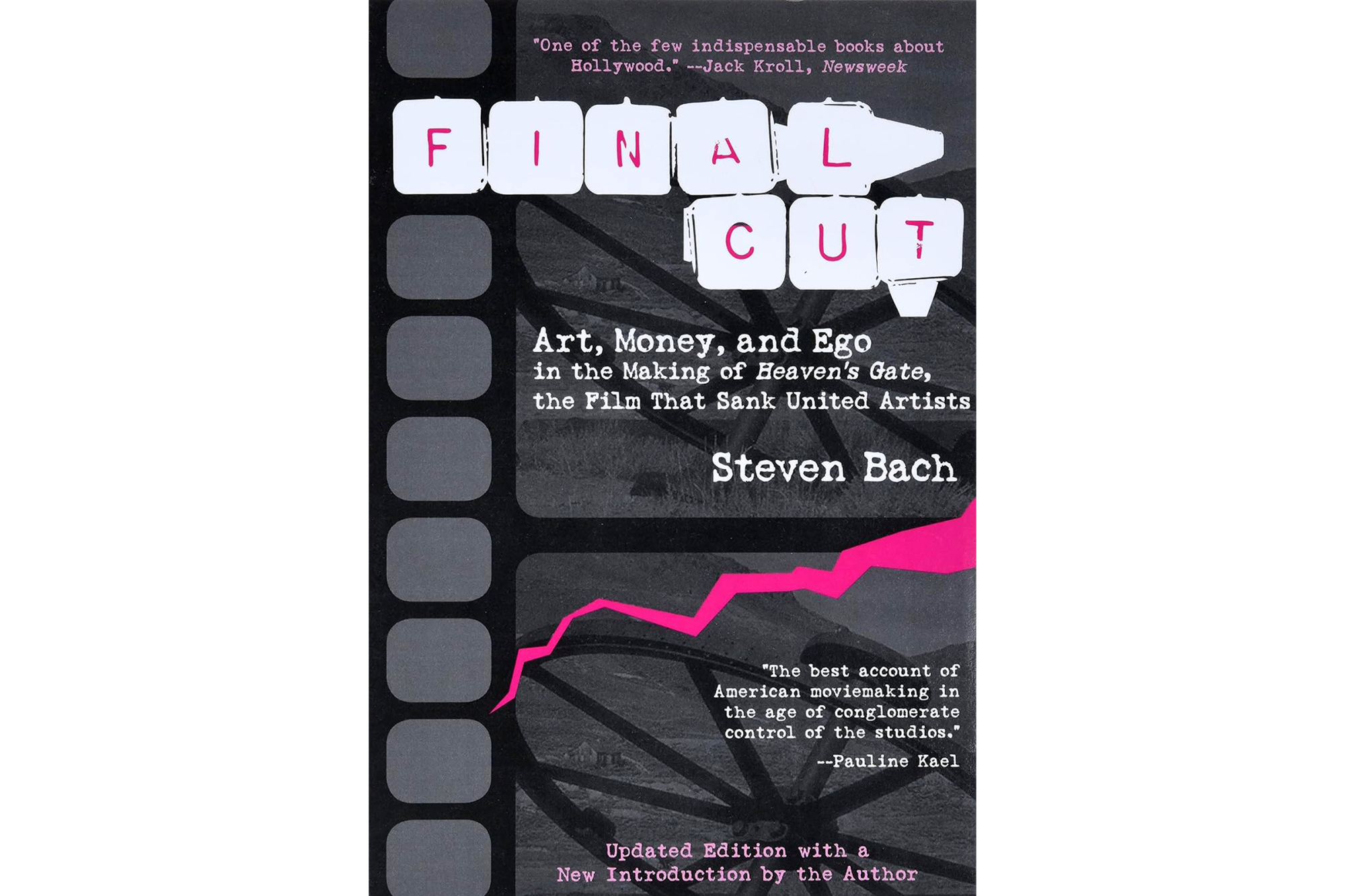
When Steven Bach’s “Final Cut” appeared in 1985, it was mainly sold as Hollywood dish. Bach, the former head of production at United Artists, had delivered the inside story of “Heaven’s Gate,” a 1980 epic western by Michael Cimino that was budgeted at about $11.5 million, wound up costing around four times that, and prompted the hobbled studio’s sale to MGM. Here at last were the details of Cimino’s outsize ego and UA’s futile attempts to restrain it. > GO TO STORY
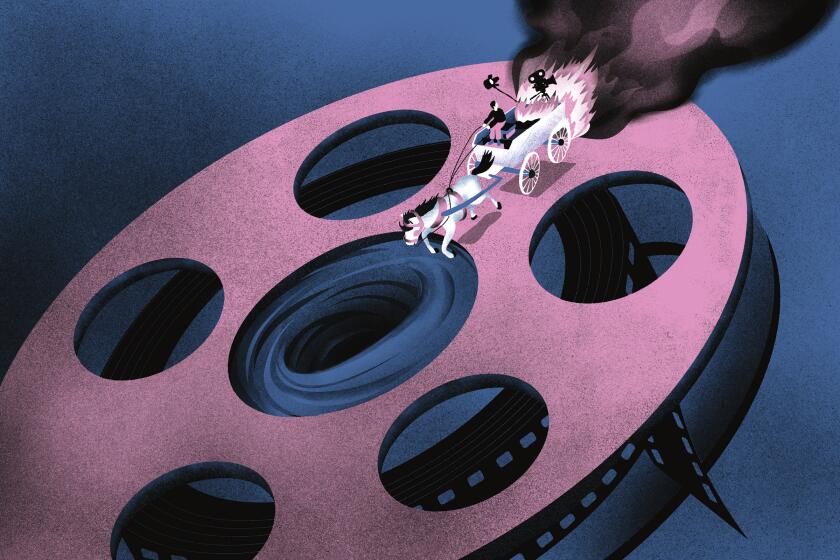
The story of flop ‘Heaven’s Gate’ is a cautionary tale

The Classical Hollywood Cinema: Film Style and Mode of Production to 1960
(David Bordwell, Janet Staiger and Kristin Thompson, 1985)
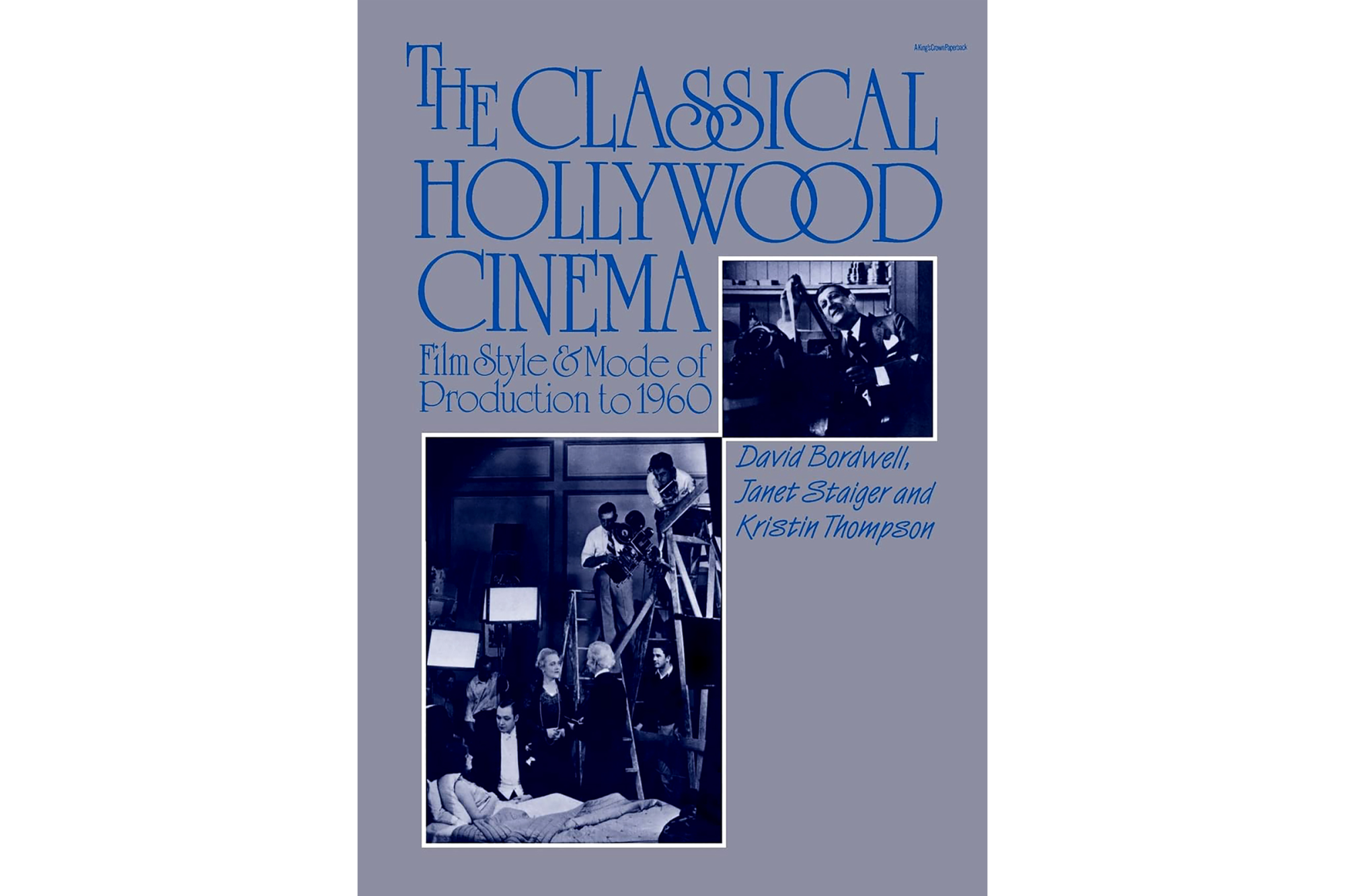
When renowned scholar Bordwell died earlier this year at 76, current and former film students the world over shared images of his introductory textbook “Film Art,” whose changing cover illustration helped distinguish one generation of cinephiles from another as surely as the release of “The Graduate” or “sex, lies, and videotape.” But for my money, his most indispensable contribution to our understanding of the medium, co-written with Thompson and Staiger, is this magisterial survey, illustrated with frames from “King Kong” (1933), “The Magnificent Ambersons” (1942) and “Carmen Jones” (1954), among countless others. In it, the authors not only explain the rise of the studio system, trace the emergence of sound and color, and explore the evolution of film exhibition from cramped nickelodeons to imposing movie palaces. They also argue, convincingly and definitively, that the political economy of Hollywood moviemaking is inextricable from the style and content of Hollywood movies — and thereby reveal the scaffolding underneath the greatest meeting of art and business the world has ever known. — Brennan

The Devil’s Candy
(Julie Salamon, 1991)

First subtitled “The Bonfire of the Vanities Goes to Hollywood,” this book is an inside look at the making of a single film, based on Tom Wolfe’s bestselling novel. The step-by-step chronicle, however, has proved more enduring than the original text; later editions are subtitled “The Anatomy of a Hollywood Fiasco.” Salamon, a Wall Street Journal film critic, had been looking for a director who would allow her full access to the making of a film, and Brian De Palma suggested “Bonfire,” no constraints. She gets a kaleidoscopic view of the filmmaking process, speaking to the second-unit director, editor, producers, stars, people standing on set. Nobody wanted to make a flop. But what started out as a satire of ’80s greed and extravagance, with a budget that swelled to nearly $50 million, became a cautionary tale instead. Salamon’s narrative is clear-eyed and delicious. — C K

Postcards From the Edge
(Carrie Fisher, 1987)
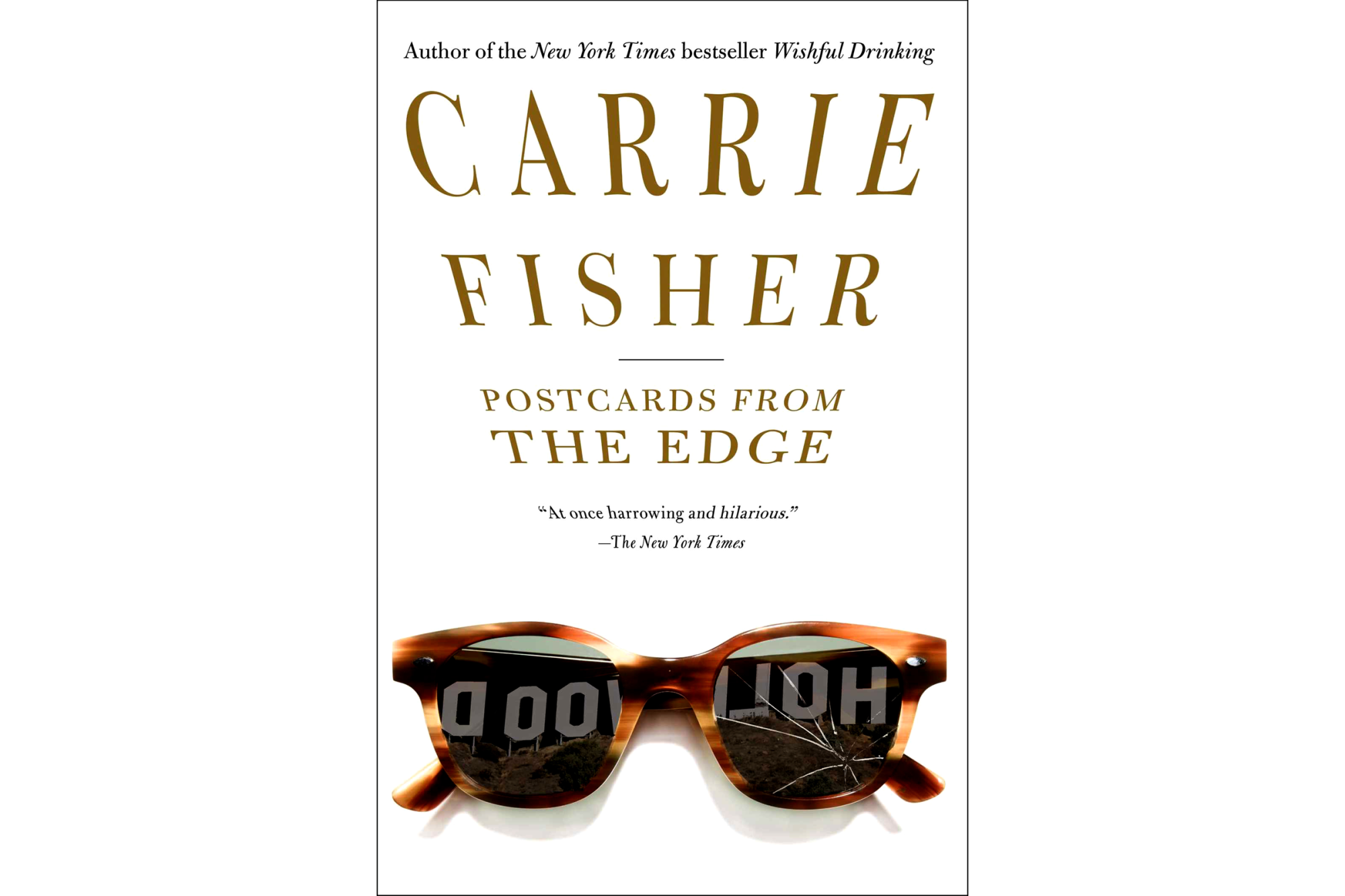
“Maybe I shouldn’t have given the guy who pumped my stomach my phone number, but who cares?” There is no more quotable novel about Hollywood than Carrie Fisher’s roman à clef, “Postcards From the Edge.” Fisher’s sentences bristle with caustic, self-effacing humor. Outside of her forays into that galaxy far, far away, that brand of sharp deadpan comedy is perhaps what the former Princess Leia would become best known for. And in her debut novel , the actress-turned-writer makes great use of her enviable way with words. > GO TO STORY

Carrie Fisher debut novel ‘Postcards From the Edge’

What Makes Sammy Run?
(Budd Schulberg, 1941)
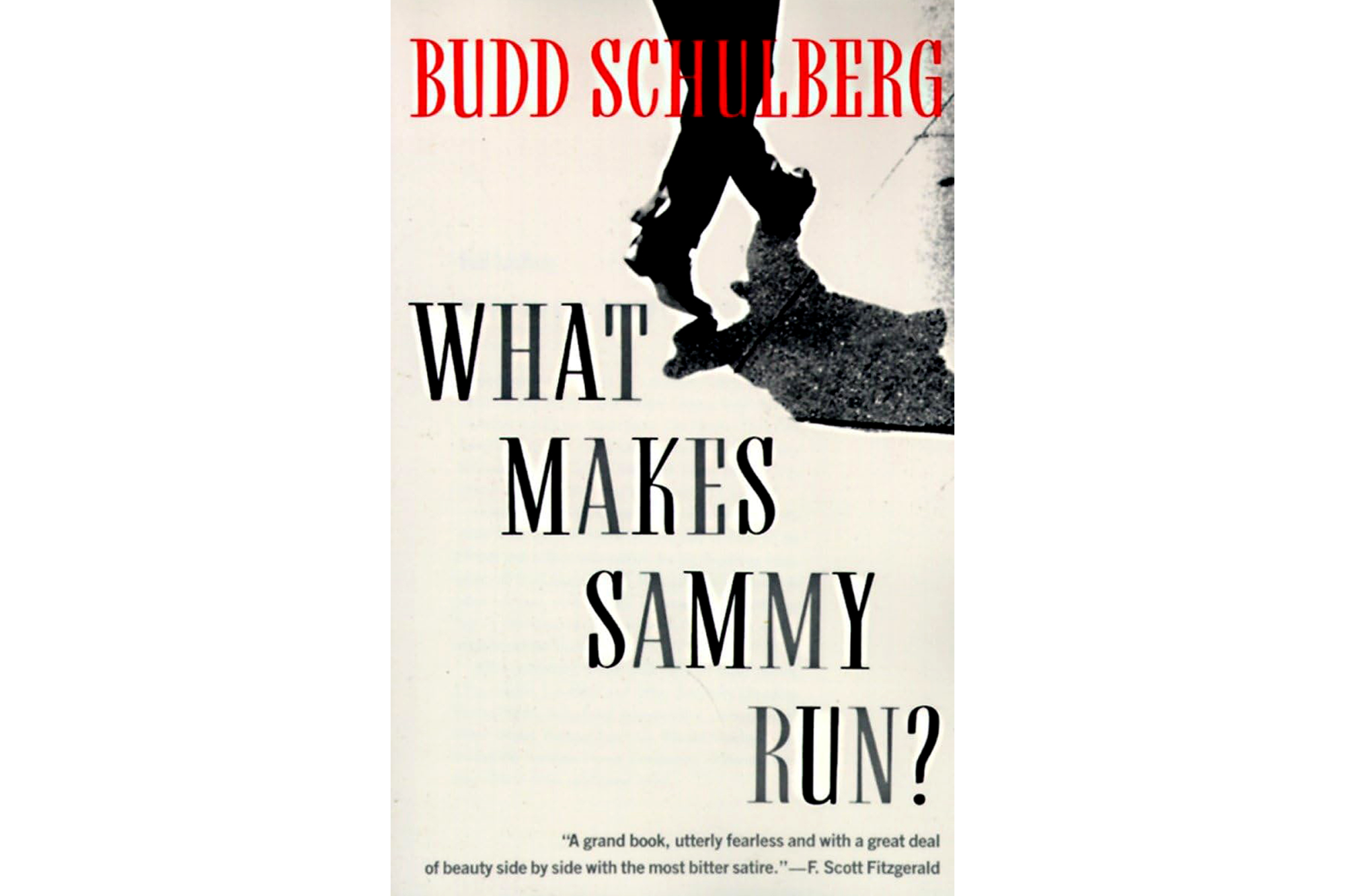
Much of the Hollywood that Schulberg imagined in this 1941 classic doesn’t exist anymore — gone are the studio structure and the contract screenwriters, not to mention much of the casual bigotry. But amoral striving? Talentless hacks somehow reaching the top of the heap? That stuff is deathless, and in Sammy Glick, Schulberg invented one of the most enduring craven strivers in American literature. Starting as a copy boy at a New York paper, Glick connives, plagiarizes, seduces and schemes his way into Hollywood from writer to producer to studio head. (That’s not a spoiler: It’s clear from the start that Schulberg will have his antihero fail upward to extremes.) The book is narrated by Al, a humbler colleague bemusedly observing Glick’s rise, and the frisson between the two underscores the inherent tension in moviemaking: How cruel people can be for the sake of making something that captures our hearts. — M A

The Kid Stays in the Picture
(Robert Evans, 1994)
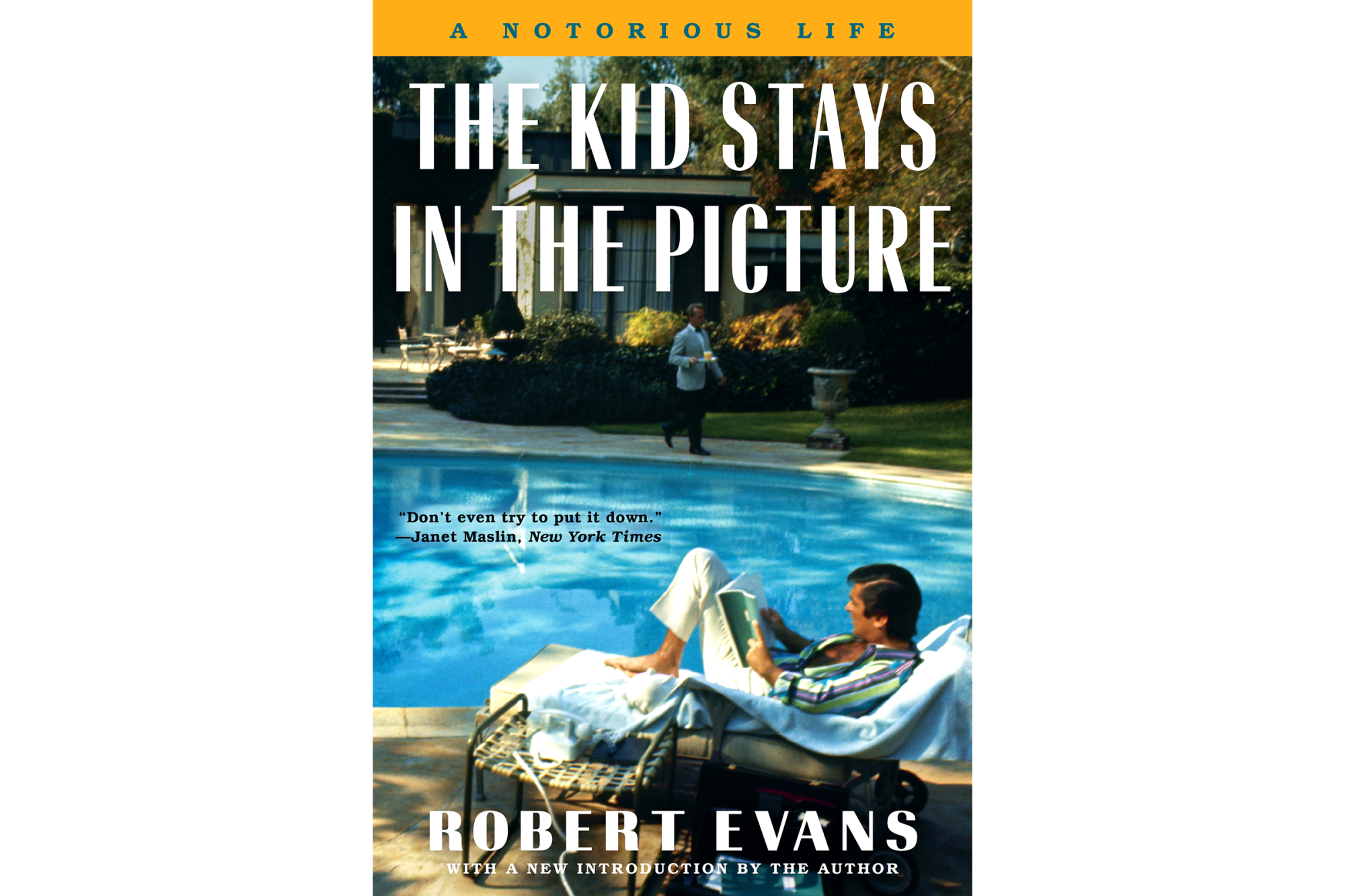
When Evans’ autobiography was adapted into a film in 2002, the cover for the book’s movie tie-in edition advertised what had drawn readers to this Hollywood tell-all: “Success. Scandal. Sex. Tragedy. Infamy,” its cover read. “And that’s just the first chapter …” Such a titillating promise was warranted. Evans’ life and career was rife with the kind of juicy anecdotes that make such memoirs endlessly enjoyable reads, and his is unparalleled in that regard. It tracks his rise from radio star hand-plucked into movie screen stardom by Norma Shearer through his later days running Paramount Pictures , shepherding the studio through pics such as “The Odd Couple,” “Rosemary’s Baby” and “The Godfather.” But Evans’ natural raconteur instincts are even better suited to depicting his cocaine benders, explaining his implication in “The Cotton Club Murders” case and detailing how he found his way back on top in a town that loves a good comeback story. — Betancourt

The Pat Hobby Stories
(F. Scott Fitzgerald, 1940-41)
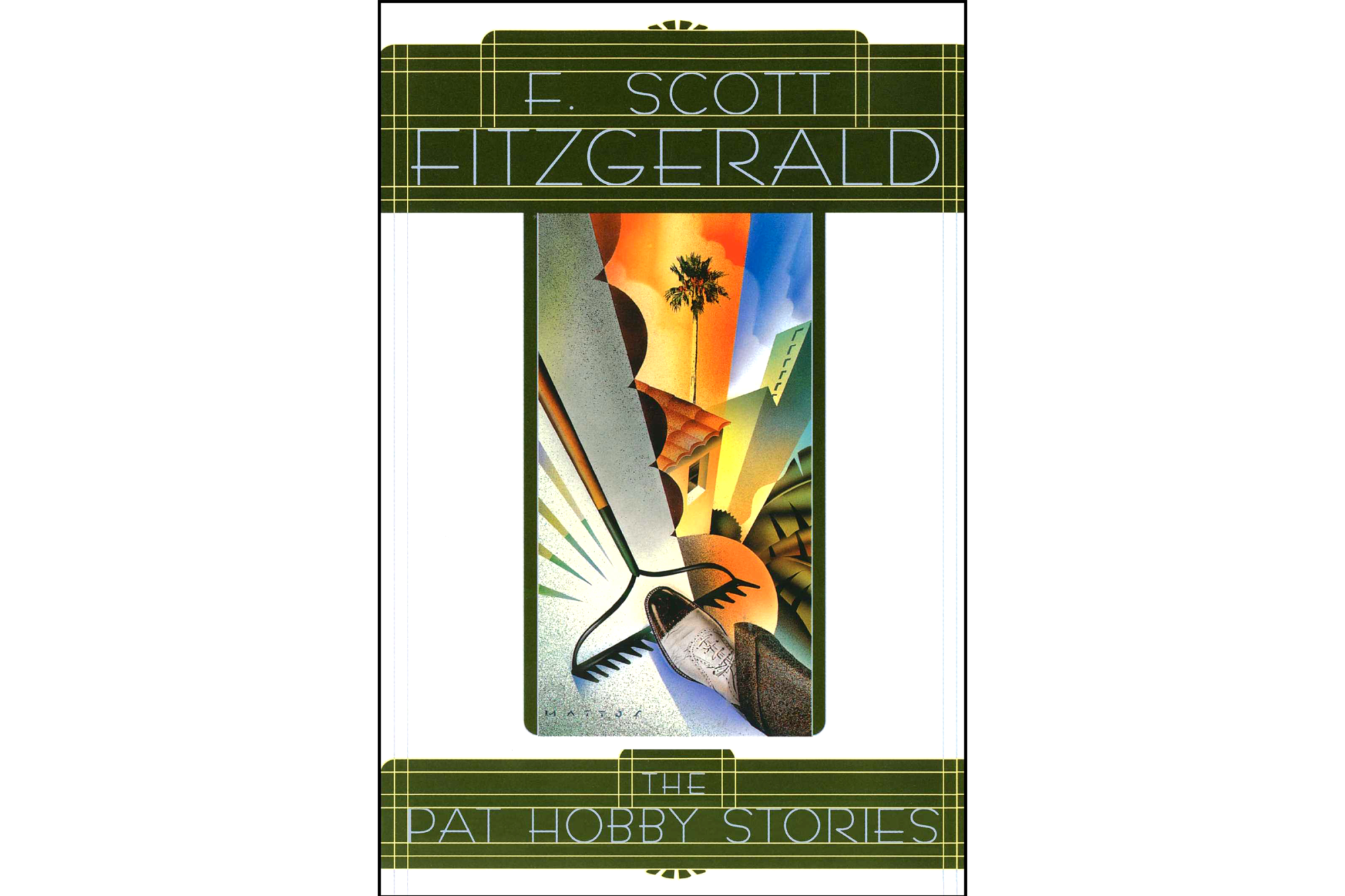
These 17 short stories, originally published by Esquire and later collected in a 1962 book, chronicle the misadventures of a failing, flailing screenwriter, a role that Fitzgerald, whose downward spiral accelerated when he went west to write for the pictures, knew all too well. Vain, often drunk, desperate to get a leg up, the title character weaves in and out of humiliating scenarios, scraping by with a sense of self-inflation to match his appetite for self-destruction. “The Last Tycoon,” Fitzgerald’s unfinished novel based on the life of producer Irving Thalberg, was the author’s Hollywood tragedy; the Hobby stories are the comedy, and they remain side-splittingly funny. As a screenwriter, Hobby was once heralded as “a good man for structure,” which seems appropriate; these stories bend in all the right places. To modern eyes, in their depiction of zigzagging pettiness, they feel like progenitors of “Curb Your Enthusiasm.” Fitzgerald died of a heart attack in 1940, before the last of the Hobby stories were published. — C V

Five Came Back: A Story of Hollywood and the Second World War
(Mark Harris, 2014)
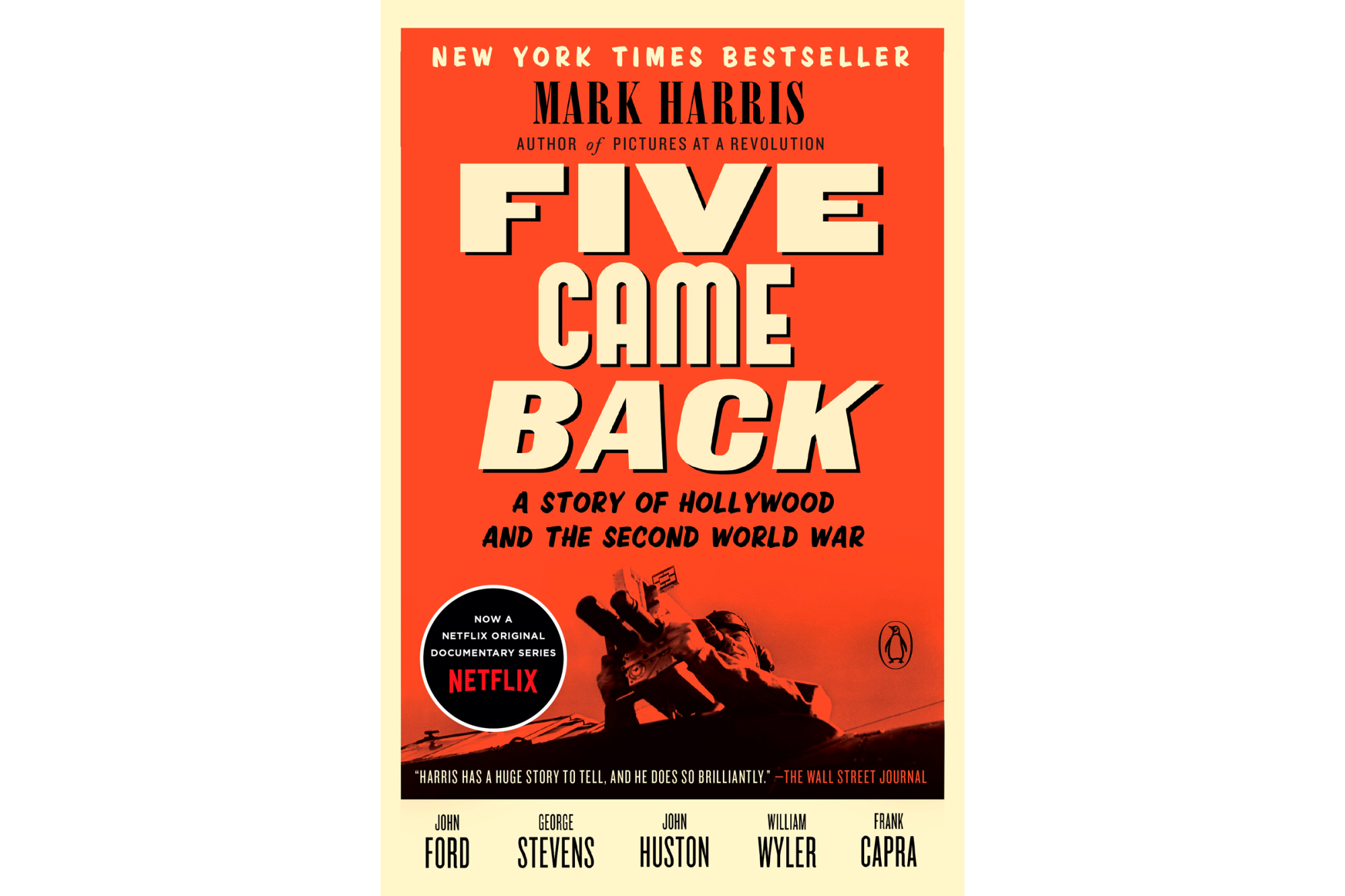
None of Harris’ three books would be out of place on this list. “Pictures at a Revolution” is a fascinating portrait of the highs and lows of an industry in tumult, and “Mike Nichols: A Life” is an unputdownable biography of one of modern Hollywood’s most perceptive filmmakers. But it’s to “Five Came Back” that I continue to turn in something like awe: Across five filmmakers and nearly a decade, through archival research and careful criticism, the author manages to construct an accessible yet never-less-than-rigorous history of Hollywood at war — a subject that has not received the same attention in mainstream film writing as the Hollywood Renaissance or the rise of the franchise blockbuster. Perhaps most thrilling, Harris’ approach allows us to see the effect John Ford, George Stevens, John Huston, William Wyler and Frank Capra had on the American war effort as well as the effect it had on them. You’ll never look at any of their filmographies the same way again. — Brennan

Making Movies
(Sidney Lumet, 1995)
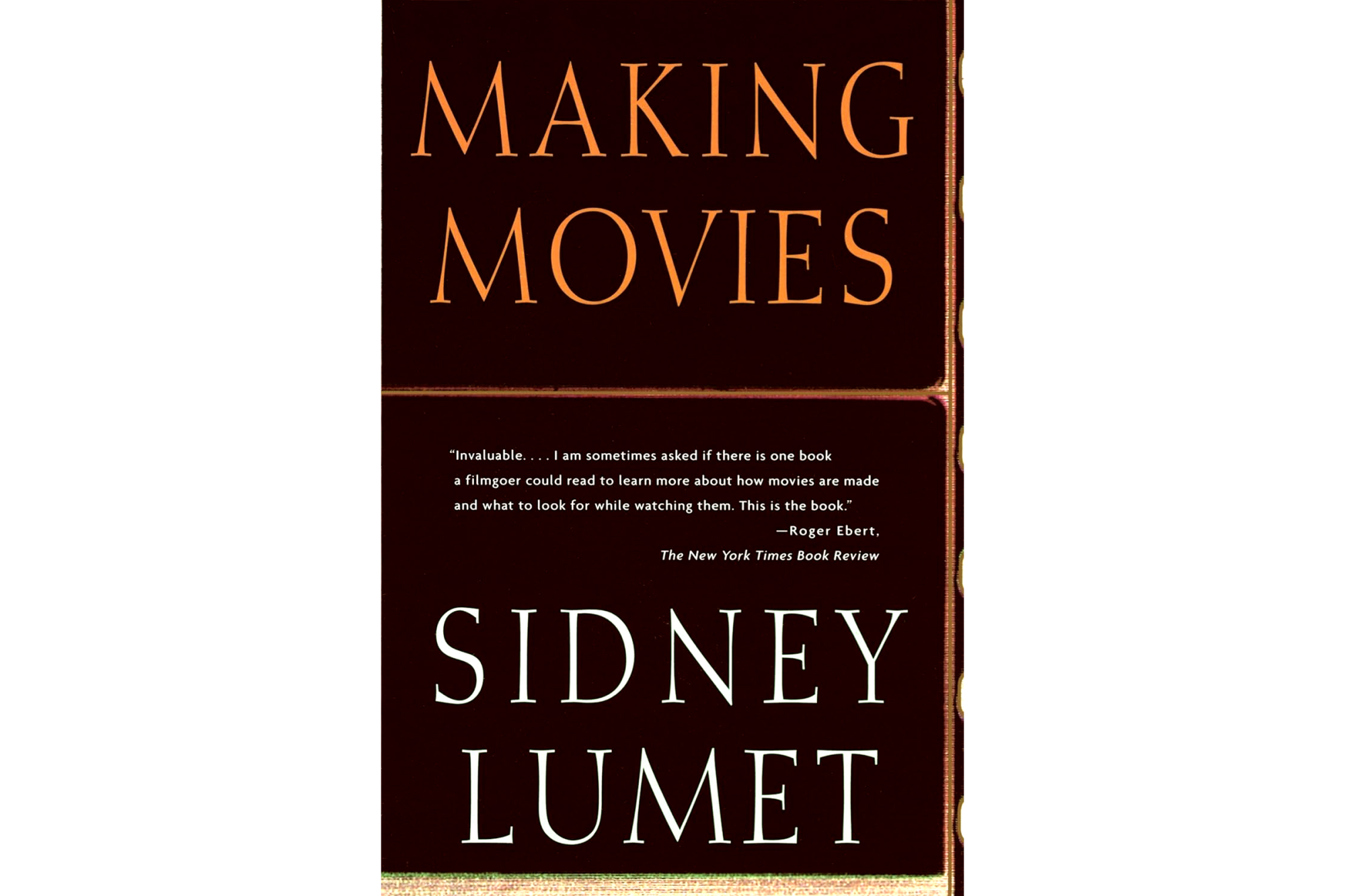
Wise, plainspoken and infused with disarming humility, the late Lumet’s book is like a master class with a teacher you want to hang out with all the time. “We really do know what we’re doing,” he writes. “It only looks like we don’t.” Lumet certainly did, and with directorial credits including “12 Angry Men,” “Dog Day Afternoon” and “Network,” he made it look easy. Guiding the reader through the various elements of filmmaking, from writing and shooting to acting and editing, Lumet is far more compassionate than vindictive. “They’re annoying, publicists, but their lives are hell.” “I love actors. I love them because they’re brave.” But this is no catalog of platitudes. “Making Movies” is stocked with usable advice and examples, the time he didn’t think Paul Newman was quite drilling into his character in “The Verdict,” sent him home for the weekend and got the Newman magic on Monday. “Paul is a shy man,” Lumet writes. “And a wonderful actor. And a race car driver. And gorgeous.” — C V

Easy Riders, Raging Bulls: How the Sex-Drugs-and Rock ‘n’ Roll Generation Saved Hollywood
(Peter Biskind, 1998)
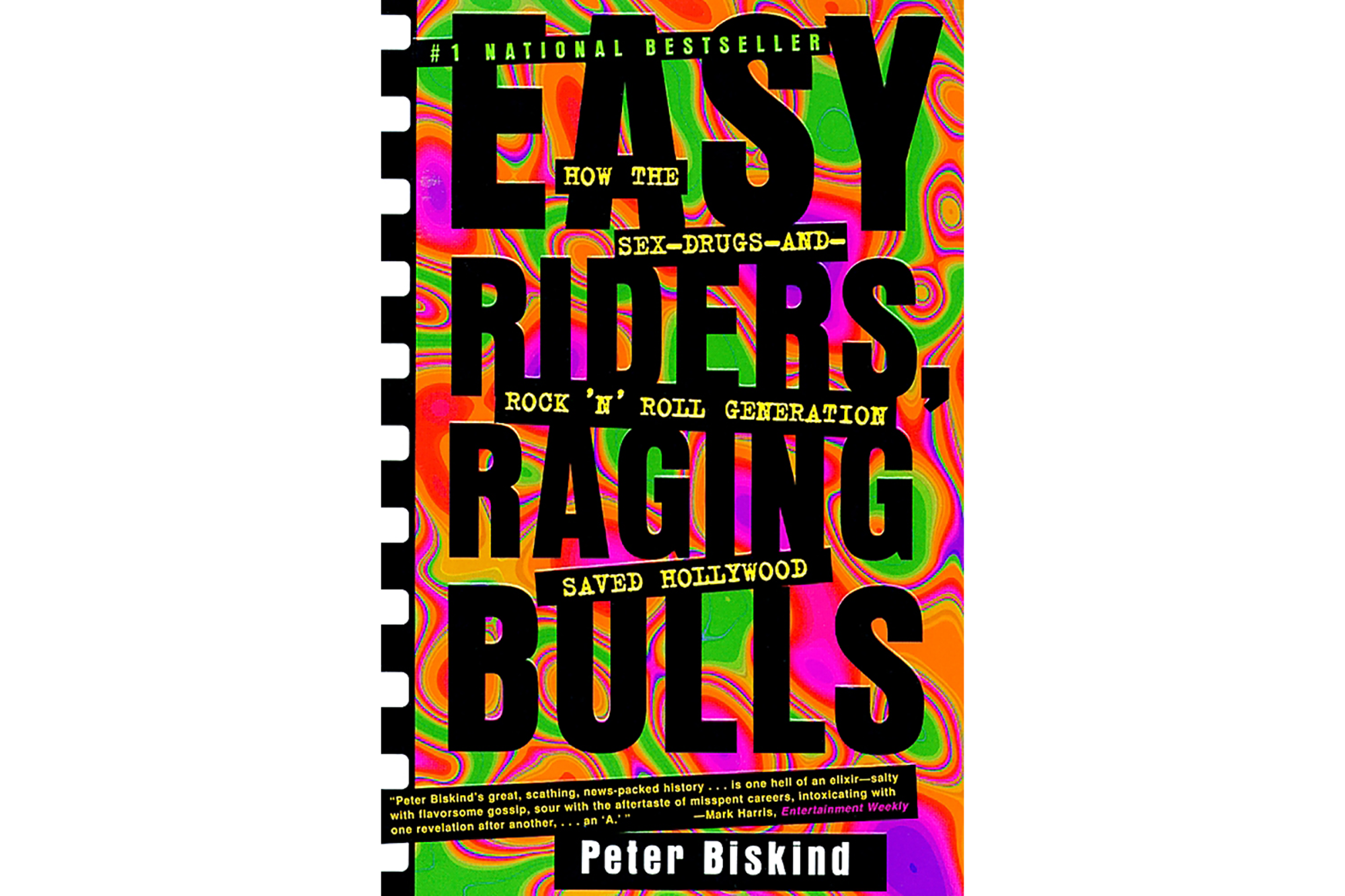
Reassuringly, the two golden ages of American film each arrived in the wake of utter chaos. The roughly simultaneous advent of talking pictures and the Great Depression ushered in the glories of the 1930s; decades later, the collapse of both the Hollywood studio system and American optimism in Vietnam helped soften the ground for such 1970s classics as “Chinatown,” “The Godfather Part II” and “The Conversation.” > GO TO STORY

An addictively readable history of the Hollywood Renaissance

Interior Chinatown
(Charles Yu, 2020)
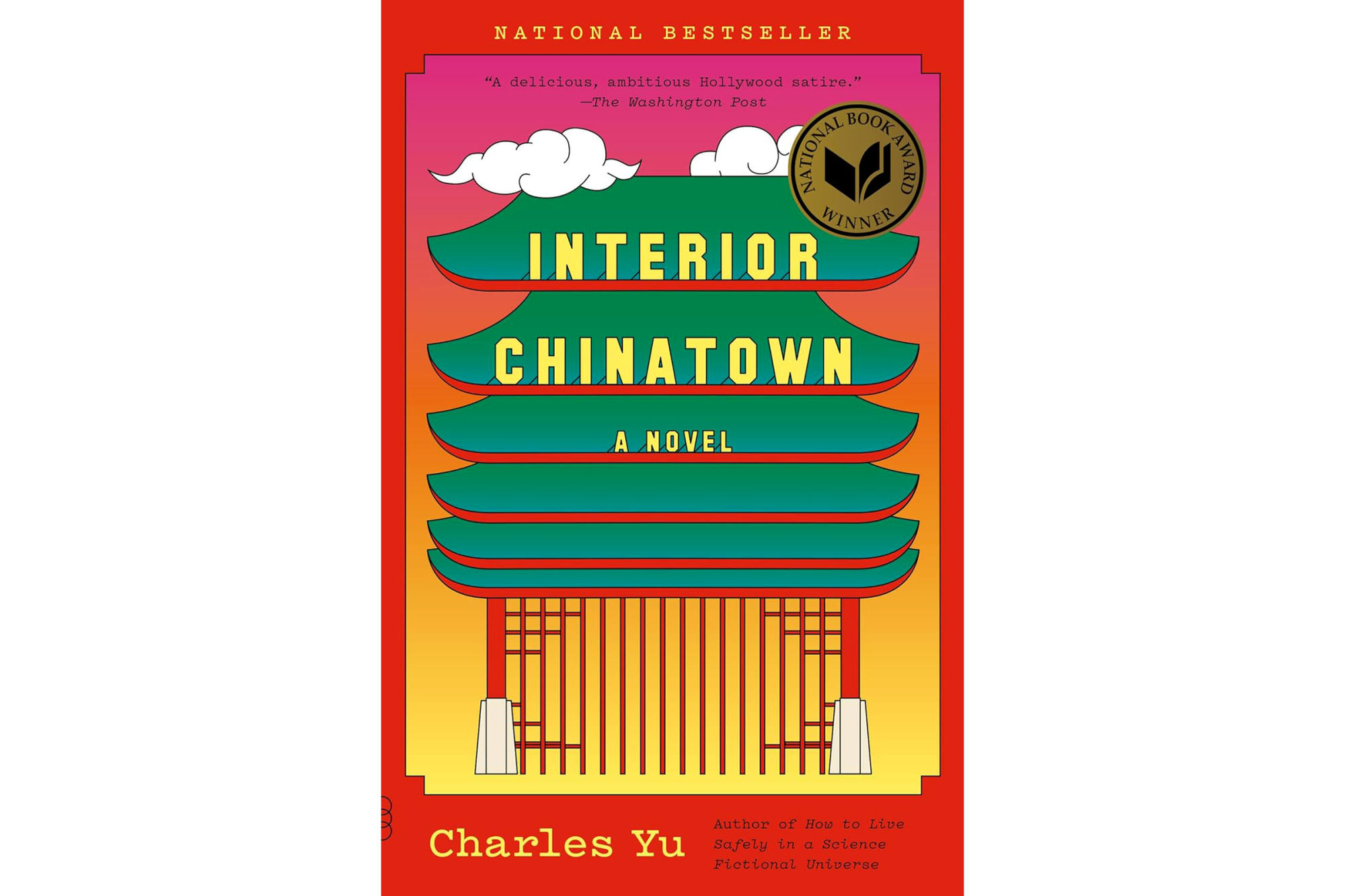
Starring Generic Asian Man: The background players take central stage in this hilarious Hollywood novel, winner of the 2020 National Book Award. Our hero, often seen on the edges of a “Law & Order”-type television show, wants more. He lives in a crummy apartment building above a Chinese restaurant, where people from across Asia get lumped together, their individuality shown to us but not the world. Informed by his experience as a second-generation Taiwanese American, Yu skewers shallow racism and toys with cultural tropes. Told in the form of a screenplay — Yu was a writer on “Westworld” — “Interior Chinatown” is a love story, a coming-of-age story, a satire and literary accomplishment. The phrase “Interior Chinatown” is, yes, screenplay shorthand for a scene’s setting, but it also reflects the interior narrative only a novel can explore. — C K

(Lillian Ross, 1952)
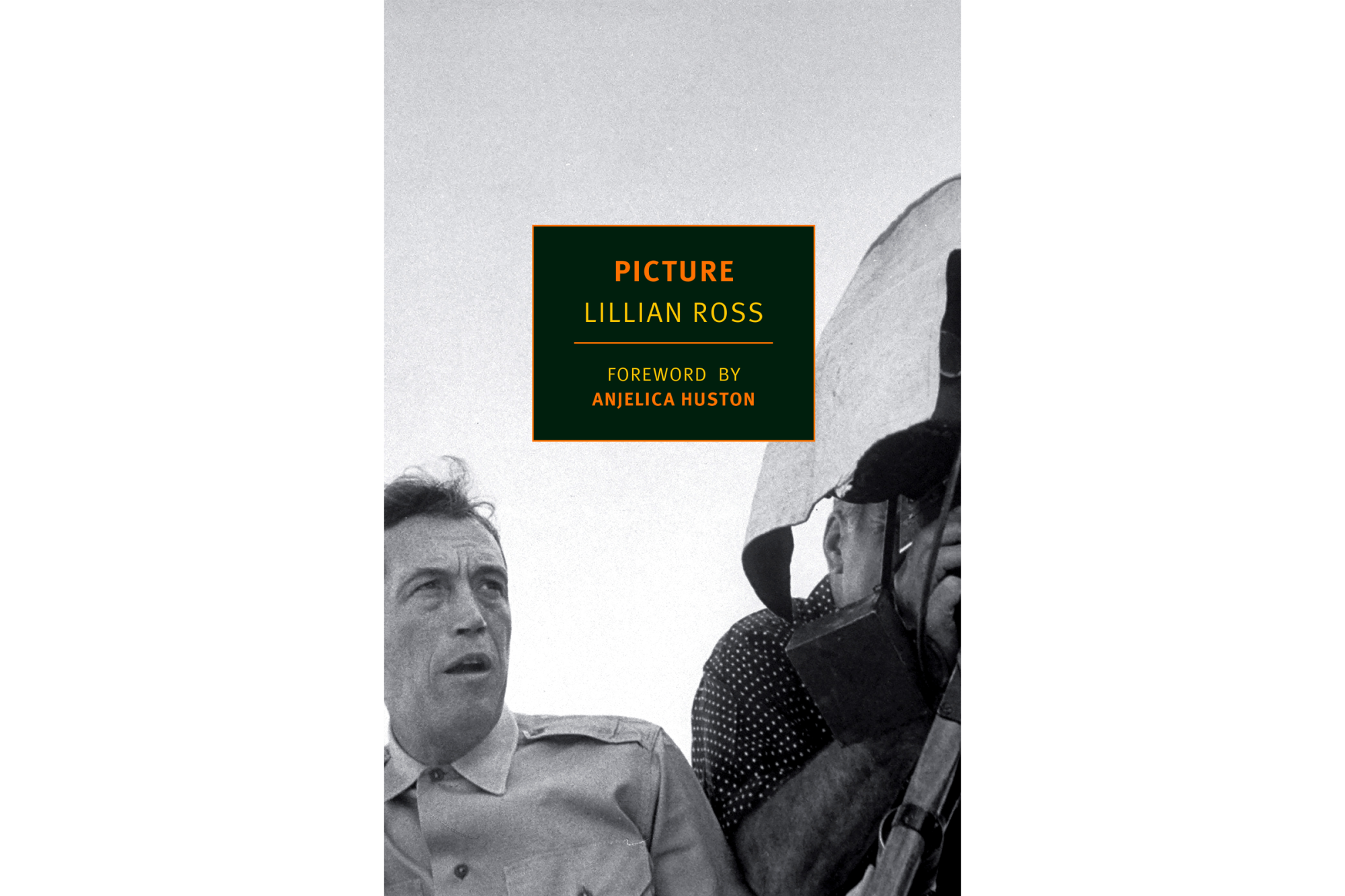
The book is usually better than the movie. That’s certainly the case with Stephen Crane’s hallucinatory 1895 Civil War novel, “The Red Badge of Courage,” the source of a 1951 film version that flopped thanks in part to studio meddling. But sometimes the book about the adaptation is better than either. Ross’ 1952 book on the making of “Badge,” originally written for the New Yorker, is a classic of fly-on-the-wall reportage, following director John Huston, MGM studio heads and the film’s cast and crew from conception to shooting to post-release excuse-making. Ross can be meticulous almost to the point of fustiness; she seemingly got hold of every internal memo and expense sheet. But there are few better books about the soup-to-nuts creation of a film, and it’s a brilliant profile of Huston, who’s trying to both gladhand the execs and keep them at arm’s length. — MA

(Michael Tolkin, 1988)
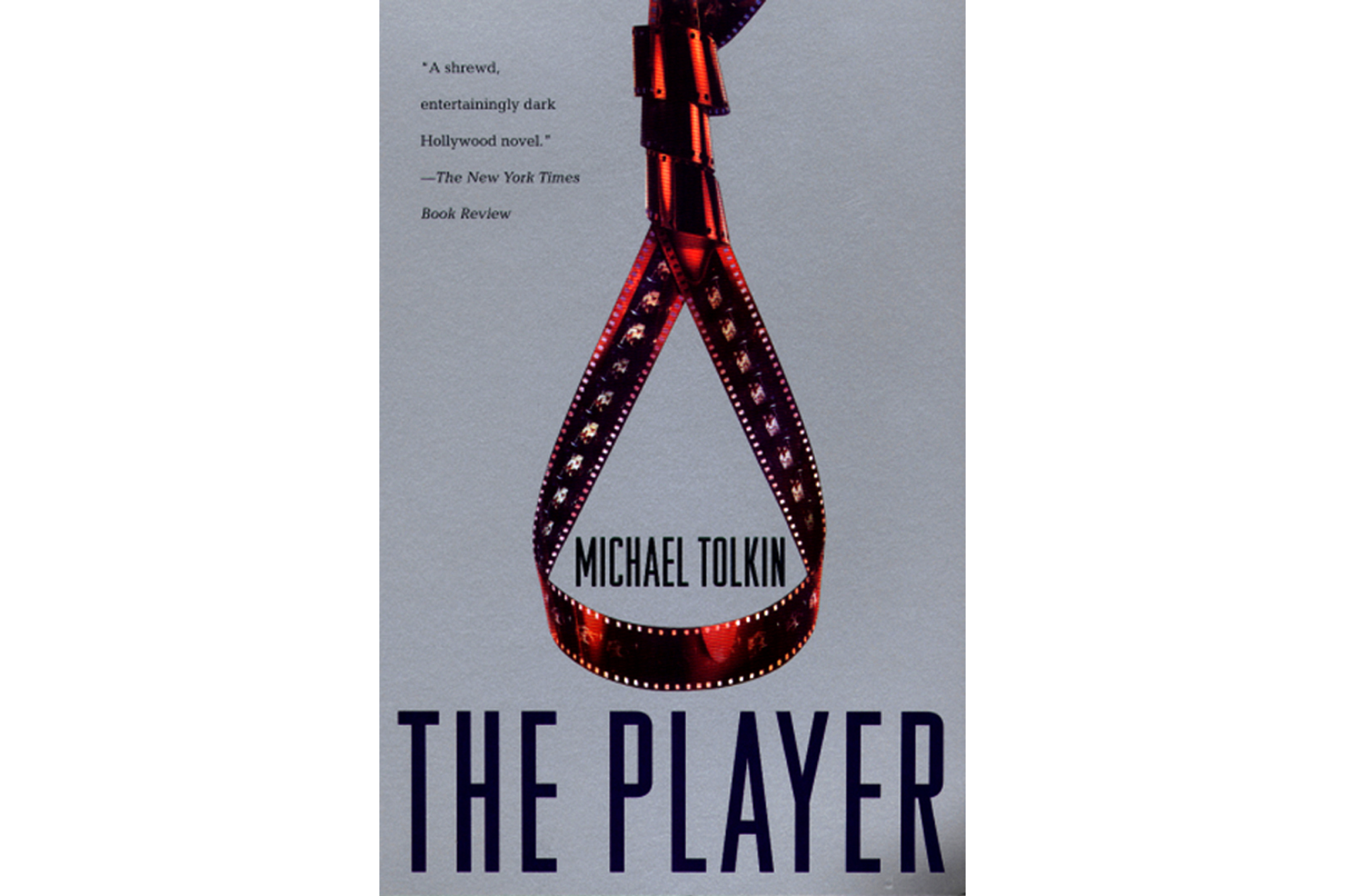
A postcard arrives at Griffin Mill’s office one day: “You said you’d get back to me. I’m still waiting.” The young Hollywood exec, ambitious to a fault as he climbs his way to the top, wavers over telling anyone about what soon becomes a series of death threats from, of all things, an aggrieved writer. Making savvy use of that thriller conceit, Tolkin’s wildly entertaining first novel offers a front-row seat to the self-absorption that characterizes those who would (and do) become mythmakers in Tinseltown. As Mill goes to increasingly deranged lengths to identify who is behind those ominous missives — all while making sure his position at the studio isn’t eclipsed by any newcomers, power lunches taking precedence over anything else — Tolkin paints a scathing portrait of a city of dealers and players who’d do anything to win. Yes, even murder. — MB

Adventures in the Screen Trade
(William Goldman, 1983)
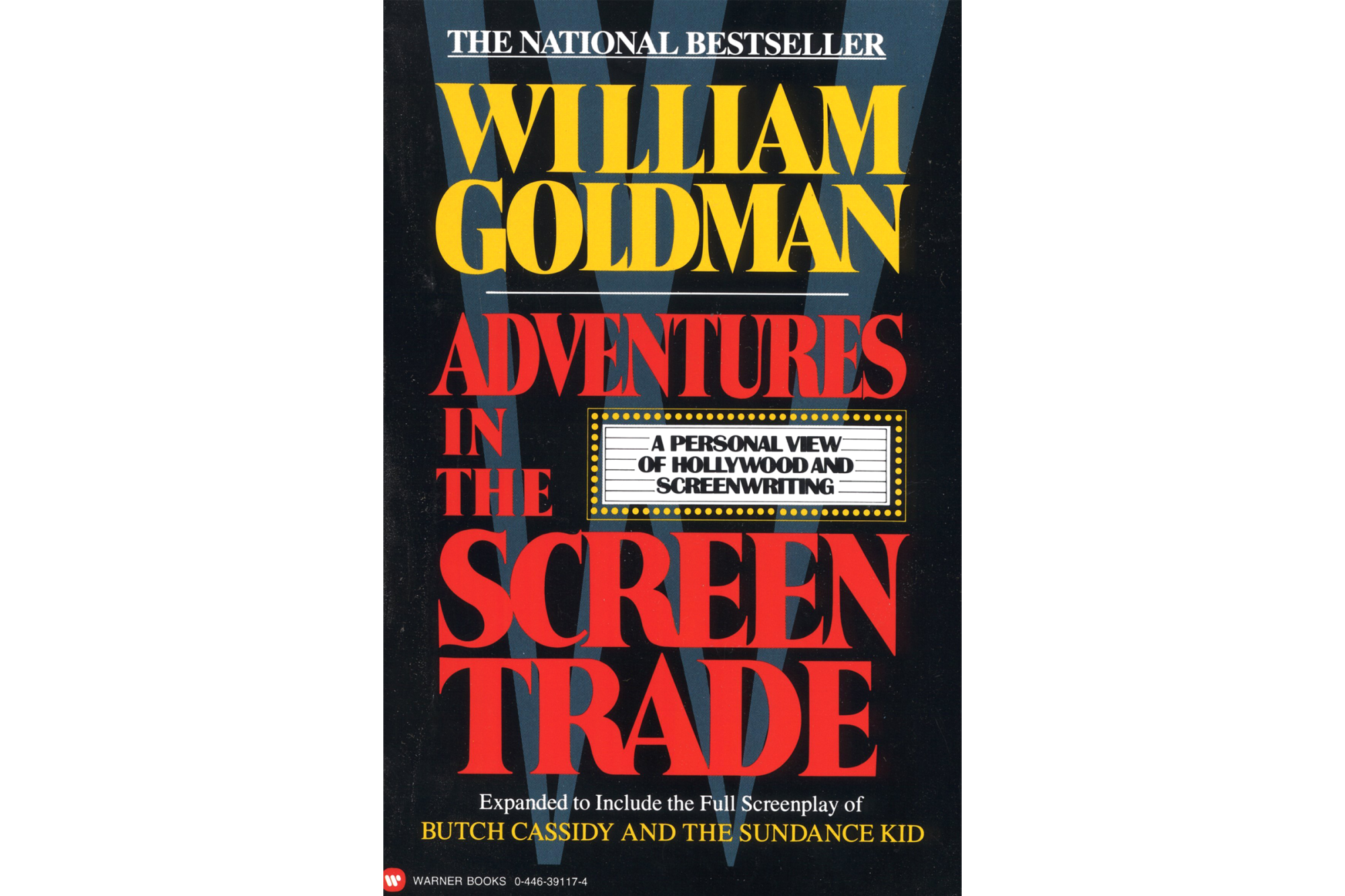
Best remembered now for “The Princess Bride” — he wrote both the novel and the screenplay — Goldman was previously best known for his Oscar-winning screenplay for “All the President’s Men,” the indelible story of two journalists chasing the truth behind Watergate. Before that, though, he was the guy who created “Butch Cassidy and the Sundance Kid,” a box-office smash, a buddy film western with an entirely unexpected ending. How on earth did the same person write all those classic films and more (“Misery,” “Harper,” “Marathon Man”)? Imagine sitting down at a bar next to him and getting a chance to ask. This book is that conversational — chatty, filled with vivid anecdotes, revealing industry secrets. Part self-effacing memoir, part how-to for writing screenplays, and a window into how the levers of power worked in Hollywood, this book is a stone-cold classic. — CK

(Elmore Leonard, 1990)
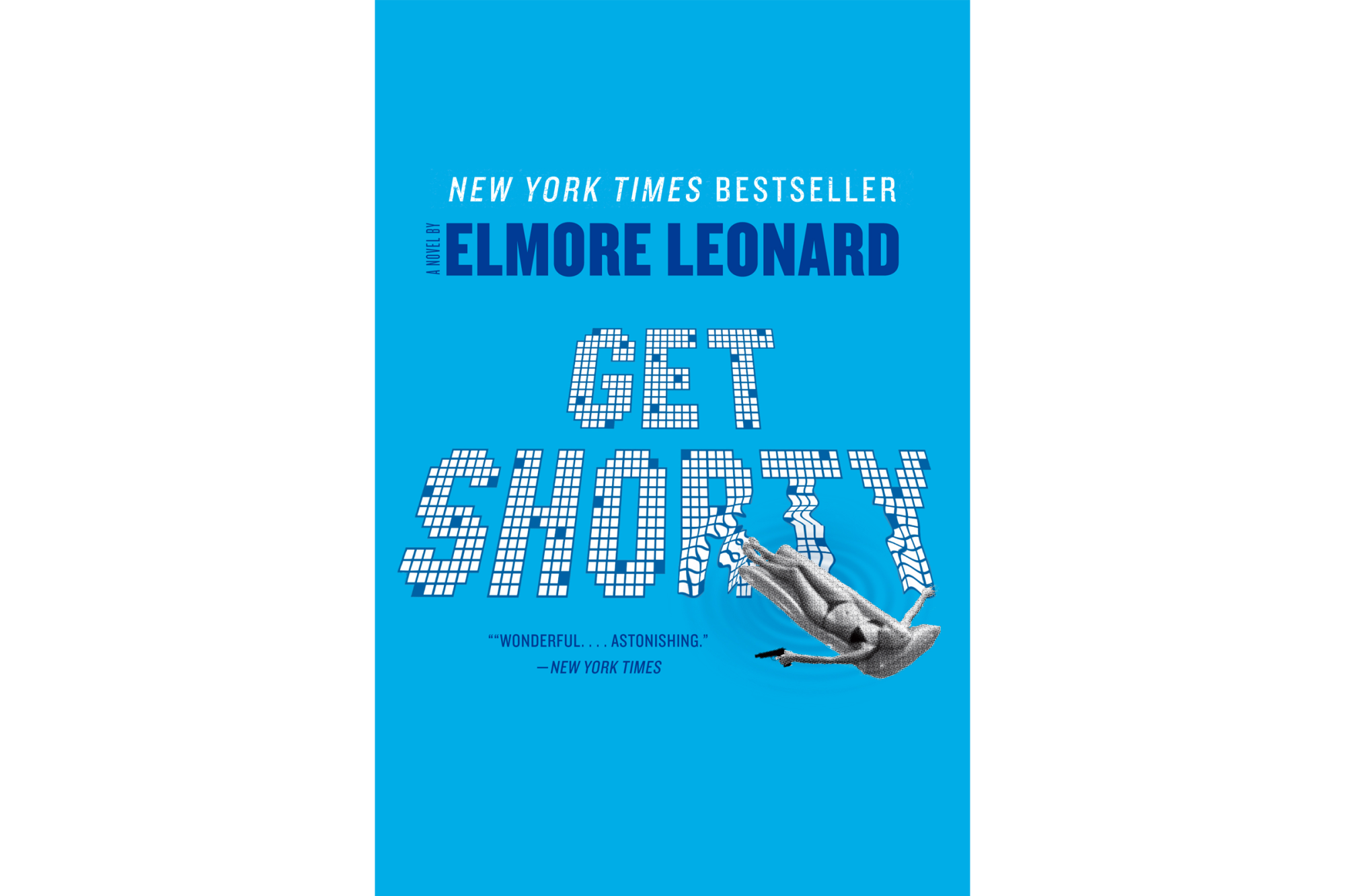
Suave loan shark Ernesto “Chili” Palmer is our guide through this amusing crime saga set in the underbelly of the seemingly glamorous world of Hollywood moviemaking. Tasked with collecting the cash that Los Angeles-based producer Harry Zimm owes a Las Vegas casino, Chili quickly becomes entangled in backdoor deals to finance prospective film productions. As increasingly dangerous parties become tangentially involved, Chili and Zimm risk losing more than just their big-screen aspirations. Barry Sonnenfeld’s 1995 big-screen adaptation of the tome starred John Travolta, Gene Hackman, Rene Russo and Danny DeVito and became a critical and financial success. In 2017, a TV series also based on Leonard’s novel premiered on Epix (now MGM+). — CA

Hitchcock/Truffaut
(François Truffaut, 1967)
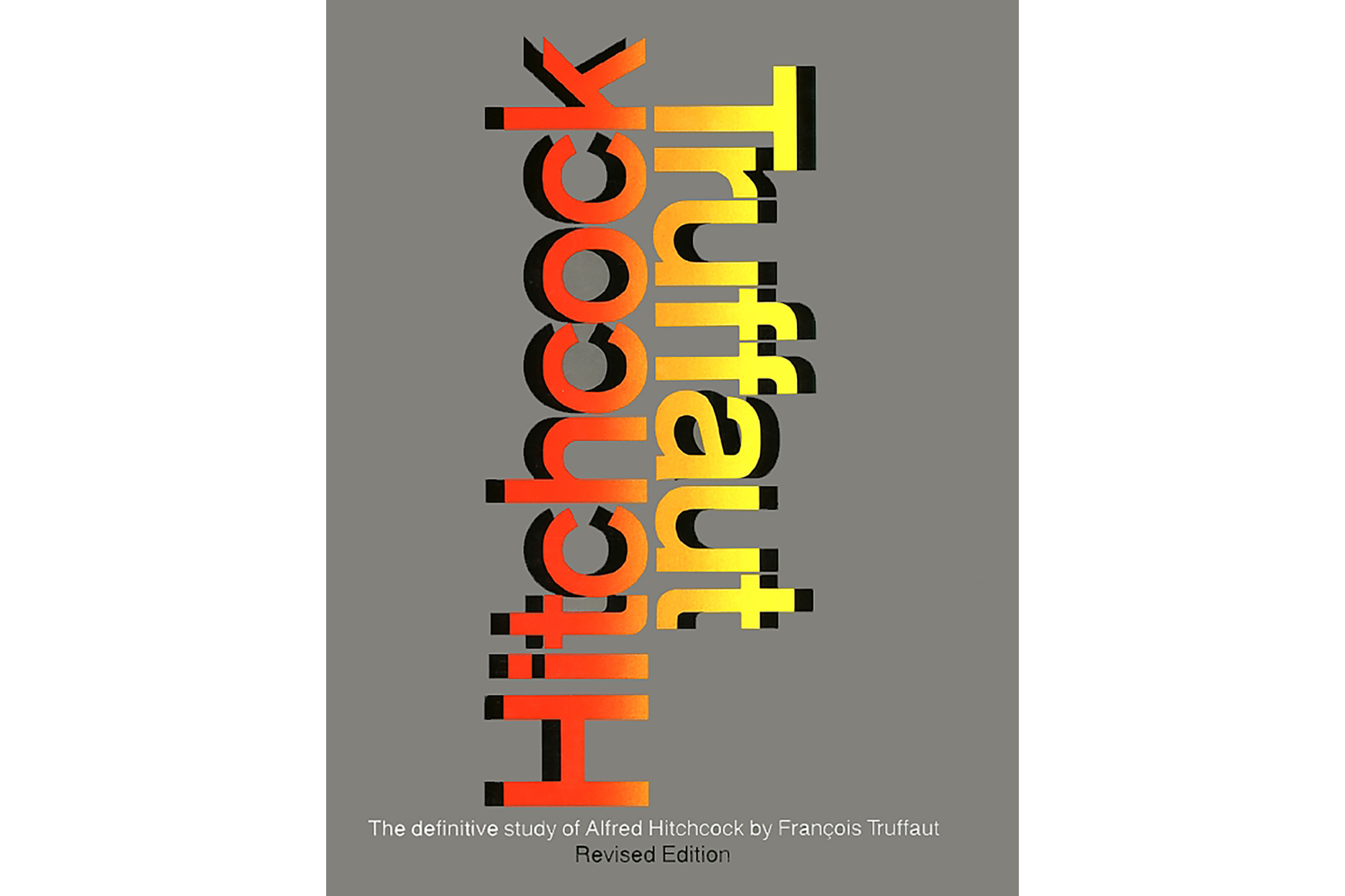
In a quarter-century or so of elementary, secondary, undergraduate and graduate schooling, no course cemented itself as firmly in my mind as USC professor Drew Casper’s exhaustive seminar on Alfred Hitchcock — thanks to the master of suspense himself, Casper’s lively lectures and this book. “Hitchcock/Truffaut” is the inimitable, and today inconceivable, product of a 50-hour interview in which the French filmmaker and critic pressed the idol of the Cahiers du Cinéma set “to reveal all his secrets.” The result exemplifies the politique des auteurs , or auteur theory, as thoroughly as any manifesto, but “Hitchcock” isn’t useful merely for its interest in the director’s “minor” works, or for the insights Truffaut draws out that no other interlocutor ever did. It is, above all, detailed proof that art, though subject to the forces of chance and the shifting winds of culture, is ultimately about choices. This star, this shot, this cut, this color: From such decisions the great masterpieces of Hollywood cinema are made. — Brennan

The Day of the Locust
(Nathanael West, 1939)
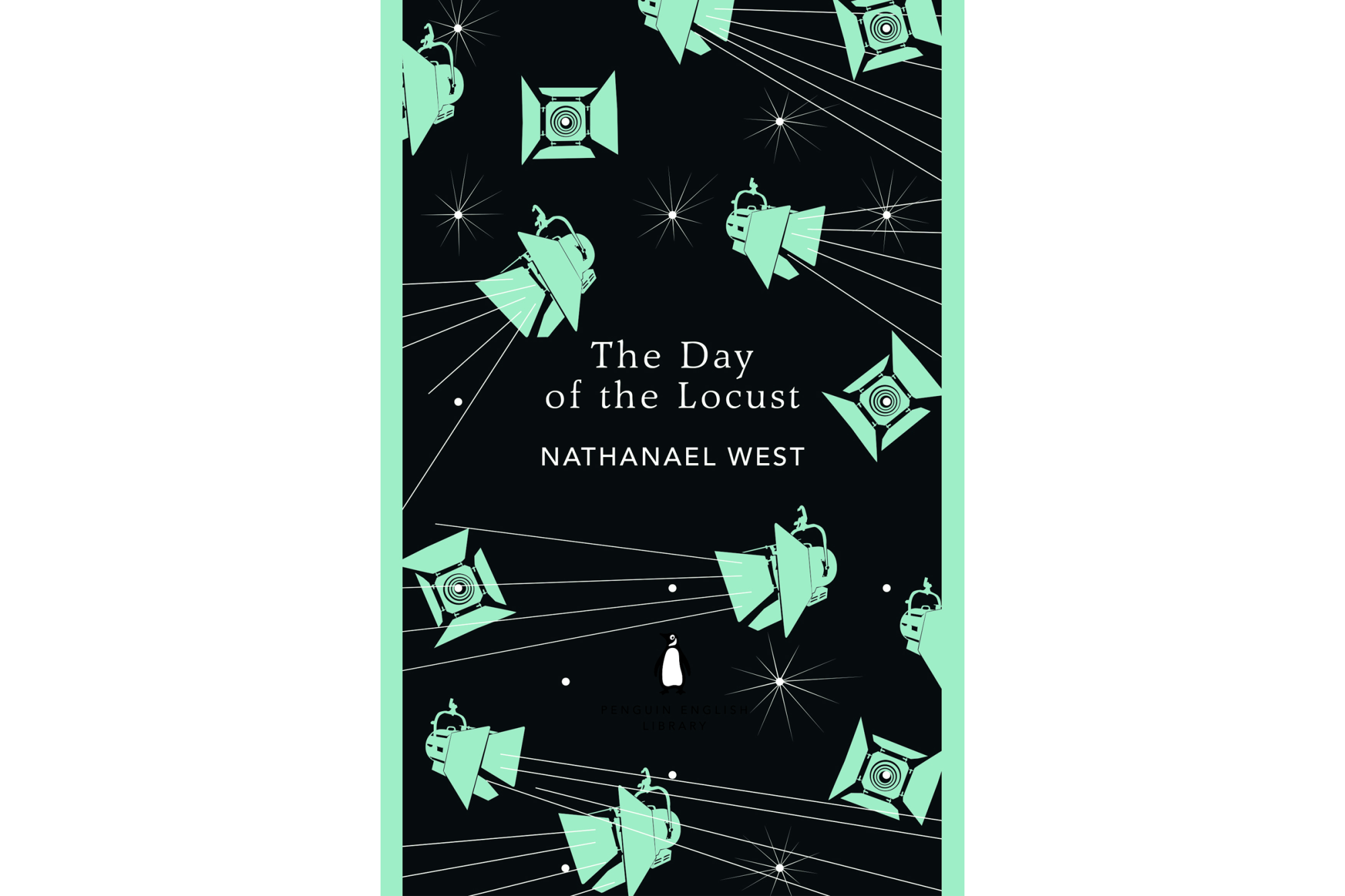
In West’s scabrous novel, Hollywood is a freak show fated to end in apocalypse, inhabited by deluded hangers-on convinced of their importance and unwilling to confront their mediocrity (West originally titled his book “The Cheated”). Yale-trained artist Tod Hackett, toiling as a studio scene designer, doesn’t just see the fire coming; he’s hard at work predicting and depicting it in a painting called “The Burning of Los Angeles.” But most of the characters have already seen their dreams burn down: Faye Greener, a beautiful but talentless actor; her father, an old vaudevillian reduced to peddling silver polish; and a host of other eccentrics and grotesques. For West, whose own screenwriting career was getting started when he died in a car crash in 1940, Hollywood was where the American Dream went to die. — CV

Play It As It Lays
(Joan Didion, 1970)
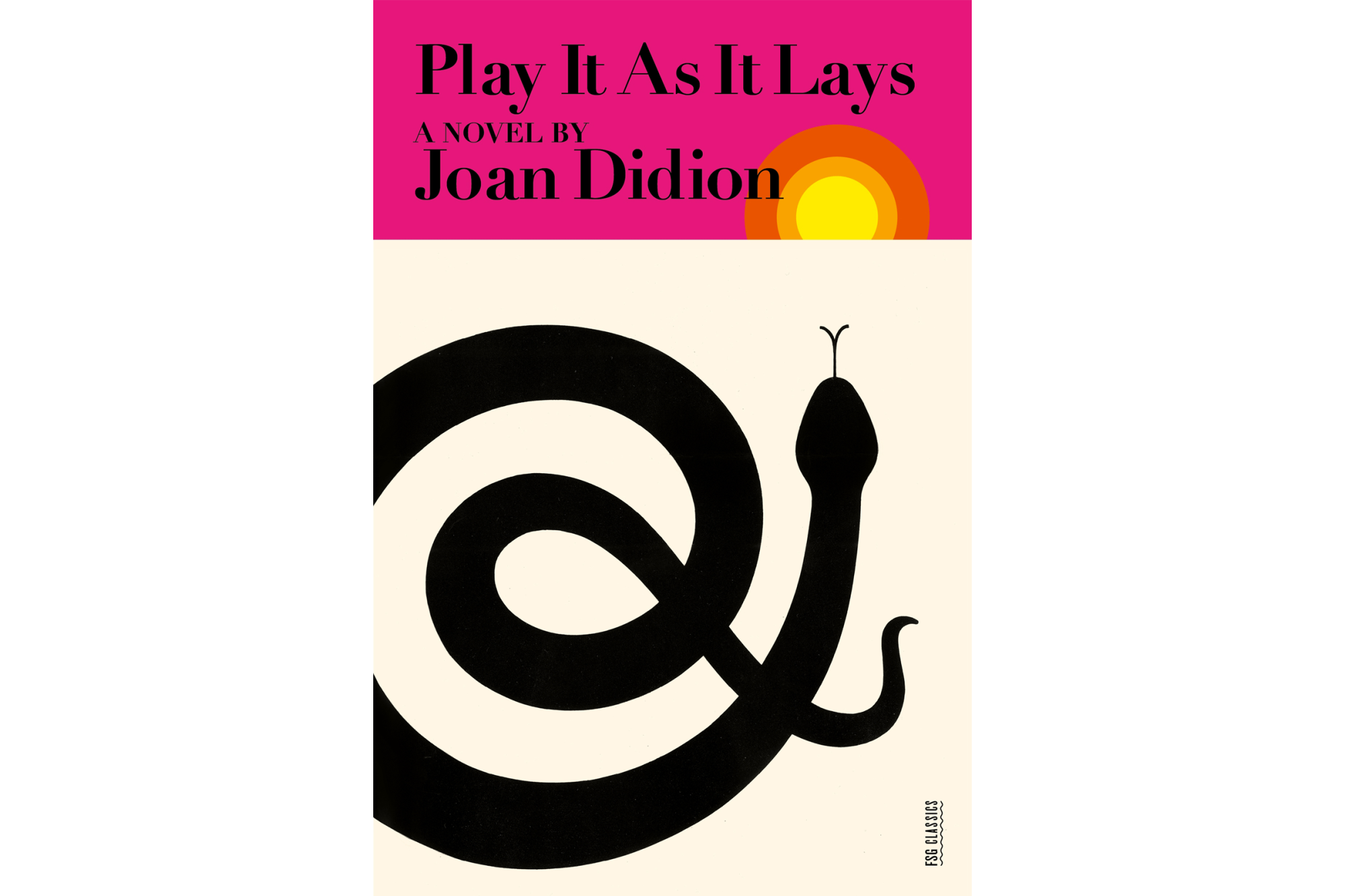
Maria Wyeth came to Hollywood for the same reason as the rest of us: to escape from someplace else. When we meet her in “Play It As It Lays,” though, the actor’s hometown of Silver Wells, since swallowed by a missile range in the Nevada desert, has regained a certain appeal, “the restorative power of desolation.” After all, her parents are dead, her marriage is disintegrating, her child is institutionalized, her career is in free fall. Only her father’s advice to her, that life itself is a crap game , has held up over time. “Everything goes,” she laments. “I am working very hard at not thinking about how everything goes.” > GO TO STORY

What Joan Didion’s broken Hollywood can teach us about our own
More to read.

The photo that wrapped Marlon Brando’s homoerotic swagger in a tight leather jacket
March 27, 2024

These are the 5 best L.A. heist movies
March 14, 2024

Commentary: ‘American Fiction’s’ Oscar shows not all movies by Black directors need to be about violence and poverty
March 11, 2024

Matt Brennan is a Los Angeles Times’ deputy editor for entertainment and arts. Born in the Boston area, educated at USC and an adoptive New Orleanian for nearly 10 years, he returned to Los Angeles in 2019 as the newsroom’s television editor. He previously served as TV editor at Paste Magazine, and his writing has also appeared in Indiewire, Slate, Deadspin and numerous other publications.

Kay Scanlon is an art director at the Los Angeles Times. She works on the Sunday Calendar and Weekend sections and has led projects such as the annual 101 Best Restaurants guide. Prior to joining The Times in 2021, she art-directed MovieMaker magazine and contributed award-winning design at the Orange County Register, Los Angeles Daily News and Newsday. Scanlon graduated from UCLA with a bachelor’s degree in English and is certified in graphic design from Otis College of Art and Design. Her work has been recognized by the Society for News Design, Society of Publication Designers and the California News Publishers Assn.
More From the Los Angeles Times

A journalist grapples with her new identity as an Army wife
April 8, 2024

The week’s bestselling books, April 7
April 3, 2024

3 best mystery books to read this spring

L.A. author Kathryn Scanlan wins $175,000 literary prize: ‘Baffling and wonderful’
April 2, 2024

IMAGES
VIDEO
COMMENTS
Body Paragraph 3. Supporting argument. Example. Explanation. A linking sentence to the conclusion. Conclusion paragraph. Summary of the entire paper. A conclusive sentence (the bigger picture in conclusion) If you need some help, leave us a message ' write my essay cheap ' and we'll help.
Learn how to write an opinion essay. Hi kimmie, Thanks for your question. In academic and formal writing, there is a general preference for precision over vagueness, so generally speaking it's better to avoid this usage of so and thing and use more precise and academic terms when they are available (e.g.Therefore, the first factor/issue to consider is ...
Opinion writing is a powerful type of writing that helps you convey your opinion to the audience in the most effective and compelling manner. It has a specific format: Thesis statement. Introduction. Body. Conclusion. It also consists of structural elements such as. Arguments. Evidence.
Conclude your essay with a sense of closure, ensuring your final words leave a lasting impression. 6. Evidence and Examples: Support your opinion with credible evidence, such as research findings, assignment expert opinions, or real-life examples. This lends credibility to your argument and makes it more persuasive.
Elements of an Opinion Essay. An opinion essay typically includes the following elements: 1. Introduction paragraph: The introduction should grab the reader's attention and provide background information on the topic. It should also include a clear thesis statement that outlines the writer's position. 2.
An opinion essay, also known as an opinion paper, is a formal piece of writing wherein the author expresses their viewpoint on a given subject and provides factual and anecdotal evidence to substantiate their opinion. ... By examining opinion essay examples, you will be better equipped to identify the elements of a successful essay and apply ...
An essay based on a person's personal opinion implies a clear statement of the author's thoughts on a specific topic. However, to show understanding of the problem, one should rely on facts, research, or examples from life. A supported opinion essay is precisely when the author's opinion is based on objective factors.
Read the question carefully. Respond to all ideas in it or all parts of it. Plan your ideas first and then choose the best ones. Introduce your essay by restating the question in your own words. Show understanding of both sides of the argument. Use linking words to connect your ideas. Draw your conclusion from the main ideas in your essay.
When writing an opinion essay, it is important to use formal language throughout. Even though you can decide to use informal language, keep various professional and formal words such as: "furthermore", "thus", "moreover" and so on. In the same vein, avoid the use of Internet slang words like "OMG", "LMAO," etc.
4. Include your thesis statement. As you're writing an opinion essay, it's essential to use the researched information to create your thesis and support your argument, rather than simply quoting information from other sources. Your thesis comprises your position or claim on the selected topic and indicates to the reader what your essay is about.
Here's an example of an opinion paper outline: Example: An introduction. Write a thesis statement and the reasons that support your opinion. Give your readers a hook to engage them with the topic. The main body. Break it into several paragraphs where you provide arguments and supporting examples, statements, and facts.
of reflection can come anywhere in an essay; the sec-ond is usually comes early; the last four often come late (they're common moves of conclusion). Most good essays have some of the first kind, and often several of the others besides. 10. Orienting: bits of information, explanation, and summary that orient the reader who isn't expert in the
Make a claim. Provide the grounds (evidence) for the claim. Explain the warrant (how the grounds support the claim) Discuss possible rebuttals to the claim, identifying the limits of the argument and showing that you have considered alternative perspectives. The Toulmin model is a common approach in academic essays.
Effective opinion writing incorporates key elements such as a clear thesis statement that succinctly presents the author's viewpoint, logical reasoning backed by evidence or examples, a coherent structure with well-organized paragraphs, and a compelling conclusion that reinforces the writer's stance while potentially prompting action or ...
OPINION WRITING CRITERIA TO ADDRESS. 1. Identify the Audience: Speak Clearly. Writing is about language and language is about communication; students should understand that we do not write in a vacuum. The purpose of an essay, letter, or any other form of writing we care to name, is ultimately to be read.
Find here the 10 rules for writing opinion pieces, including the essential elements of a successful and sellable op-ed. (How to Write Better Using Humor.) Opinionated editorial essays are often the most fun, fast and furious pieces to get into print—especially for nonfamous writers with strong opinions and day jobs in other fields.
Definition of Elements of an Essay. An essay is a piece of composition that discusses a thing, a person, a problem, or an issue in a way that the writer demonstrates his knowledge by offering a new perspective, a new opinion, a solution, or new suggestions or recommendations.An essay is not just a haphazard piece of writing. It is a well-organized composition comprising several elements that ...
A great argumentative essay always combines the same basic elements: approaching an argument from a rational perspective, researching sources, supporting your claims using facts rather than opinion, and articulating your reasoning into the most cogent and reasoned points. Argumentative essays are great building blocks for all sorts of research ...
The 5 Must-Have Steps of a Persuasive Essay. If you're intimidated by the idea of writing an argument, use this list to break your process into manageable chunks. Tackle researching and writing one element at a time, and then revise your essay so that it flows smoothly and coherently with every component in the optimal place. 1.
This is always one of my 6 anchor charts for opinion writing because the "OREO" acronym is very helpful! This is an easy way for students to remember what to include in an opinion writing piece. The first O is the introduction (which we will talk about later in the post). The introduction will need to include the writer's opinion.
The main element. The main element of the opinion piece is of course ubiquitous; it also has a head, body and tail. Its body is the crux around which the piece revolves. The Introduction assertively pits your opinion which you reinstate in the conclusion with greater vigor.
Here are some tips. And here's our email: [email protected]. Follow The New York Times Opinion section on Facebook, Instagram, TikTok, WhatsApp, X and Threads. 602. 602. Trump's God Bless ...
Everybody Thought We Were Crazy: Dennis Hopper, Brooke Hayward, and 1960s Los Angeles. (Mark Rozzo, 2022) Advertisement. Hopper is the bold-faced name, but Hayward is the heart of this intimate ...